Ubiquitous Computing Synchronization for Efficient Error Detection in Electronic Medical Records (EMR)
VerifiedAdded on 2024/06/28
|95
|11585
|330
AI Summary
This literature review explores the use of ubiquitous computing synchronization for efficient error detection in Electronic Medical Records (EMR). It examines various research papers that propose different techniques and frameworks to address the challenges of data integrity, security, and accessibility in EMR systems. The review analyzes the strengths and limitations of each solution, highlighting their potential impact on improving patient care and research outcomes.
Contribute Materials
Your contribution can guide someone’s learning journey. Share your
documents today.
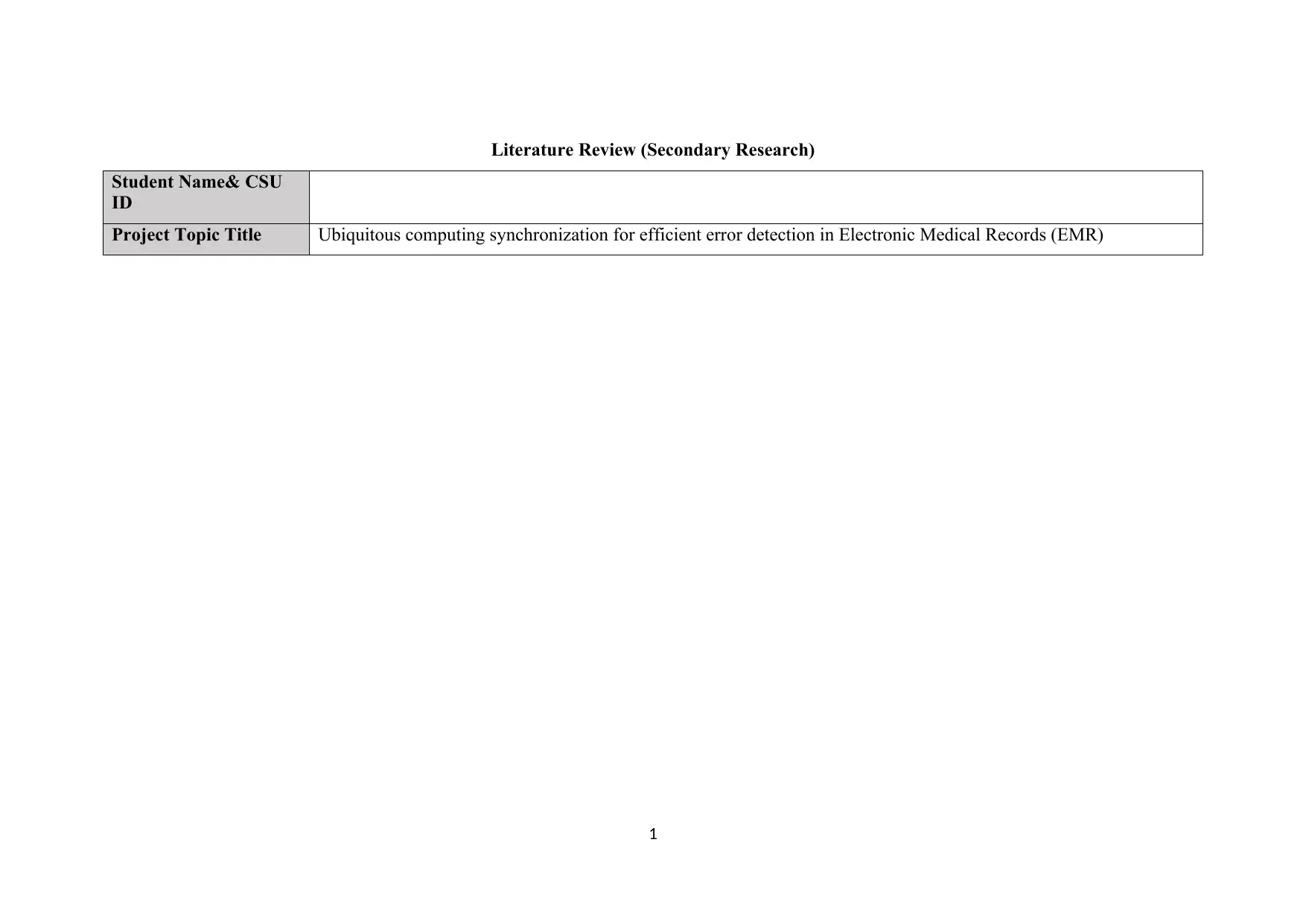
Literature Review (Secondary Research)
Student Name& CSU
ID
Project Topic Title Ubiquitous computing synchronization for efficient error detection in Electronic Medical Records (EMR)
1
Student Name& CSU
ID
Project Topic Title Ubiquitous computing synchronization for efficient error detection in Electronic Medical Records (EMR)
1
Secure Best Marks with AI Grader
Need help grading? Try our AI Grader for instant feedback on your assignments.
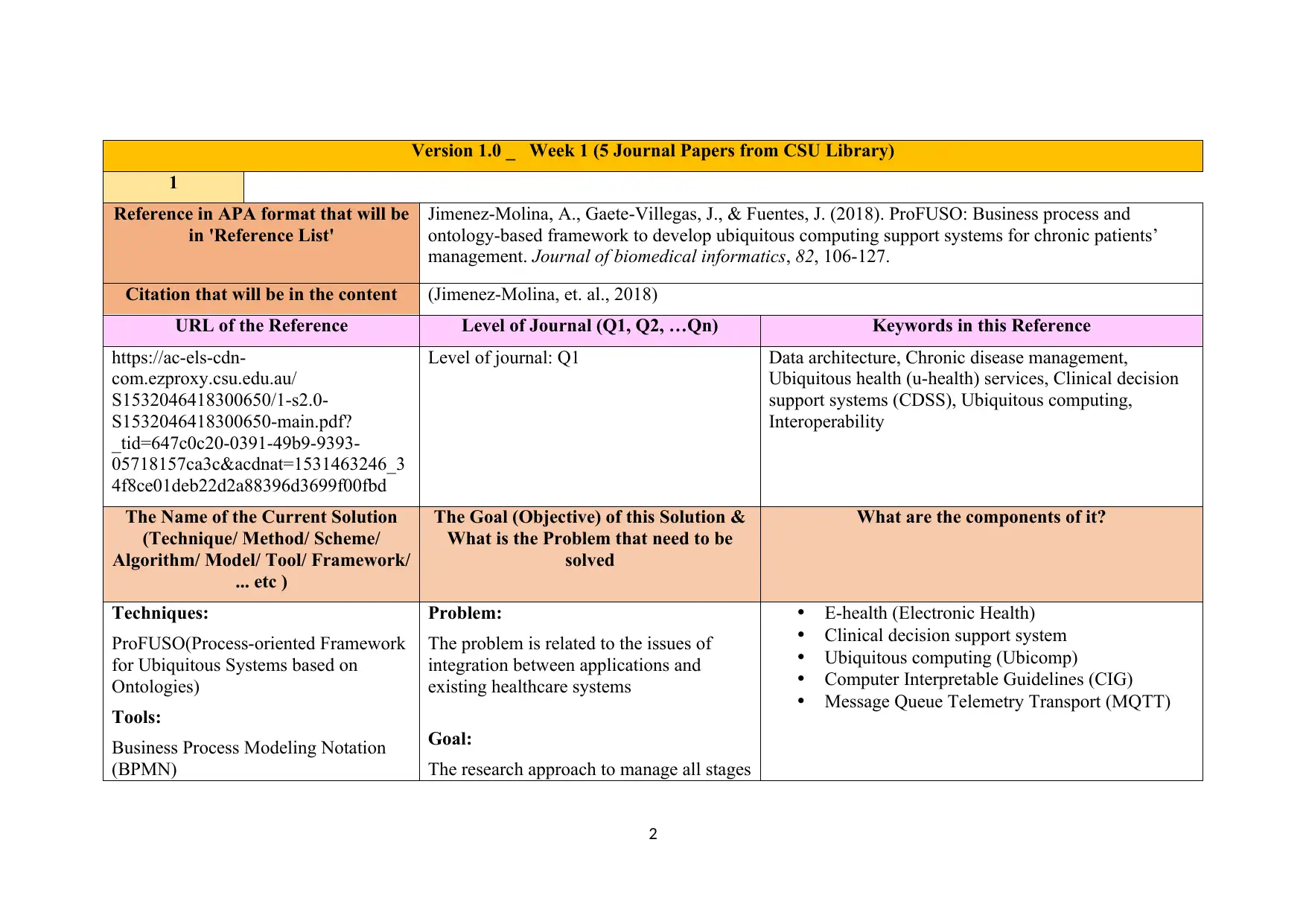
Version 1.0 _ Week 1 (5 Journal Papers from CSU Library)
1
Reference in APA format that will be
in 'Reference List'
Jimenez-Molina, A., Gaete-Villegas, J., & Fuentes, J. (2018). ProFUSO: Business process and
ontology-based framework to develop ubiquitous computing support systems for chronic patients’
management. Journal of biomedical informatics, 82, 106-127.
Citation that will be in the content (Jimenez-Molina, et. al., 2018)
URL of the Reference Level of Journal (Q1, Q2, …Qn) Keywords in this Reference
https://ac-els-cdn-
com.ezproxy.csu.edu.au/
S1532046418300650/1-s2.0-
S1532046418300650-main.pdf?
_tid=647c0c20-0391-49b9-9393-
05718157ca3c&acdnat=1531463246_3
4f8ce01deb22d2a88396d3699f00fbd
Level of journal: Q1 Data architecture, Chronic disease management,
Ubiquitous health (u-health) services, Clinical decision
support systems (CDSS), Ubiquitous computing,
Interoperability
The Name of the Current Solution
(Technique/ Method/ Scheme/
Algorithm/ Model/ Tool/ Framework/
... etc )
The Goal (Objective) of this Solution &
What is the Problem that need to be
solved
What are the components of it?
Techniques:
ProFUSO(Process-oriented Framework
for Ubiquitous Systems based on
Ontologies)
Tools:
Business Process Modeling Notation
(BPMN)
Problem:
The problem is related to the issues of
integration between applications and
existing healthcare systems
Goal:
The research approach to manage all stages
E-health (Electronic Health)
Clinical decision support system
Ubiquitous computing (Ubicomp)
Computer Interpretable Guidelines (CIG)
Message Queue Telemetry Transport (MQTT)
2
1
Reference in APA format that will be
in 'Reference List'
Jimenez-Molina, A., Gaete-Villegas, J., & Fuentes, J. (2018). ProFUSO: Business process and
ontology-based framework to develop ubiquitous computing support systems for chronic patients’
management. Journal of biomedical informatics, 82, 106-127.
Citation that will be in the content (Jimenez-Molina, et. al., 2018)
URL of the Reference Level of Journal (Q1, Q2, …Qn) Keywords in this Reference
https://ac-els-cdn-
com.ezproxy.csu.edu.au/
S1532046418300650/1-s2.0-
S1532046418300650-main.pdf?
_tid=647c0c20-0391-49b9-9393-
05718157ca3c&acdnat=1531463246_3
4f8ce01deb22d2a88396d3699f00fbd
Level of journal: Q1 Data architecture, Chronic disease management,
Ubiquitous health (u-health) services, Clinical decision
support systems (CDSS), Ubiquitous computing,
Interoperability
The Name of the Current Solution
(Technique/ Method/ Scheme/
Algorithm/ Model/ Tool/ Framework/
... etc )
The Goal (Objective) of this Solution &
What is the Problem that need to be
solved
What are the components of it?
Techniques:
ProFUSO(Process-oriented Framework
for Ubiquitous Systems based on
Ontologies)
Tools:
Business Process Modeling Notation
(BPMN)
Problem:
The problem is related to the issues of
integration between applications and
existing healthcare systems
Goal:
The research approach to manage all stages
E-health (Electronic Health)
Clinical decision support system
Ubiquitous computing (Ubicomp)
Computer Interpretable Guidelines (CIG)
Message Queue Telemetry Transport (MQTT)
2
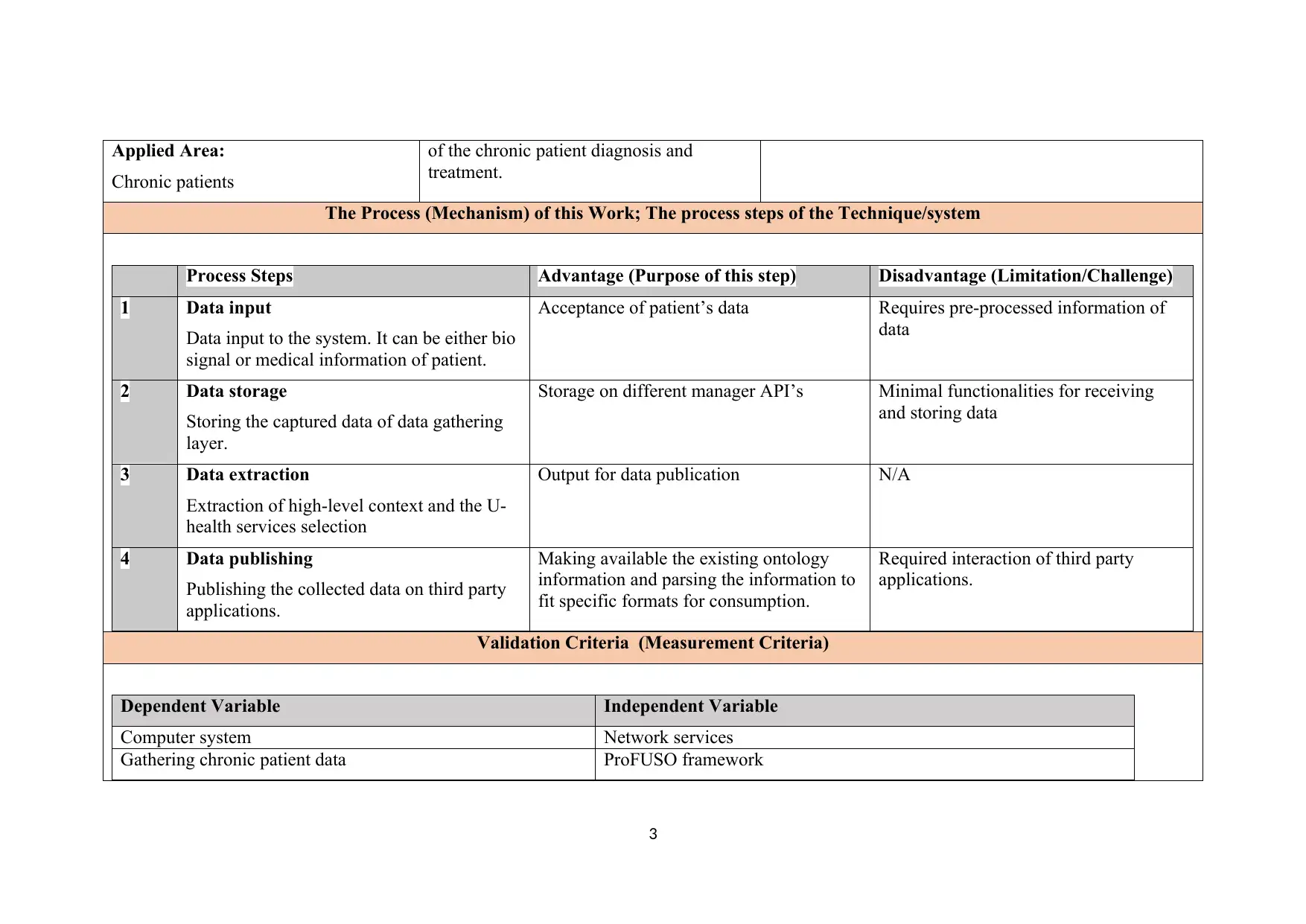
Applied Area:
Chronic patients
of the chronic patient diagnosis and
treatment.
The Process (Mechanism) of this Work; The process steps of the Technique/system
Process Steps Advantage (Purpose of this step) Disadvantage (Limitation/Challenge)
1 Data input
Data input to the system. It can be either bio
signal or medical information of patient.
Acceptance of patient’s data Requires pre-processed information of
data
2 Data storage
Storing the captured data of data gathering
layer.
Storage on different manager API’s Minimal functionalities for receiving
and storing data
3 Data extraction
Extraction of high-level context and the U-
health services selection
Output for data publication N/A
4 Data publishing
Publishing the collected data on third party
applications.
Making available the existing ontology
information and parsing the information to
fit specific formats for consumption.
Required interaction of third party
applications.
Validation Criteria (Measurement Criteria)
Dependent Variable Independent Variable
Computer system Network services
Gathering chronic patient data ProFUSO framework
3
Chronic patients
of the chronic patient diagnosis and
treatment.
The Process (Mechanism) of this Work; The process steps of the Technique/system
Process Steps Advantage (Purpose of this step) Disadvantage (Limitation/Challenge)
1 Data input
Data input to the system. It can be either bio
signal or medical information of patient.
Acceptance of patient’s data Requires pre-processed information of
data
2 Data storage
Storing the captured data of data gathering
layer.
Storage on different manager API’s Minimal functionalities for receiving
and storing data
3 Data extraction
Extraction of high-level context and the U-
health services selection
Output for data publication N/A
4 Data publishing
Publishing the collected data on third party
applications.
Making available the existing ontology
information and parsing the information to
fit specific formats for consumption.
Required interaction of third party
applications.
Validation Criteria (Measurement Criteria)
Dependent Variable Independent Variable
Computer system Network services
Gathering chronic patient data ProFUSO framework
3
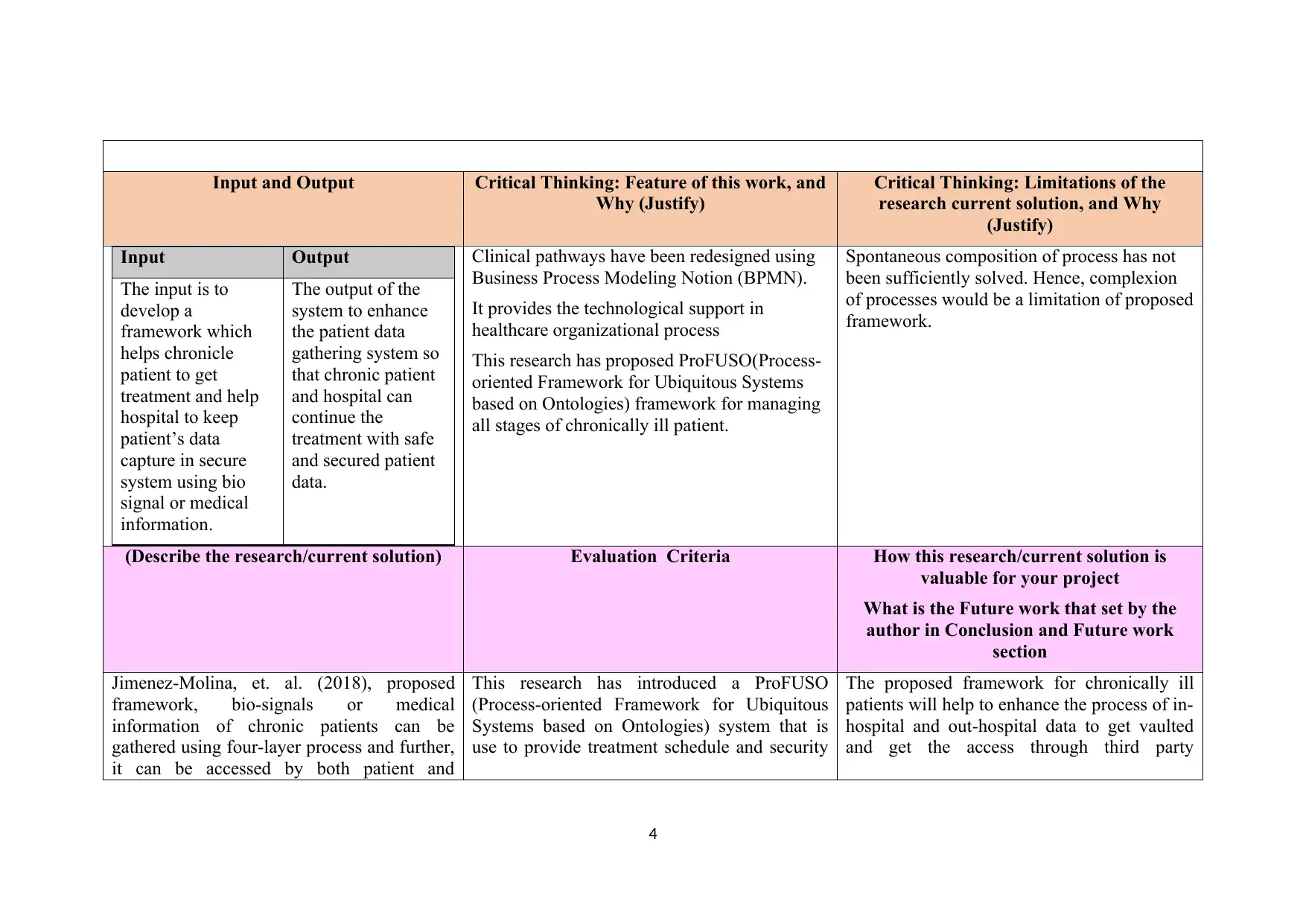
Input and Output Critical Thinking: Feature of this work, and
Why (Justify)
Critical Thinking: Limitations of the
research current solution, and Why
(Justify)
Input Output
The input is to
develop a
framework which
helps chronicle
patient to get
treatment and help
hospital to keep
patient’s data
capture in secure
system using bio
signal or medical
information.
The output of the
system to enhance
the patient data
gathering system so
that chronic patient
and hospital can
continue the
treatment with safe
and secured patient
data.
Clinical pathways have been redesigned using
Business Process Modeling Notion (BPMN).
It provides the technological support in
healthcare organizational process
This research has proposed ProFUSO(Process-
oriented Framework for Ubiquitous Systems
based on Ontologies) framework for managing
all stages of chronically ill patient.
Spontaneous composition of process has not
been sufficiently solved. Hence, complexion
of processes would be a limitation of proposed
framework.
(Describe the research/current solution) Evaluation Criteria How this research/current solution is
valuable for your project
What is the Future work that set by the
author in Conclusion and Future work
section
Jimenez-Molina, et. al. (2018), proposed
framework, bio-signals or medical
information of chronic patients can be
gathered using four-layer process and further,
it can be accessed by both patient and
This research has introduced a ProFUSO
(Process-oriented Framework for Ubiquitous
Systems based on Ontologies) system that is
use to provide treatment schedule and security
The proposed framework for chronically ill
patients will help to enhance the process of in-
hospital and out-hospital data to get vaulted
and get the access through third party
4
Why (Justify)
Critical Thinking: Limitations of the
research current solution, and Why
(Justify)
Input Output
The input is to
develop a
framework which
helps chronicle
patient to get
treatment and help
hospital to keep
patient’s data
capture in secure
system using bio
signal or medical
information.
The output of the
system to enhance
the patient data
gathering system so
that chronic patient
and hospital can
continue the
treatment with safe
and secured patient
data.
Clinical pathways have been redesigned using
Business Process Modeling Notion (BPMN).
It provides the technological support in
healthcare organizational process
This research has proposed ProFUSO(Process-
oriented Framework for Ubiquitous Systems
based on Ontologies) framework for managing
all stages of chronically ill patient.
Spontaneous composition of process has not
been sufficiently solved. Hence, complexion
of processes would be a limitation of proposed
framework.
(Describe the research/current solution) Evaluation Criteria How this research/current solution is
valuable for your project
What is the Future work that set by the
author in Conclusion and Future work
section
Jimenez-Molina, et. al. (2018), proposed
framework, bio-signals or medical
information of chronic patients can be
gathered using four-layer process and further,
it can be accessed by both patient and
This research has introduced a ProFUSO
(Process-oriented Framework for Ubiquitous
Systems based on Ontologies) system that is
use to provide treatment schedule and security
The proposed framework for chronically ill
patients will help to enhance the process of in-
hospital and out-hospital data to get vaulted
and get the access through third party
4
Secure Best Marks with AI Grader
Need help grading? Try our AI Grader for instant feedback on your assignments.
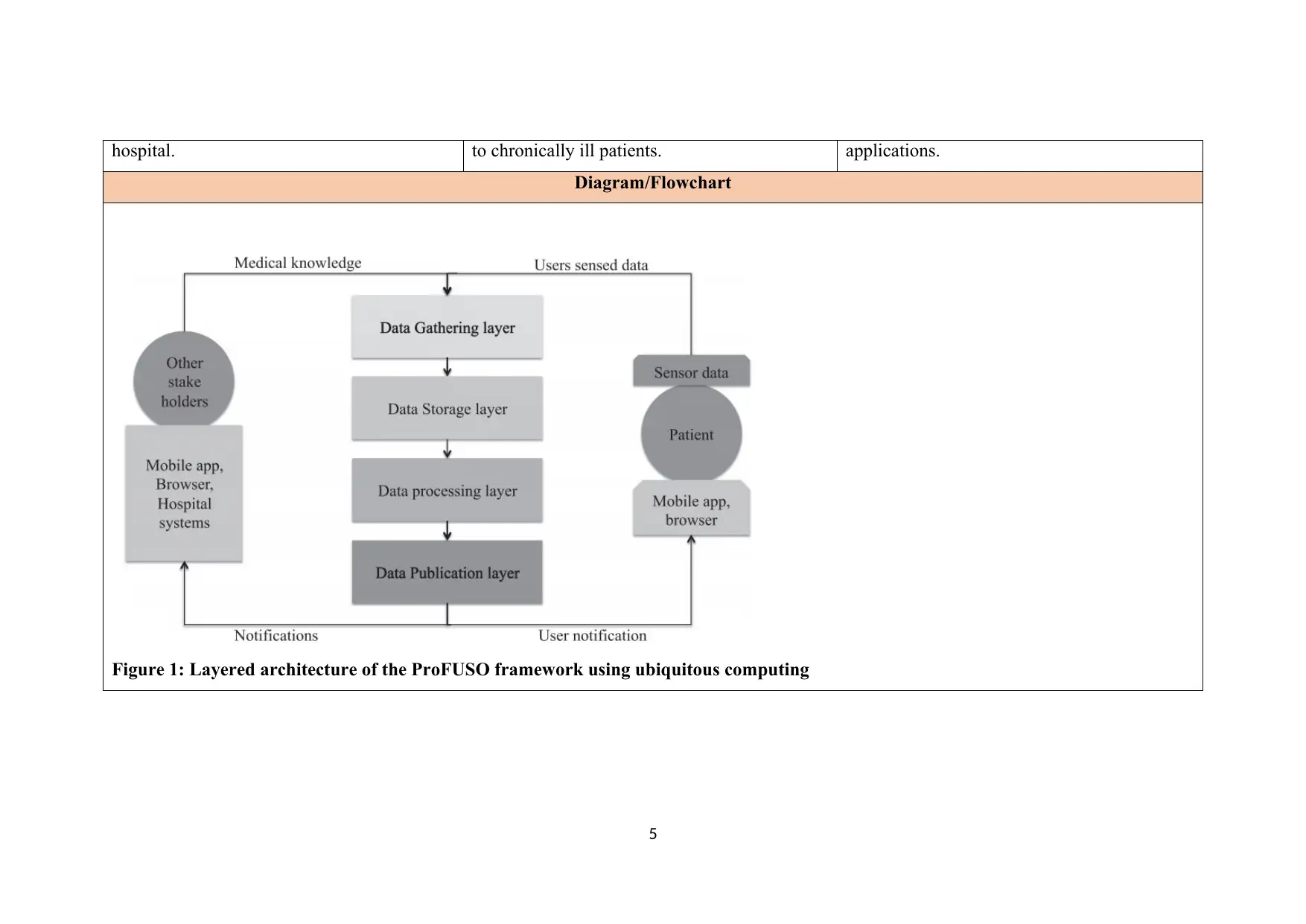
hospital. to chronically ill patients. applications.
Diagram/Flowchart
Figure 1: Layered architecture of the ProFUSO framework using ubiquitous computing
5
Diagram/Flowchart
Figure 1: Layered architecture of the ProFUSO framework using ubiquitous computing
5
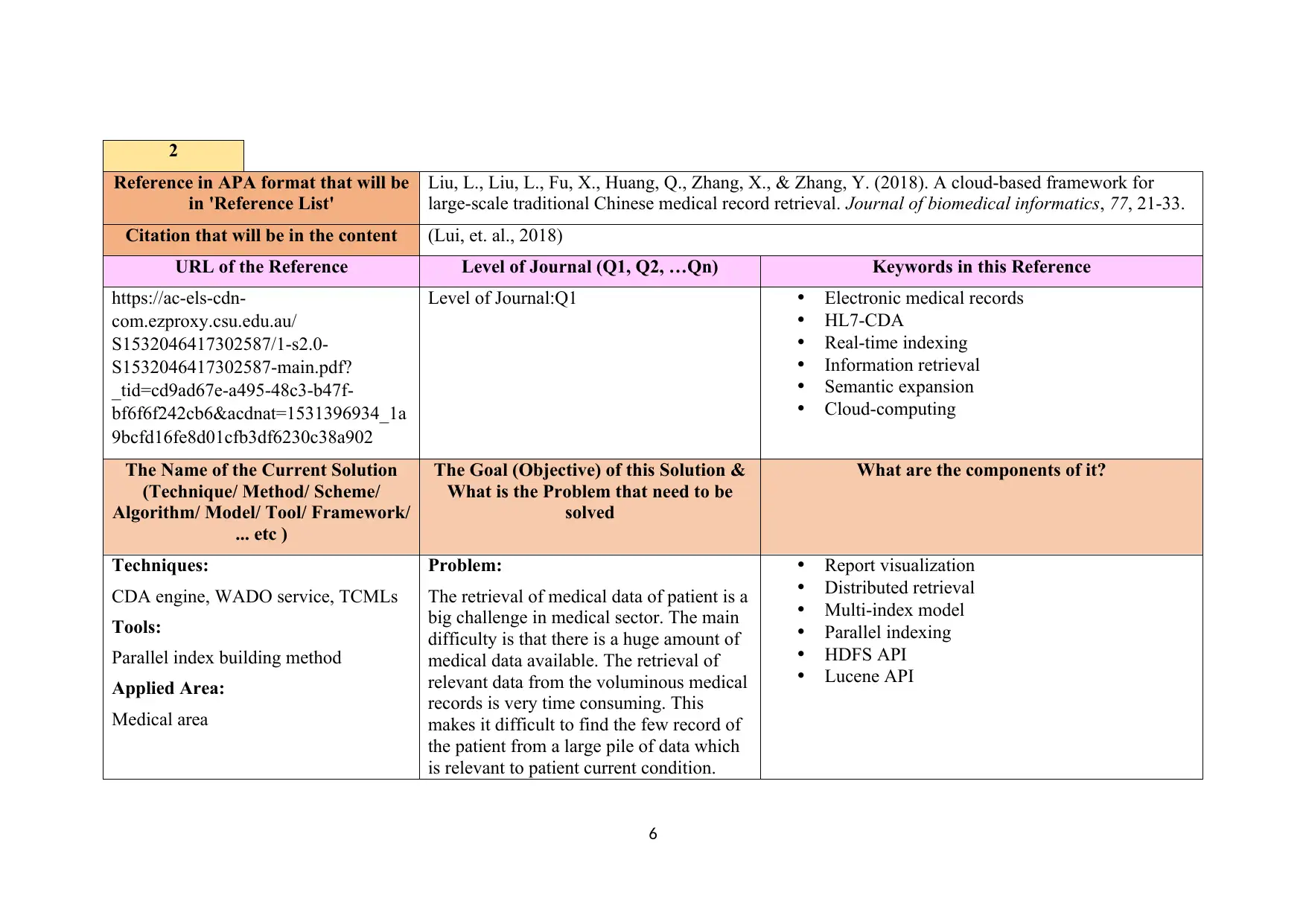
2
Reference in APA format that will be
in 'Reference List'
Liu, L., Liu, L., Fu, X., Huang, Q., Zhang, X., & Zhang, Y. (2018). A cloud-based framework for
large-scale traditional Chinese medical record retrieval. Journal of biomedical informatics, 77, 21-33.
Citation that will be in the content (Lui, et. al., 2018)
URL of the Reference Level of Journal (Q1, Q2, …Qn) Keywords in this Reference
https://ac-els-cdn-
com.ezproxy.csu.edu.au/
S1532046417302587/1-s2.0-
S1532046417302587-main.pdf?
_tid=cd9ad67e-a495-48c3-b47f-
bf6f6f242cb6&acdnat=1531396934_1a
9bcfd16fe8d01cfb3df6230c38a902
Level of Journal:Q1 Electronic medical records
HL7-CDA
Real-time indexing
Information retrieval
Semantic expansion
Cloud-computing
The Name of the Current Solution
(Technique/ Method/ Scheme/
Algorithm/ Model/ Tool/ Framework/
... etc )
The Goal (Objective) of this Solution &
What is the Problem that need to be
solved
What are the components of it?
Techniques:
CDA engine, WADO service, TCMLs
Tools:
Parallel index building method
Applied Area:
Medical area
Problem:
The retrieval of medical data of patient is a
big challenge in medical sector. The main
difficulty is that there is a huge amount of
medical data available. The retrieval of
relevant data from the voluminous medical
records is very time consuming. This
makes it difficult to find the few record of
the patient from a large pile of data which
is relevant to patient current condition.
Report visualization
Distributed retrieval
Multi-index model
Parallel indexing
HDFS API
Lucene API
6
Reference in APA format that will be
in 'Reference List'
Liu, L., Liu, L., Fu, X., Huang, Q., Zhang, X., & Zhang, Y. (2018). A cloud-based framework for
large-scale traditional Chinese medical record retrieval. Journal of biomedical informatics, 77, 21-33.
Citation that will be in the content (Lui, et. al., 2018)
URL of the Reference Level of Journal (Q1, Q2, …Qn) Keywords in this Reference
https://ac-els-cdn-
com.ezproxy.csu.edu.au/
S1532046417302587/1-s2.0-
S1532046417302587-main.pdf?
_tid=cd9ad67e-a495-48c3-b47f-
bf6f6f242cb6&acdnat=1531396934_1a
9bcfd16fe8d01cfb3df6230c38a902
Level of Journal:Q1 Electronic medical records
HL7-CDA
Real-time indexing
Information retrieval
Semantic expansion
Cloud-computing
The Name of the Current Solution
(Technique/ Method/ Scheme/
Algorithm/ Model/ Tool/ Framework/
... etc )
The Goal (Objective) of this Solution &
What is the Problem that need to be
solved
What are the components of it?
Techniques:
CDA engine, WADO service, TCMLs
Tools:
Parallel index building method
Applied Area:
Medical area
Problem:
The retrieval of medical data of patient is a
big challenge in medical sector. The main
difficulty is that there is a huge amount of
medical data available. The retrieval of
relevant data from the voluminous medical
records is very time consuming. This
makes it difficult to find the few record of
the patient from a large pile of data which
is relevant to patient current condition.
Report visualization
Distributed retrieval
Multi-index model
Parallel indexing
HDFS API
Lucene API
6
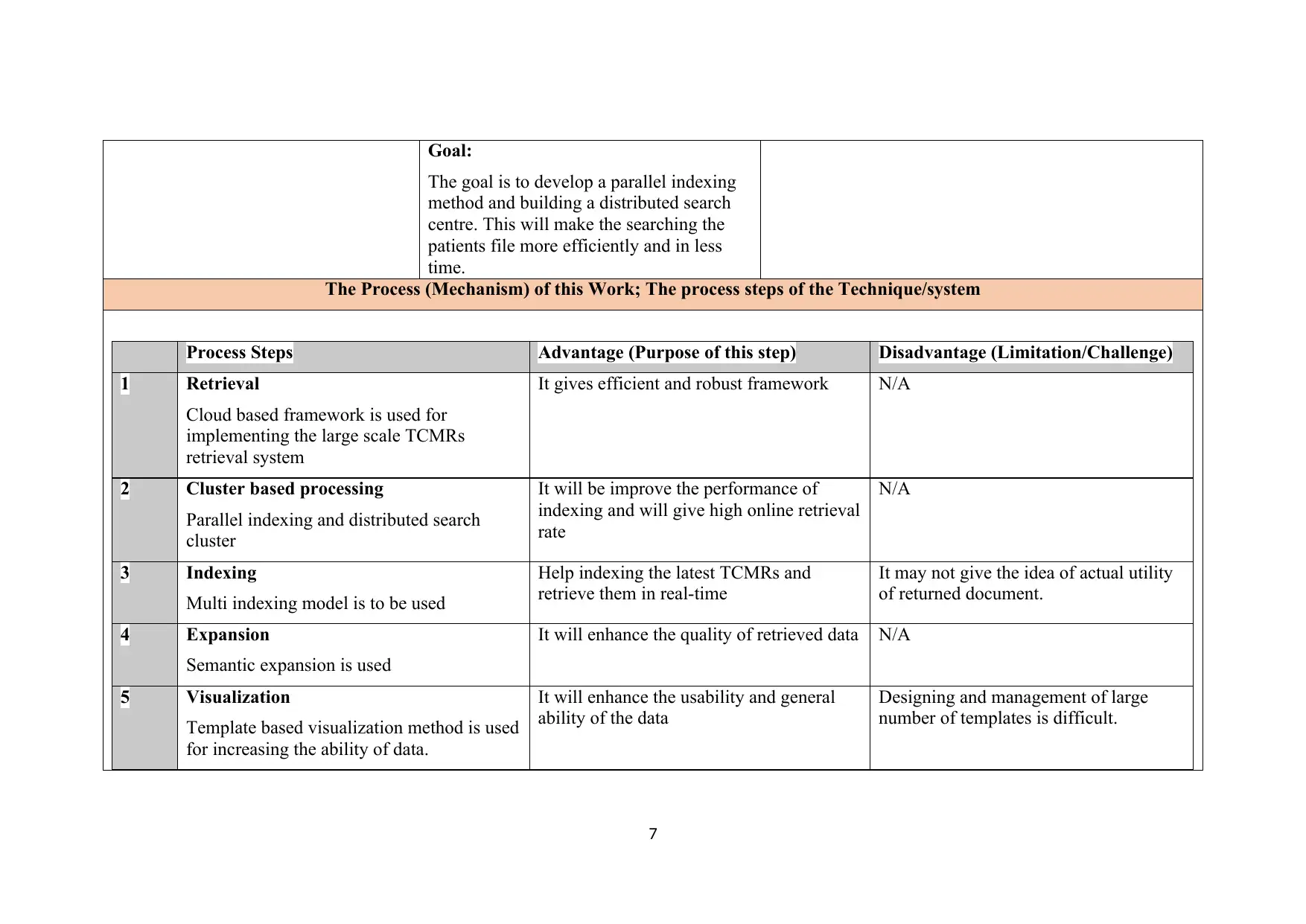
Goal:
The goal is to develop a parallel indexing
method and building a distributed search
centre. This will make the searching the
patients file more efficiently and in less
time.
The Process (Mechanism) of this Work; The process steps of the Technique/system
Process Steps Advantage (Purpose of this step) Disadvantage (Limitation/Challenge)
1 Retrieval
Cloud based framework is used for
implementing the large scale TCMRs
retrieval system
It gives efficient and robust framework N/A
2 Cluster based processing
Parallel indexing and distributed search
cluster
It will be improve the performance of
indexing and will give high online retrieval
rate
N/A
3 Indexing
Multi indexing model is to be used
Help indexing the latest TCMRs and
retrieve them in real-time
It may not give the idea of actual utility
of returned document.
4 Expansion
Semantic expansion is used
It will enhance the quality of retrieved data N/A
5 Visualization
Template based visualization method is used
for increasing the ability of data.
It will enhance the usability and general
ability of the data
Designing and management of large
number of templates is difficult.
7
The goal is to develop a parallel indexing
method and building a distributed search
centre. This will make the searching the
patients file more efficiently and in less
time.
The Process (Mechanism) of this Work; The process steps of the Technique/system
Process Steps Advantage (Purpose of this step) Disadvantage (Limitation/Challenge)
1 Retrieval
Cloud based framework is used for
implementing the large scale TCMRs
retrieval system
It gives efficient and robust framework N/A
2 Cluster based processing
Parallel indexing and distributed search
cluster
It will be improve the performance of
indexing and will give high online retrieval
rate
N/A
3 Indexing
Multi indexing model is to be used
Help indexing the latest TCMRs and
retrieve them in real-time
It may not give the idea of actual utility
of returned document.
4 Expansion
Semantic expansion is used
It will enhance the quality of retrieved data N/A
5 Visualization
Template based visualization method is used
for increasing the ability of data.
It will enhance the usability and general
ability of the data
Designing and management of large
number of templates is difficult.
7
Paraphrase This Document
Need a fresh take? Get an instant paraphrase of this document with our AI Paraphraser
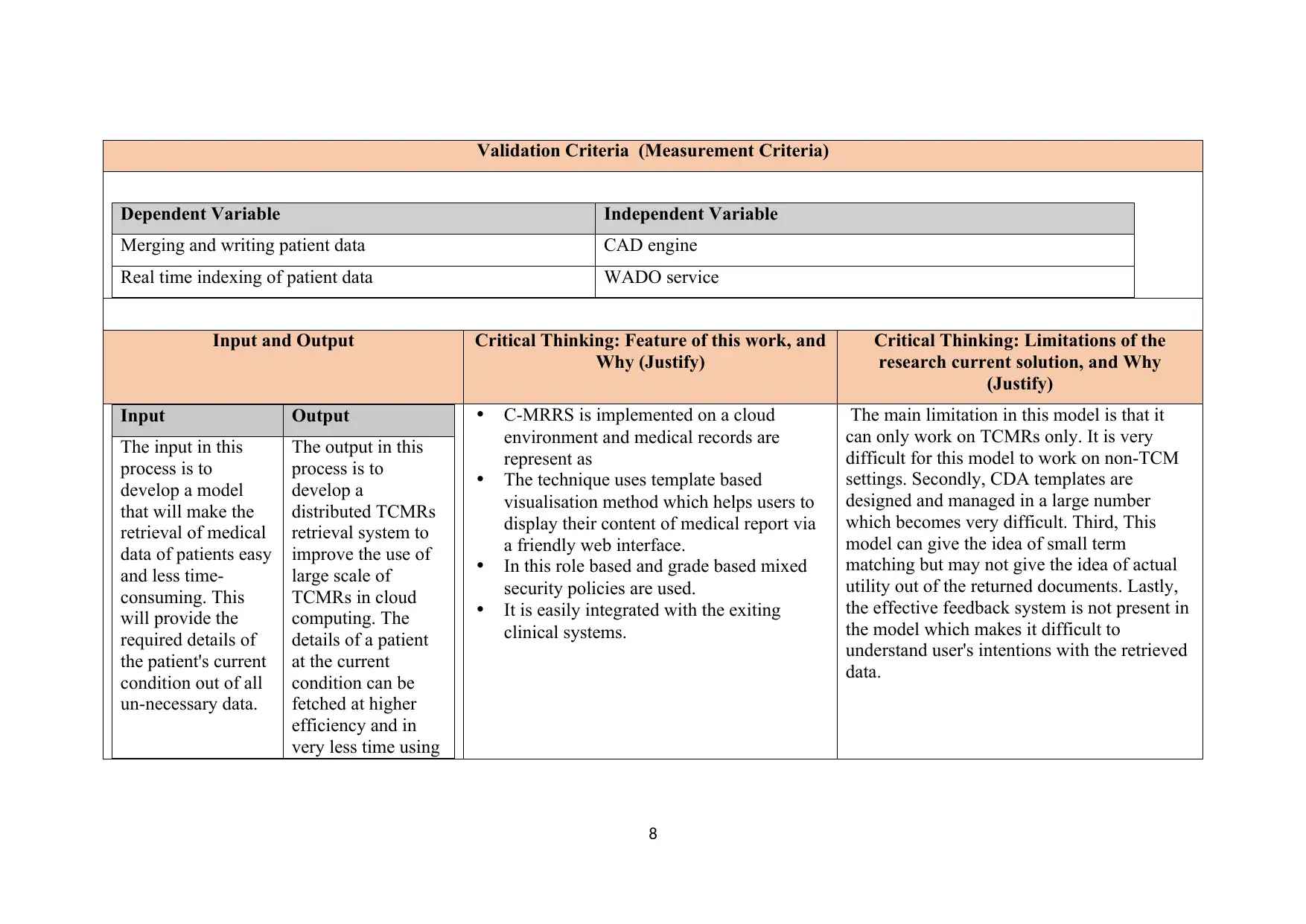
Validation Criteria (Measurement Criteria)
Dependent Variable Independent Variable
Merging and writing patient data CAD engine
Real time indexing of patient data WADO service
Input and Output Critical Thinking: Feature of this work, and
Why (Justify)
Critical Thinking: Limitations of the
research current solution, and Why
(Justify)
Input Output
The input in this
process is to
develop a model
that will make the
retrieval of medical
data of patients easy
and less time-
consuming. This
will provide the
required details of
the patient's current
condition out of all
un-necessary data.
The output in this
process is to
develop a
distributed TCMRs
retrieval system to
improve the use of
large scale of
TCMRs in cloud
computing. The
details of a patient
at the current
condition can be
fetched at higher
efficiency and in
very less time using
C-MRRS is implemented on a cloud
environment and medical records are
represent as
The technique uses template based
visualisation method which helps users to
display their content of medical report via
a friendly web interface.
In this role based and grade based mixed
security policies are used.
It is easily integrated with the exiting
clinical systems.
The main limitation in this model is that it
can only work on TCMRs only. It is very
difficult for this model to work on non-TCM
settings. Secondly, CDA templates are
designed and managed in a large number
which becomes very difficult. Third, This
model can give the idea of small term
matching but may not give the idea of actual
utility out of the returned documents. Lastly,
the effective feedback system is not present in
the model which makes it difficult to
understand user's intentions with the retrieved
data.
8
Dependent Variable Independent Variable
Merging and writing patient data CAD engine
Real time indexing of patient data WADO service
Input and Output Critical Thinking: Feature of this work, and
Why (Justify)
Critical Thinking: Limitations of the
research current solution, and Why
(Justify)
Input Output
The input in this
process is to
develop a model
that will make the
retrieval of medical
data of patients easy
and less time-
consuming. This
will provide the
required details of
the patient's current
condition out of all
un-necessary data.
The output in this
process is to
develop a
distributed TCMRs
retrieval system to
improve the use of
large scale of
TCMRs in cloud
computing. The
details of a patient
at the current
condition can be
fetched at higher
efficiency and in
very less time using
C-MRRS is implemented on a cloud
environment and medical records are
represent as
The technique uses template based
visualisation method which helps users to
display their content of medical report via
a friendly web interface.
In this role based and grade based mixed
security policies are used.
It is easily integrated with the exiting
clinical systems.
The main limitation in this model is that it
can only work on TCMRs only. It is very
difficult for this model to work on non-TCM
settings. Secondly, CDA templates are
designed and managed in a large number
which becomes very difficult. Third, This
model can give the idea of small term
matching but may not give the idea of actual
utility out of the returned documents. Lastly,
the effective feedback system is not present in
the model which makes it difficult to
understand user's intentions with the retrieved
data.
8
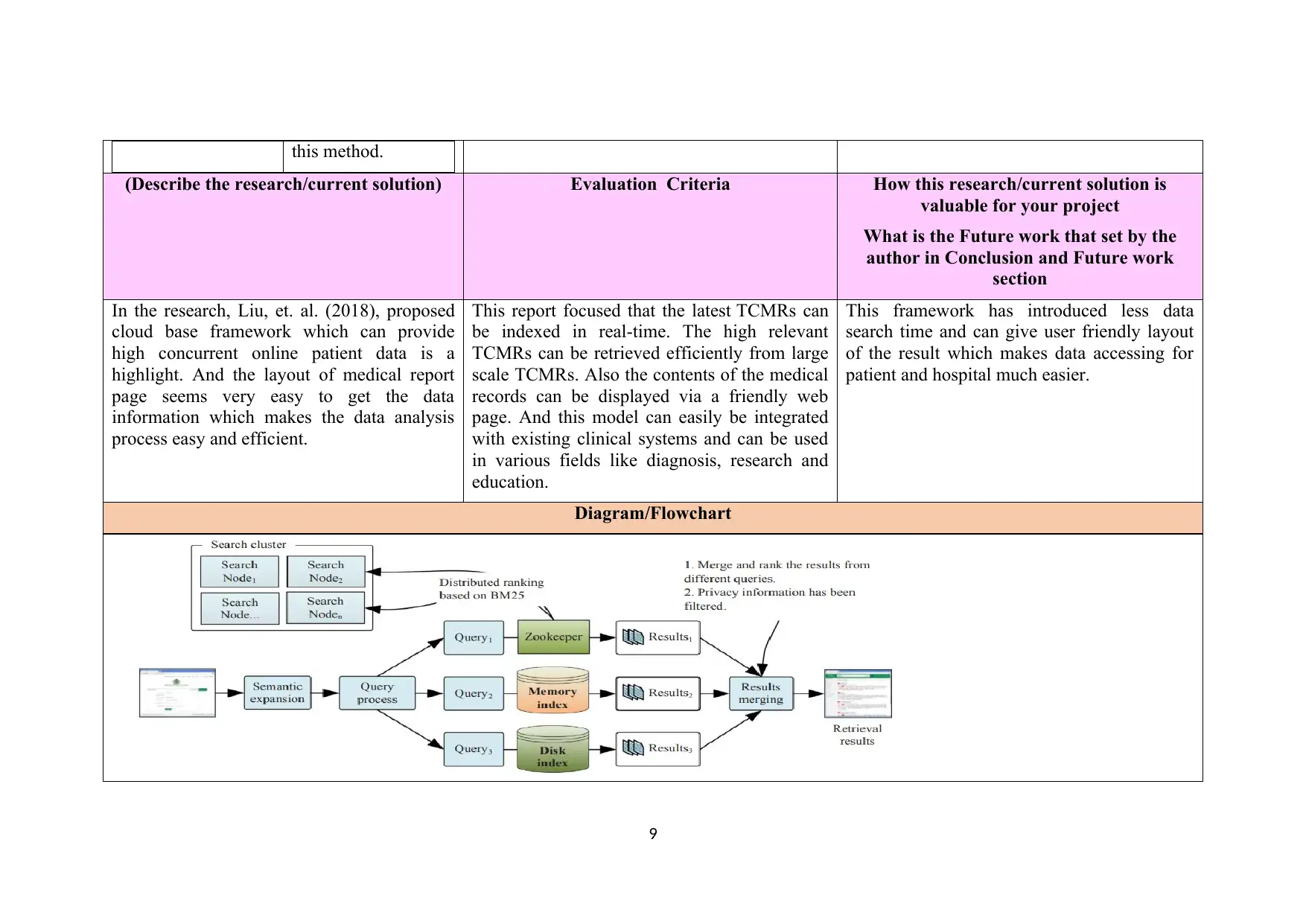
this method.
(Describe the research/current solution) Evaluation Criteria How this research/current solution is
valuable for your project
What is the Future work that set by the
author in Conclusion and Future work
section
In the research, Liu, et. al. (2018), proposed
cloud base framework which can provide
high concurrent online patient data is a
highlight. And the layout of medical report
page seems very easy to get the data
information which makes the data analysis
process easy and efficient.
This report focused that the latest TCMRs can
be indexed in real-time. The high relevant
TCMRs can be retrieved efficiently from large
scale TCMRs. Also the contents of the medical
records can be displayed via a friendly web
page. And this model can easily be integrated
with existing clinical systems and can be used
in various fields like diagnosis, research and
education.
This framework has introduced less data
search time and can give user friendly layout
of the result which makes data accessing for
patient and hospital much easier.
Diagram/Flowchart
9
(Describe the research/current solution) Evaluation Criteria How this research/current solution is
valuable for your project
What is the Future work that set by the
author in Conclusion and Future work
section
In the research, Liu, et. al. (2018), proposed
cloud base framework which can provide
high concurrent online patient data is a
highlight. And the layout of medical report
page seems very easy to get the data
information which makes the data analysis
process easy and efficient.
This report focused that the latest TCMRs can
be indexed in real-time. The high relevant
TCMRs can be retrieved efficiently from large
scale TCMRs. Also the contents of the medical
records can be displayed via a friendly web
page. And this model can easily be integrated
with existing clinical systems and can be used
in various fields like diagnosis, research and
education.
This framework has introduced less data
search time and can give user friendly layout
of the result which makes data accessing for
patient and hospital much easier.
Diagram/Flowchart
9
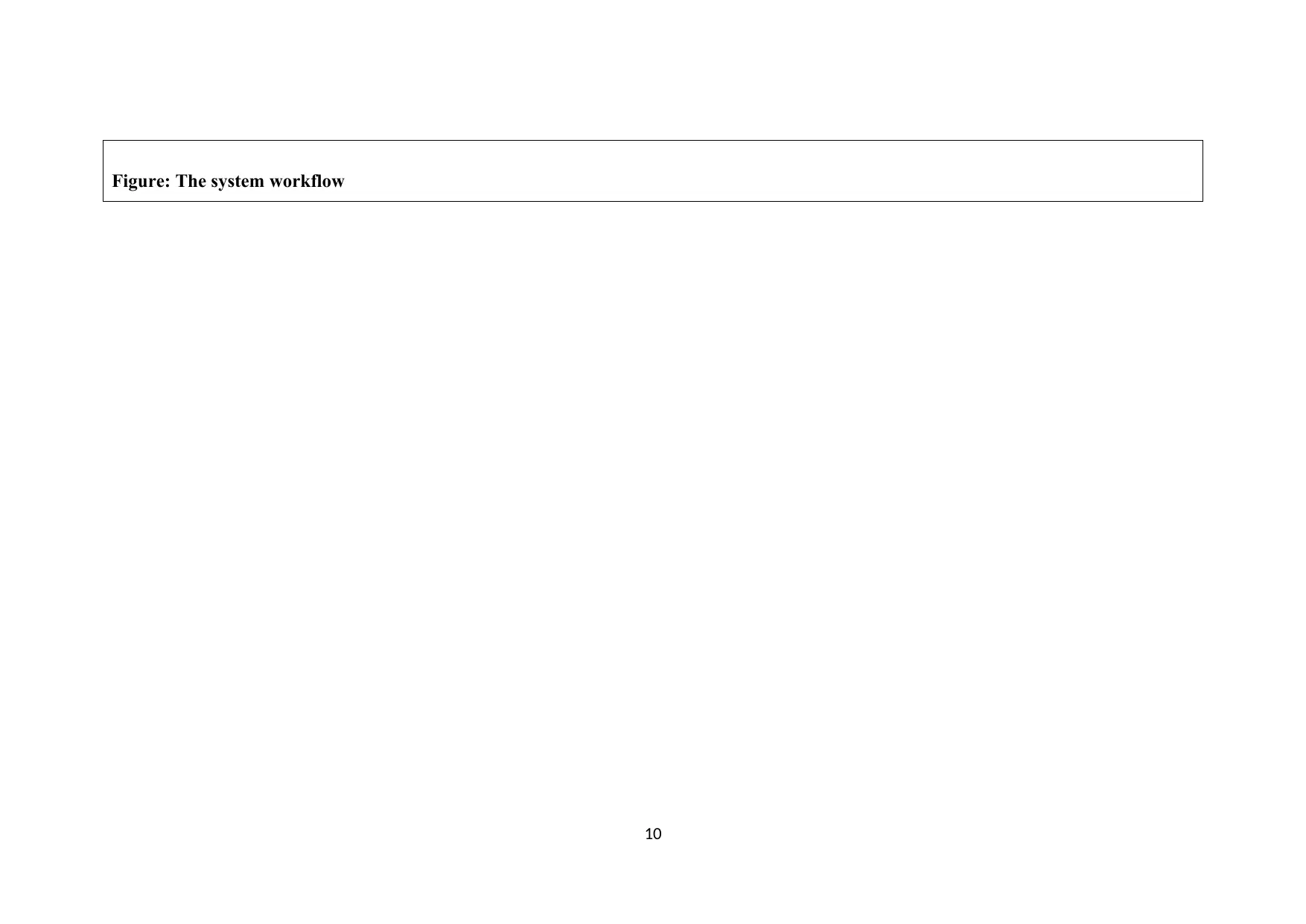
Figure: The system workflow
10
10
Secure Best Marks with AI Grader
Need help grading? Try our AI Grader for instant feedback on your assignments.
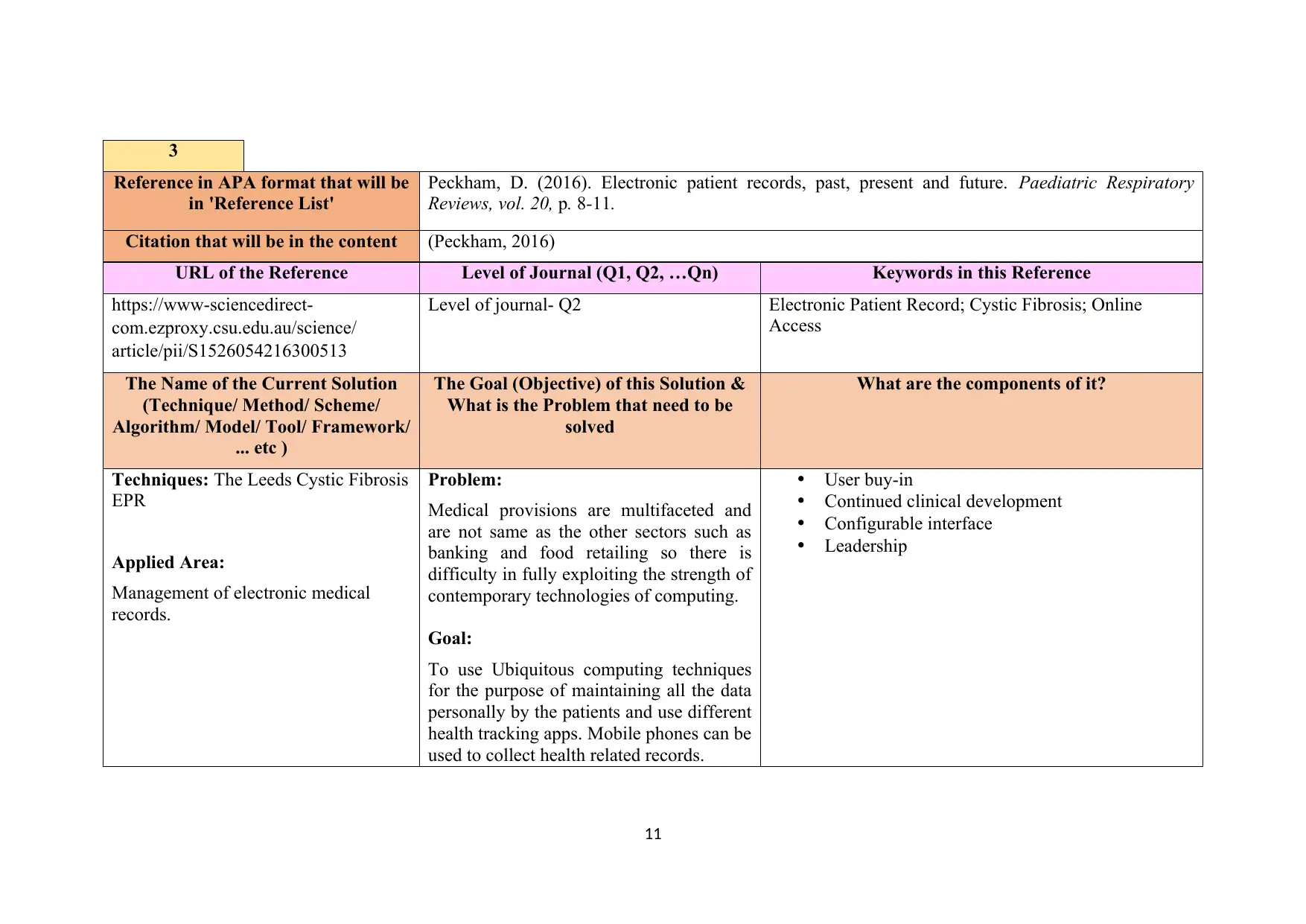
3
Reference in APA format that will be
in 'Reference List'
Peckham, D. (2016). Electronic patient records, past, present and future. Paediatric Respiratory
Reviews, vol. 20, p. 8-11.
Citation that will be in the content (Peckham, 2016)
URL of the Reference Level of Journal (Q1, Q2, …Qn) Keywords in this Reference
https://www-sciencedirect-
com.ezproxy.csu.edu.au/science/
article/pii/S1526054216300513
Level of journal- Q2 Electronic Patient Record; Cystic Fibrosis; Online
Access
The Name of the Current Solution
(Technique/ Method/ Scheme/
Algorithm/ Model/ Tool/ Framework/
... etc )
The Goal (Objective) of this Solution &
What is the Problem that need to be
solved
What are the components of it?
Techniques: The Leeds Cystic Fibrosis
EPR
Applied Area:
Management of electronic medical
records.
Problem:
Medical provisions are multifaceted and
are not same as the other sectors such as
banking and food retailing so there is
difficulty in fully exploiting the strength of
contemporary technologies of computing.
Goal:
To use Ubiquitous computing techniques
for the purpose of maintaining all the data
personally by the patients and use different
health tracking apps. Mobile phones can be
used to collect health related records.
User buy-in
Continued clinical development
Configurable interface
Leadership
11
Reference in APA format that will be
in 'Reference List'
Peckham, D. (2016). Electronic patient records, past, present and future. Paediatric Respiratory
Reviews, vol. 20, p. 8-11.
Citation that will be in the content (Peckham, 2016)
URL of the Reference Level of Journal (Q1, Q2, …Qn) Keywords in this Reference
https://www-sciencedirect-
com.ezproxy.csu.edu.au/science/
article/pii/S1526054216300513
Level of journal- Q2 Electronic Patient Record; Cystic Fibrosis; Online
Access
The Name of the Current Solution
(Technique/ Method/ Scheme/
Algorithm/ Model/ Tool/ Framework/
... etc )
The Goal (Objective) of this Solution &
What is the Problem that need to be
solved
What are the components of it?
Techniques: The Leeds Cystic Fibrosis
EPR
Applied Area:
Management of electronic medical
records.
Problem:
Medical provisions are multifaceted and
are not same as the other sectors such as
banking and food retailing so there is
difficulty in fully exploiting the strength of
contemporary technologies of computing.
Goal:
To use Ubiquitous computing techniques
for the purpose of maintaining all the data
personally by the patients and use different
health tracking apps. Mobile phones can be
used to collect health related records.
User buy-in
Continued clinical development
Configurable interface
Leadership
11
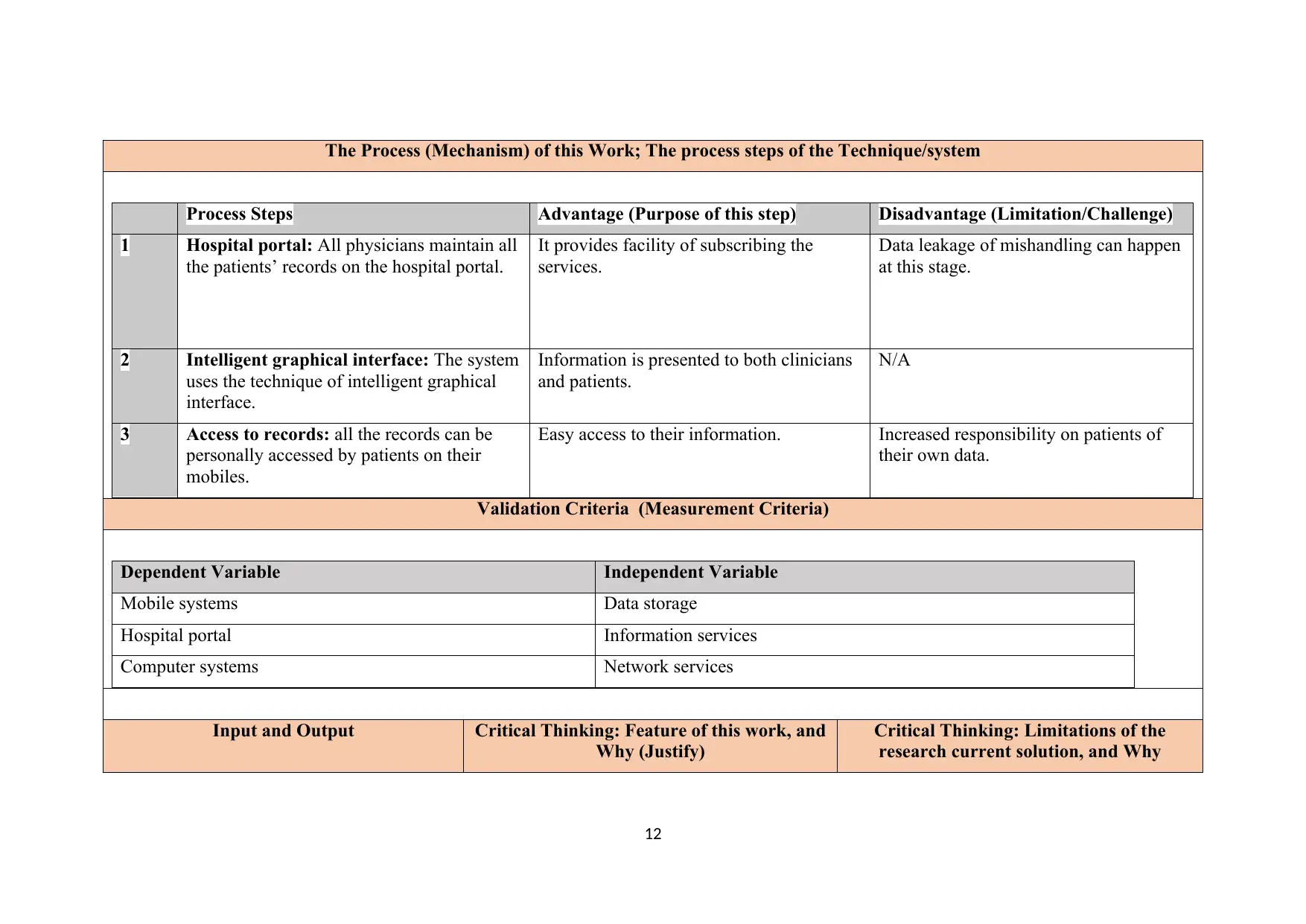
The Process (Mechanism) of this Work; The process steps of the Technique/system
Process Steps Advantage (Purpose of this step) Disadvantage (Limitation/Challenge)
1 Hospital portal: All physicians maintain all
the patients’ records on the hospital portal.
It provides facility of subscribing the
services.
Data leakage of mishandling can happen
at this stage.
2 Intelligent graphical interface: The system
uses the technique of intelligent graphical
interface.
Information is presented to both clinicians
and patients.
N/A
3 Access to records: all the records can be
personally accessed by patients on their
mobiles.
Easy access to their information. Increased responsibility on patients of
their own data.
Validation Criteria (Measurement Criteria)
Dependent Variable Independent Variable
Mobile systems Data storage
Hospital portal Information services
Computer systems Network services
Input and Output Critical Thinking: Feature of this work, and
Why (Justify)
Critical Thinking: Limitations of the
research current solution, and Why
12
Process Steps Advantage (Purpose of this step) Disadvantage (Limitation/Challenge)
1 Hospital portal: All physicians maintain all
the patients’ records on the hospital portal.
It provides facility of subscribing the
services.
Data leakage of mishandling can happen
at this stage.
2 Intelligent graphical interface: The system
uses the technique of intelligent graphical
interface.
Information is presented to both clinicians
and patients.
N/A
3 Access to records: all the records can be
personally accessed by patients on their
mobiles.
Easy access to their information. Increased responsibility on patients of
their own data.
Validation Criteria (Measurement Criteria)
Dependent Variable Independent Variable
Mobile systems Data storage
Hospital portal Information services
Computer systems Network services
Input and Output Critical Thinking: Feature of this work, and
Why (Justify)
Critical Thinking: Limitations of the
research current solution, and Why
12
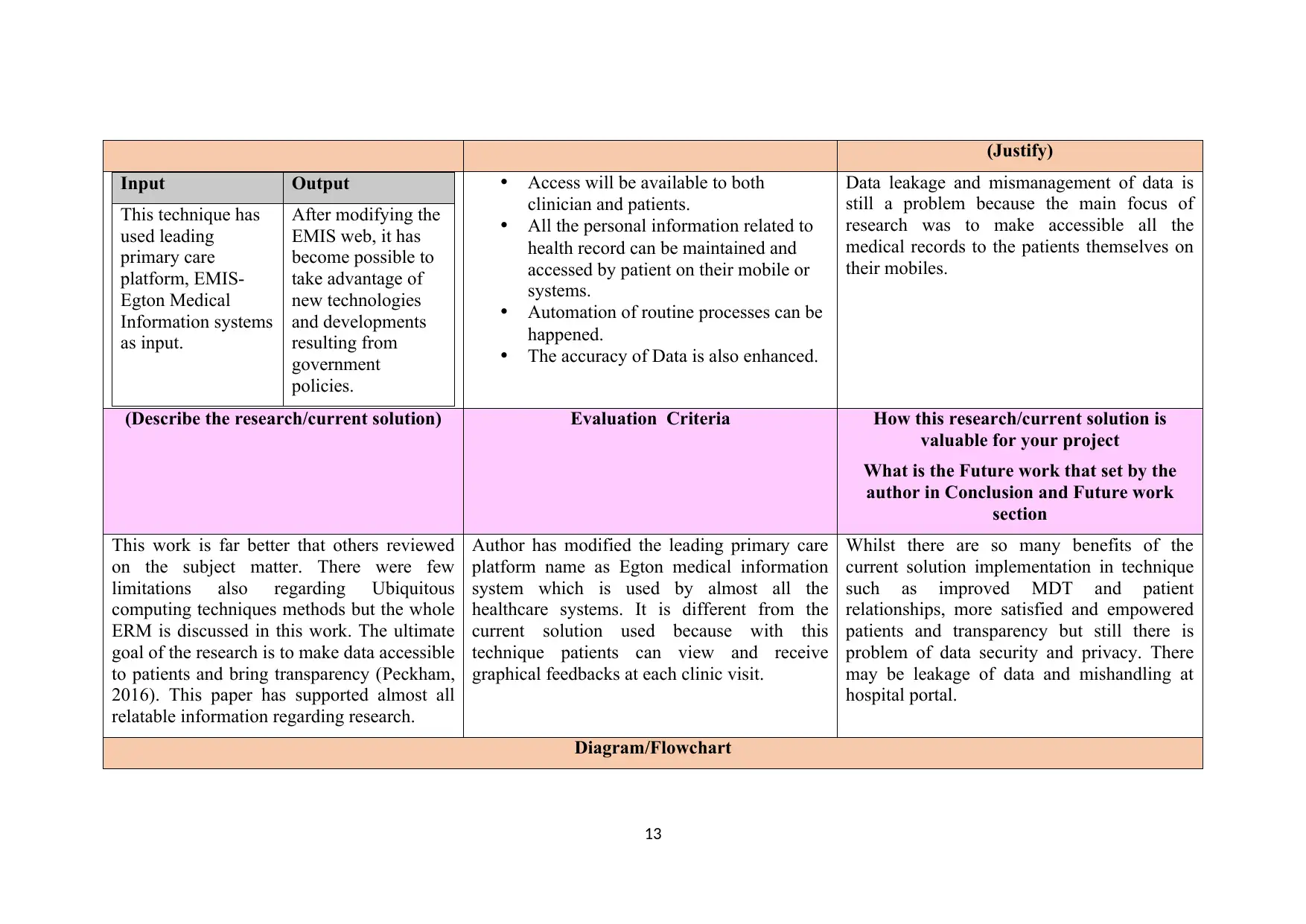
(Justify)
Input Output
This technique has
used leading
primary care
platform, EMIS-
Egton Medical
Information systems
as input.
After modifying the
EMIS web, it has
become possible to
take advantage of
new technologies
and developments
resulting from
government
policies.
Access will be available to both
clinician and patients.
All the personal information related to
health record can be maintained and
accessed by patient on their mobile or
systems.
Automation of routine processes can be
happened.
The accuracy of Data is also enhanced.
Data leakage and mismanagement of data is
still a problem because the main focus of
research was to make accessible all the
medical records to the patients themselves on
their mobiles.
(Describe the research/current solution) Evaluation Criteria How this research/current solution is
valuable for your project
What is the Future work that set by the
author in Conclusion and Future work
section
This work is far better that others reviewed
on the subject matter. There were few
limitations also regarding Ubiquitous
computing techniques methods but the whole
ERM is discussed in this work. The ultimate
goal of the research is to make data accessible
to patients and bring transparency (Peckham,
2016). This paper has supported almost all
relatable information regarding research.
Author has modified the leading primary care
platform name as Egton medical information
system which is used by almost all the
healthcare systems. It is different from the
current solution used because with this
technique patients can view and receive
graphical feedbacks at each clinic visit.
Whilst there are so many benefits of the
current solution implementation in technique
such as improved MDT and patient
relationships, more satisfied and empowered
patients and transparency but still there is
problem of data security and privacy. There
may be leakage of data and mishandling at
hospital portal.
Diagram/Flowchart
13
Input Output
This technique has
used leading
primary care
platform, EMIS-
Egton Medical
Information systems
as input.
After modifying the
EMIS web, it has
become possible to
take advantage of
new technologies
and developments
resulting from
government
policies.
Access will be available to both
clinician and patients.
All the personal information related to
health record can be maintained and
accessed by patient on their mobile or
systems.
Automation of routine processes can be
happened.
The accuracy of Data is also enhanced.
Data leakage and mismanagement of data is
still a problem because the main focus of
research was to make accessible all the
medical records to the patients themselves on
their mobiles.
(Describe the research/current solution) Evaluation Criteria How this research/current solution is
valuable for your project
What is the Future work that set by the
author in Conclusion and Future work
section
This work is far better that others reviewed
on the subject matter. There were few
limitations also regarding Ubiquitous
computing techniques methods but the whole
ERM is discussed in this work. The ultimate
goal of the research is to make data accessible
to patients and bring transparency (Peckham,
2016). This paper has supported almost all
relatable information regarding research.
Author has modified the leading primary care
platform name as Egton medical information
system which is used by almost all the
healthcare systems. It is different from the
current solution used because with this
technique patients can view and receive
graphical feedbacks at each clinic visit.
Whilst there are so many benefits of the
current solution implementation in technique
such as improved MDT and patient
relationships, more satisfied and empowered
patients and transparency but still there is
problem of data security and privacy. There
may be leakage of data and mishandling at
hospital portal.
Diagram/Flowchart
13
Paraphrase This Document
Need a fresh take? Get an instant paraphrase of this document with our AI Paraphraser
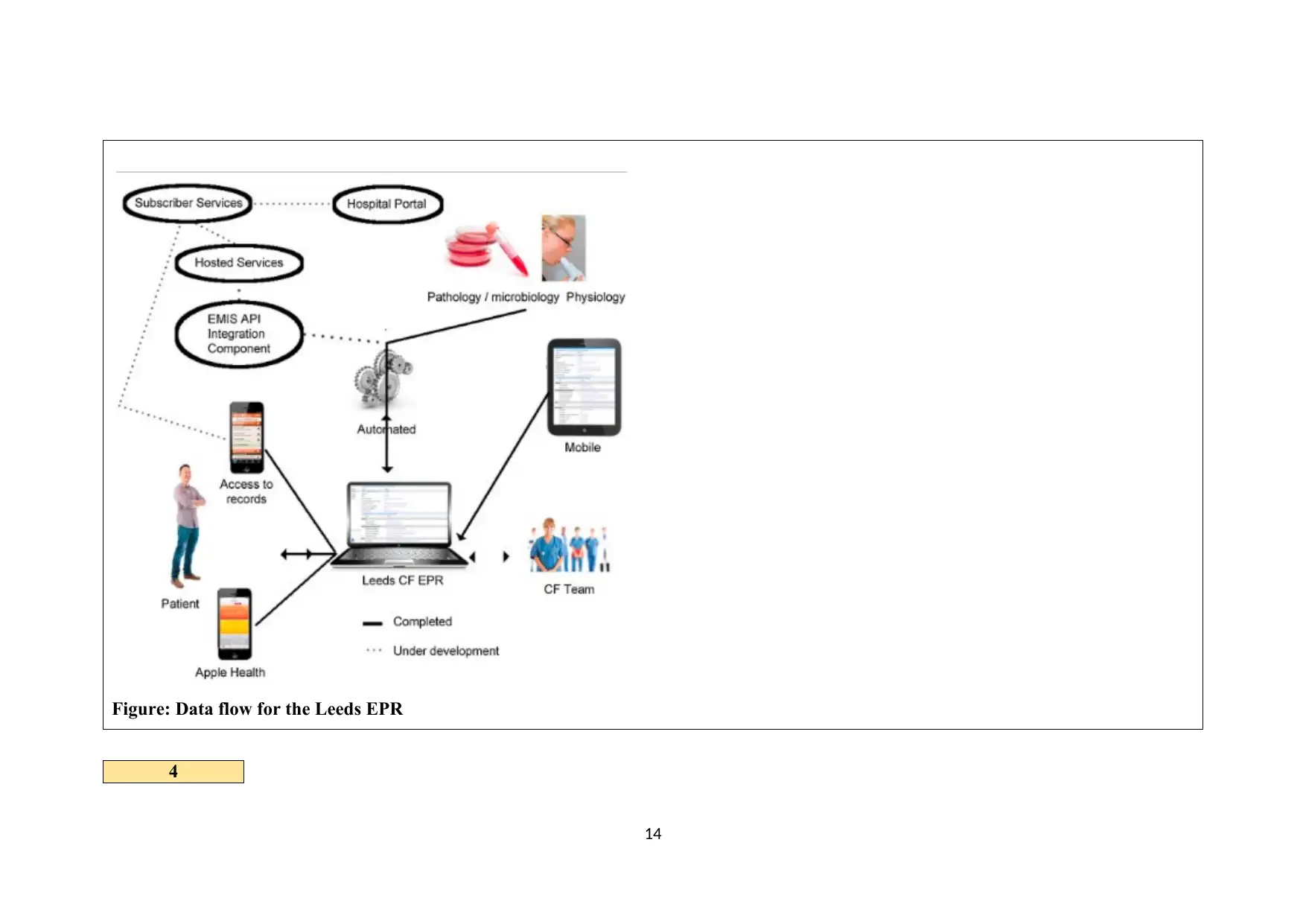
Figure: Data flow for the Leeds EPR
4
14
4
14
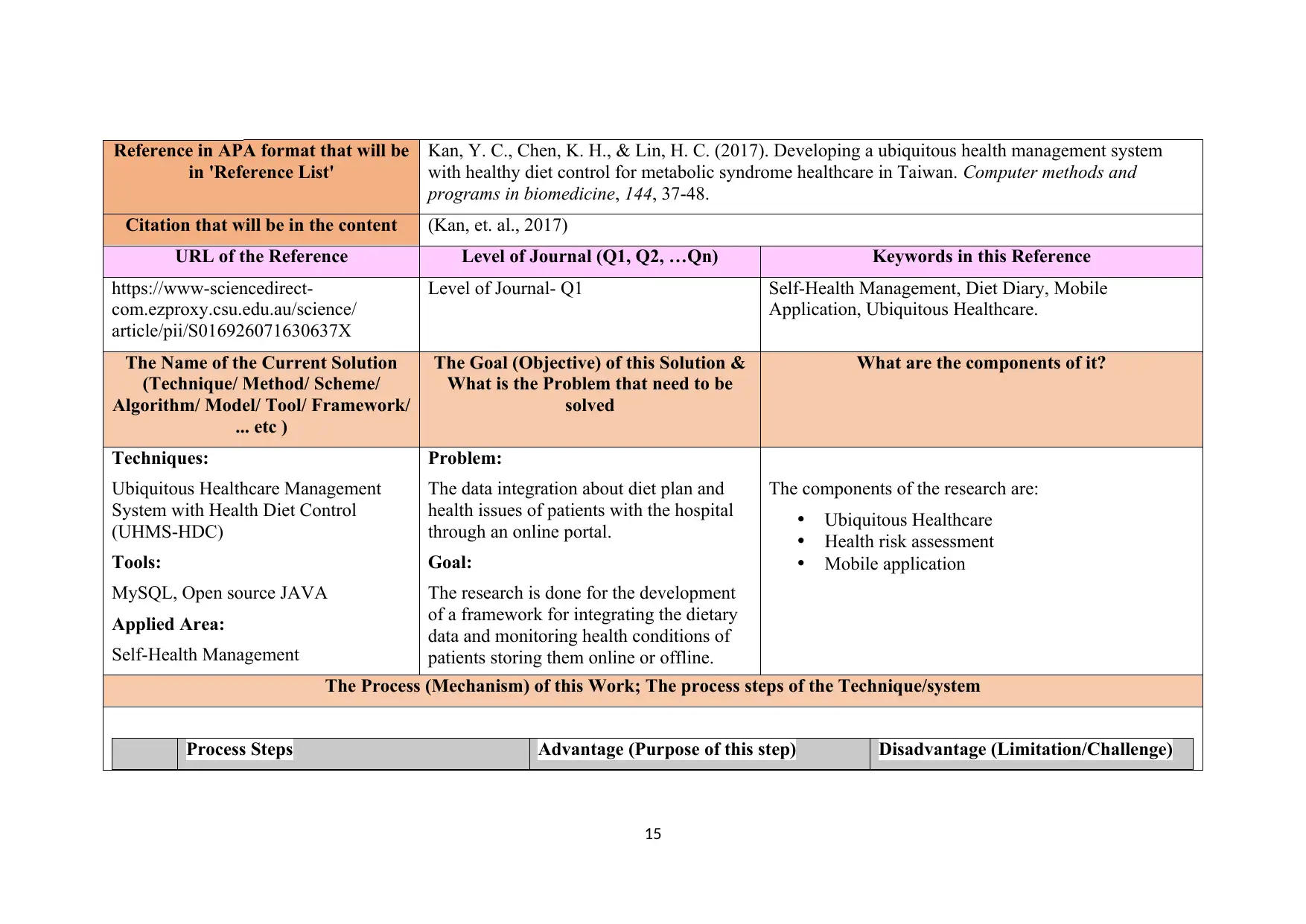
Reference in APA format that will be
in 'Reference List'
Kan, Y. C., Chen, K. H., & Lin, H. C. (2017). Developing a ubiquitous health management system
with healthy diet control for metabolic syndrome healthcare in Taiwan. Computer methods and
programs in biomedicine, 144, 37-48.
Citation that will be in the content (Kan, et. al., 2017)
URL of the Reference Level of Journal (Q1, Q2, …Qn) Keywords in this Reference
https://www-sciencedirect-
com.ezproxy.csu.edu.au/science/
article/pii/S016926071630637X
Level of Journal- Q1 Self-Health Management, Diet Diary, Mobile
Application, Ubiquitous Healthcare.
The Name of the Current Solution
(Technique/ Method/ Scheme/
Algorithm/ Model/ Tool/ Framework/
... etc )
The Goal (Objective) of this Solution &
What is the Problem that need to be
solved
What are the components of it?
Techniques:
Ubiquitous Healthcare Management
System with Health Diet Control
(UHMS-HDC)
Tools:
MySQL, Open source JAVA
Applied Area:
Self-Health Management
Problem:
The data integration about diet plan and
health issues of patients with the hospital
through an online portal.
Goal:
The research is done for the development
of a framework for integrating the dietary
data and monitoring health conditions of
patients storing them online or offline.
The components of the research are:
Ubiquitous Healthcare
Health risk assessment
Mobile application
The Process (Mechanism) of this Work; The process steps of the Technique/system
Process Steps Advantage (Purpose of this step) Disadvantage (Limitation/Challenge)
15
in 'Reference List'
Kan, Y. C., Chen, K. H., & Lin, H. C. (2017). Developing a ubiquitous health management system
with healthy diet control for metabolic syndrome healthcare in Taiwan. Computer methods and
programs in biomedicine, 144, 37-48.
Citation that will be in the content (Kan, et. al., 2017)
URL of the Reference Level of Journal (Q1, Q2, …Qn) Keywords in this Reference
https://www-sciencedirect-
com.ezproxy.csu.edu.au/science/
article/pii/S016926071630637X
Level of Journal- Q1 Self-Health Management, Diet Diary, Mobile
Application, Ubiquitous Healthcare.
The Name of the Current Solution
(Technique/ Method/ Scheme/
Algorithm/ Model/ Tool/ Framework/
... etc )
The Goal (Objective) of this Solution &
What is the Problem that need to be
solved
What are the components of it?
Techniques:
Ubiquitous Healthcare Management
System with Health Diet Control
(UHMS-HDC)
Tools:
MySQL, Open source JAVA
Applied Area:
Self-Health Management
Problem:
The data integration about diet plan and
health issues of patients with the hospital
through an online portal.
Goal:
The research is done for the development
of a framework for integrating the dietary
data and monitoring health conditions of
patients storing them online or offline.
The components of the research are:
Ubiquitous Healthcare
Health risk assessment
Mobile application
The Process (Mechanism) of this Work; The process steps of the Technique/system
Process Steps Advantage (Purpose of this step) Disadvantage (Limitation/Challenge)
15
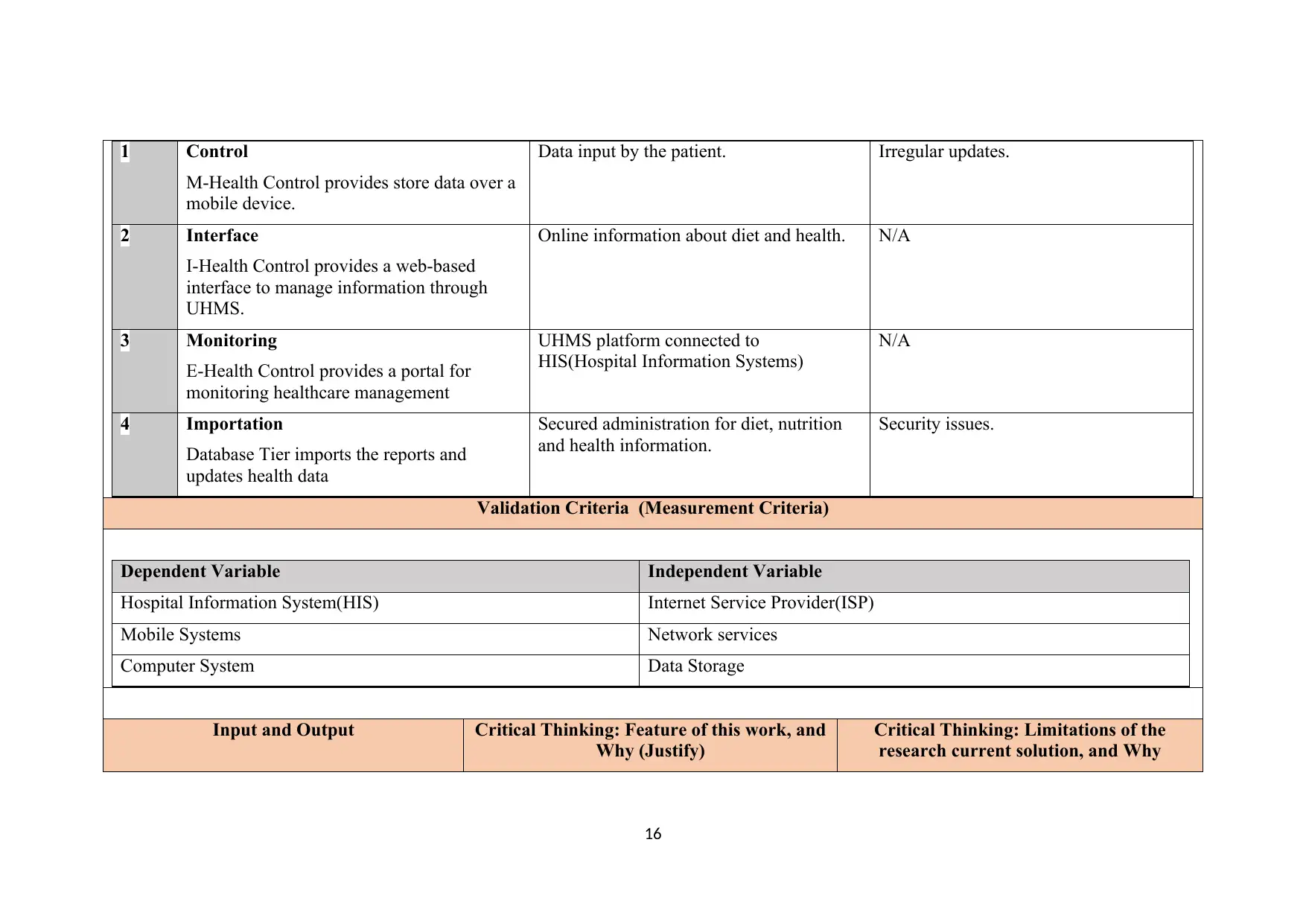
1 Control
M-Health Control provides store data over a
mobile device.
Data input by the patient. Irregular updates.
2 Interface
I-Health Control provides a web-based
interface to manage information through
UHMS.
Online information about diet and health. N/A
3 Monitoring
E-Health Control provides a portal for
monitoring healthcare management
UHMS platform connected to
HIS(Hospital Information Systems)
N/A
4 Importation
Database Tier imports the reports and
updates health data
Secured administration for diet, nutrition
and health information.
Security issues.
Validation Criteria (Measurement Criteria)
Dependent Variable Independent Variable
Hospital Information System(HIS) Internet Service Provider(ISP)
Mobile Systems Network services
Computer System Data Storage
Input and Output Critical Thinking: Feature of this work, and
Why (Justify)
Critical Thinking: Limitations of the
research current solution, and Why
16
M-Health Control provides store data over a
mobile device.
Data input by the patient. Irregular updates.
2 Interface
I-Health Control provides a web-based
interface to manage information through
UHMS.
Online information about diet and health. N/A
3 Monitoring
E-Health Control provides a portal for
monitoring healthcare management
UHMS platform connected to
HIS(Hospital Information Systems)
N/A
4 Importation
Database Tier imports the reports and
updates health data
Secured administration for diet, nutrition
and health information.
Security issues.
Validation Criteria (Measurement Criteria)
Dependent Variable Independent Variable
Hospital Information System(HIS) Internet Service Provider(ISP)
Mobile Systems Network services
Computer System Data Storage
Input and Output Critical Thinking: Feature of this work, and
Why (Justify)
Critical Thinking: Limitations of the
research current solution, and Why
16
Secure Best Marks with AI Grader
Need help grading? Try our AI Grader for instant feedback on your assignments.
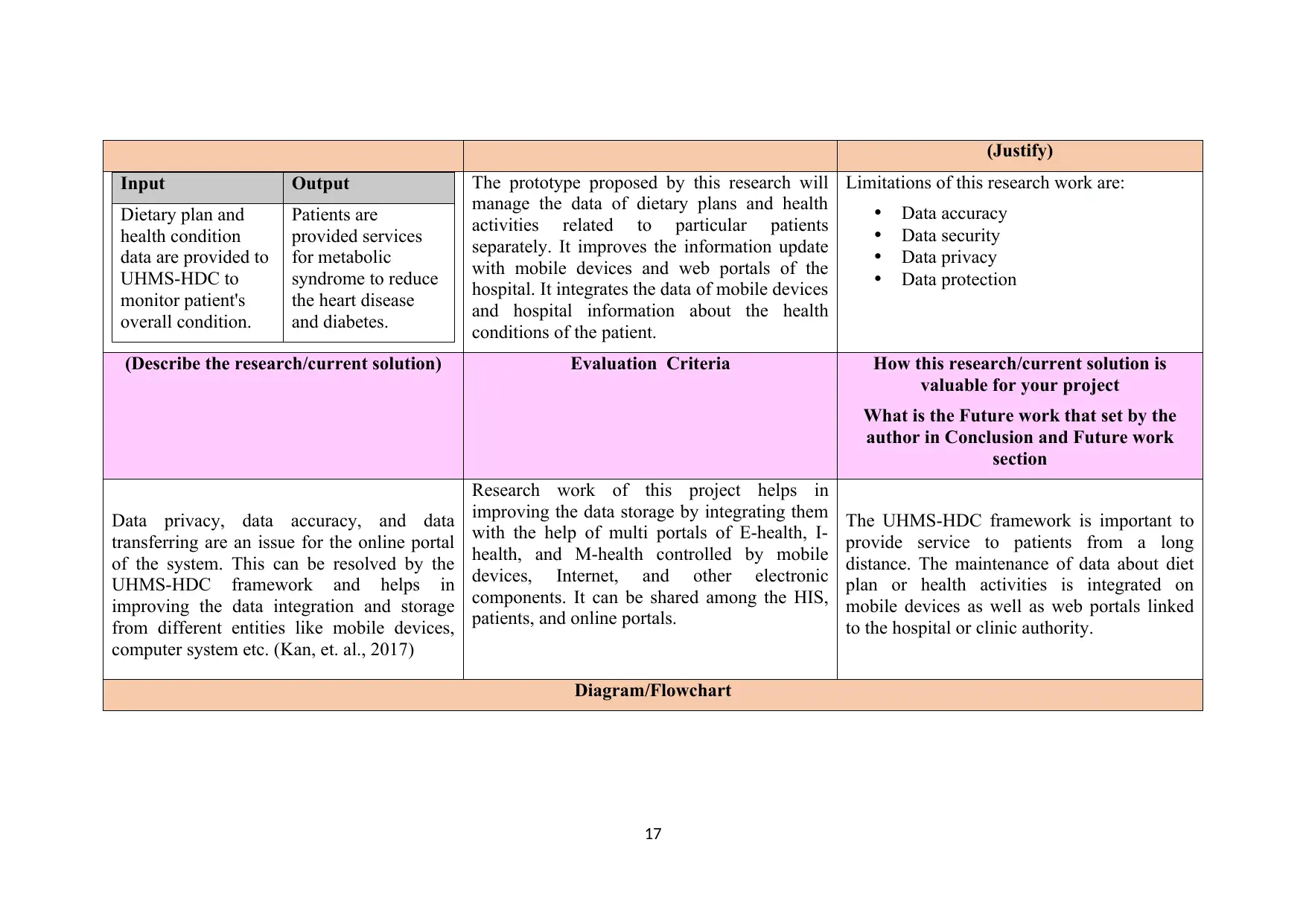
(Justify)
Input Output
Dietary plan and
health condition
data are provided to
UHMS-HDC to
monitor patient's
overall condition.
Patients are
provided services
for metabolic
syndrome to reduce
the heart disease
and diabetes.
The prototype proposed by this research will
manage the data of dietary plans and health
activities related to particular patients
separately. It improves the information update
with mobile devices and web portals of the
hospital. It integrates the data of mobile devices
and hospital information about the health
conditions of the patient.
Limitations of this research work are:
Data accuracy
Data security
Data privacy
Data protection
(Describe the research/current solution) Evaluation Criteria How this research/current solution is
valuable for your project
What is the Future work that set by the
author in Conclusion and Future work
section
Data privacy, data accuracy, and data
transferring are an issue for the online portal
of the system. This can be resolved by the
UHMS-HDC framework and helps in
improving the data integration and storage
from different entities like mobile devices,
computer system etc. (Kan, et. al., 2017)
Research work of this project helps in
improving the data storage by integrating them
with the help of multi portals of E-health, I-
health, and M-health controlled by mobile
devices, Internet, and other electronic
components. It can be shared among the HIS,
patients, and online portals.
The UHMS-HDC framework is important to
provide service to patients from a long
distance. The maintenance of data about diet
plan or health activities is integrated on
mobile devices as well as web portals linked
to the hospital or clinic authority.
Diagram/Flowchart
17
Input Output
Dietary plan and
health condition
data are provided to
UHMS-HDC to
monitor patient's
overall condition.
Patients are
provided services
for metabolic
syndrome to reduce
the heart disease
and diabetes.
The prototype proposed by this research will
manage the data of dietary plans and health
activities related to particular patients
separately. It improves the information update
with mobile devices and web portals of the
hospital. It integrates the data of mobile devices
and hospital information about the health
conditions of the patient.
Limitations of this research work are:
Data accuracy
Data security
Data privacy
Data protection
(Describe the research/current solution) Evaluation Criteria How this research/current solution is
valuable for your project
What is the Future work that set by the
author in Conclusion and Future work
section
Data privacy, data accuracy, and data
transferring are an issue for the online portal
of the system. This can be resolved by the
UHMS-HDC framework and helps in
improving the data integration and storage
from different entities like mobile devices,
computer system etc. (Kan, et. al., 2017)
Research work of this project helps in
improving the data storage by integrating them
with the help of multi portals of E-health, I-
health, and M-health controlled by mobile
devices, Internet, and other electronic
components. It can be shared among the HIS,
patients, and online portals.
The UHMS-HDC framework is important to
provide service to patients from a long
distance. The maintenance of data about diet
plan or health activities is integrated on
mobile devices as well as web portals linked
to the hospital or clinic authority.
Diagram/Flowchart
17
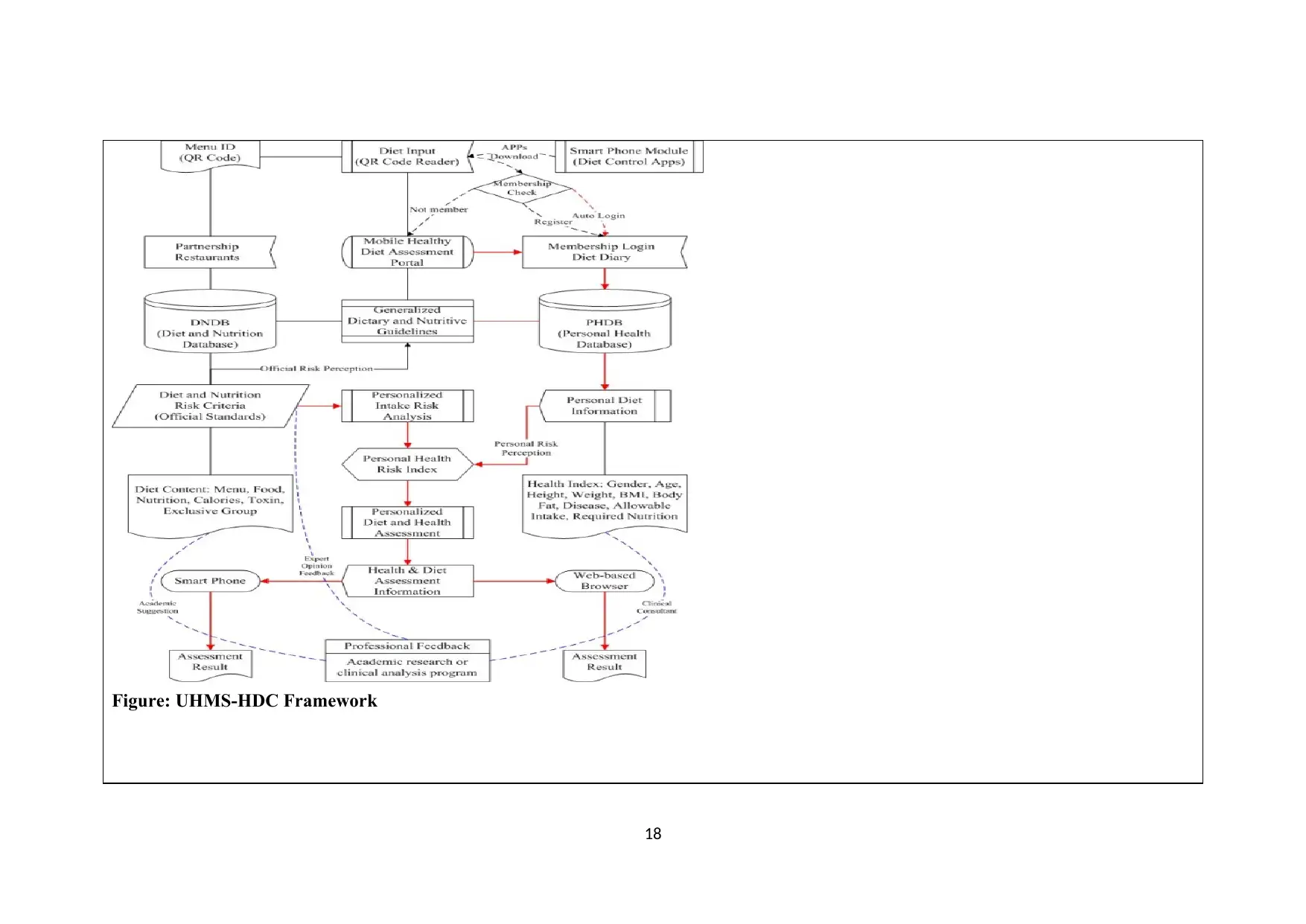
Figure: UHMS-HDC Framework
18
18
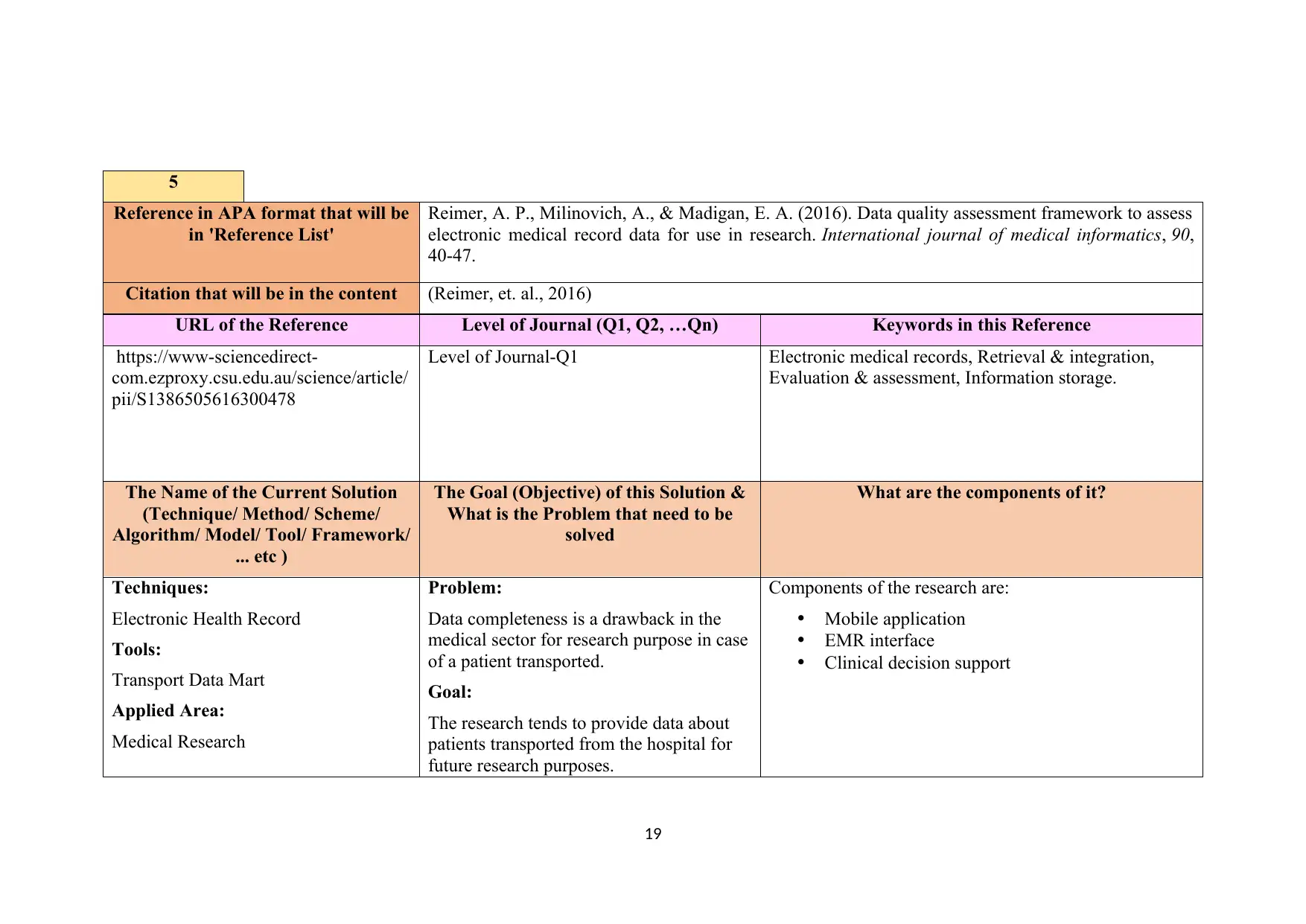
5
Reference in APA format that will be
in 'Reference List'
Reimer, A. P., Milinovich, A., & Madigan, E. A. (2016). Data quality assessment framework to assess
electronic medical record data for use in research. International journal of medical informatics, 90,
40-47.
Citation that will be in the content (Reimer, et. al., 2016)
URL of the Reference Level of Journal (Q1, Q2, …Qn) Keywords in this Reference
https://www-sciencedirect-
com.ezproxy.csu.edu.au/science/article/
pii/S1386505616300478
Level of Journal-Q1 Electronic medical records, Retrieval & integration,
Evaluation & assessment, Information storage.
The Name of the Current Solution
(Technique/ Method/ Scheme/
Algorithm/ Model/ Tool/ Framework/
... etc )
The Goal (Objective) of this Solution &
What is the Problem that need to be
solved
What are the components of it?
Techniques:
Electronic Health Record
Tools:
Transport Data Mart
Applied Area:
Medical Research
Problem:
Data completeness is a drawback in the
medical sector for research purpose in case
of a patient transported.
Goal:
The research tends to provide data about
patients transported from the hospital for
future research purposes.
Components of the research are:
Mobile application
EMR interface
Clinical decision support
19
Reference in APA format that will be
in 'Reference List'
Reimer, A. P., Milinovich, A., & Madigan, E. A. (2016). Data quality assessment framework to assess
electronic medical record data for use in research. International journal of medical informatics, 90,
40-47.
Citation that will be in the content (Reimer, et. al., 2016)
URL of the Reference Level of Journal (Q1, Q2, …Qn) Keywords in this Reference
https://www-sciencedirect-
com.ezproxy.csu.edu.au/science/article/
pii/S1386505616300478
Level of Journal-Q1 Electronic medical records, Retrieval & integration,
Evaluation & assessment, Information storage.
The Name of the Current Solution
(Technique/ Method/ Scheme/
Algorithm/ Model/ Tool/ Framework/
... etc )
The Goal (Objective) of this Solution &
What is the Problem that need to be
solved
What are the components of it?
Techniques:
Electronic Health Record
Tools:
Transport Data Mart
Applied Area:
Medical Research
Problem:
Data completeness is a drawback in the
medical sector for research purpose in case
of a patient transported.
Goal:
The research tends to provide data about
patients transported from the hospital for
future research purposes.
Components of the research are:
Mobile application
EMR interface
Clinical decision support
19
Paraphrase This Document
Need a fresh take? Get an instant paraphrase of this document with our AI Paraphraser
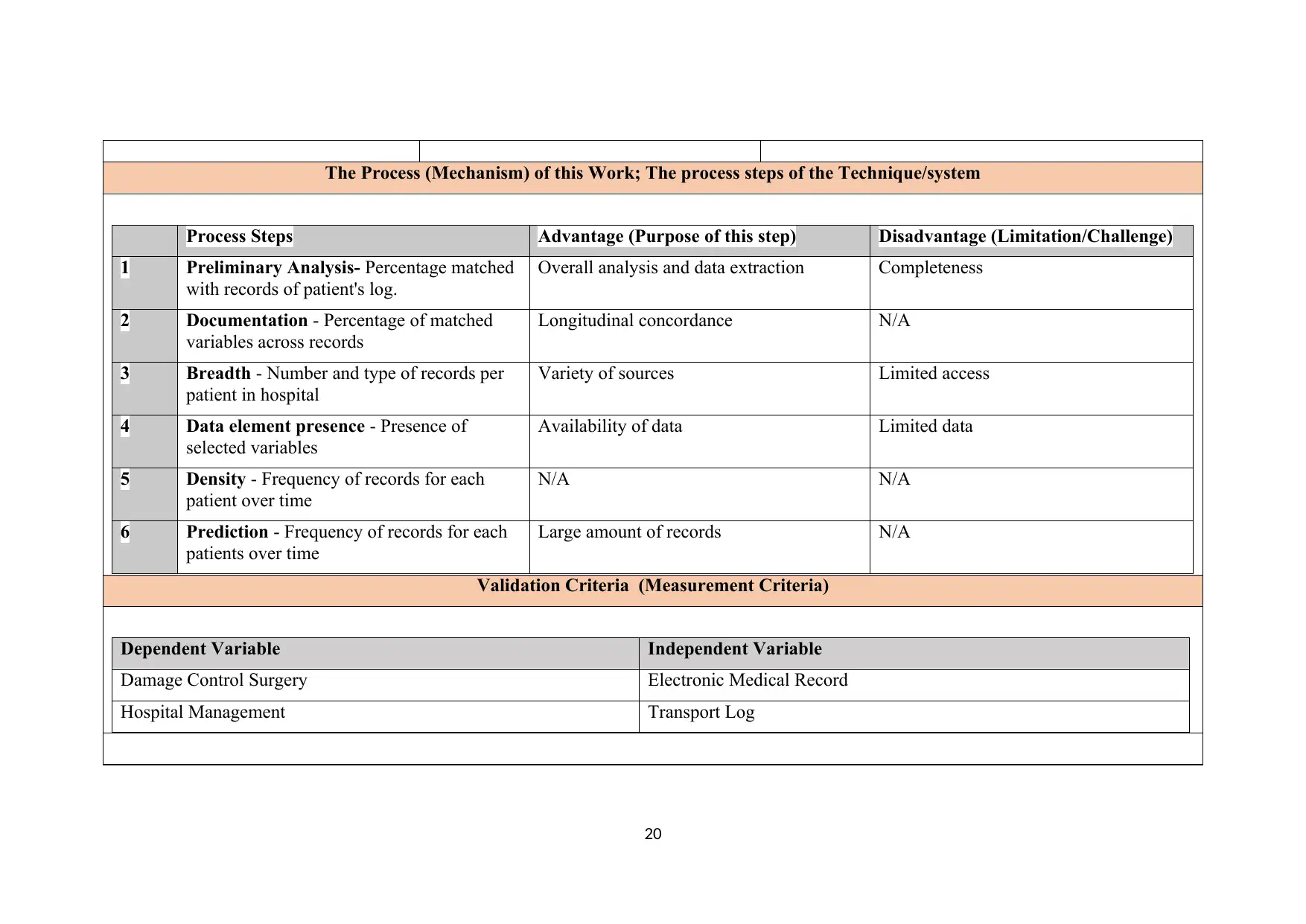
The Process (Mechanism) of this Work; The process steps of the Technique/system
Process Steps Advantage (Purpose of this step) Disadvantage (Limitation/Challenge)
1 Preliminary Analysis- Percentage matched
with records of patient's log.
Overall analysis and data extraction Completeness
2 Documentation - Percentage of matched
variables across records
Longitudinal concordance N/A
3 Breadth - Number and type of records per
patient in hospital
Variety of sources Limited access
4 Data element presence - Presence of
selected variables
Availability of data Limited data
5 Density - Frequency of records for each
patient over time
N/A N/A
6 Prediction - Frequency of records for each
patients over time
Large amount of records N/A
Validation Criteria (Measurement Criteria)
Dependent Variable Independent Variable
Damage Control Surgery Electronic Medical Record
Hospital Management Transport Log
20
Process Steps Advantage (Purpose of this step) Disadvantage (Limitation/Challenge)
1 Preliminary Analysis- Percentage matched
with records of patient's log.
Overall analysis and data extraction Completeness
2 Documentation - Percentage of matched
variables across records
Longitudinal concordance N/A
3 Breadth - Number and type of records per
patient in hospital
Variety of sources Limited access
4 Data element presence - Presence of
selected variables
Availability of data Limited data
5 Density - Frequency of records for each
patient over time
N/A N/A
6 Prediction - Frequency of records for each
patients over time
Large amount of records N/A
Validation Criteria (Measurement Criteria)
Dependent Variable Independent Variable
Damage Control Surgery Electronic Medical Record
Hospital Management Transport Log
20
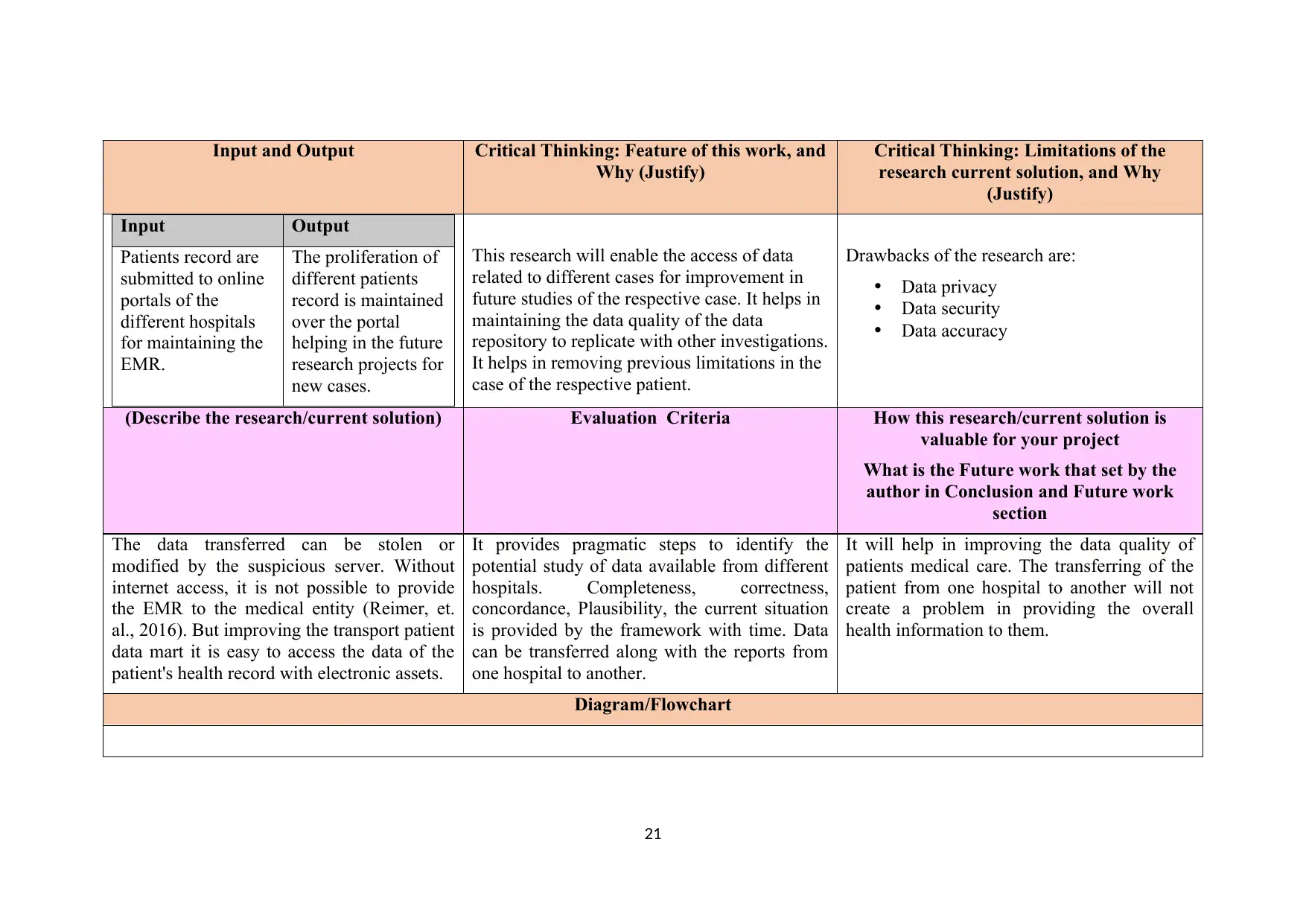
Input and Output Critical Thinking: Feature of this work, and
Why (Justify)
Critical Thinking: Limitations of the
research current solution, and Why
(Justify)
Input Output
Patients record are
submitted to online
portals of the
different hospitals
for maintaining the
EMR.
The proliferation of
different patients
record is maintained
over the portal
helping in the future
research projects for
new cases.
This research will enable the access of data
related to different cases for improvement in
future studies of the respective case. It helps in
maintaining the data quality of the data
repository to replicate with other investigations.
It helps in removing previous limitations in the
case of the respective patient.
Drawbacks of the research are:
Data privacy
Data security
Data accuracy
(Describe the research/current solution) Evaluation Criteria How this research/current solution is
valuable for your project
What is the Future work that set by the
author in Conclusion and Future work
section
The data transferred can be stolen or
modified by the suspicious server. Without
internet access, it is not possible to provide
the EMR to the medical entity (Reimer, et.
al., 2016). But improving the transport patient
data mart it is easy to access the data of the
patient's health record with electronic assets.
It provides pragmatic steps to identify the
potential study of data available from different
hospitals. Completeness, correctness,
concordance, Plausibility, the current situation
is provided by the framework with time. Data
can be transferred along with the reports from
one hospital to another.
It will help in improving the data quality of
patients medical care. The transferring of the
patient from one hospital to another will not
create a problem in providing the overall
health information to them.
Diagram/Flowchart
21
Why (Justify)
Critical Thinking: Limitations of the
research current solution, and Why
(Justify)
Input Output
Patients record are
submitted to online
portals of the
different hospitals
for maintaining the
EMR.
The proliferation of
different patients
record is maintained
over the portal
helping in the future
research projects for
new cases.
This research will enable the access of data
related to different cases for improvement in
future studies of the respective case. It helps in
maintaining the data quality of the data
repository to replicate with other investigations.
It helps in removing previous limitations in the
case of the respective patient.
Drawbacks of the research are:
Data privacy
Data security
Data accuracy
(Describe the research/current solution) Evaluation Criteria How this research/current solution is
valuable for your project
What is the Future work that set by the
author in Conclusion and Future work
section
The data transferred can be stolen or
modified by the suspicious server. Without
internet access, it is not possible to provide
the EMR to the medical entity (Reimer, et.
al., 2016). But improving the transport patient
data mart it is easy to access the data of the
patient's health record with electronic assets.
It provides pragmatic steps to identify the
potential study of data available from different
hospitals. Completeness, correctness,
concordance, Plausibility, the current situation
is provided by the framework with time. Data
can be transferred along with the reports from
one hospital to another.
It will help in improving the data quality of
patients medical care. The transferring of the
patient from one hospital to another will not
create a problem in providing the overall
health information to them.
Diagram/Flowchart
21
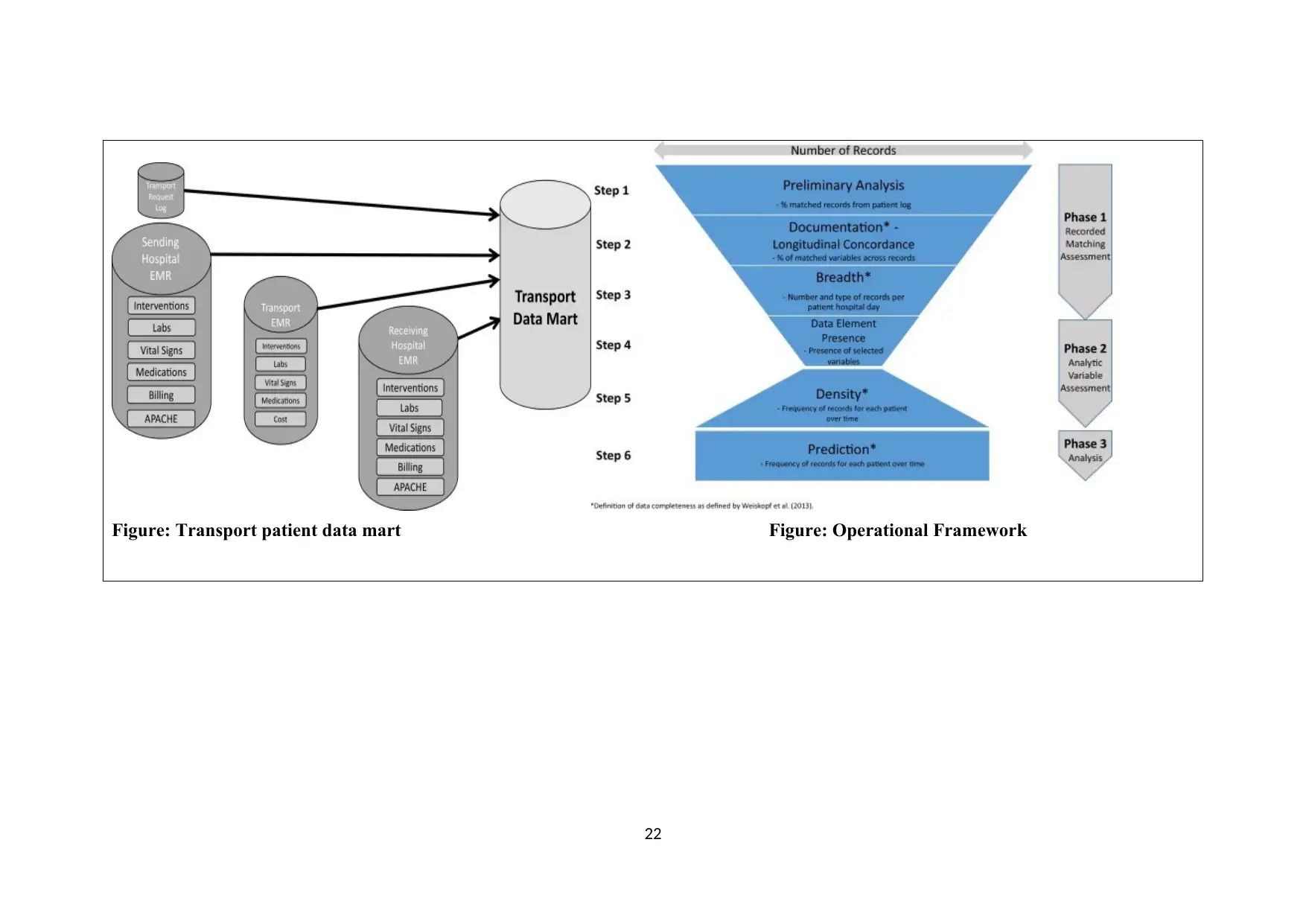
Figure: Transport patient data mart Figure: Operational Framework
22
22
Secure Best Marks with AI Grader
Need help grading? Try our AI Grader for instant feedback on your assignments.
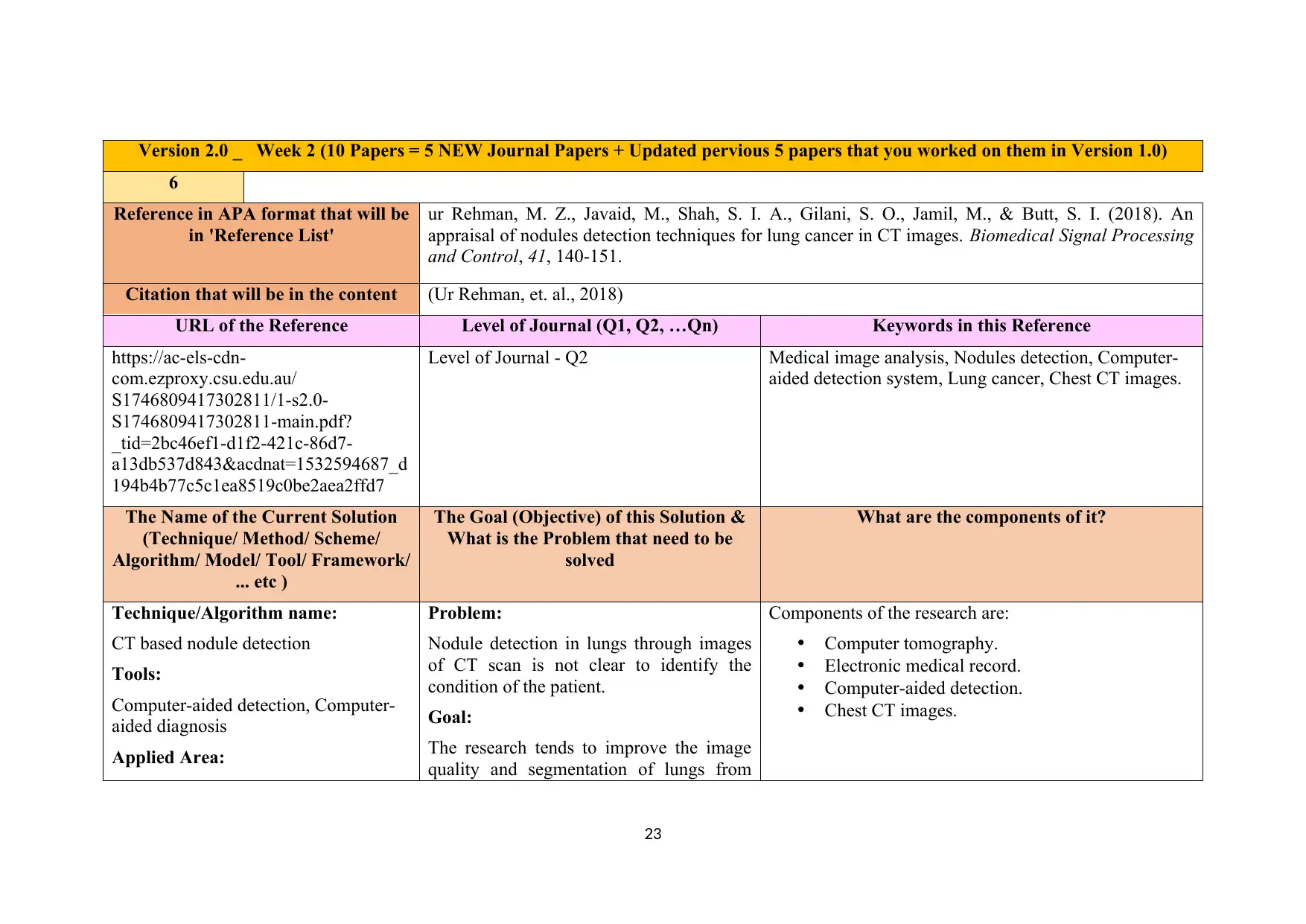
Version 2.0 _ Week 2 (10 Papers = 5 NEW Journal Papers + Updated pervious 5 papers that you worked on them in Version 1.0)
6
Reference in APA format that will be
in 'Reference List'
ur Rehman, M. Z., Javaid, M., Shah, S. I. A., Gilani, S. O., Jamil, M., & Butt, S. I. (2018). An
appraisal of nodules detection techniques for lung cancer in CT images. Biomedical Signal Processing
and Control, 41, 140-151.
Citation that will be in the content (Ur Rehman, et. al., 2018)
URL of the Reference Level of Journal (Q1, Q2, …Qn) Keywords in this Reference
https://ac-els-cdn-
com.ezproxy.csu.edu.au/
S1746809417302811/1-s2.0-
S1746809417302811-main.pdf?
_tid=2bc46ef1-d1f2-421c-86d7-
a13db537d843&acdnat=1532594687_d
194b4b77c5c1ea8519c0be2aea2ffd7
Level of Journal - Q2 Medical image analysis, Nodules detection, Computer-
aided detection system, Lung cancer, Chest CT images.
The Name of the Current Solution
(Technique/ Method/ Scheme/
Algorithm/ Model/ Tool/ Framework/
... etc )
The Goal (Objective) of this Solution &
What is the Problem that need to be
solved
What are the components of it?
Technique/Algorithm name:
CT based nodule detection
Tools:
Computer-aided detection, Computer-
aided diagnosis
Applied Area:
Problem:
Nodule detection in lungs through images
of CT scan is not clear to identify the
condition of the patient.
Goal:
The research tends to improve the image
quality and segmentation of lungs from
Components of the research are:
Computer tomography.
Electronic medical record.
Computer-aided detection.
Chest CT images.
23
6
Reference in APA format that will be
in 'Reference List'
ur Rehman, M. Z., Javaid, M., Shah, S. I. A., Gilani, S. O., Jamil, M., & Butt, S. I. (2018). An
appraisal of nodules detection techniques for lung cancer in CT images. Biomedical Signal Processing
and Control, 41, 140-151.
Citation that will be in the content (Ur Rehman, et. al., 2018)
URL of the Reference Level of Journal (Q1, Q2, …Qn) Keywords in this Reference
https://ac-els-cdn-
com.ezproxy.csu.edu.au/
S1746809417302811/1-s2.0-
S1746809417302811-main.pdf?
_tid=2bc46ef1-d1f2-421c-86d7-
a13db537d843&acdnat=1532594687_d
194b4b77c5c1ea8519c0be2aea2ffd7
Level of Journal - Q2 Medical image analysis, Nodules detection, Computer-
aided detection system, Lung cancer, Chest CT images.
The Name of the Current Solution
(Technique/ Method/ Scheme/
Algorithm/ Model/ Tool/ Framework/
... etc )
The Goal (Objective) of this Solution &
What is the Problem that need to be
solved
What are the components of it?
Technique/Algorithm name:
CT based nodule detection
Tools:
Computer-aided detection, Computer-
aided diagnosis
Applied Area:
Problem:
Nodule detection in lungs through images
of CT scan is not clear to identify the
condition of the patient.
Goal:
The research tends to improve the image
quality and segmentation of lungs from
Components of the research are:
Computer tomography.
Electronic medical record.
Computer-aided detection.
Chest CT images.
23
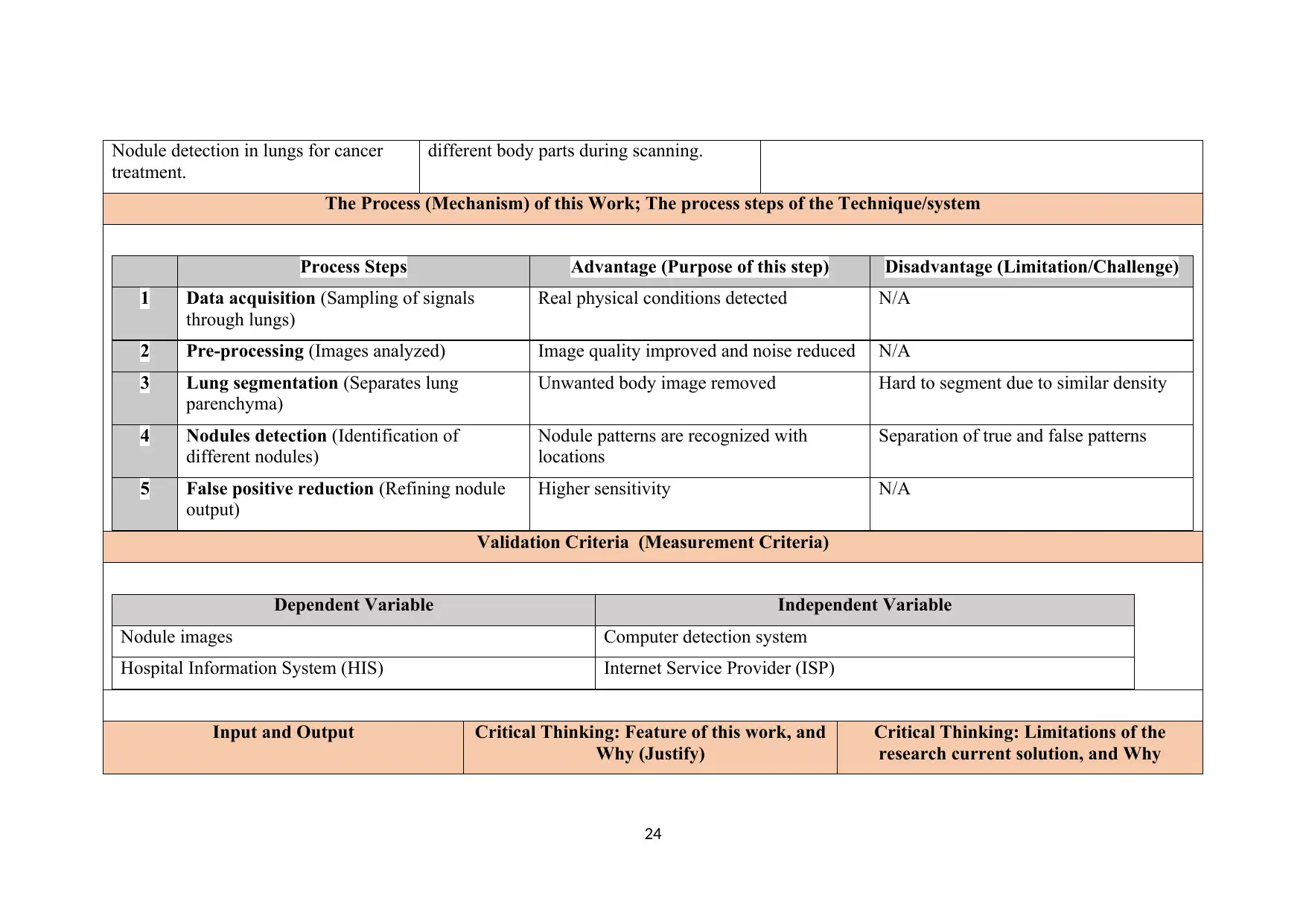
Nodule detection in lungs for cancer
treatment.
different body parts during scanning.
The Process (Mechanism) of this Work; The process steps of the Technique/system
Process Steps Advantage (Purpose of this step) Disadvantage (Limitation/Challenge)
1 Data acquisition (Sampling of signals
through lungs)
Real physical conditions detected N/A
2 Pre-processing (Images analyzed) Image quality improved and noise reduced N/A
3 Lung segmentation (Separates lung
parenchyma)
Unwanted body image removed Hard to segment due to similar density
4 Nodules detection (Identification of
different nodules)
Nodule patterns are recognized with
locations
Separation of true and false patterns
5 False positive reduction (Refining nodule
output)
Higher sensitivity N/A
Validation Criteria (Measurement Criteria)
Dependent Variable Independent Variable
Nodule images Computer detection system
Hospital Information System (HIS) Internet Service Provider (ISP)
Input and Output Critical Thinking: Feature of this work, and
Why (Justify)
Critical Thinking: Limitations of the
research current solution, and Why
24
treatment.
different body parts during scanning.
The Process (Mechanism) of this Work; The process steps of the Technique/system
Process Steps Advantage (Purpose of this step) Disadvantage (Limitation/Challenge)
1 Data acquisition (Sampling of signals
through lungs)
Real physical conditions detected N/A
2 Pre-processing (Images analyzed) Image quality improved and noise reduced N/A
3 Lung segmentation (Separates lung
parenchyma)
Unwanted body image removed Hard to segment due to similar density
4 Nodules detection (Identification of
different nodules)
Nodule patterns are recognized with
locations
Separation of true and false patterns
5 False positive reduction (Refining nodule
output)
Higher sensitivity N/A
Validation Criteria (Measurement Criteria)
Dependent Variable Independent Variable
Nodule images Computer detection system
Hospital Information System (HIS) Internet Service Provider (ISP)
Input and Output Critical Thinking: Feature of this work, and
Why (Justify)
Critical Thinking: Limitations of the
research current solution, and Why
24
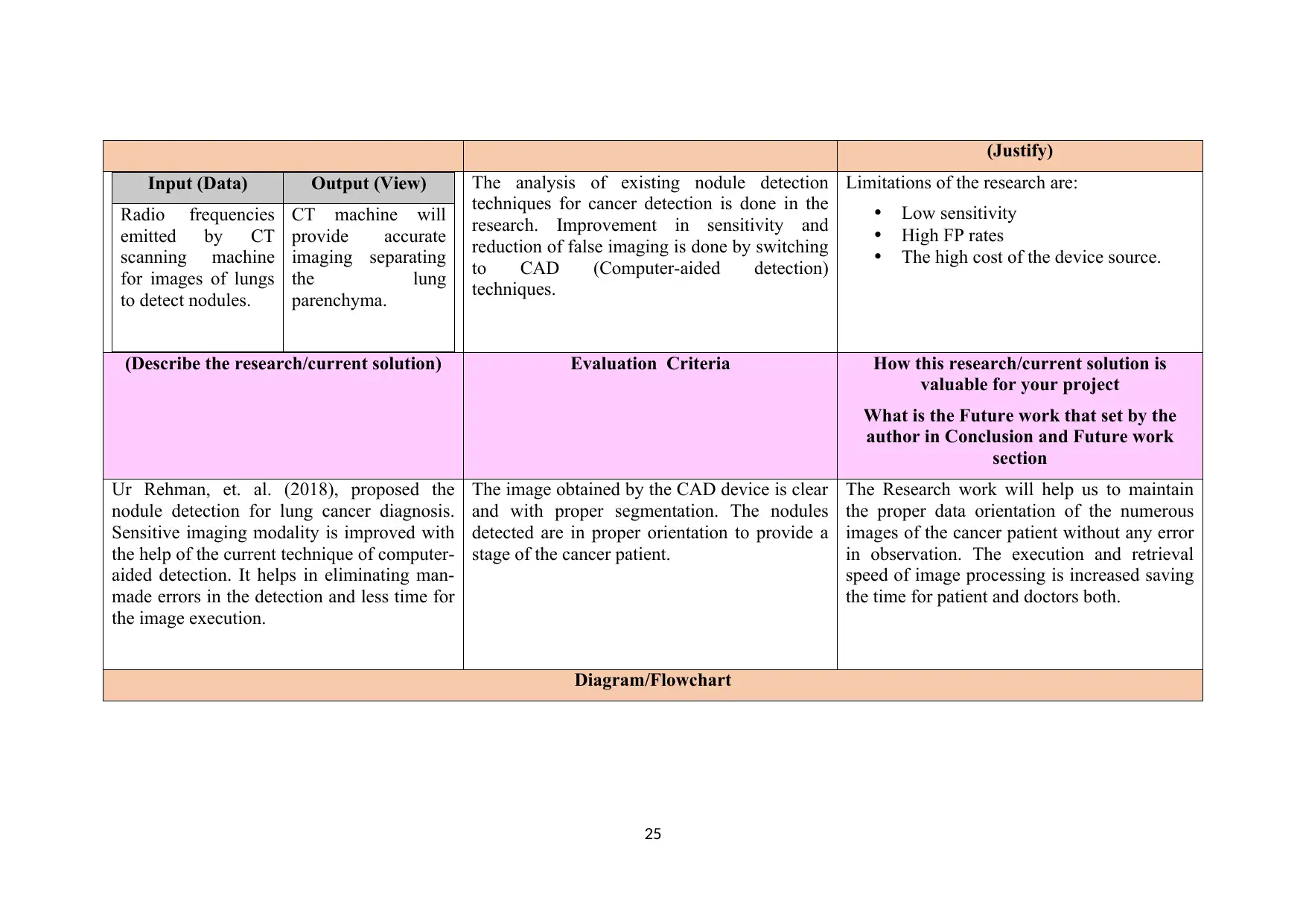
(Justify)
Input (Data) Output (View)
Radio frequencies
emitted by CT
scanning machine
for images of lungs
to detect nodules.
CT machine will
provide accurate
imaging separating
the lung
parenchyma.
The analysis of existing nodule detection
techniques for cancer detection is done in the
research. Improvement in sensitivity and
reduction of false imaging is done by switching
to CAD (Computer-aided detection)
techniques.
Limitations of the research are:
Low sensitivity
High FP rates
The high cost of the device source.
(Describe the research/current solution) Evaluation Criteria How this research/current solution is
valuable for your project
What is the Future work that set by the
author in Conclusion and Future work
section
Ur Rehman, et. al. (2018), proposed the
nodule detection for lung cancer diagnosis.
Sensitive imaging modality is improved with
the help of the current technique of computer-
aided detection. It helps in eliminating man-
made errors in the detection and less time for
the image execution.
The image obtained by the CAD device is clear
and with proper segmentation. The nodules
detected are in proper orientation to provide a
stage of the cancer patient.
The Research work will help us to maintain
the proper data orientation of the numerous
images of the cancer patient without any error
in observation. The execution and retrieval
speed of image processing is increased saving
the time for patient and doctors both.
Diagram/Flowchart
25
Input (Data) Output (View)
Radio frequencies
emitted by CT
scanning machine
for images of lungs
to detect nodules.
CT machine will
provide accurate
imaging separating
the lung
parenchyma.
The analysis of existing nodule detection
techniques for cancer detection is done in the
research. Improvement in sensitivity and
reduction of false imaging is done by switching
to CAD (Computer-aided detection)
techniques.
Limitations of the research are:
Low sensitivity
High FP rates
The high cost of the device source.
(Describe the research/current solution) Evaluation Criteria How this research/current solution is
valuable for your project
What is the Future work that set by the
author in Conclusion and Future work
section
Ur Rehman, et. al. (2018), proposed the
nodule detection for lung cancer diagnosis.
Sensitive imaging modality is improved with
the help of the current technique of computer-
aided detection. It helps in eliminating man-
made errors in the detection and less time for
the image execution.
The image obtained by the CAD device is clear
and with proper segmentation. The nodules
detected are in proper orientation to provide a
stage of the cancer patient.
The Research work will help us to maintain
the proper data orientation of the numerous
images of the cancer patient without any error
in observation. The execution and retrieval
speed of image processing is increased saving
the time for patient and doctors both.
Diagram/Flowchart
25
Paraphrase This Document
Need a fresh take? Get an instant paraphrase of this document with our AI Paraphraser
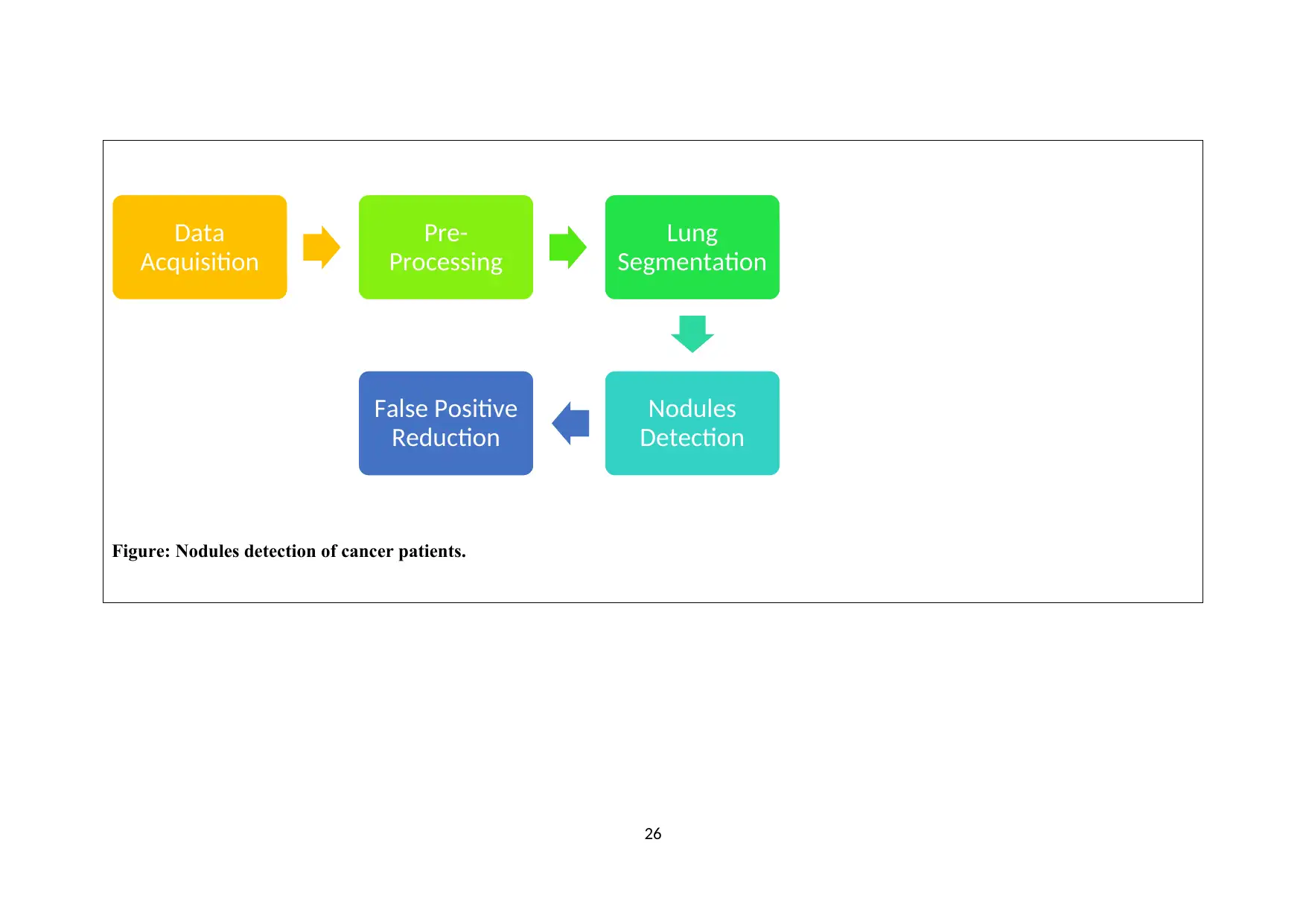
Figure: Nodules detection of cancer patients.
26
Data
Acquisition
Pre-
Processing
Lung
Segmentation
Nodules
Detection
False Positive
Reduction
26
Data
Acquisition
Pre-
Processing
Lung
Segmentation
Nodules
Detection
False Positive
Reduction
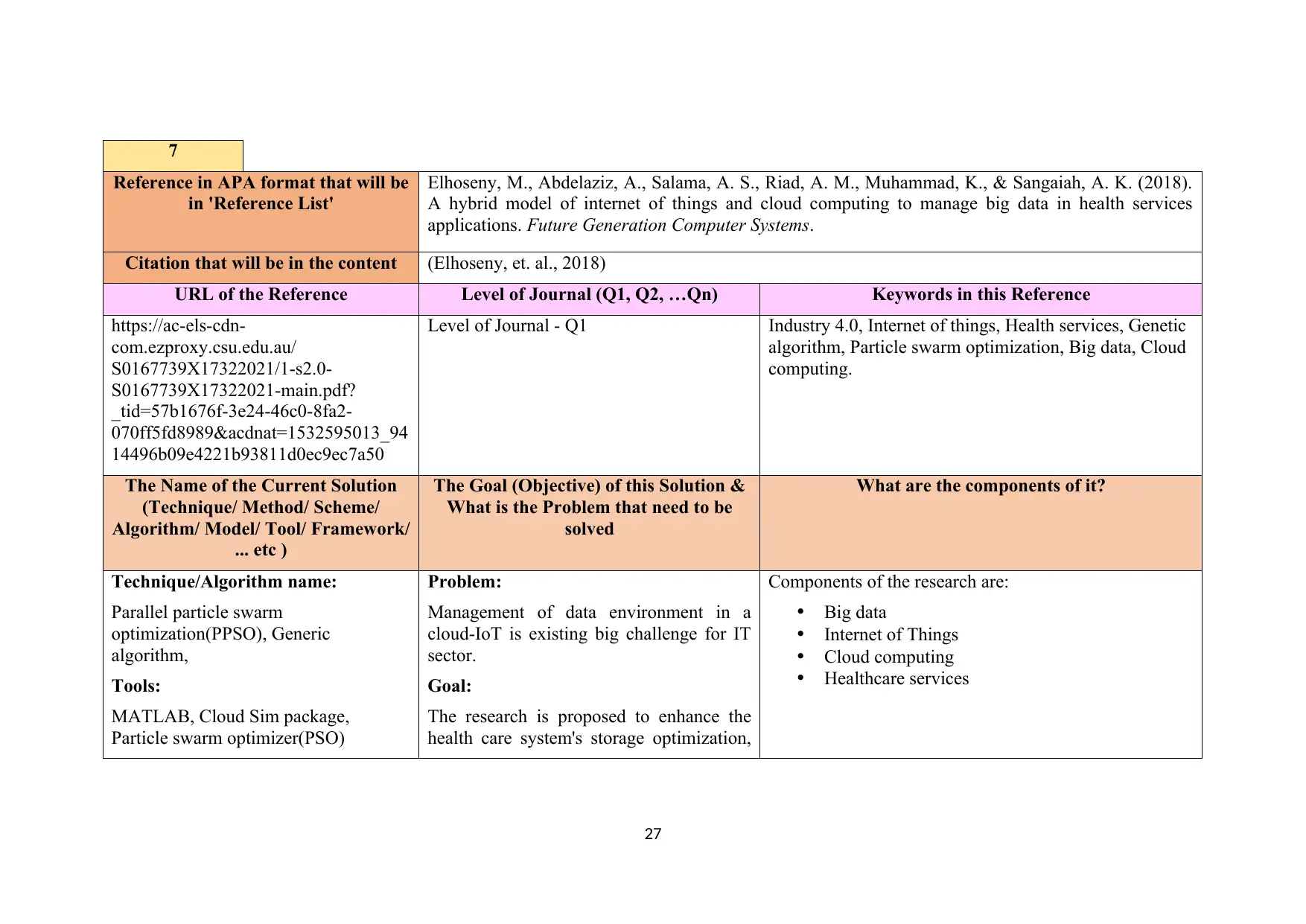
27
7
Reference in APA format that will be
in 'Reference List'
Elhoseny, M., Abdelaziz, A., Salama, A. S., Riad, A. M., Muhammad, K., & Sangaiah, A. K. (2018).
A hybrid model of internet of things and cloud computing to manage big data in health services
applications. Future Generation Computer Systems.
Citation that will be in the content (Elhoseny, et. al., 2018)
URL of the Reference Level of Journal (Q1, Q2, …Qn) Keywords in this Reference
https://ac-els-cdn-
com.ezproxy.csu.edu.au/
S0167739X17322021/1-s2.0-
S0167739X17322021-main.pdf?
_tid=57b1676f-3e24-46c0-8fa2-
070ff5fd8989&acdnat=1532595013_94
14496b09e4221b93811d0ec9ec7a50
Level of Journal - Q1 Industry 4.0, Internet of things, Health services, Genetic
algorithm, Particle swarm optimization, Big data, Cloud
computing.
The Name of the Current Solution
(Technique/ Method/ Scheme/
Algorithm/ Model/ Tool/ Framework/
... etc )
The Goal (Objective) of this Solution &
What is the Problem that need to be
solved
What are the components of it?
Technique/Algorithm name:
Parallel particle swarm
optimization(PPSO), Generic
algorithm,
Tools:
MATLAB, Cloud Sim package,
Particle swarm optimizer(PSO)
Problem:
Management of data environment in a
cloud-IoT is existing big challenge for IT
sector.
Goal:
The research is proposed to enhance the
health care system's storage optimization,
Components of the research are:
Big data
Internet of Things
Cloud computing
Healthcare services
7
Reference in APA format that will be
in 'Reference List'
Elhoseny, M., Abdelaziz, A., Salama, A. S., Riad, A. M., Muhammad, K., & Sangaiah, A. K. (2018).
A hybrid model of internet of things and cloud computing to manage big data in health services
applications. Future Generation Computer Systems.
Citation that will be in the content (Elhoseny, et. al., 2018)
URL of the Reference Level of Journal (Q1, Q2, …Qn) Keywords in this Reference
https://ac-els-cdn-
com.ezproxy.csu.edu.au/
S0167739X17322021/1-s2.0-
S0167739X17322021-main.pdf?
_tid=57b1676f-3e24-46c0-8fa2-
070ff5fd8989&acdnat=1532595013_94
14496b09e4221b93811d0ec9ec7a50
Level of Journal - Q1 Industry 4.0, Internet of things, Health services, Genetic
algorithm, Particle swarm optimization, Big data, Cloud
computing.
The Name of the Current Solution
(Technique/ Method/ Scheme/
Algorithm/ Model/ Tool/ Framework/
... etc )
The Goal (Objective) of this Solution &
What is the Problem that need to be
solved
What are the components of it?
Technique/Algorithm name:
Parallel particle swarm
optimization(PPSO), Generic
algorithm,
Tools:
MATLAB, Cloud Sim package,
Particle swarm optimizer(PSO)
Problem:
Management of data environment in a
cloud-IoT is existing big challenge for IT
sector.
Goal:
The research is proposed to enhance the
health care system's storage optimization,
Components of the research are:
Big data
Internet of Things
Cloud computing
Healthcare services
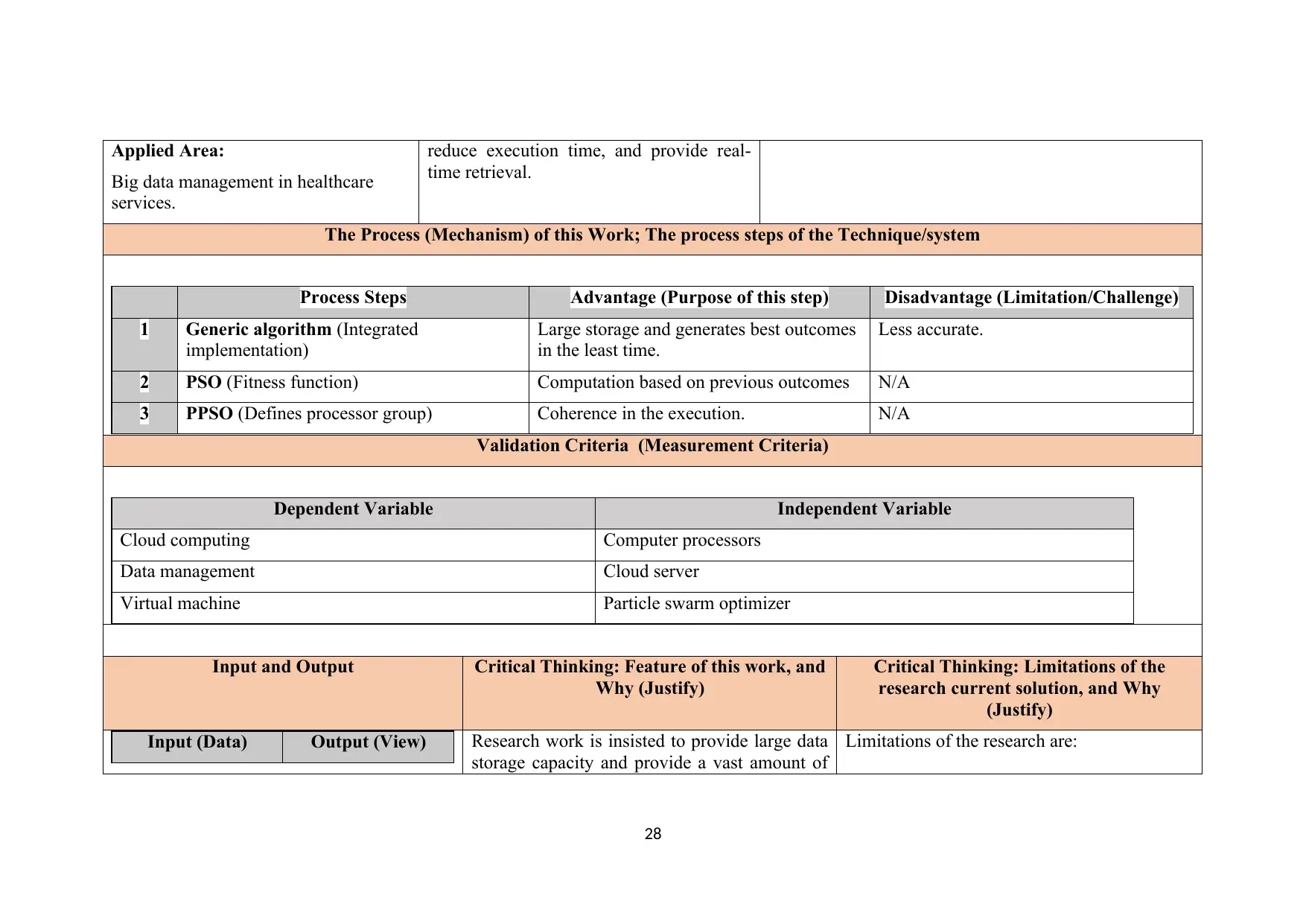
28
Applied Area:
Big data management in healthcare
services.
reduce execution time, and provide real-
time retrieval.
The Process (Mechanism) of this Work; The process steps of the Technique/system
Process Steps Advantage (Purpose of this step) Disadvantage (Limitation/Challenge)
1 Generic algorithm (Integrated
implementation)
Large storage and generates best outcomes
in the least time.
Less accurate.
2 PSO (Fitness function) Computation based on previous outcomes N/A
3 PPSO (Defines processor group) Coherence in the execution. N/A
Validation Criteria (Measurement Criteria)
Dependent Variable Independent Variable
Cloud computing Computer processors
Data management Cloud server
Virtual machine Particle swarm optimizer
Input and Output Critical Thinking: Feature of this work, and
Why (Justify)
Critical Thinking: Limitations of the
research current solution, and Why
(Justify)
Input (Data) Output (View) Research work is insisted to provide large data
storage capacity and provide a vast amount of
Limitations of the research are:
Applied Area:
Big data management in healthcare
services.
reduce execution time, and provide real-
time retrieval.
The Process (Mechanism) of this Work; The process steps of the Technique/system
Process Steps Advantage (Purpose of this step) Disadvantage (Limitation/Challenge)
1 Generic algorithm (Integrated
implementation)
Large storage and generates best outcomes
in the least time.
Less accurate.
2 PSO (Fitness function) Computation based on previous outcomes N/A
3 PPSO (Defines processor group) Coherence in the execution. N/A
Validation Criteria (Measurement Criteria)
Dependent Variable Independent Variable
Cloud computing Computer processors
Data management Cloud server
Virtual machine Particle swarm optimizer
Input and Output Critical Thinking: Feature of this work, and
Why (Justify)
Critical Thinking: Limitations of the
research current solution, and Why
(Justify)
Input (Data) Output (View) Research work is insisted to provide large data
storage capacity and provide a vast amount of
Limitations of the research are:
Secure Best Marks with AI Grader
Need help grading? Try our AI Grader for instant feedback on your assignments.
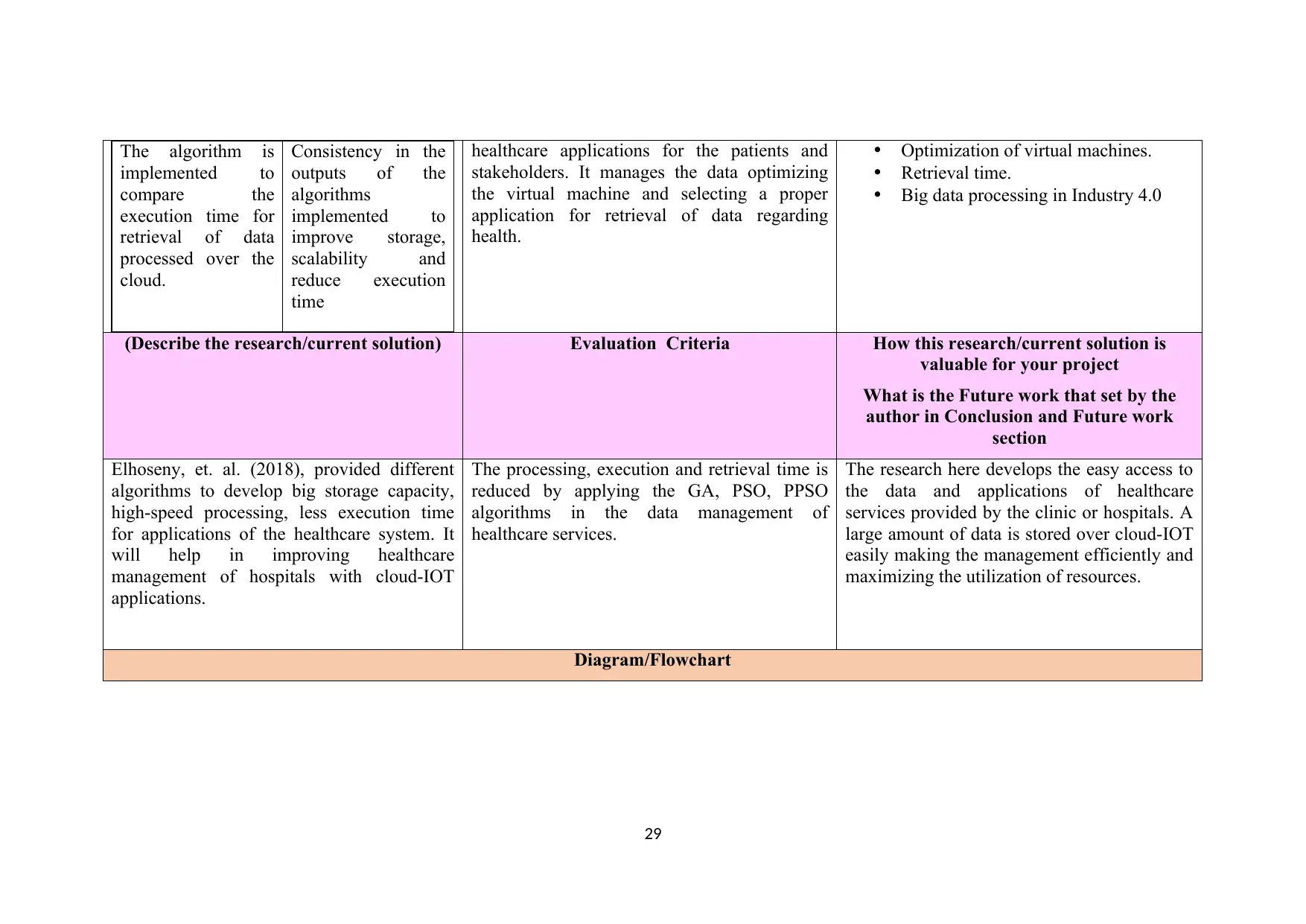
29
The algorithm is
implemented to
compare the
execution time for
retrieval of data
processed over the
cloud.
Consistency in the
outputs of the
algorithms
implemented to
improve storage,
scalability and
reduce execution
time
healthcare applications for the patients and
stakeholders. It manages the data optimizing
the virtual machine and selecting a proper
application for retrieval of data regarding
health.
Optimization of virtual machines.
Retrieval time.
Big data processing in Industry 4.0
(Describe the research/current solution) Evaluation Criteria How this research/current solution is
valuable for your project
What is the Future work that set by the
author in Conclusion and Future work
section
Elhoseny, et. al. (2018), provided different
algorithms to develop big storage capacity,
high-speed processing, less execution time
for applications of the healthcare system. It
will help in improving healthcare
management of hospitals with cloud-IOT
applications.
The processing, execution and retrieval time is
reduced by applying the GA, PSO, PPSO
algorithms in the data management of
healthcare services.
The research here develops the easy access to
the data and applications of healthcare
services provided by the clinic or hospitals. A
large amount of data is stored over cloud-IOT
easily making the management efficiently and
maximizing the utilization of resources.
Diagram/Flowchart
The algorithm is
implemented to
compare the
execution time for
retrieval of data
processed over the
cloud.
Consistency in the
outputs of the
algorithms
implemented to
improve storage,
scalability and
reduce execution
time
healthcare applications for the patients and
stakeholders. It manages the data optimizing
the virtual machine and selecting a proper
application for retrieval of data regarding
health.
Optimization of virtual machines.
Retrieval time.
Big data processing in Industry 4.0
(Describe the research/current solution) Evaluation Criteria How this research/current solution is
valuable for your project
What is the Future work that set by the
author in Conclusion and Future work
section
Elhoseny, et. al. (2018), provided different
algorithms to develop big storage capacity,
high-speed processing, less execution time
for applications of the healthcare system. It
will help in improving healthcare
management of hospitals with cloud-IOT
applications.
The processing, execution and retrieval time is
reduced by applying the GA, PSO, PPSO
algorithms in the data management of
healthcare services.
The research here develops the easy access to
the data and applications of healthcare
services provided by the clinic or hospitals. A
large amount of data is stored over cloud-IOT
easily making the management efficiently and
maximizing the utilization of resources.
Diagram/Flowchart
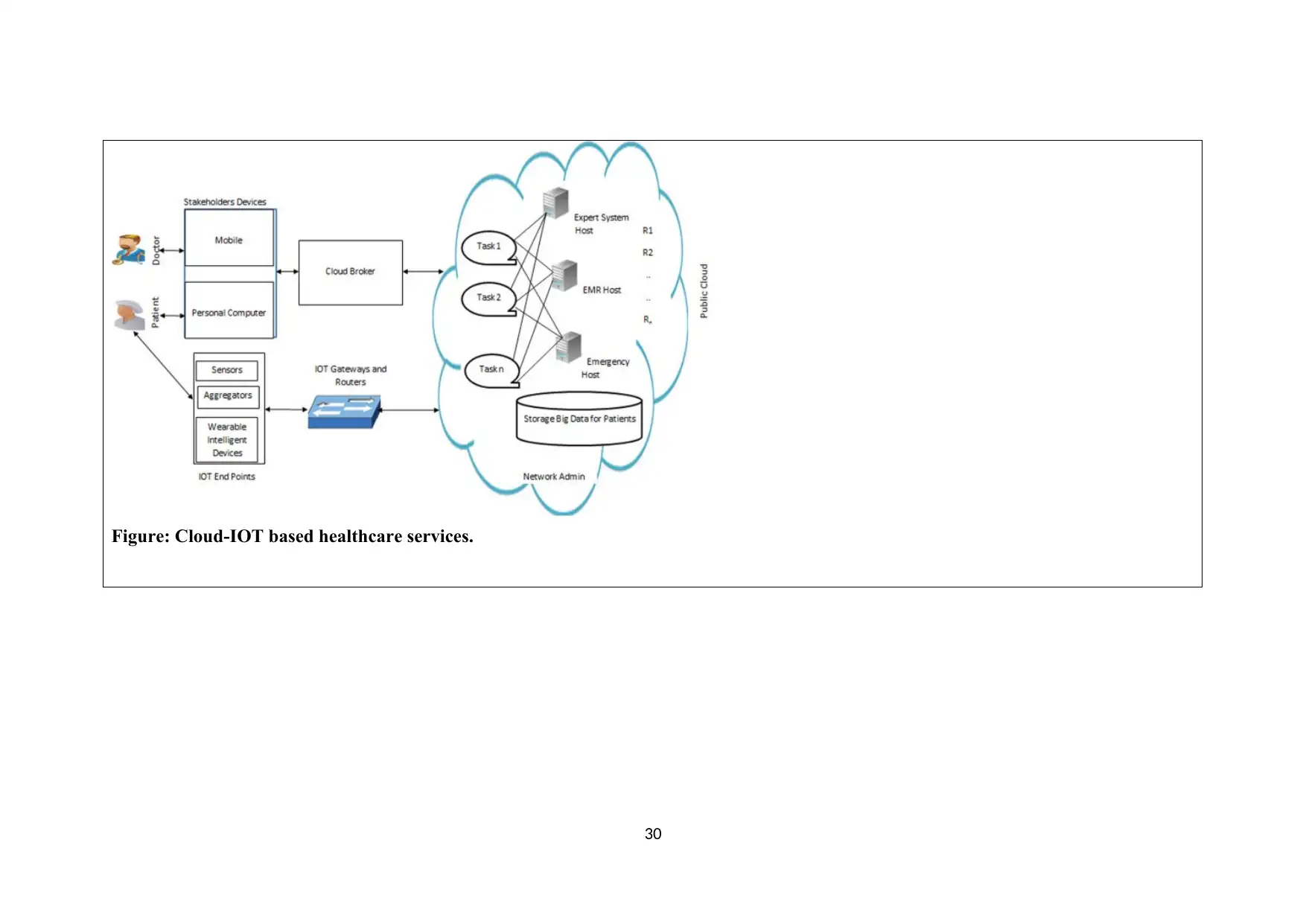
30
Figure: Cloud-IOT based healthcare services.
Figure: Cloud-IOT based healthcare services.
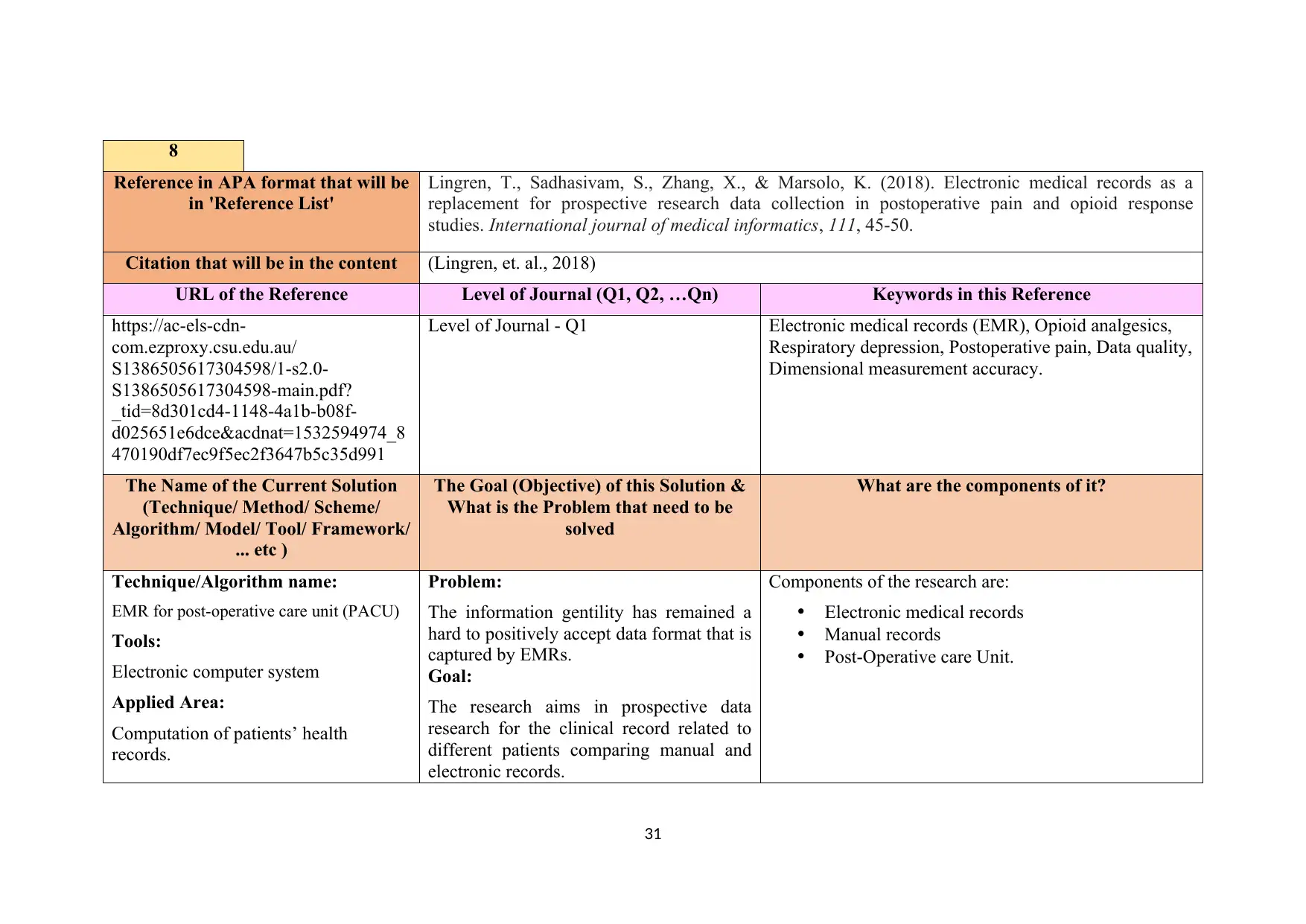
8
Reference in APA format that will be
in 'Reference List'
Lingren, T., Sadhasivam, S., Zhang, X., & Marsolo, K. (2018). Electronic medical records as a
replacement for prospective research data collection in postoperative pain and opioid response
studies. International journal of medical informatics, 111, 45-50.
Citation that will be in the content (Lingren, et. al., 2018)
URL of the Reference Level of Journal (Q1, Q2, …Qn) Keywords in this Reference
https://ac-els-cdn-
com.ezproxy.csu.edu.au/
S1386505617304598/1-s2.0-
S1386505617304598-main.pdf?
_tid=8d301cd4-1148-4a1b-b08f-
d025651e6dce&acdnat=1532594974_8
470190df7ec9f5ec2f3647b5c35d991
Level of Journal - Q1 Electronic medical records (EMR), Opioid analgesics,
Respiratory depression, Postoperative pain, Data quality,
Dimensional measurement accuracy.
The Name of the Current Solution
(Technique/ Method/ Scheme/
Algorithm/ Model/ Tool/ Framework/
... etc )
The Goal (Objective) of this Solution &
What is the Problem that need to be
solved
What are the components of it?
Technique/Algorithm name:
EMR for post-operative care unit (PACU)
Tools:
Electronic computer system
Applied Area:
Computation of patients’ health
records.
Problem:
The information gentility has remained a
hard to positively accept data format that is
captured by EMRs.
Goal:
The research aims in prospective data
research for the clinical record related to
different patients comparing manual and
electronic records.
Components of the research are:
Electronic medical records
Manual records
Post-Operative care Unit.
31
Reference in APA format that will be
in 'Reference List'
Lingren, T., Sadhasivam, S., Zhang, X., & Marsolo, K. (2018). Electronic medical records as a
replacement for prospective research data collection in postoperative pain and opioid response
studies. International journal of medical informatics, 111, 45-50.
Citation that will be in the content (Lingren, et. al., 2018)
URL of the Reference Level of Journal (Q1, Q2, …Qn) Keywords in this Reference
https://ac-els-cdn-
com.ezproxy.csu.edu.au/
S1386505617304598/1-s2.0-
S1386505617304598-main.pdf?
_tid=8d301cd4-1148-4a1b-b08f-
d025651e6dce&acdnat=1532594974_8
470190df7ec9f5ec2f3647b5c35d991
Level of Journal - Q1 Electronic medical records (EMR), Opioid analgesics,
Respiratory depression, Postoperative pain, Data quality,
Dimensional measurement accuracy.
The Name of the Current Solution
(Technique/ Method/ Scheme/
Algorithm/ Model/ Tool/ Framework/
... etc )
The Goal (Objective) of this Solution &
What is the Problem that need to be
solved
What are the components of it?
Technique/Algorithm name:
EMR for post-operative care unit (PACU)
Tools:
Electronic computer system
Applied Area:
Computation of patients’ health
records.
Problem:
The information gentility has remained a
hard to positively accept data format that is
captured by EMRs.
Goal:
The research aims in prospective data
research for the clinical record related to
different patients comparing manual and
electronic records.
Components of the research are:
Electronic medical records
Manual records
Post-Operative care Unit.
31
Paraphrase This Document
Need a fresh take? Get an instant paraphrase of this document with our AI Paraphraser
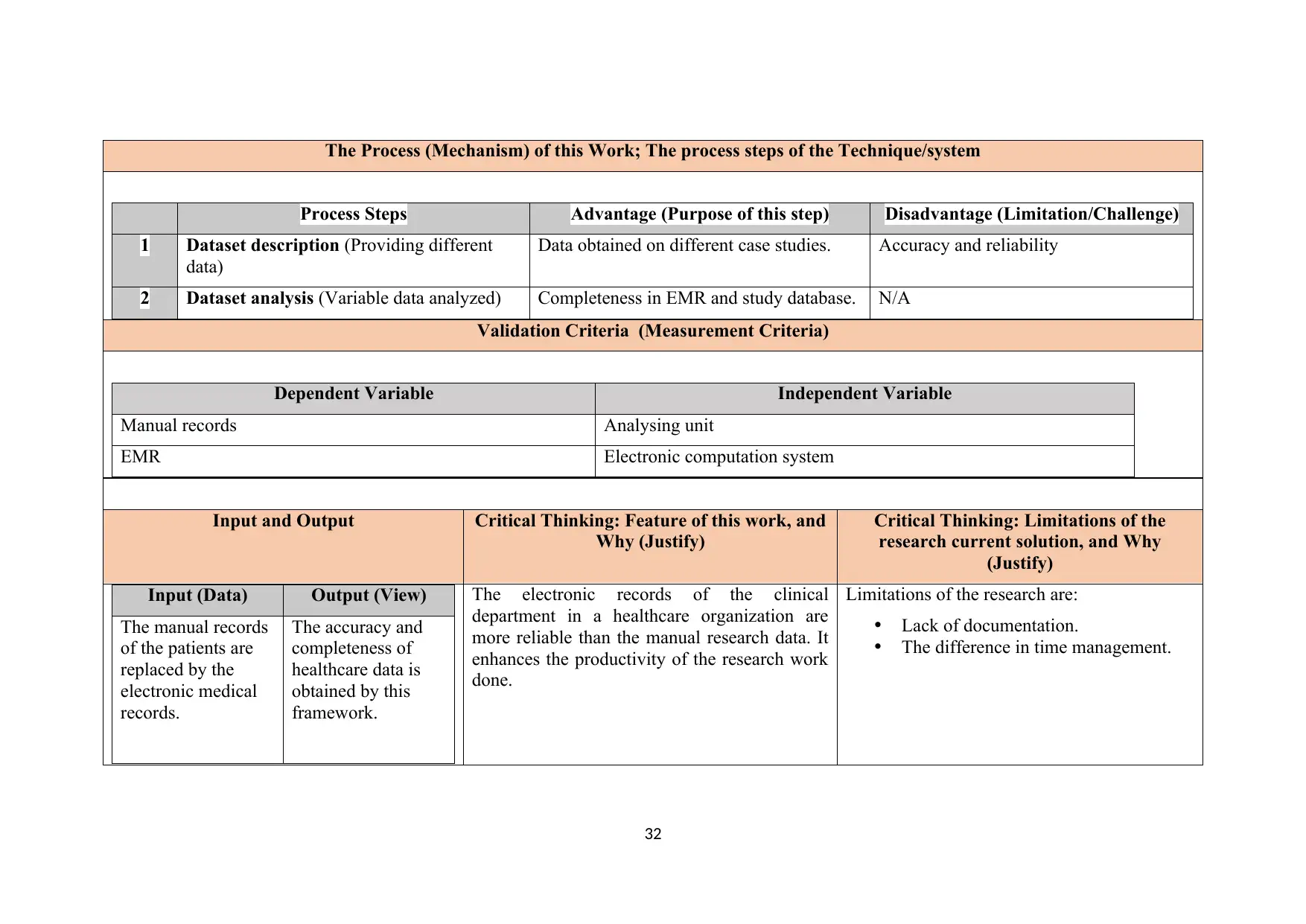
The Process (Mechanism) of this Work; The process steps of the Technique/system
Process Steps Advantage (Purpose of this step) Disadvantage (Limitation/Challenge)
1 Dataset description (Providing different
data)
Data obtained on different case studies. Accuracy and reliability
2 Dataset analysis (Variable data analyzed) Completeness in EMR and study database. N/A
Validation Criteria (Measurement Criteria)
Dependent Variable Independent Variable
Manual records Analysing unit
EMR Electronic computation system
Input and Output Critical Thinking: Feature of this work, and
Why (Justify)
Critical Thinking: Limitations of the
research current solution, and Why
(Justify)
Input (Data) Output (View)
The manual records
of the patients are
replaced by the
electronic medical
records.
The accuracy and
completeness of
healthcare data is
obtained by this
framework.
The electronic records of the clinical
department in a healthcare organization are
more reliable than the manual research data. It
enhances the productivity of the research work
done.
Limitations of the research are:
Lack of documentation.
The difference in time management.
32
Process Steps Advantage (Purpose of this step) Disadvantage (Limitation/Challenge)
1 Dataset description (Providing different
data)
Data obtained on different case studies. Accuracy and reliability
2 Dataset analysis (Variable data analyzed) Completeness in EMR and study database. N/A
Validation Criteria (Measurement Criteria)
Dependent Variable Independent Variable
Manual records Analysing unit
EMR Electronic computation system
Input and Output Critical Thinking: Feature of this work, and
Why (Justify)
Critical Thinking: Limitations of the
research current solution, and Why
(Justify)
Input (Data) Output (View)
The manual records
of the patients are
replaced by the
electronic medical
records.
The accuracy and
completeness of
healthcare data is
obtained by this
framework.
The electronic records of the clinical
department in a healthcare organization are
more reliable than the manual research data. It
enhances the productivity of the research work
done.
Limitations of the research are:
Lack of documentation.
The difference in time management.
32
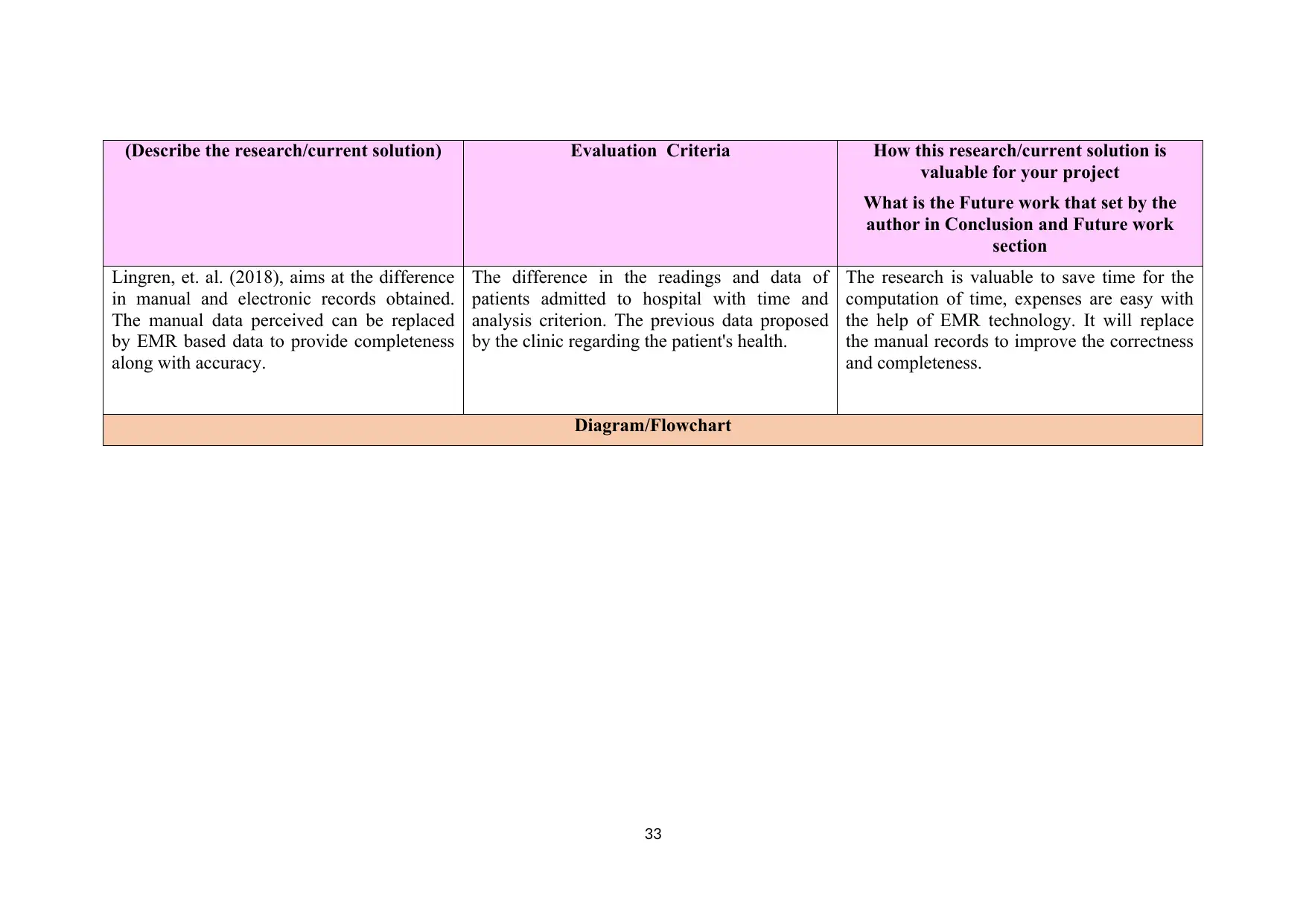
(Describe the research/current solution) Evaluation Criteria How this research/current solution is
valuable for your project
What is the Future work that set by the
author in Conclusion and Future work
section
Lingren, et. al. (2018), aims at the difference
in manual and electronic records obtained.
The manual data perceived can be replaced
by EMR based data to provide completeness
along with accuracy.
The difference in the readings and data of
patients admitted to hospital with time and
analysis criterion. The previous data proposed
by the clinic regarding the patient's health.
The research is valuable to save time for the
computation of time, expenses are easy with
the help of EMR technology. It will replace
the manual records to improve the correctness
and completeness.
Diagram/Flowchart
33
valuable for your project
What is the Future work that set by the
author in Conclusion and Future work
section
Lingren, et. al. (2018), aims at the difference
in manual and electronic records obtained.
The manual data perceived can be replaced
by EMR based data to provide completeness
along with accuracy.
The difference in the readings and data of
patients admitted to hospital with time and
analysis criterion. The previous data proposed
by the clinic regarding the patient's health.
The research is valuable to save time for the
computation of time, expenses are easy with
the help of EMR technology. It will replace
the manual records to improve the correctness
and completeness.
Diagram/Flowchart
33
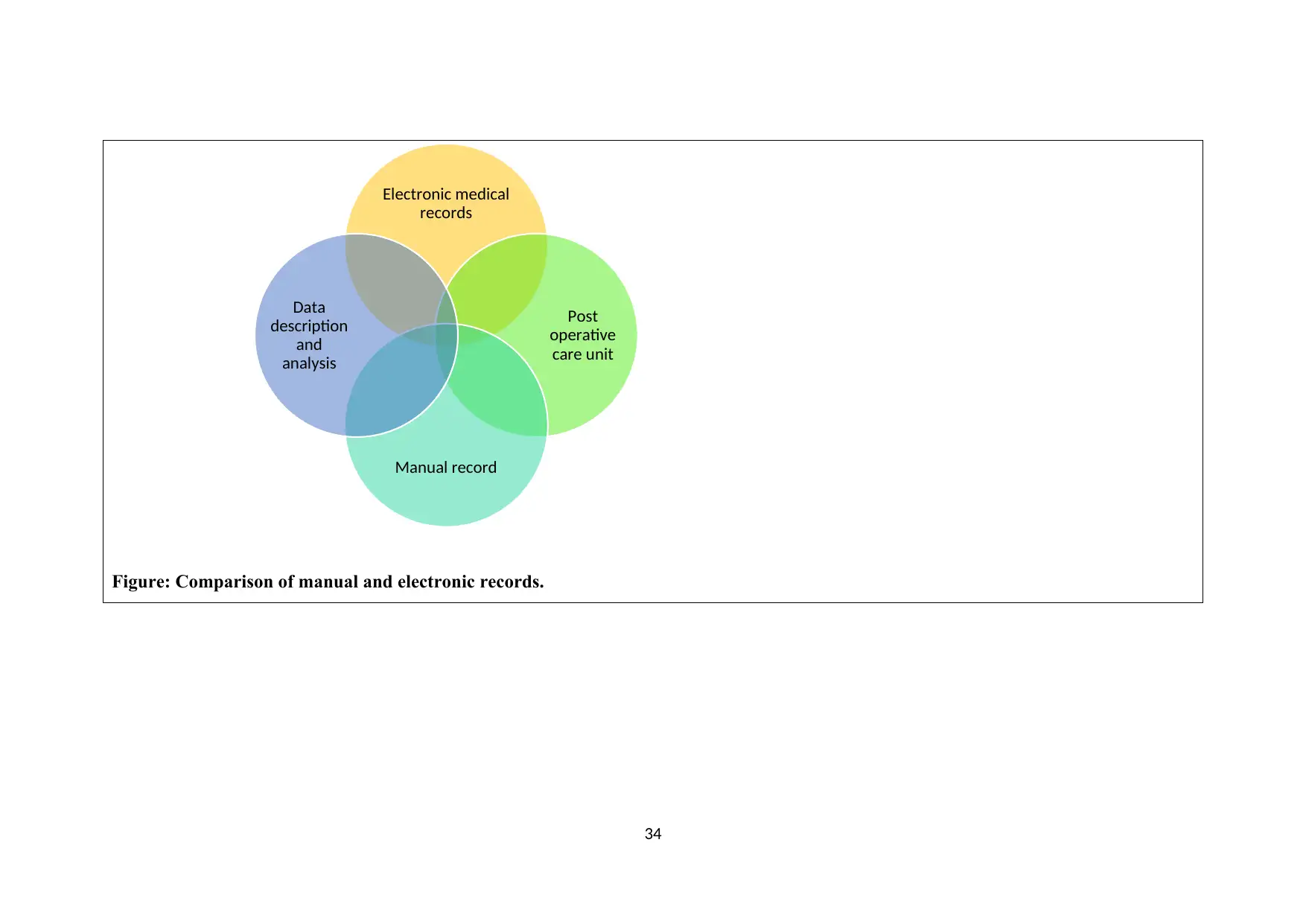
Figure: Comparison of manual and electronic records.
34
Electronic medical
records
Post
operative
care unit
Manual record
Data
description
and
analysis
34
Electronic medical
records
Post
operative
care unit
Manual record
Data
description
and
analysis
Secure Best Marks with AI Grader
Need help grading? Try our AI Grader for instant feedback on your assignments.
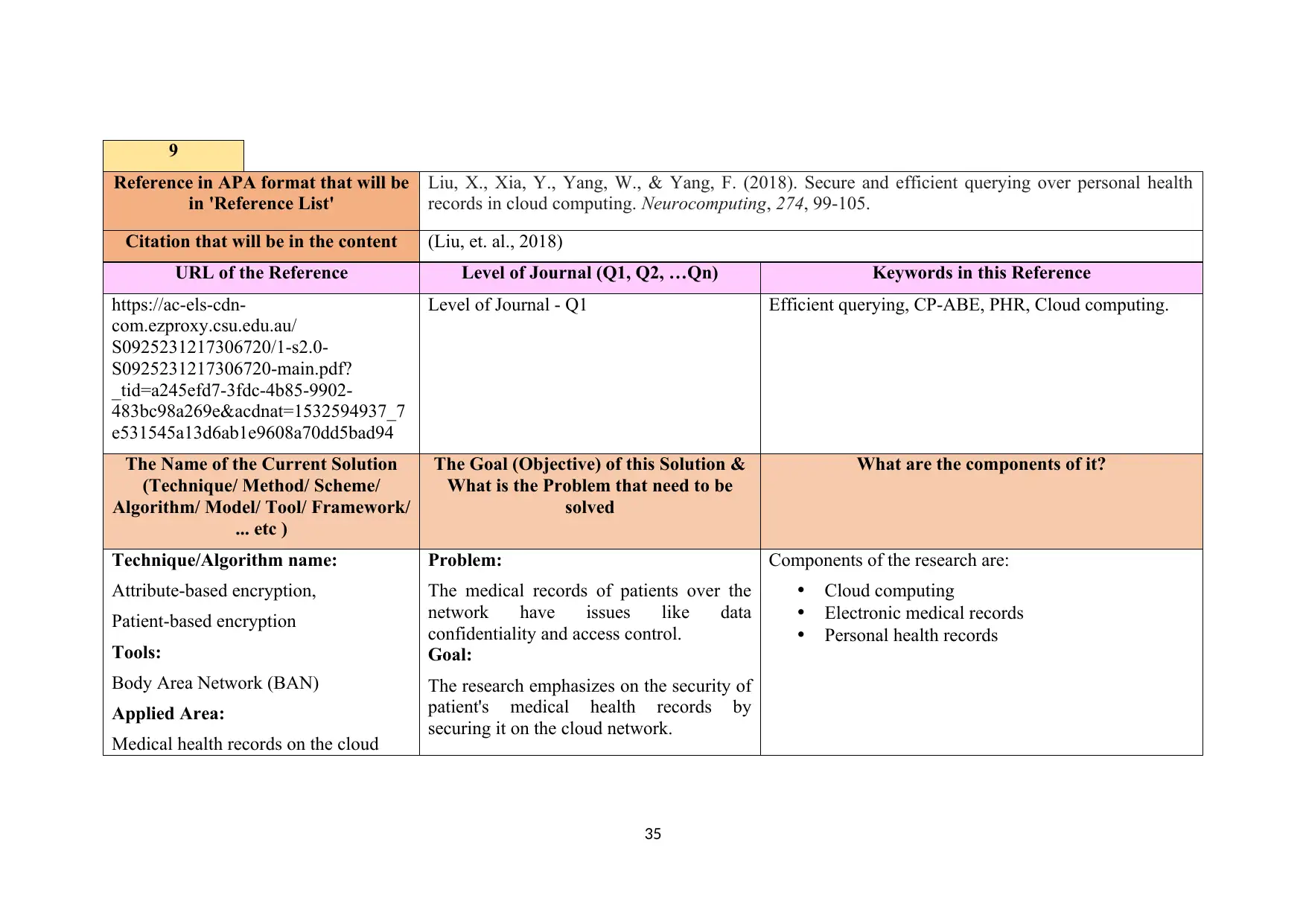
9
Reference in APA format that will be
in 'Reference List'
Liu, X., Xia, Y., Yang, W., & Yang, F. (2018). Secure and efficient querying over personal health
records in cloud computing. Neurocomputing, 274, 99-105.
Citation that will be in the content (Liu, et. al., 2018)
URL of the Reference Level of Journal (Q1, Q2, …Qn) Keywords in this Reference
https://ac-els-cdn-
com.ezproxy.csu.edu.au/
S0925231217306720/1-s2.0-
S0925231217306720-main.pdf?
_tid=a245efd7-3fdc-4b85-9902-
483bc98a269e&acdnat=1532594937_7
e531545a13d6ab1e9608a70dd5bad94
Level of Journal - Q1 Efficient querying, CP-ABE, PHR, Cloud computing.
The Name of the Current Solution
(Technique/ Method/ Scheme/
Algorithm/ Model/ Tool/ Framework/
... etc )
The Goal (Objective) of this Solution &
What is the Problem that need to be
solved
What are the components of it?
Technique/Algorithm name:
Attribute-based encryption,
Patient-based encryption
Tools:
Body Area Network (BAN)
Applied Area:
Medical health records on the cloud
Problem:
The medical records of patients over the
network have issues like data
confidentiality and access control.
Goal:
The research emphasizes on the security of
patient's medical health records by
securing it on the cloud network.
Components of the research are:
Cloud computing
Electronic medical records
Personal health records
35
Reference in APA format that will be
in 'Reference List'
Liu, X., Xia, Y., Yang, W., & Yang, F. (2018). Secure and efficient querying over personal health
records in cloud computing. Neurocomputing, 274, 99-105.
Citation that will be in the content (Liu, et. al., 2018)
URL of the Reference Level of Journal (Q1, Q2, …Qn) Keywords in this Reference
https://ac-els-cdn-
com.ezproxy.csu.edu.au/
S0925231217306720/1-s2.0-
S0925231217306720-main.pdf?
_tid=a245efd7-3fdc-4b85-9902-
483bc98a269e&acdnat=1532594937_7
e531545a13d6ab1e9608a70dd5bad94
Level of Journal - Q1 Efficient querying, CP-ABE, PHR, Cloud computing.
The Name of the Current Solution
(Technique/ Method/ Scheme/
Algorithm/ Model/ Tool/ Framework/
... etc )
The Goal (Objective) of this Solution &
What is the Problem that need to be
solved
What are the components of it?
Technique/Algorithm name:
Attribute-based encryption,
Patient-based encryption
Tools:
Body Area Network (BAN)
Applied Area:
Medical health records on the cloud
Problem:
The medical records of patients over the
network have issues like data
confidentiality and access control.
Goal:
The research emphasizes on the security of
patient's medical health records by
securing it on the cloud network.
Components of the research are:
Cloud computing
Electronic medical records
Personal health records
35
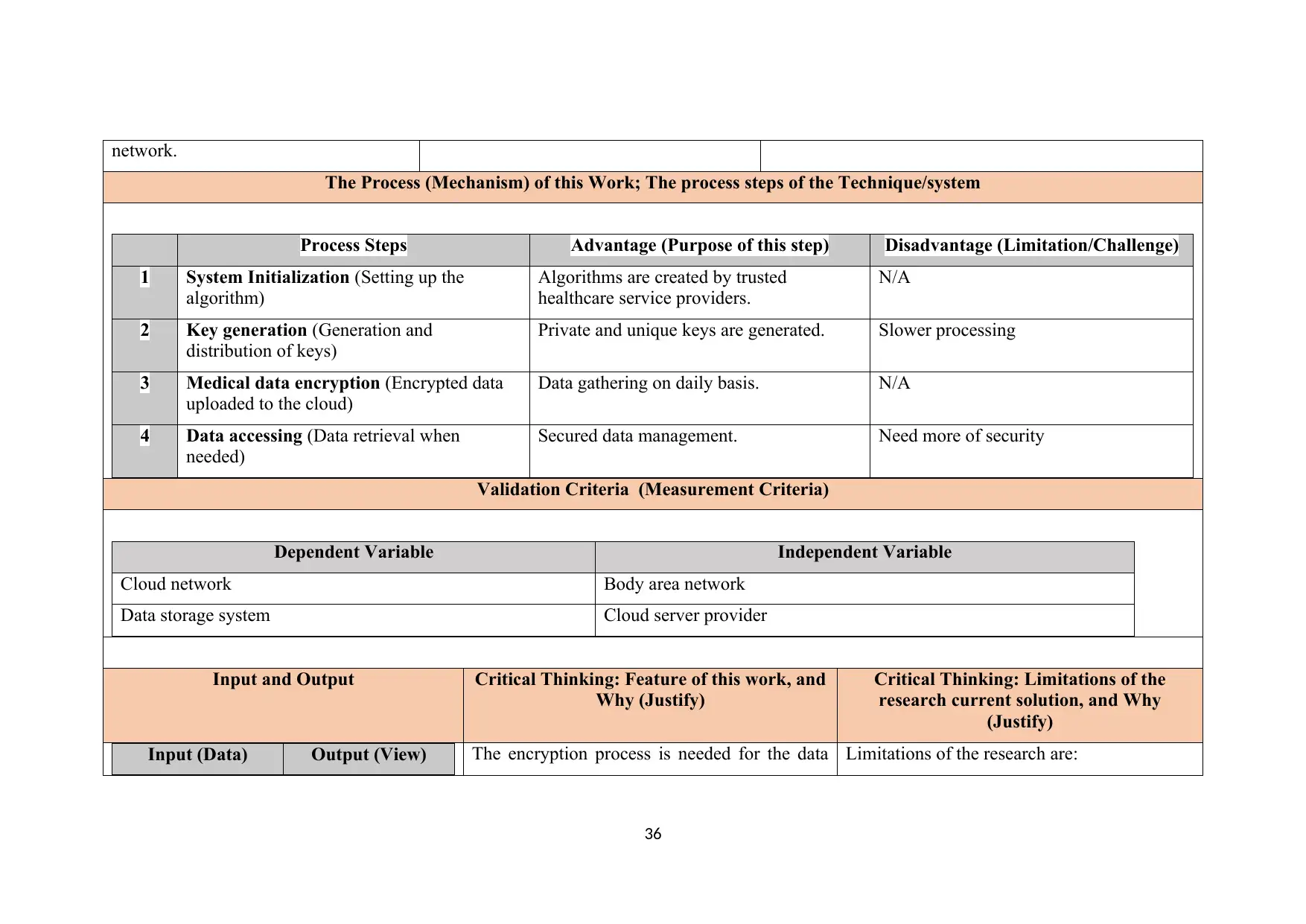
network.
The Process (Mechanism) of this Work; The process steps of the Technique/system
Process Steps Advantage (Purpose of this step) Disadvantage (Limitation/Challenge)
1 System Initialization (Setting up the
algorithm)
Algorithms are created by trusted
healthcare service providers.
N/A
2 Key generation (Generation and
distribution of keys)
Private and unique keys are generated. Slower processing
3 Medical data encryption (Encrypted data
uploaded to the cloud)
Data gathering on daily basis. N/A
4 Data accessing (Data retrieval when
needed)
Secured data management. Need more of security
Validation Criteria (Measurement Criteria)
Dependent Variable Independent Variable
Cloud network Body area network
Data storage system Cloud server provider
Input and Output Critical Thinking: Feature of this work, and
Why (Justify)
Critical Thinking: Limitations of the
research current solution, and Why
(Justify)
Input (Data) Output (View) The encryption process is needed for the data Limitations of the research are:
36
The Process (Mechanism) of this Work; The process steps of the Technique/system
Process Steps Advantage (Purpose of this step) Disadvantage (Limitation/Challenge)
1 System Initialization (Setting up the
algorithm)
Algorithms are created by trusted
healthcare service providers.
N/A
2 Key generation (Generation and
distribution of keys)
Private and unique keys are generated. Slower processing
3 Medical data encryption (Encrypted data
uploaded to the cloud)
Data gathering on daily basis. N/A
4 Data accessing (Data retrieval when
needed)
Secured data management. Need more of security
Validation Criteria (Measurement Criteria)
Dependent Variable Independent Variable
Cloud network Body area network
Data storage system Cloud server provider
Input and Output Critical Thinking: Feature of this work, and
Why (Justify)
Critical Thinking: Limitations of the
research current solution, and Why
(Justify)
Input (Data) Output (View) The encryption process is needed for the data Limitations of the research are:
36
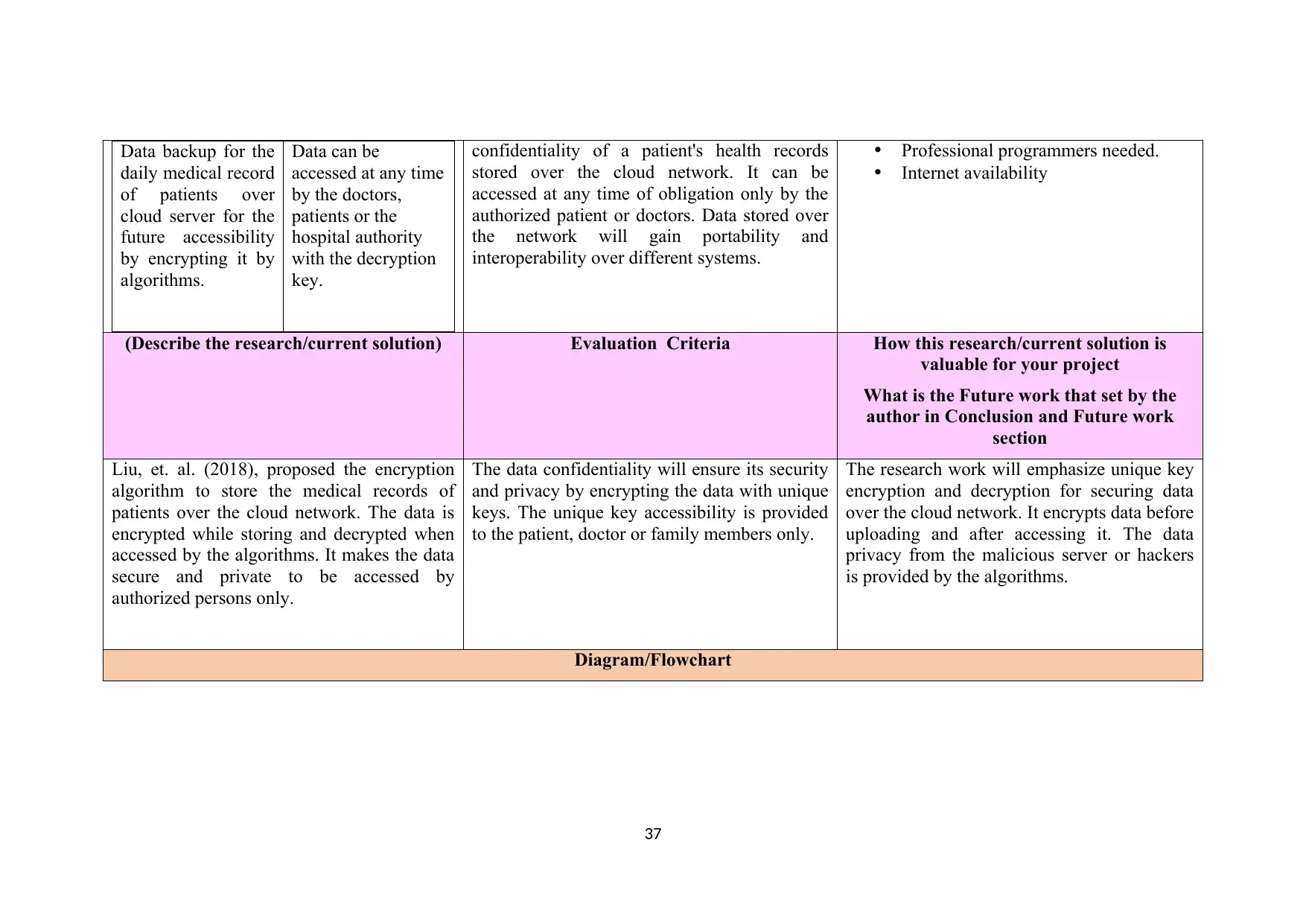
Data backup for the
daily medical record
of patients over
cloud server for the
future accessibility
by encrypting it by
algorithms.
Data can be
accessed at any time
by the doctors,
patients or the
hospital authority
with the decryption
key.
confidentiality of a patient's health records
stored over the cloud network. It can be
accessed at any time of obligation only by the
authorized patient or doctors. Data stored over
the network will gain portability and
interoperability over different systems.
Professional programmers needed.
Internet availability
(Describe the research/current solution) Evaluation Criteria How this research/current solution is
valuable for your project
What is the Future work that set by the
author in Conclusion and Future work
section
Liu, et. al. (2018), proposed the encryption
algorithm to store the medical records of
patients over the cloud network. The data is
encrypted while storing and decrypted when
accessed by the algorithms. It makes the data
secure and private to be accessed by
authorized persons only.
The data confidentiality will ensure its security
and privacy by encrypting the data with unique
keys. The unique key accessibility is provided
to the patient, doctor or family members only.
The research work will emphasize unique key
encryption and decryption for securing data
over the cloud network. It encrypts data before
uploading and after accessing it. The data
privacy from the malicious server or hackers
is provided by the algorithms.
Diagram/Flowchart
37
daily medical record
of patients over
cloud server for the
future accessibility
by encrypting it by
algorithms.
Data can be
accessed at any time
by the doctors,
patients or the
hospital authority
with the decryption
key.
confidentiality of a patient's health records
stored over the cloud network. It can be
accessed at any time of obligation only by the
authorized patient or doctors. Data stored over
the network will gain portability and
interoperability over different systems.
Professional programmers needed.
Internet availability
(Describe the research/current solution) Evaluation Criteria How this research/current solution is
valuable for your project
What is the Future work that set by the
author in Conclusion and Future work
section
Liu, et. al. (2018), proposed the encryption
algorithm to store the medical records of
patients over the cloud network. The data is
encrypted while storing and decrypted when
accessed by the algorithms. It makes the data
secure and private to be accessed by
authorized persons only.
The data confidentiality will ensure its security
and privacy by encrypting the data with unique
keys. The unique key accessibility is provided
to the patient, doctor or family members only.
The research work will emphasize unique key
encryption and decryption for securing data
over the cloud network. It encrypts data before
uploading and after accessing it. The data
privacy from the malicious server or hackers
is provided by the algorithms.
Diagram/Flowchart
37
Paraphrase This Document
Need a fresh take? Get an instant paraphrase of this document with our AI Paraphraser
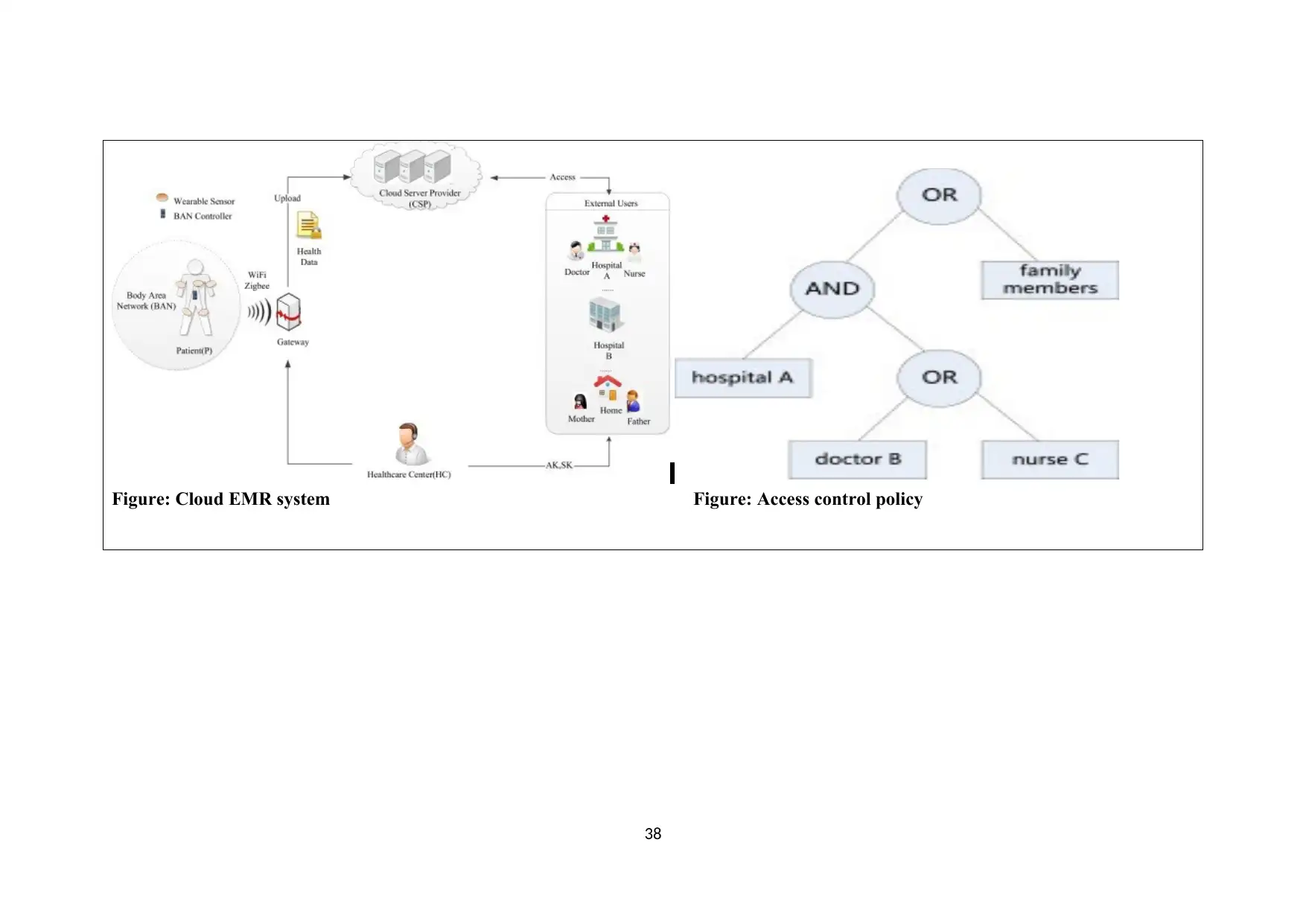
Figure: Cloud EMR system Figure: Access control policy
38
38
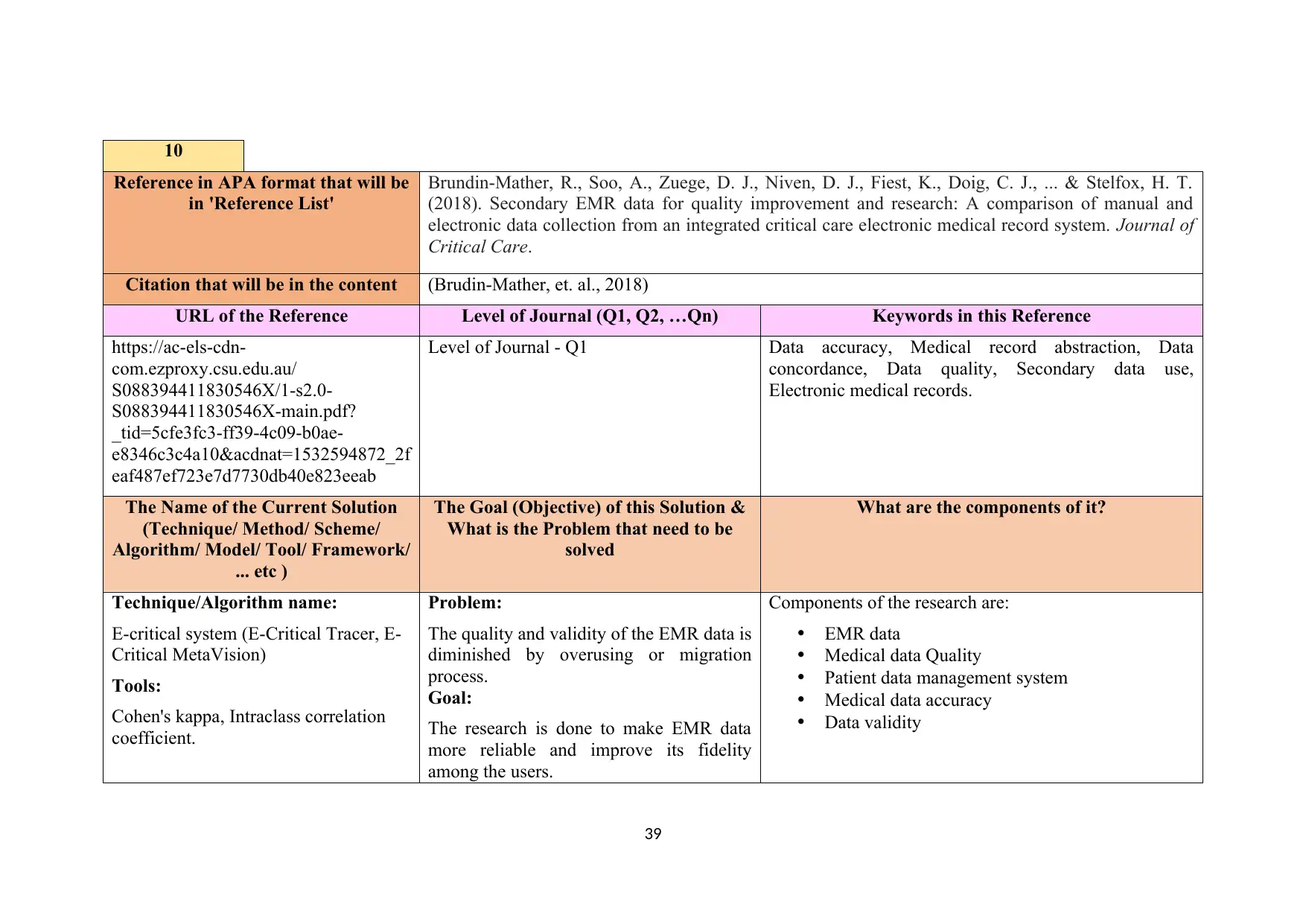
10
Reference in APA format that will be
in 'Reference List'
Brundin-Mather, R., Soo, A., Zuege, D. J., Niven, D. J., Fiest, K., Doig, C. J., ... & Stelfox, H. T.
(2018). Secondary EMR data for quality improvement and research: A comparison of manual and
electronic data collection from an integrated critical care electronic medical record system. Journal of
Critical Care.
Citation that will be in the content (Brudin-Mather, et. al., 2018)
URL of the Reference Level of Journal (Q1, Q2, …Qn) Keywords in this Reference
https://ac-els-cdn-
com.ezproxy.csu.edu.au/
S088394411830546X/1-s2.0-
S088394411830546X-main.pdf?
_tid=5cfe3fc3-ff39-4c09-b0ae-
e8346c3c4a10&acdnat=1532594872_2f
eaf487ef723e7d7730db40e823eeab
Level of Journal - Q1 Data accuracy, Medical record abstraction, Data
concordance, Data quality, Secondary data use,
Electronic medical records.
The Name of the Current Solution
(Technique/ Method/ Scheme/
Algorithm/ Model/ Tool/ Framework/
... etc )
The Goal (Objective) of this Solution &
What is the Problem that need to be
solved
What are the components of it?
Technique/Algorithm name:
E-critical system (E-Critical Tracer, E-
Critical MetaVision)
Tools:
Cohen's kappa, Intraclass correlation
coefficient.
Problem:
The quality and validity of the EMR data is
diminished by overusing or migration
process.
Goal:
The research is done to make EMR data
more reliable and improve its fidelity
among the users.
Components of the research are:
EMR data
Medical data Quality
Patient data management system
Medical data accuracy
Data validity
39
Reference in APA format that will be
in 'Reference List'
Brundin-Mather, R., Soo, A., Zuege, D. J., Niven, D. J., Fiest, K., Doig, C. J., ... & Stelfox, H. T.
(2018). Secondary EMR data for quality improvement and research: A comparison of manual and
electronic data collection from an integrated critical care electronic medical record system. Journal of
Critical Care.
Citation that will be in the content (Brudin-Mather, et. al., 2018)
URL of the Reference Level of Journal (Q1, Q2, …Qn) Keywords in this Reference
https://ac-els-cdn-
com.ezproxy.csu.edu.au/
S088394411830546X/1-s2.0-
S088394411830546X-main.pdf?
_tid=5cfe3fc3-ff39-4c09-b0ae-
e8346c3c4a10&acdnat=1532594872_2f
eaf487ef723e7d7730db40e823eeab
Level of Journal - Q1 Data accuracy, Medical record abstraction, Data
concordance, Data quality, Secondary data use,
Electronic medical records.
The Name of the Current Solution
(Technique/ Method/ Scheme/
Algorithm/ Model/ Tool/ Framework/
... etc )
The Goal (Objective) of this Solution &
What is the Problem that need to be
solved
What are the components of it?
Technique/Algorithm name:
E-critical system (E-Critical Tracer, E-
Critical MetaVision)
Tools:
Cohen's kappa, Intraclass correlation
coefficient.
Problem:
The quality and validity of the EMR data is
diminished by overusing or migration
process.
Goal:
The research is done to make EMR data
more reliable and improve its fidelity
among the users.
Components of the research are:
EMR data
Medical data Quality
Patient data management system
Medical data accuracy
Data validity
39
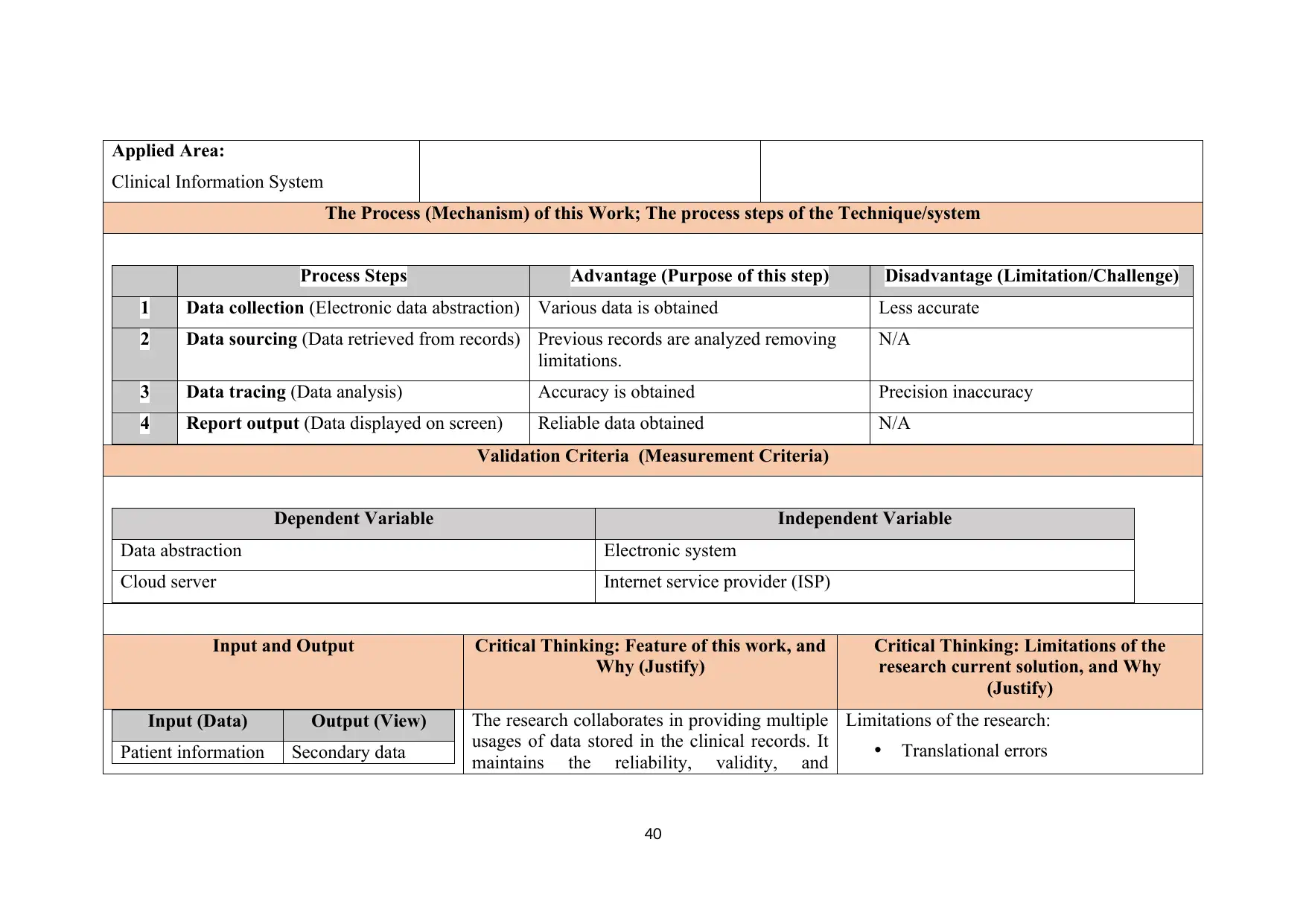
Applied Area:
Clinical Information System
The Process (Mechanism) of this Work; The process steps of the Technique/system
Process Steps Advantage (Purpose of this step) Disadvantage (Limitation/Challenge)
1 Data collection (Electronic data abstraction) Various data is obtained Less accurate
2 Data sourcing (Data retrieved from records) Previous records are analyzed removing
limitations.
N/A
3 Data tracing (Data analysis) Accuracy is obtained Precision inaccuracy
4 Report output (Data displayed on screen) Reliable data obtained N/A
Validation Criteria (Measurement Criteria)
Dependent Variable Independent Variable
Data abstraction Electronic system
Cloud server Internet service provider (ISP)
Input and Output Critical Thinking: Feature of this work, and
Why (Justify)
Critical Thinking: Limitations of the
research current solution, and Why
(Justify)
Input (Data) Output (View)
Patient information Secondary data
The research collaborates in providing multiple
usages of data stored in the clinical records. It
maintains the reliability, validity, and
Limitations of the research:
Translational errors
40
Clinical Information System
The Process (Mechanism) of this Work; The process steps of the Technique/system
Process Steps Advantage (Purpose of this step) Disadvantage (Limitation/Challenge)
1 Data collection (Electronic data abstraction) Various data is obtained Less accurate
2 Data sourcing (Data retrieved from records) Previous records are analyzed removing
limitations.
N/A
3 Data tracing (Data analysis) Accuracy is obtained Precision inaccuracy
4 Report output (Data displayed on screen) Reliable data obtained N/A
Validation Criteria (Measurement Criteria)
Dependent Variable Independent Variable
Data abstraction Electronic system
Cloud server Internet service provider (ISP)
Input and Output Critical Thinking: Feature of this work, and
Why (Justify)
Critical Thinking: Limitations of the
research current solution, and Why
(Justify)
Input (Data) Output (View)
Patient information Secondary data
The research collaborates in providing multiple
usages of data stored in the clinical records. It
maintains the reliability, validity, and
Limitations of the research:
Translational errors
40
Secure Best Marks with AI Grader
Need help grading? Try our AI Grader for instant feedback on your assignments.
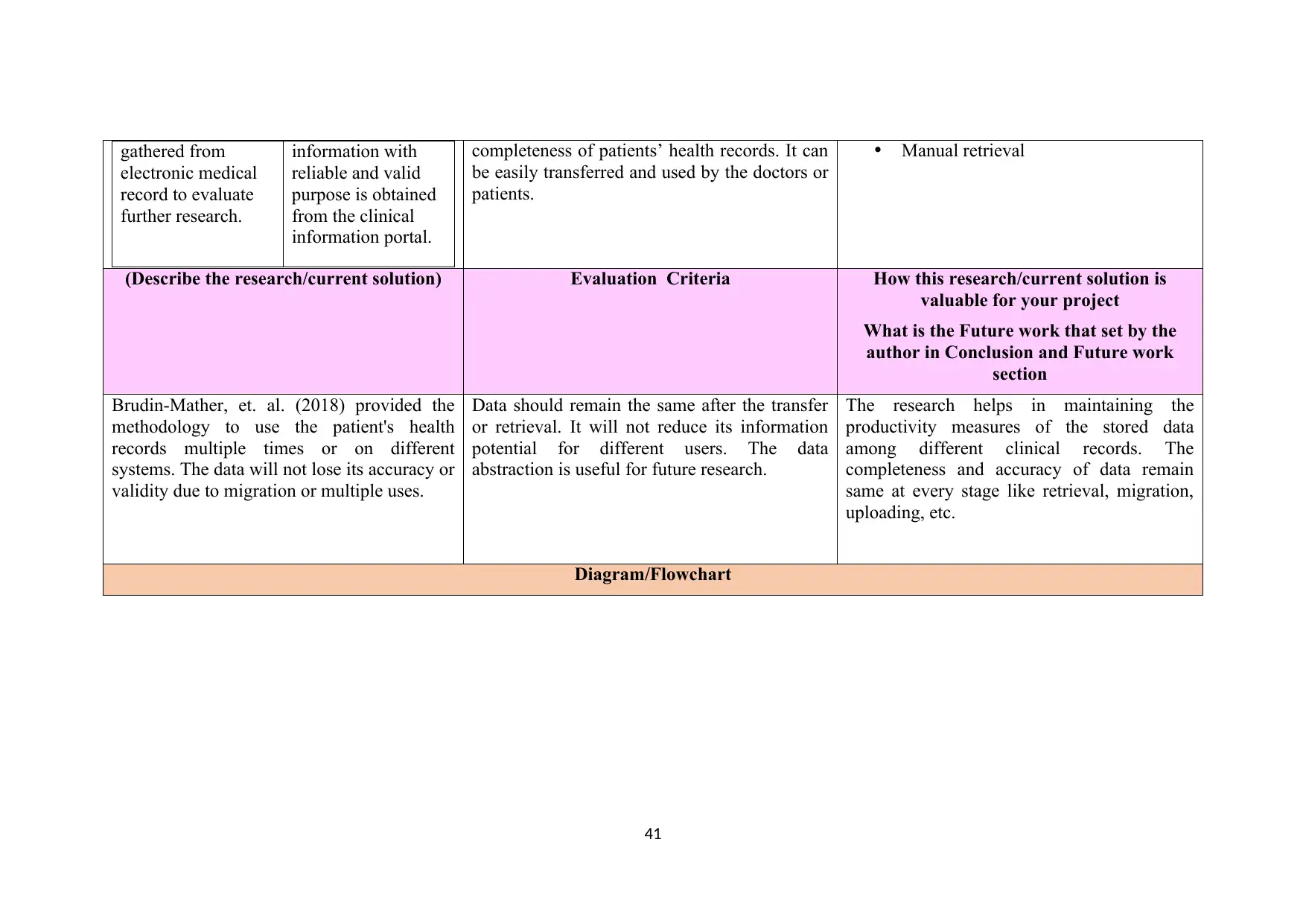
gathered from
electronic medical
record to evaluate
further research.
information with
reliable and valid
purpose is obtained
from the clinical
information portal.
completeness of patients’ health records. It can
be easily transferred and used by the doctors or
patients.
Manual retrieval
(Describe the research/current solution) Evaluation Criteria How this research/current solution is
valuable for your project
What is the Future work that set by the
author in Conclusion and Future work
section
Brudin-Mather, et. al. (2018) provided the
methodology to use the patient's health
records multiple times or on different
systems. The data will not lose its accuracy or
validity due to migration or multiple uses.
Data should remain the same after the transfer
or retrieval. It will not reduce its information
potential for different users. The data
abstraction is useful for future research.
The research helps in maintaining the
productivity measures of the stored data
among different clinical records. The
completeness and accuracy of data remain
same at every stage like retrieval, migration,
uploading, etc.
Diagram/Flowchart
41
electronic medical
record to evaluate
further research.
information with
reliable and valid
purpose is obtained
from the clinical
information portal.
completeness of patients’ health records. It can
be easily transferred and used by the doctors or
patients.
Manual retrieval
(Describe the research/current solution) Evaluation Criteria How this research/current solution is
valuable for your project
What is the Future work that set by the
author in Conclusion and Future work
section
Brudin-Mather, et. al. (2018) provided the
methodology to use the patient's health
records multiple times or on different
systems. The data will not lose its accuracy or
validity due to migration or multiple uses.
Data should remain the same after the transfer
or retrieval. It will not reduce its information
potential for different users. The data
abstraction is useful for future research.
The research helps in maintaining the
productivity measures of the stored data
among different clinical records. The
completeness and accuracy of data remain
same at every stage like retrieval, migration,
uploading, etc.
Diagram/Flowchart
41
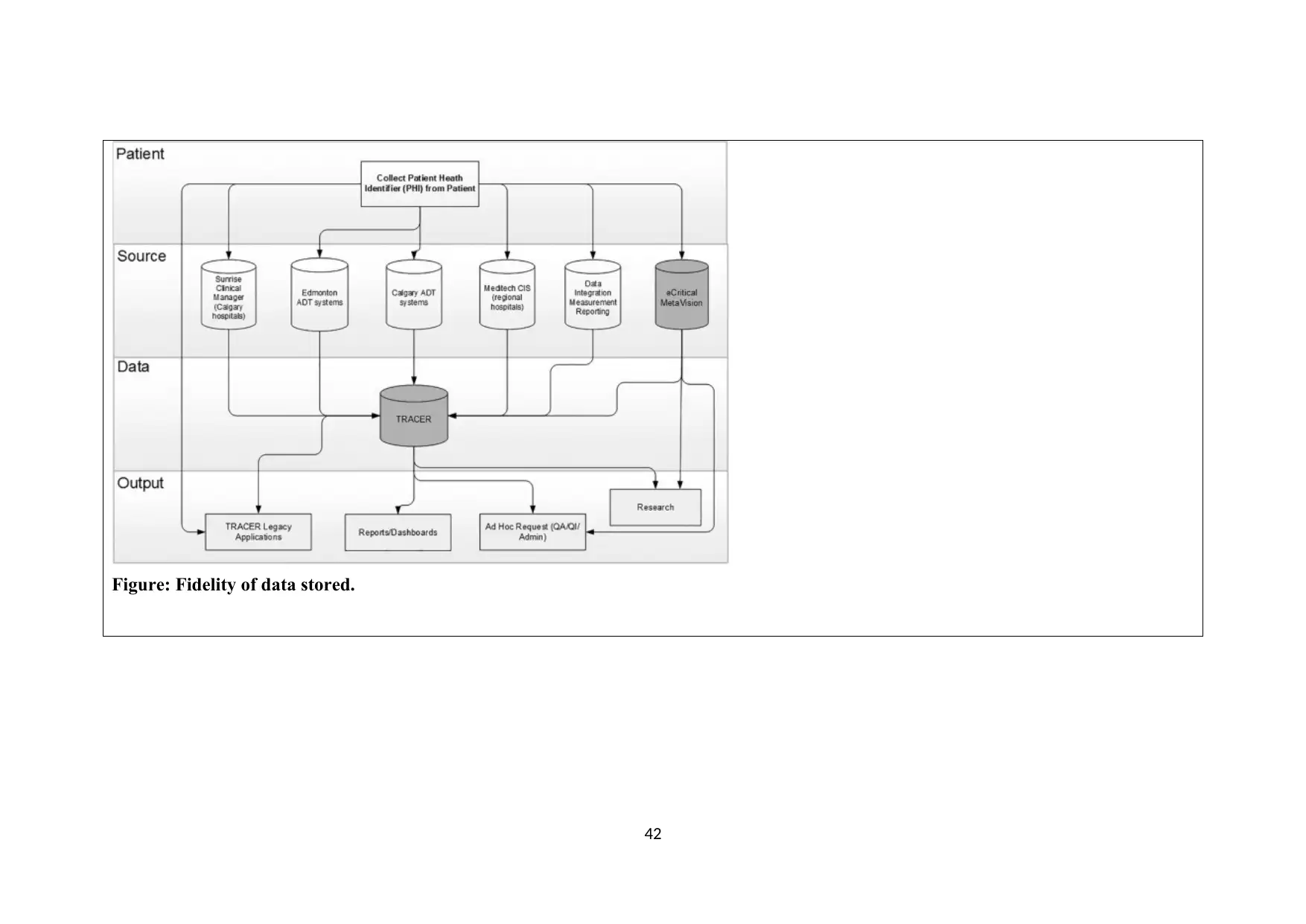
Figure: Fidelity of data stored.
42
42
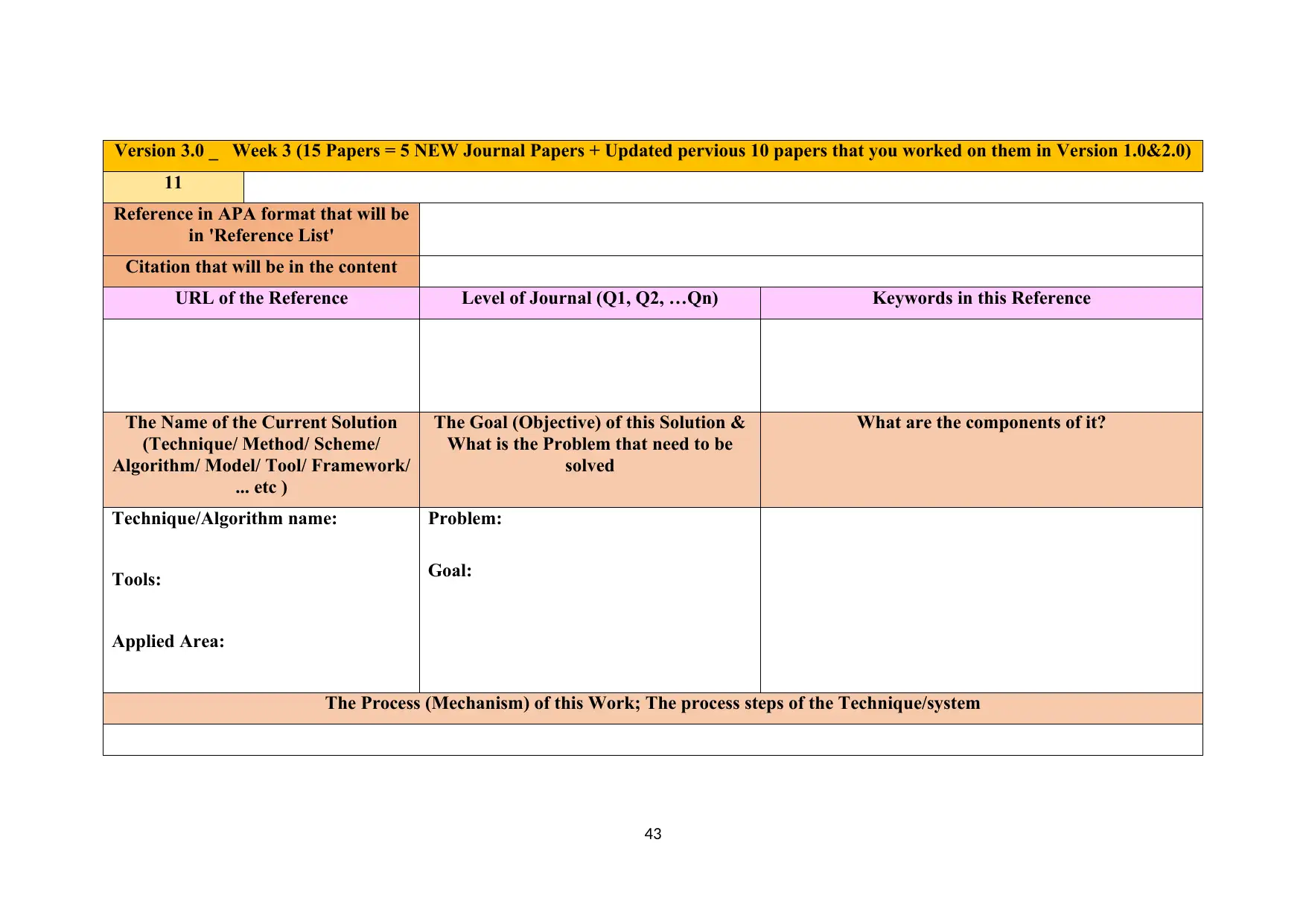
Version 3.0 _ Week 3 (15 Papers = 5 NEW Journal Papers + Updated pervious 10 papers that you worked on them in Version 1.0&2.0)
11
Reference in APA format that will be
in 'Reference List'
Citation that will be in the content
URL of the Reference Level of Journal (Q1, Q2, …Qn) Keywords in this Reference
The Name of the Current Solution
(Technique/ Method/ Scheme/
Algorithm/ Model/ Tool/ Framework/
... etc )
The Goal (Objective) of this Solution &
What is the Problem that need to be
solved
What are the components of it?
Technique/Algorithm name:
Tools:
Applied Area:
Problem:
Goal:
The Process (Mechanism) of this Work; The process steps of the Technique/system
43
11
Reference in APA format that will be
in 'Reference List'
Citation that will be in the content
URL of the Reference Level of Journal (Q1, Q2, …Qn) Keywords in this Reference
The Name of the Current Solution
(Technique/ Method/ Scheme/
Algorithm/ Model/ Tool/ Framework/
... etc )
The Goal (Objective) of this Solution &
What is the Problem that need to be
solved
What are the components of it?
Technique/Algorithm name:
Tools:
Applied Area:
Problem:
Goal:
The Process (Mechanism) of this Work; The process steps of the Technique/system
43
Paraphrase This Document
Need a fresh take? Get an instant paraphrase of this document with our AI Paraphraser
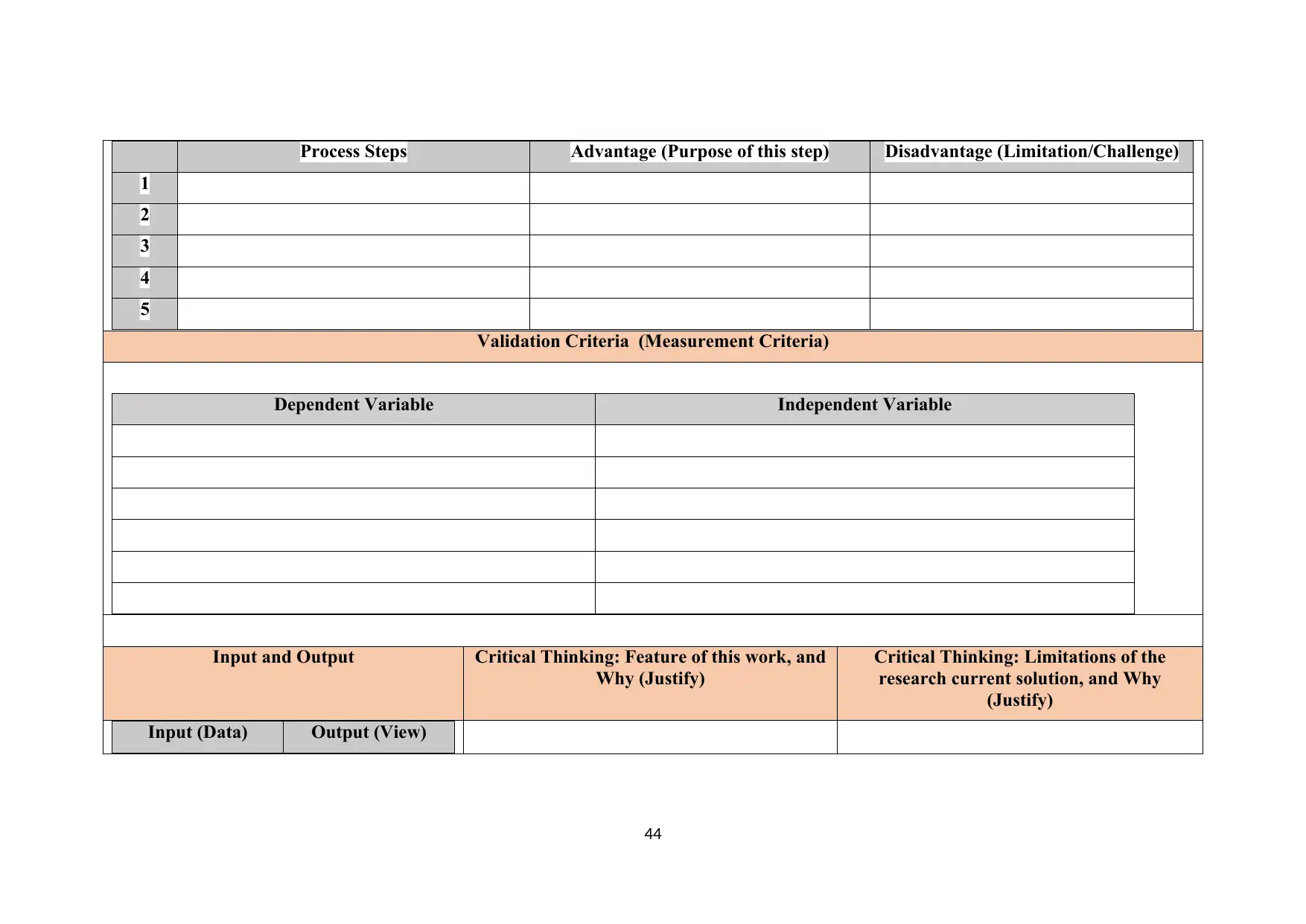
Process Steps Advantage (Purpose of this step) Disadvantage (Limitation/Challenge)
1
2
3
4
5
Validation Criteria (Measurement Criteria)
Dependent Variable Independent Variable
Input and Output Critical Thinking: Feature of this work, and
Why (Justify)
Critical Thinking: Limitations of the
research current solution, and Why
(Justify)
Input (Data) Output (View)
44
1
2
3
4
5
Validation Criteria (Measurement Criteria)
Dependent Variable Independent Variable
Input and Output Critical Thinking: Feature of this work, and
Why (Justify)
Critical Thinking: Limitations of the
research current solution, and Why
(Justify)
Input (Data) Output (View)
44
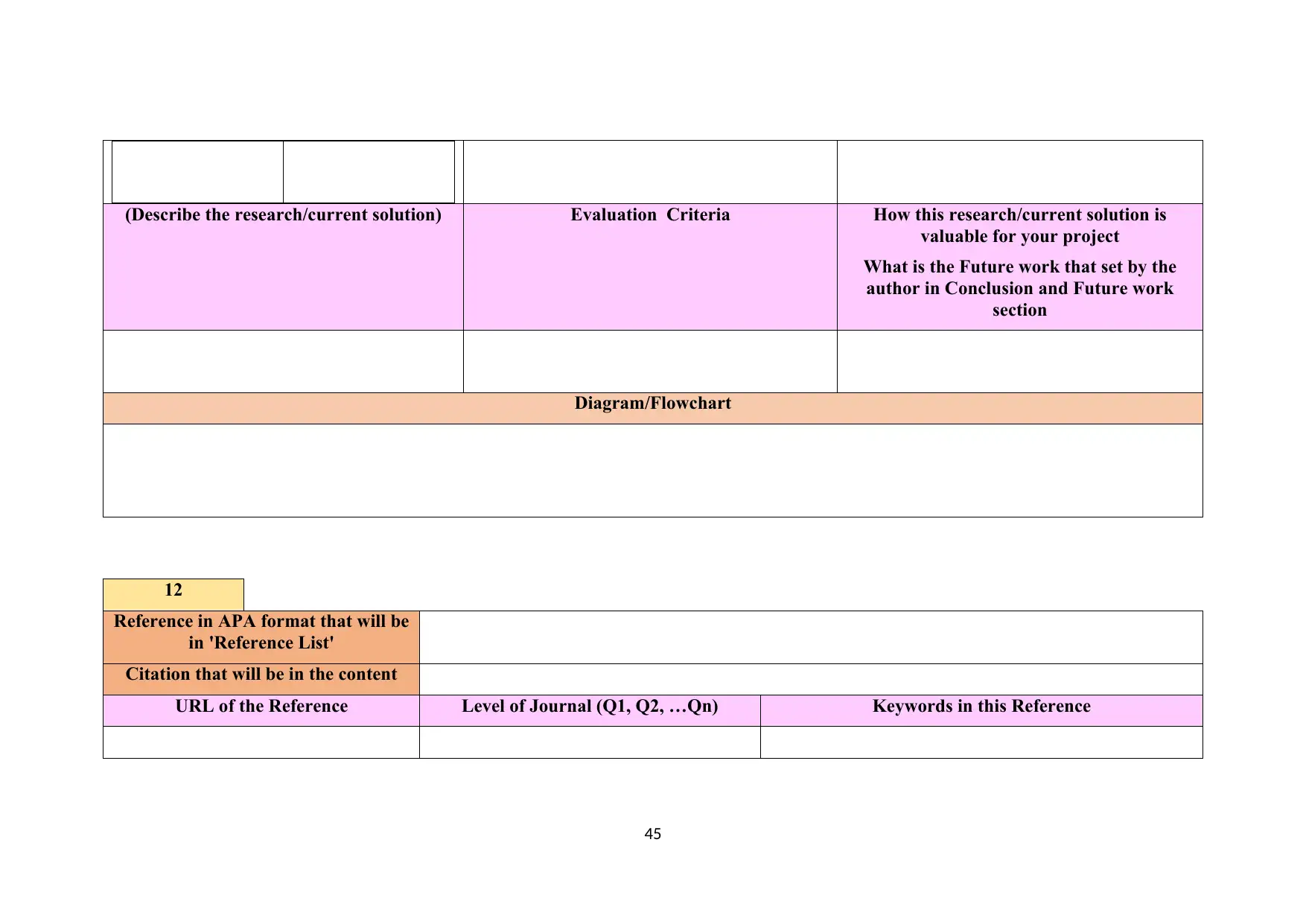
(Describe the research/current solution) Evaluation Criteria How this research/current solution is
valuable for your project
What is the Future work that set by the
author in Conclusion and Future work
section
Diagram/Flowchart
12
Reference in APA format that will be
in 'Reference List'
Citation that will be in the content
URL of the Reference Level of Journal (Q1, Q2, …Qn) Keywords in this Reference
45
valuable for your project
What is the Future work that set by the
author in Conclusion and Future work
section
Diagram/Flowchart
12
Reference in APA format that will be
in 'Reference List'
Citation that will be in the content
URL of the Reference Level of Journal (Q1, Q2, …Qn) Keywords in this Reference
45
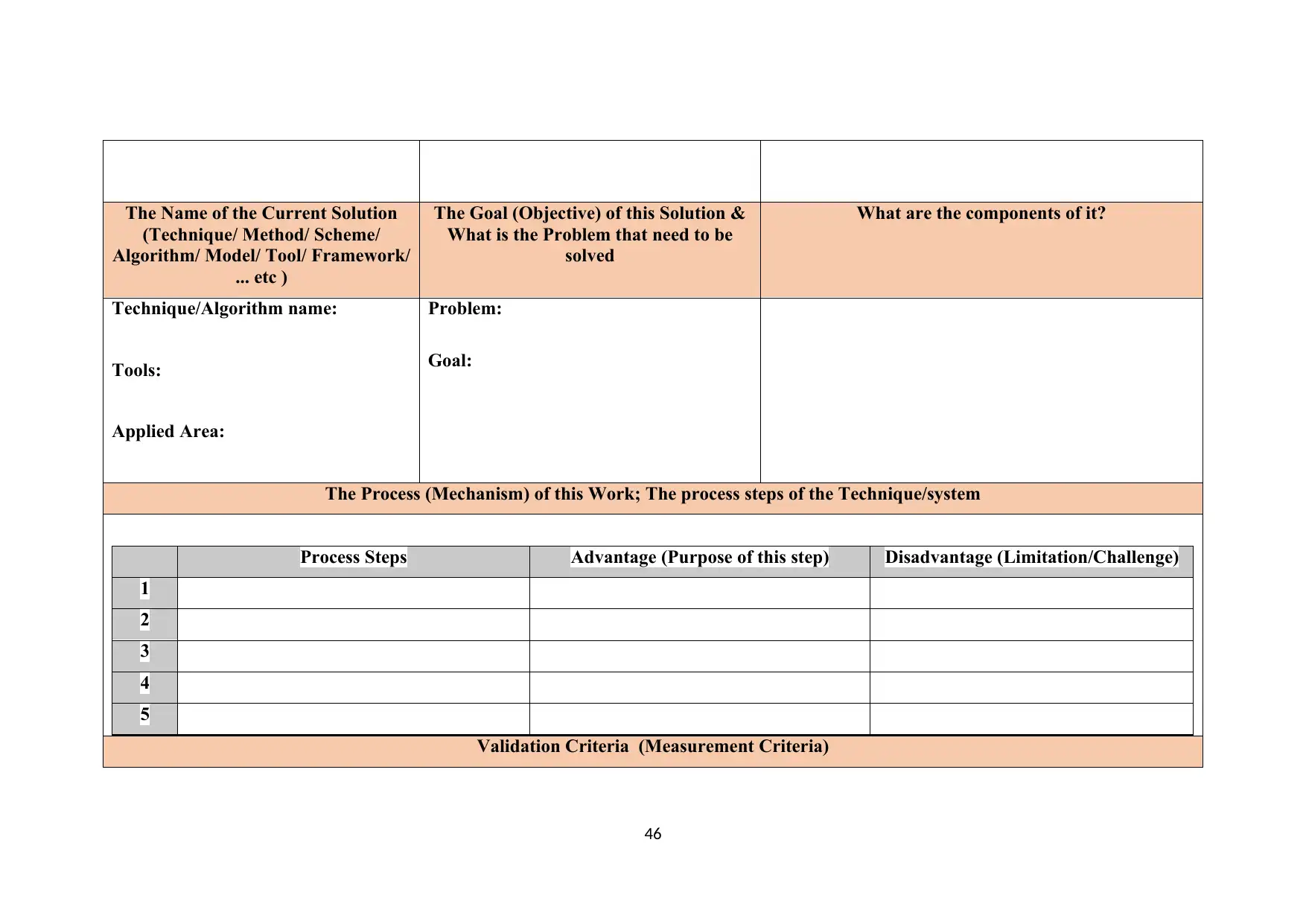
The Name of the Current Solution
(Technique/ Method/ Scheme/
Algorithm/ Model/ Tool/ Framework/
... etc )
The Goal (Objective) of this Solution &
What is the Problem that need to be
solved
What are the components of it?
Technique/Algorithm name:
Tools:
Applied Area:
Problem:
Goal:
The Process (Mechanism) of this Work; The process steps of the Technique/system
Process Steps Advantage (Purpose of this step) Disadvantage (Limitation/Challenge)
1
2
3
4
5
Validation Criteria (Measurement Criteria)
46
(Technique/ Method/ Scheme/
Algorithm/ Model/ Tool/ Framework/
... etc )
The Goal (Objective) of this Solution &
What is the Problem that need to be
solved
What are the components of it?
Technique/Algorithm name:
Tools:
Applied Area:
Problem:
Goal:
The Process (Mechanism) of this Work; The process steps of the Technique/system
Process Steps Advantage (Purpose of this step) Disadvantage (Limitation/Challenge)
1
2
3
4
5
Validation Criteria (Measurement Criteria)
46
Secure Best Marks with AI Grader
Need help grading? Try our AI Grader for instant feedback on your assignments.
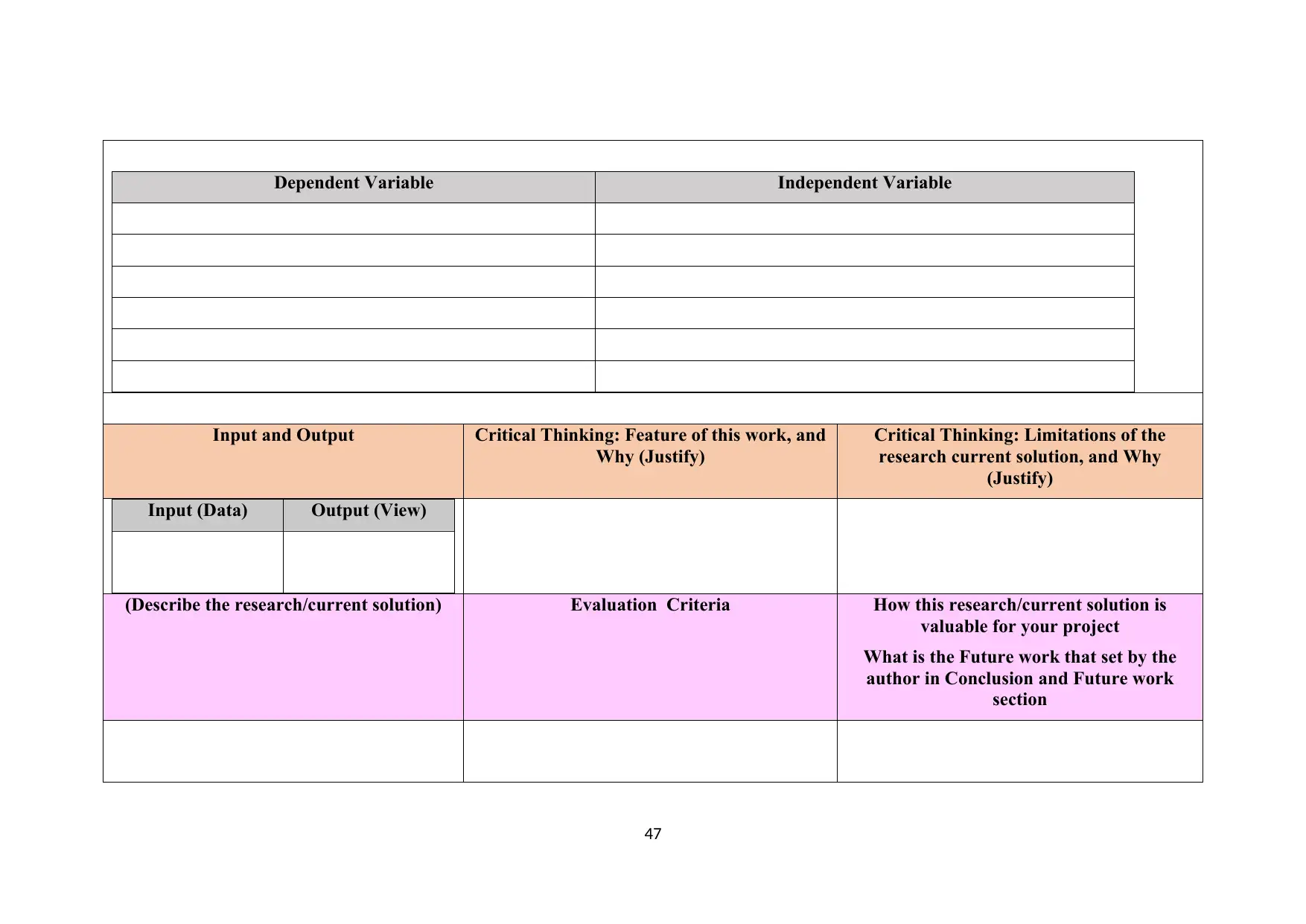
Dependent Variable Independent Variable
Input and Output Critical Thinking: Feature of this work, and
Why (Justify)
Critical Thinking: Limitations of the
research current solution, and Why
(Justify)
Input (Data) Output (View)
(Describe the research/current solution) Evaluation Criteria How this research/current solution is
valuable for your project
What is the Future work that set by the
author in Conclusion and Future work
section
47
Input and Output Critical Thinking: Feature of this work, and
Why (Justify)
Critical Thinking: Limitations of the
research current solution, and Why
(Justify)
Input (Data) Output (View)
(Describe the research/current solution) Evaluation Criteria How this research/current solution is
valuable for your project
What is the Future work that set by the
author in Conclusion and Future work
section
47
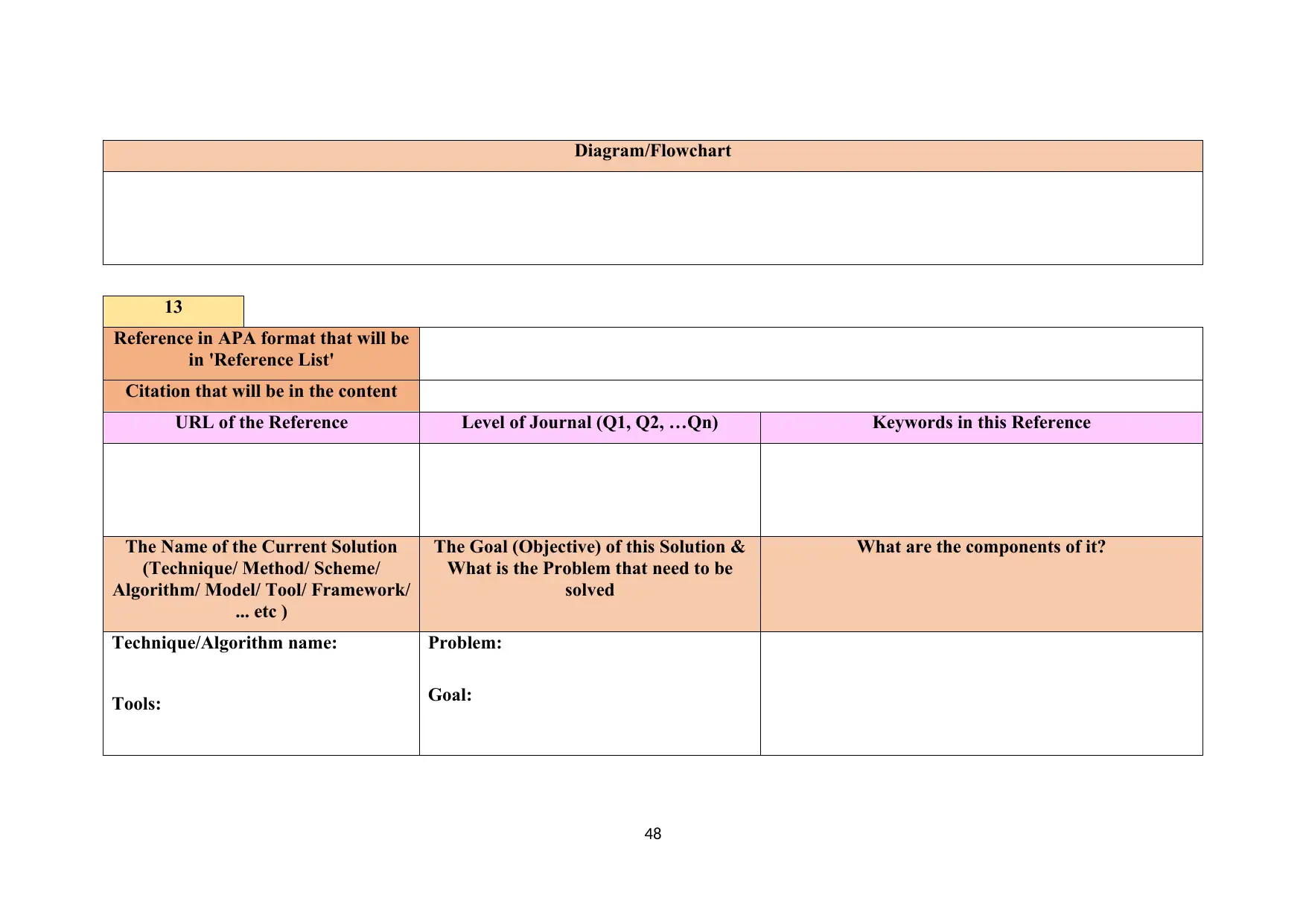
Diagram/Flowchart
13
Reference in APA format that will be
in 'Reference List'
Citation that will be in the content
URL of the Reference Level of Journal (Q1, Q2, …Qn) Keywords in this Reference
The Name of the Current Solution
(Technique/ Method/ Scheme/
Algorithm/ Model/ Tool/ Framework/
... etc )
The Goal (Objective) of this Solution &
What is the Problem that need to be
solved
What are the components of it?
Technique/Algorithm name:
Tools:
Problem:
Goal:
48
13
Reference in APA format that will be
in 'Reference List'
Citation that will be in the content
URL of the Reference Level of Journal (Q1, Q2, …Qn) Keywords in this Reference
The Name of the Current Solution
(Technique/ Method/ Scheme/
Algorithm/ Model/ Tool/ Framework/
... etc )
The Goal (Objective) of this Solution &
What is the Problem that need to be
solved
What are the components of it?
Technique/Algorithm name:
Tools:
Problem:
Goal:
48
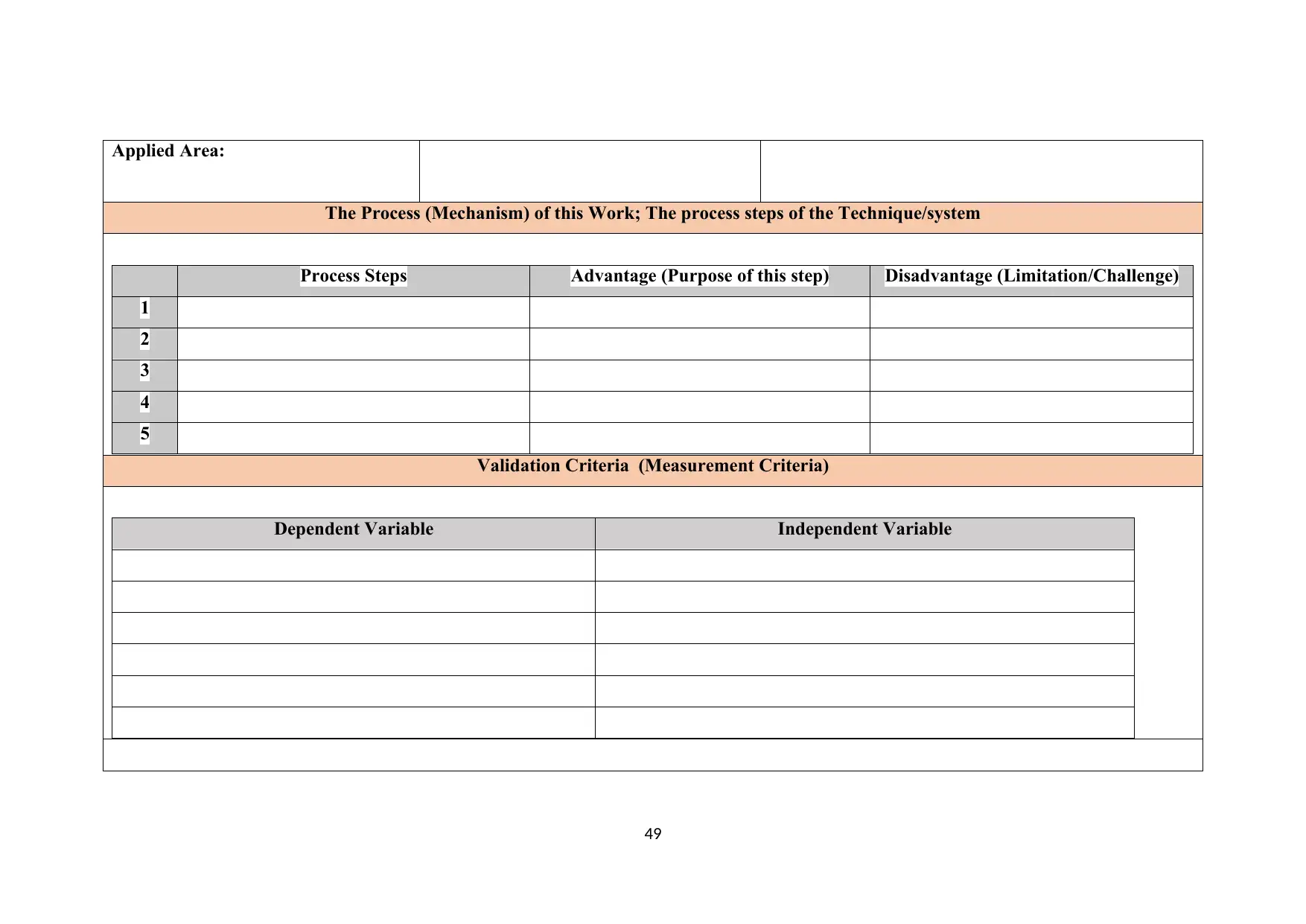
Applied Area:
The Process (Mechanism) of this Work; The process steps of the Technique/system
Process Steps Advantage (Purpose of this step) Disadvantage (Limitation/Challenge)
1
2
3
4
5
Validation Criteria (Measurement Criteria)
Dependent Variable Independent Variable
49
The Process (Mechanism) of this Work; The process steps of the Technique/system
Process Steps Advantage (Purpose of this step) Disadvantage (Limitation/Challenge)
1
2
3
4
5
Validation Criteria (Measurement Criteria)
Dependent Variable Independent Variable
49
Paraphrase This Document
Need a fresh take? Get an instant paraphrase of this document with our AI Paraphraser
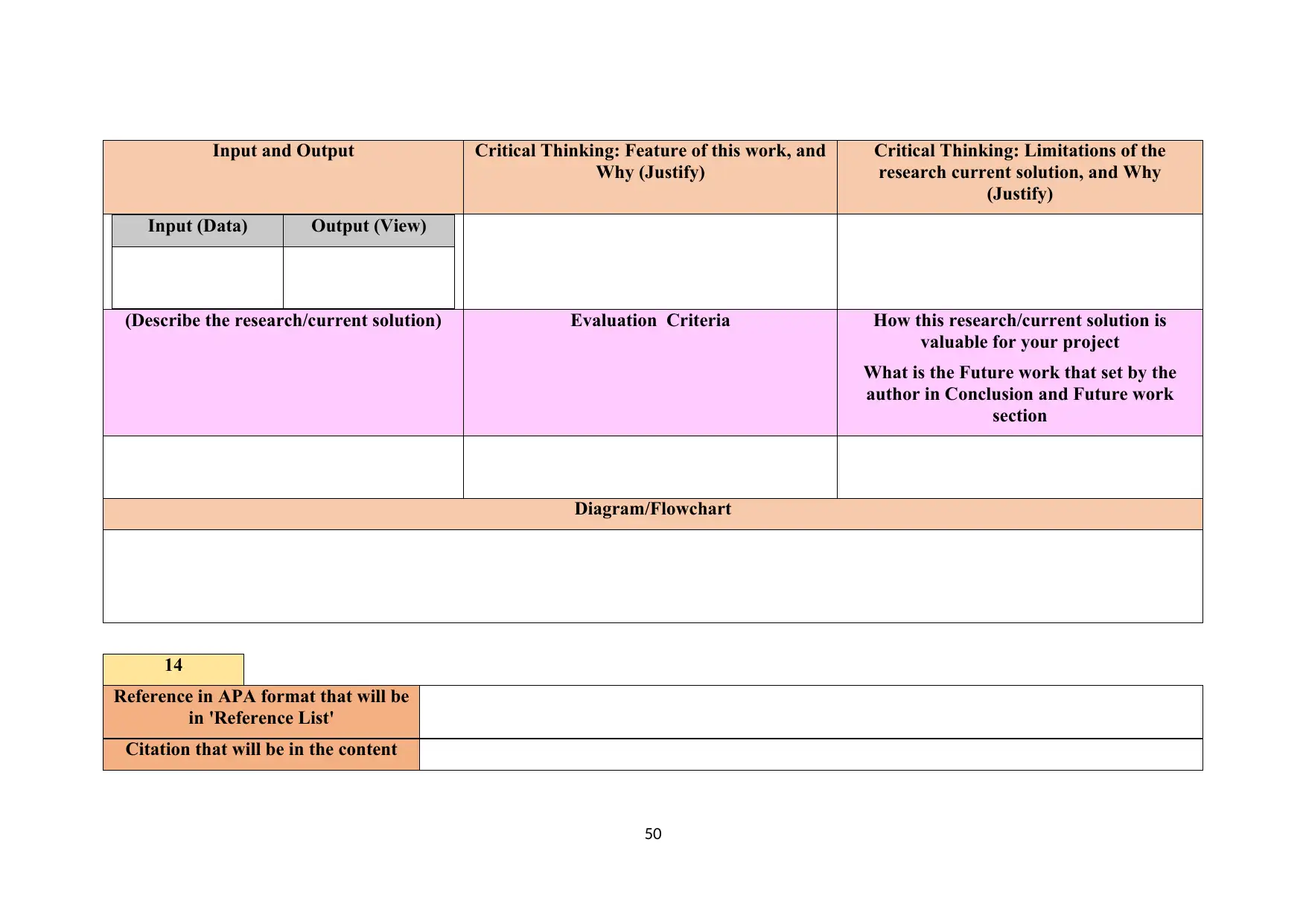
Input and Output Critical Thinking: Feature of this work, and
Why (Justify)
Critical Thinking: Limitations of the
research current solution, and Why
(Justify)
Input (Data) Output (View)
(Describe the research/current solution) Evaluation Criteria How this research/current solution is
valuable for your project
What is the Future work that set by the
author in Conclusion and Future work
section
Diagram/Flowchart
14
Reference in APA format that will be
in 'Reference List'
Citation that will be in the content
50
Why (Justify)
Critical Thinking: Limitations of the
research current solution, and Why
(Justify)
Input (Data) Output (View)
(Describe the research/current solution) Evaluation Criteria How this research/current solution is
valuable for your project
What is the Future work that set by the
author in Conclusion and Future work
section
Diagram/Flowchart
14
Reference in APA format that will be
in 'Reference List'
Citation that will be in the content
50
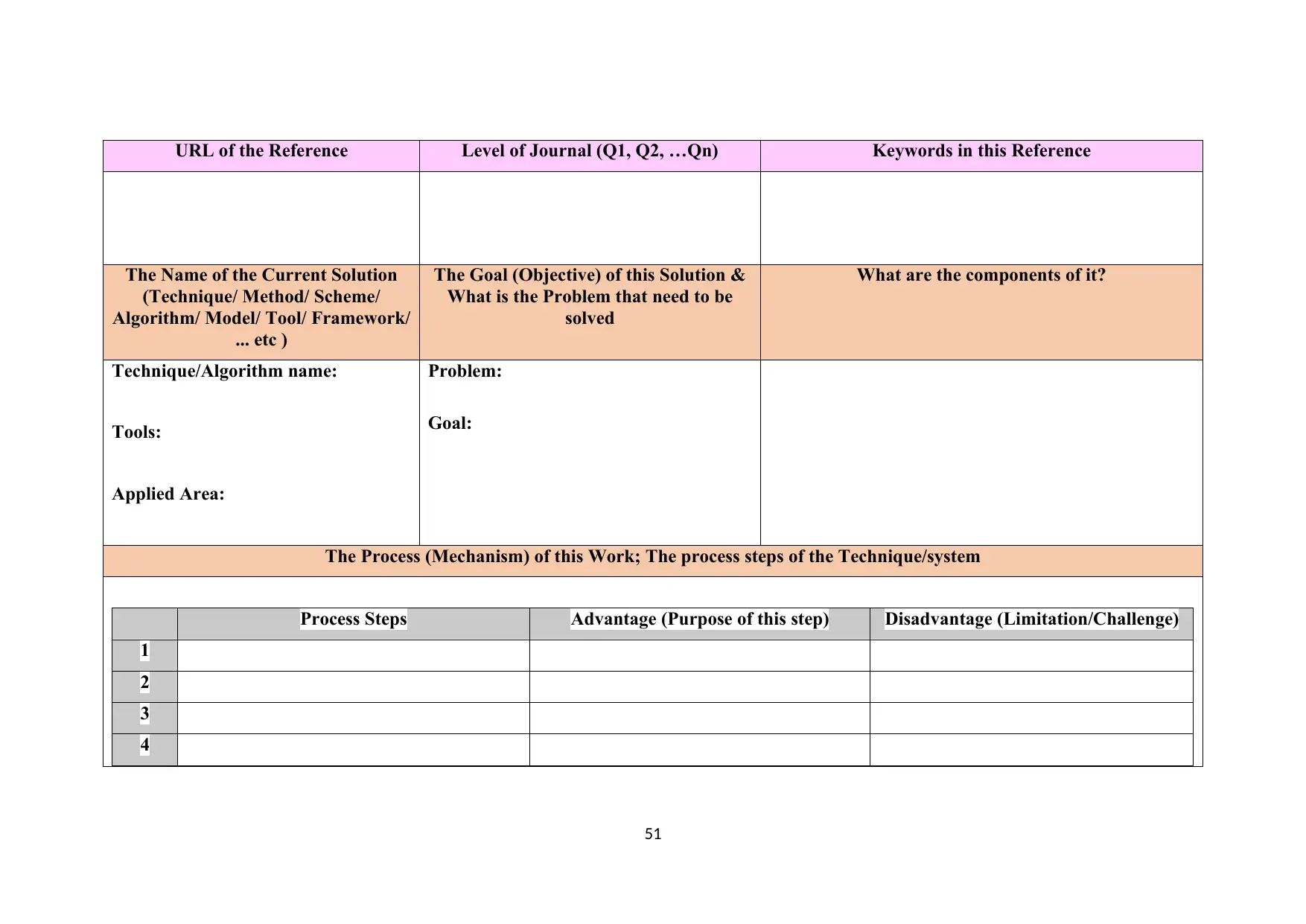
URL of the Reference Level of Journal (Q1, Q2, …Qn) Keywords in this Reference
The Name of the Current Solution
(Technique/ Method/ Scheme/
Algorithm/ Model/ Tool/ Framework/
... etc )
The Goal (Objective) of this Solution &
What is the Problem that need to be
solved
What are the components of it?
Technique/Algorithm name:
Tools:
Applied Area:
Problem:
Goal:
The Process (Mechanism) of this Work; The process steps of the Technique/system
Process Steps Advantage (Purpose of this step) Disadvantage (Limitation/Challenge)
1
2
3
4
51
The Name of the Current Solution
(Technique/ Method/ Scheme/
Algorithm/ Model/ Tool/ Framework/
... etc )
The Goal (Objective) of this Solution &
What is the Problem that need to be
solved
What are the components of it?
Technique/Algorithm name:
Tools:
Applied Area:
Problem:
Goal:
The Process (Mechanism) of this Work; The process steps of the Technique/system
Process Steps Advantage (Purpose of this step) Disadvantage (Limitation/Challenge)
1
2
3
4
51
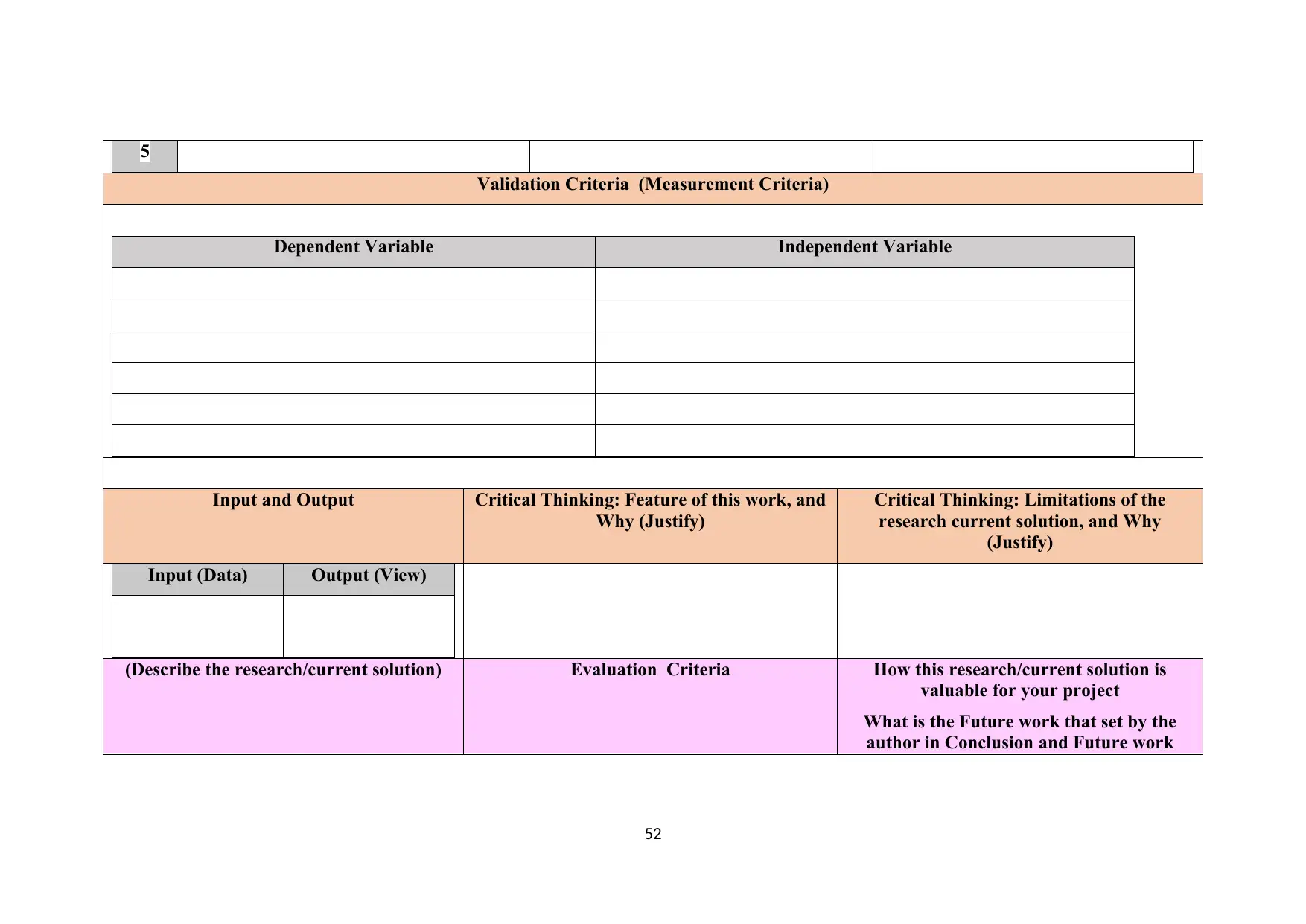
5
Validation Criteria (Measurement Criteria)
Dependent Variable Independent Variable
Input and Output Critical Thinking: Feature of this work, and
Why (Justify)
Critical Thinking: Limitations of the
research current solution, and Why
(Justify)
Input (Data) Output (View)
(Describe the research/current solution) Evaluation Criteria How this research/current solution is
valuable for your project
What is the Future work that set by the
author in Conclusion and Future work
52
Validation Criteria (Measurement Criteria)
Dependent Variable Independent Variable
Input and Output Critical Thinking: Feature of this work, and
Why (Justify)
Critical Thinking: Limitations of the
research current solution, and Why
(Justify)
Input (Data) Output (View)
(Describe the research/current solution) Evaluation Criteria How this research/current solution is
valuable for your project
What is the Future work that set by the
author in Conclusion and Future work
52
Secure Best Marks with AI Grader
Need help grading? Try our AI Grader for instant feedback on your assignments.
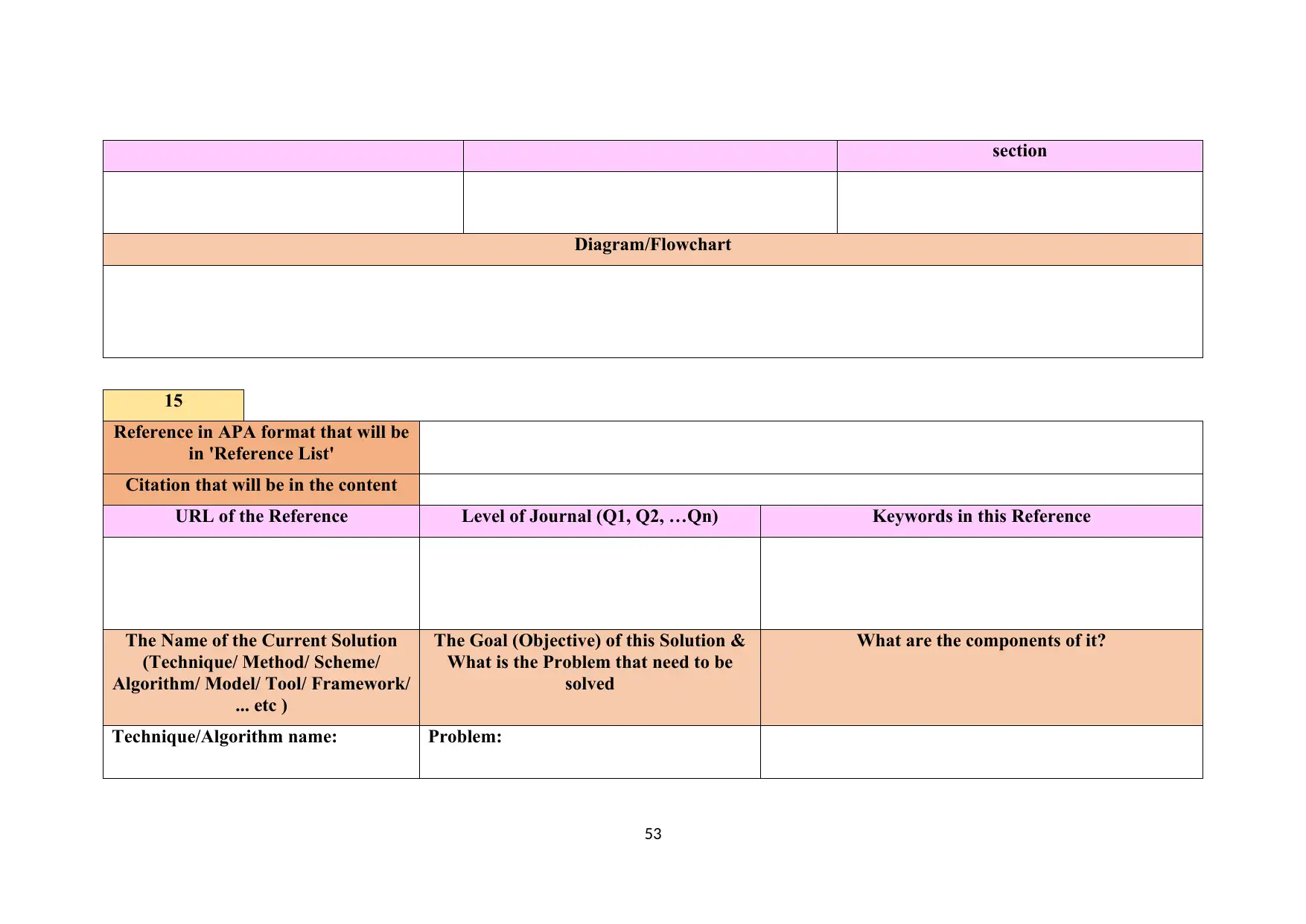
section
Diagram/Flowchart
15
Reference in APA format that will be
in 'Reference List'
Citation that will be in the content
URL of the Reference Level of Journal (Q1, Q2, …Qn) Keywords in this Reference
The Name of the Current Solution
(Technique/ Method/ Scheme/
Algorithm/ Model/ Tool/ Framework/
... etc )
The Goal (Objective) of this Solution &
What is the Problem that need to be
solved
What are the components of it?
Technique/Algorithm name: Problem:
53
Diagram/Flowchart
15
Reference in APA format that will be
in 'Reference List'
Citation that will be in the content
URL of the Reference Level of Journal (Q1, Q2, …Qn) Keywords in this Reference
The Name of the Current Solution
(Technique/ Method/ Scheme/
Algorithm/ Model/ Tool/ Framework/
... etc )
The Goal (Objective) of this Solution &
What is the Problem that need to be
solved
What are the components of it?
Technique/Algorithm name: Problem:
53
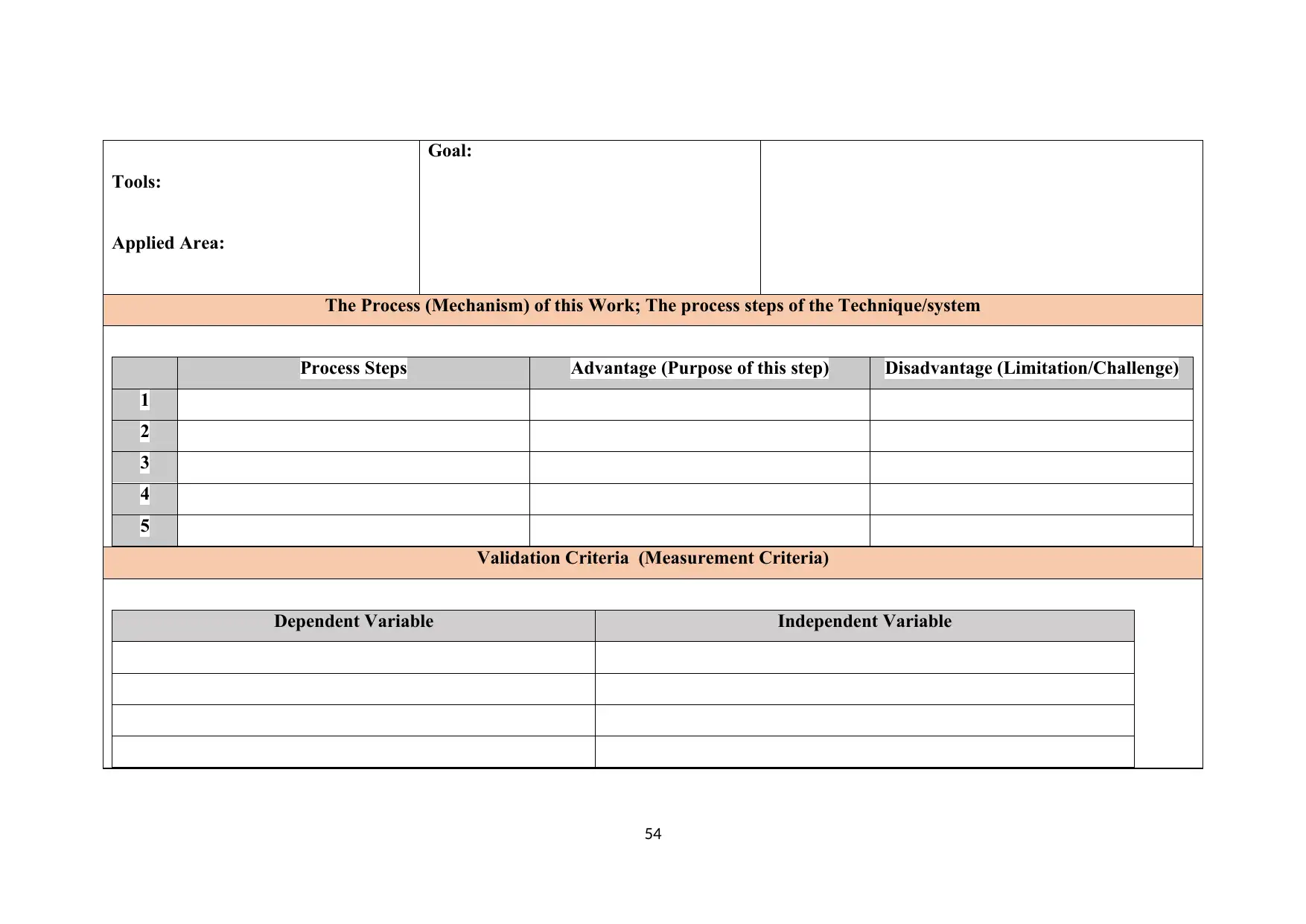
Tools:
Applied Area:
Goal:
The Process (Mechanism) of this Work; The process steps of the Technique/system
Process Steps Advantage (Purpose of this step) Disadvantage (Limitation/Challenge)
1
2
3
4
5
Validation Criteria (Measurement Criteria)
Dependent Variable Independent Variable
54
Applied Area:
Goal:
The Process (Mechanism) of this Work; The process steps of the Technique/system
Process Steps Advantage (Purpose of this step) Disadvantage (Limitation/Challenge)
1
2
3
4
5
Validation Criteria (Measurement Criteria)
Dependent Variable Independent Variable
54
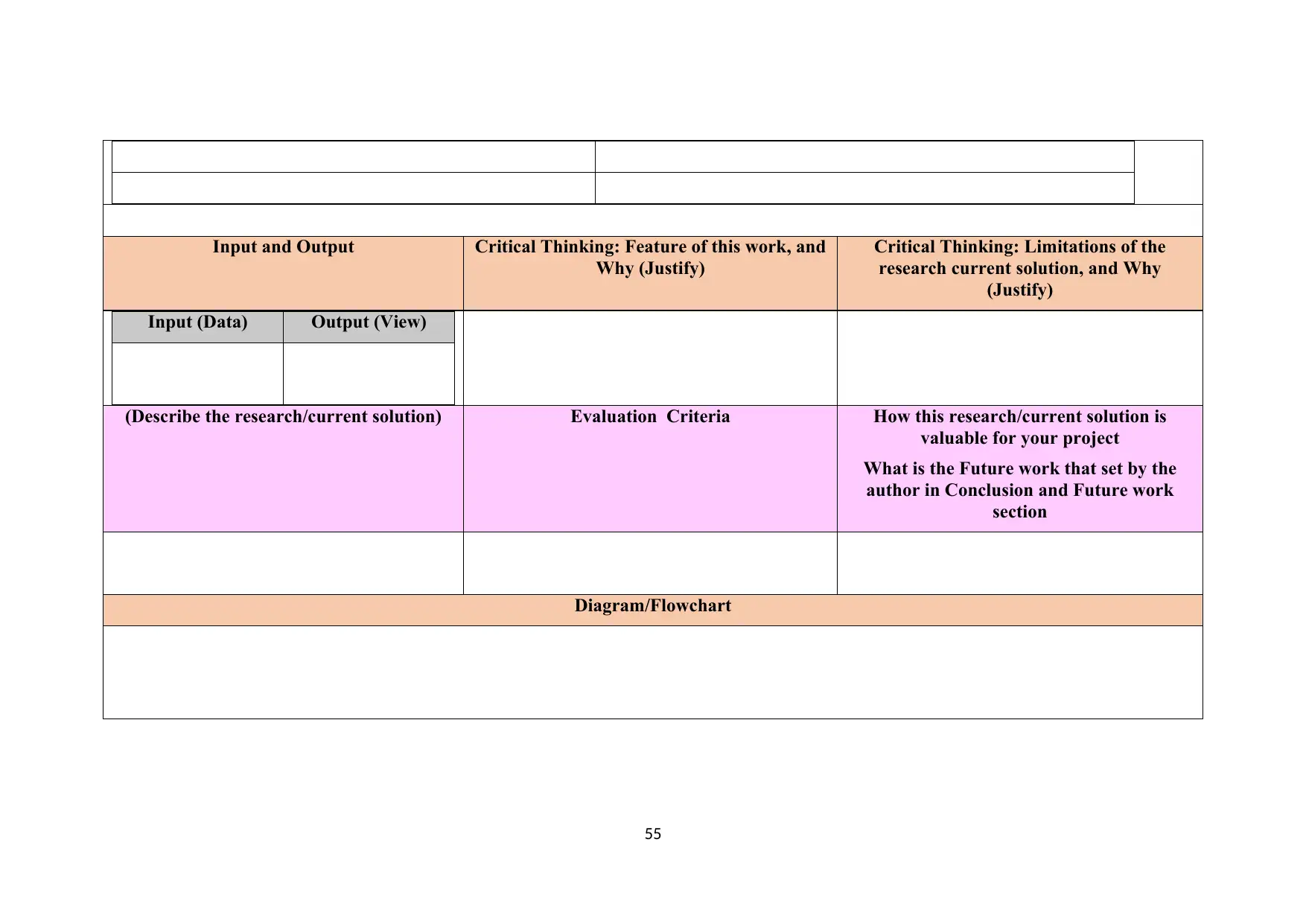
Input and Output Critical Thinking: Feature of this work, and
Why (Justify)
Critical Thinking: Limitations of the
research current solution, and Why
(Justify)
Input (Data) Output (View)
(Describe the research/current solution) Evaluation Criteria How this research/current solution is
valuable for your project
What is the Future work that set by the
author in Conclusion and Future work
section
Diagram/Flowchart
55
Why (Justify)
Critical Thinking: Limitations of the
research current solution, and Why
(Justify)
Input (Data) Output (View)
(Describe the research/current solution) Evaluation Criteria How this research/current solution is
valuable for your project
What is the Future work that set by the
author in Conclusion and Future work
section
Diagram/Flowchart
55
Paraphrase This Document
Need a fresh take? Get an instant paraphrase of this document with our AI Paraphraser
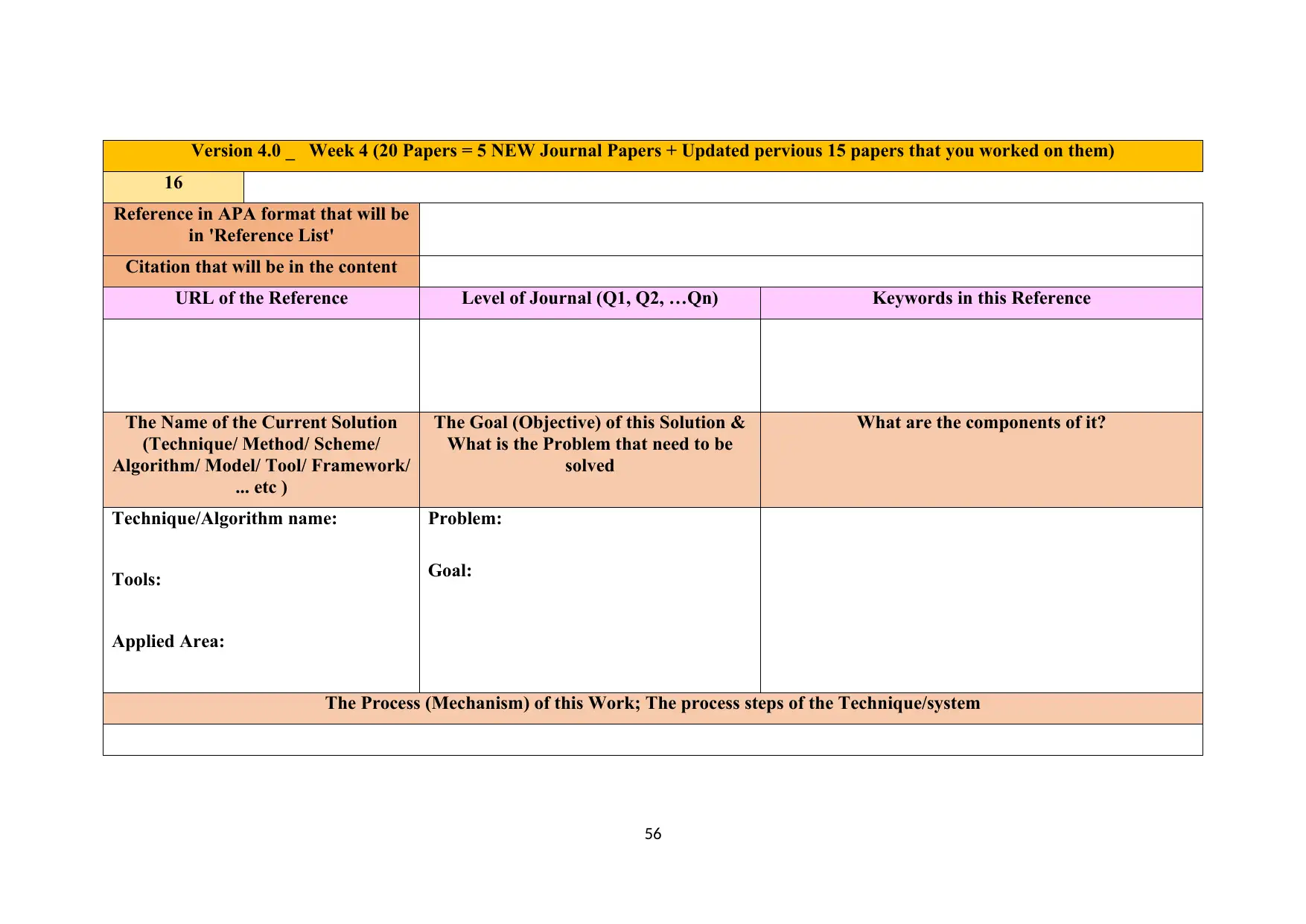
Version 4.0 _ Week 4 (20 Papers = 5 NEW Journal Papers + Updated pervious 15 papers that you worked on them)
16
Reference in APA format that will be
in 'Reference List'
Citation that will be in the content
URL of the Reference Level of Journal (Q1, Q2, …Qn) Keywords in this Reference
The Name of the Current Solution
(Technique/ Method/ Scheme/
Algorithm/ Model/ Tool/ Framework/
... etc )
The Goal (Objective) of this Solution &
What is the Problem that need to be
solved
What are the components of it?
Technique/Algorithm name:
Tools:
Applied Area:
Problem:
Goal:
The Process (Mechanism) of this Work; The process steps of the Technique/system
56
16
Reference in APA format that will be
in 'Reference List'
Citation that will be in the content
URL of the Reference Level of Journal (Q1, Q2, …Qn) Keywords in this Reference
The Name of the Current Solution
(Technique/ Method/ Scheme/
Algorithm/ Model/ Tool/ Framework/
... etc )
The Goal (Objective) of this Solution &
What is the Problem that need to be
solved
What are the components of it?
Technique/Algorithm name:
Tools:
Applied Area:
Problem:
Goal:
The Process (Mechanism) of this Work; The process steps of the Technique/system
56
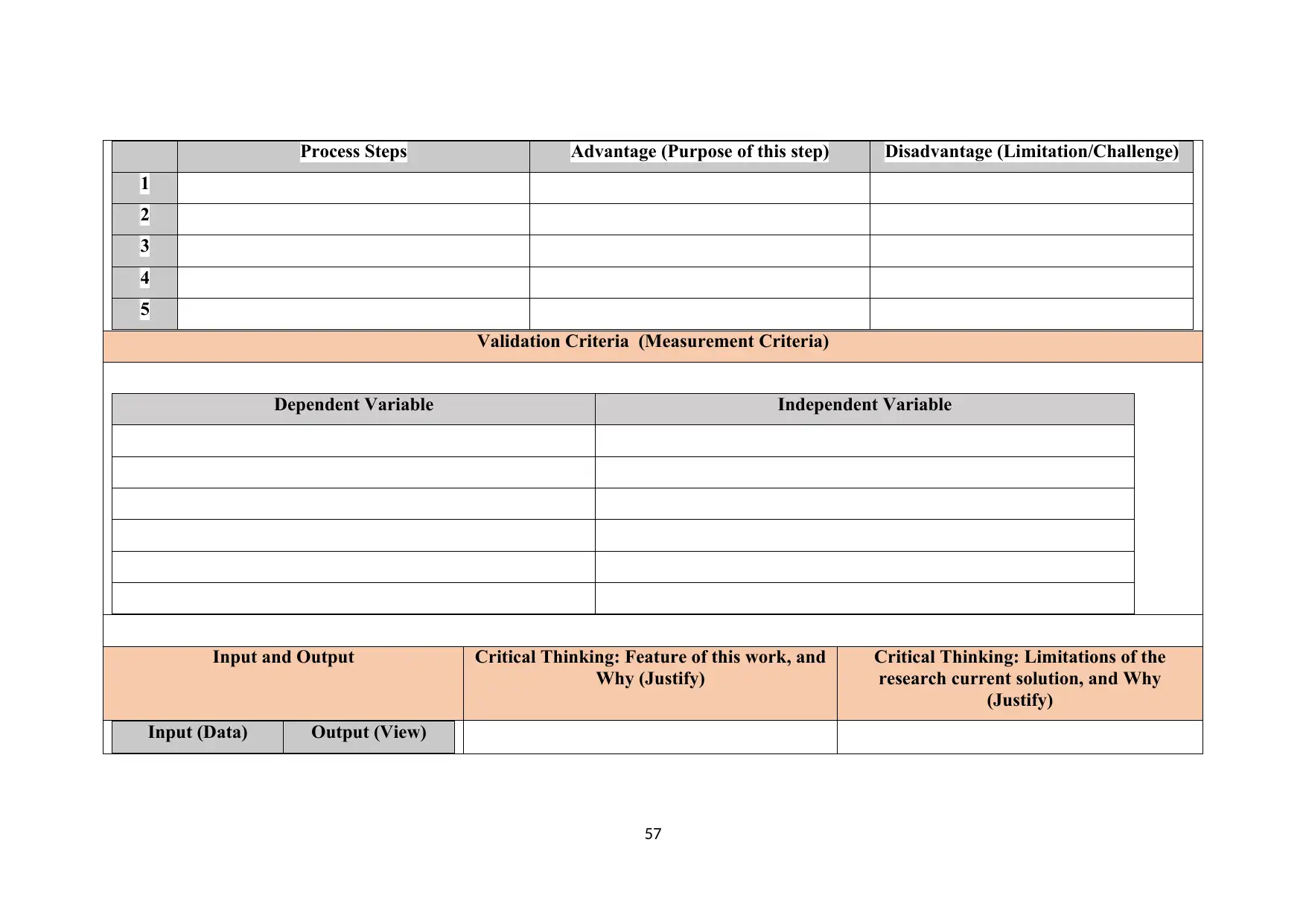
Process Steps Advantage (Purpose of this step) Disadvantage (Limitation/Challenge)
1
2
3
4
5
Validation Criteria (Measurement Criteria)
Dependent Variable Independent Variable
Input and Output Critical Thinking: Feature of this work, and
Why (Justify)
Critical Thinking: Limitations of the
research current solution, and Why
(Justify)
Input (Data) Output (View)
57
1
2
3
4
5
Validation Criteria (Measurement Criteria)
Dependent Variable Independent Variable
Input and Output Critical Thinking: Feature of this work, and
Why (Justify)
Critical Thinking: Limitations of the
research current solution, and Why
(Justify)
Input (Data) Output (View)
57
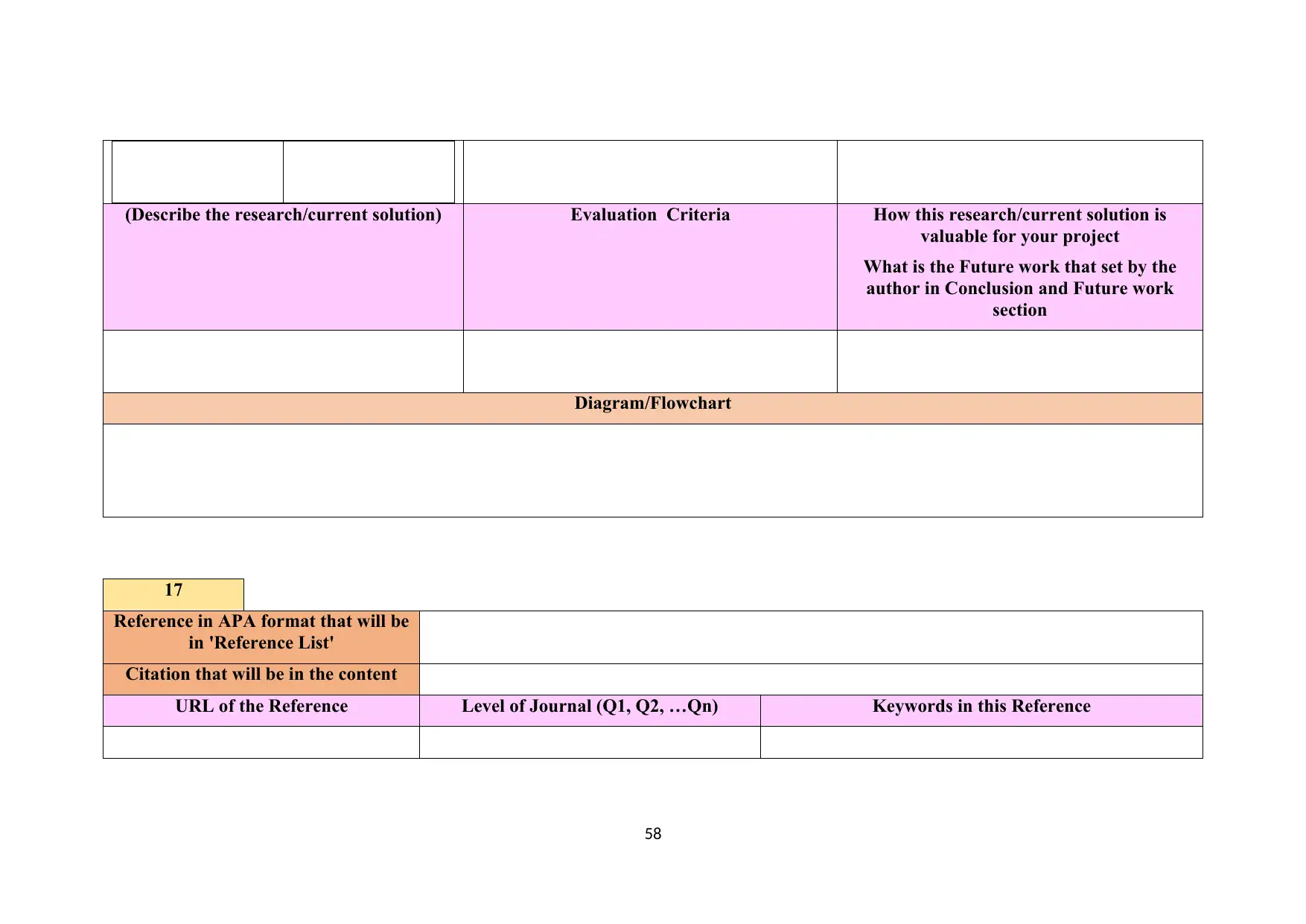
(Describe the research/current solution) Evaluation Criteria How this research/current solution is
valuable for your project
What is the Future work that set by the
author in Conclusion and Future work
section
Diagram/Flowchart
17
Reference in APA format that will be
in 'Reference List'
Citation that will be in the content
URL of the Reference Level of Journal (Q1, Q2, …Qn) Keywords in this Reference
58
valuable for your project
What is the Future work that set by the
author in Conclusion and Future work
section
Diagram/Flowchart
17
Reference in APA format that will be
in 'Reference List'
Citation that will be in the content
URL of the Reference Level of Journal (Q1, Q2, …Qn) Keywords in this Reference
58
Secure Best Marks with AI Grader
Need help grading? Try our AI Grader for instant feedback on your assignments.
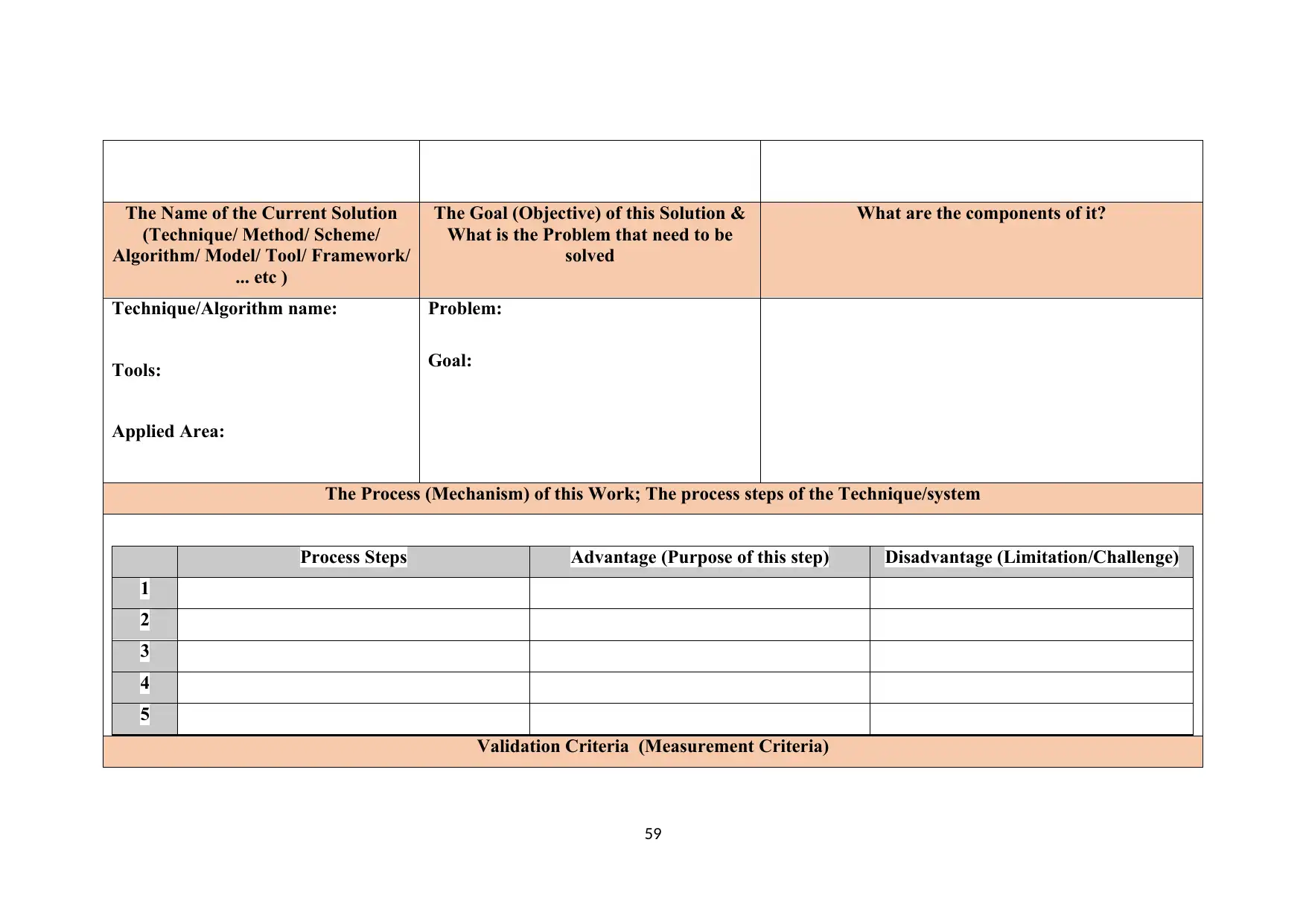
The Name of the Current Solution
(Technique/ Method/ Scheme/
Algorithm/ Model/ Tool/ Framework/
... etc )
The Goal (Objective) of this Solution &
What is the Problem that need to be
solved
What are the components of it?
Technique/Algorithm name:
Tools:
Applied Area:
Problem:
Goal:
The Process (Mechanism) of this Work; The process steps of the Technique/system
Process Steps Advantage (Purpose of this step) Disadvantage (Limitation/Challenge)
1
2
3
4
5
Validation Criteria (Measurement Criteria)
59
(Technique/ Method/ Scheme/
Algorithm/ Model/ Tool/ Framework/
... etc )
The Goal (Objective) of this Solution &
What is the Problem that need to be
solved
What are the components of it?
Technique/Algorithm name:
Tools:
Applied Area:
Problem:
Goal:
The Process (Mechanism) of this Work; The process steps of the Technique/system
Process Steps Advantage (Purpose of this step) Disadvantage (Limitation/Challenge)
1
2
3
4
5
Validation Criteria (Measurement Criteria)
59
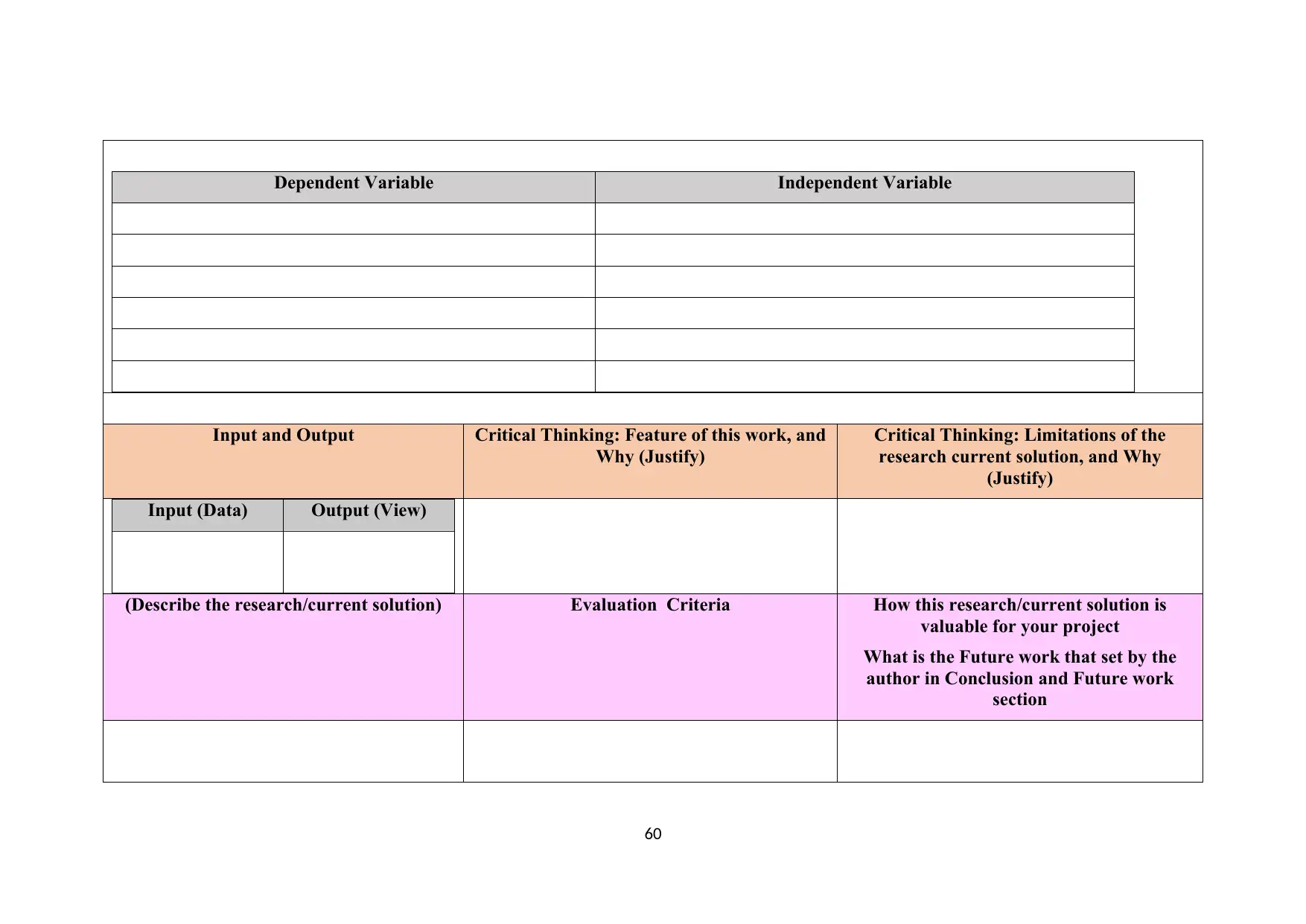
Dependent Variable Independent Variable
Input and Output Critical Thinking: Feature of this work, and
Why (Justify)
Critical Thinking: Limitations of the
research current solution, and Why
(Justify)
Input (Data) Output (View)
(Describe the research/current solution) Evaluation Criteria How this research/current solution is
valuable for your project
What is the Future work that set by the
author in Conclusion and Future work
section
60
Input and Output Critical Thinking: Feature of this work, and
Why (Justify)
Critical Thinking: Limitations of the
research current solution, and Why
(Justify)
Input (Data) Output (View)
(Describe the research/current solution) Evaluation Criteria How this research/current solution is
valuable for your project
What is the Future work that set by the
author in Conclusion and Future work
section
60
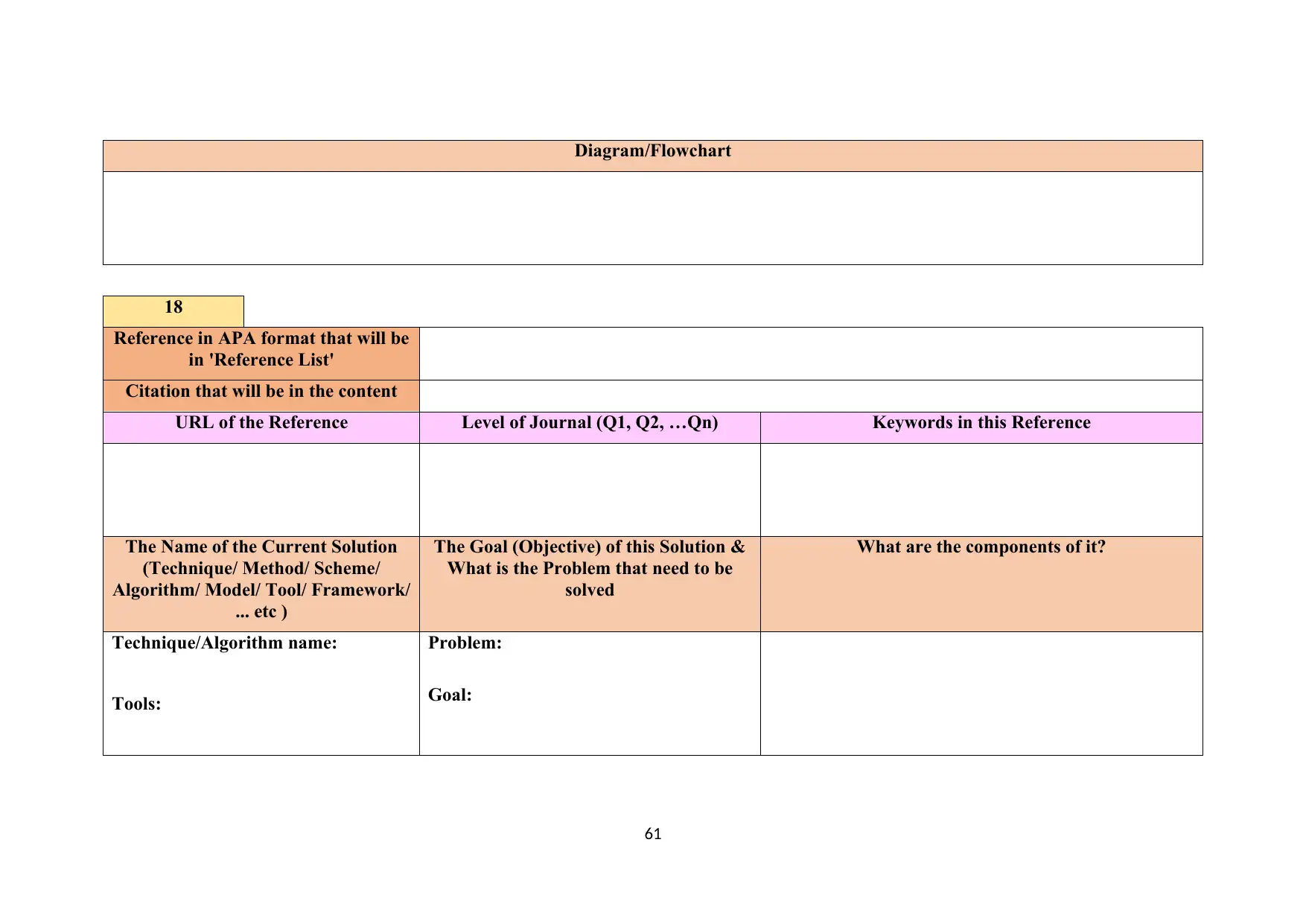
Diagram/Flowchart
18
Reference in APA format that will be
in 'Reference List'
Citation that will be in the content
URL of the Reference Level of Journal (Q1, Q2, …Qn) Keywords in this Reference
The Name of the Current Solution
(Technique/ Method/ Scheme/
Algorithm/ Model/ Tool/ Framework/
... etc )
The Goal (Objective) of this Solution &
What is the Problem that need to be
solved
What are the components of it?
Technique/Algorithm name:
Tools:
Problem:
Goal:
61
18
Reference in APA format that will be
in 'Reference List'
Citation that will be in the content
URL of the Reference Level of Journal (Q1, Q2, …Qn) Keywords in this Reference
The Name of the Current Solution
(Technique/ Method/ Scheme/
Algorithm/ Model/ Tool/ Framework/
... etc )
The Goal (Objective) of this Solution &
What is the Problem that need to be
solved
What are the components of it?
Technique/Algorithm name:
Tools:
Problem:
Goal:
61
Paraphrase This Document
Need a fresh take? Get an instant paraphrase of this document with our AI Paraphraser
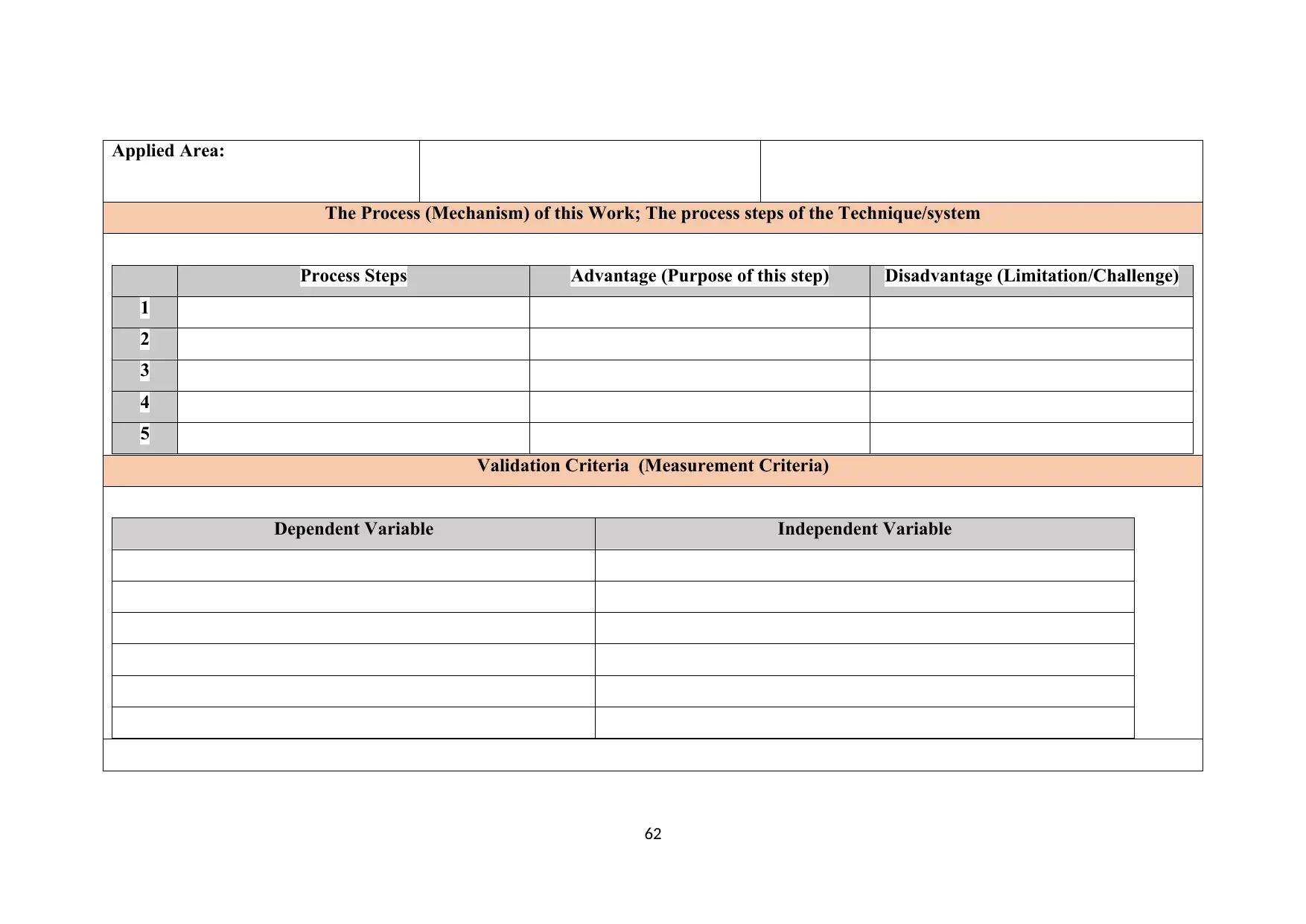
Applied Area:
The Process (Mechanism) of this Work; The process steps of the Technique/system
Process Steps Advantage (Purpose of this step) Disadvantage (Limitation/Challenge)
1
2
3
4
5
Validation Criteria (Measurement Criteria)
Dependent Variable Independent Variable
62
The Process (Mechanism) of this Work; The process steps of the Technique/system
Process Steps Advantage (Purpose of this step) Disadvantage (Limitation/Challenge)
1
2
3
4
5
Validation Criteria (Measurement Criteria)
Dependent Variable Independent Variable
62
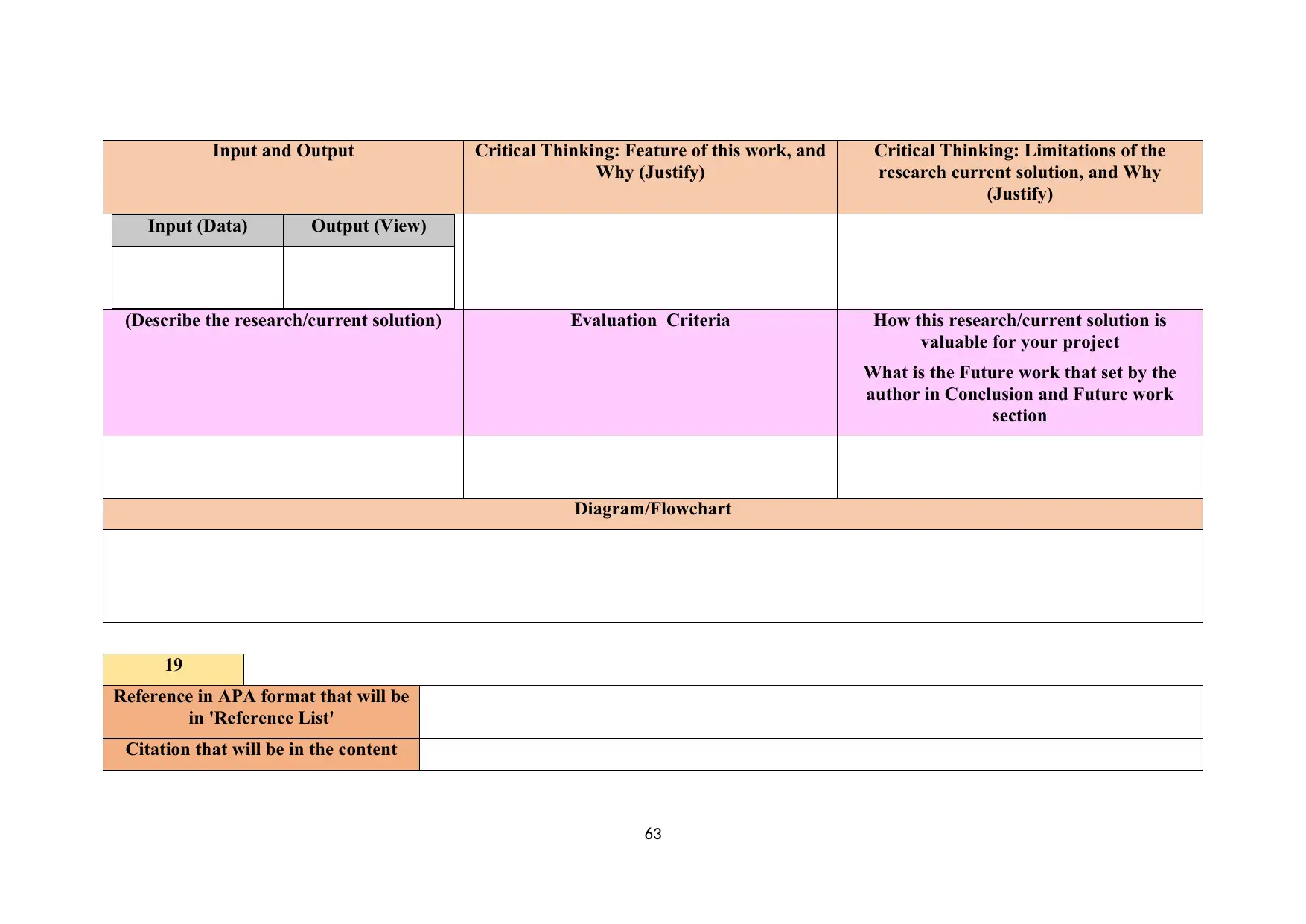
Input and Output Critical Thinking: Feature of this work, and
Why (Justify)
Critical Thinking: Limitations of the
research current solution, and Why
(Justify)
Input (Data) Output (View)
(Describe the research/current solution) Evaluation Criteria How this research/current solution is
valuable for your project
What is the Future work that set by the
author in Conclusion and Future work
section
Diagram/Flowchart
19
Reference in APA format that will be
in 'Reference List'
Citation that will be in the content
63
Why (Justify)
Critical Thinking: Limitations of the
research current solution, and Why
(Justify)
Input (Data) Output (View)
(Describe the research/current solution) Evaluation Criteria How this research/current solution is
valuable for your project
What is the Future work that set by the
author in Conclusion and Future work
section
Diagram/Flowchart
19
Reference in APA format that will be
in 'Reference List'
Citation that will be in the content
63
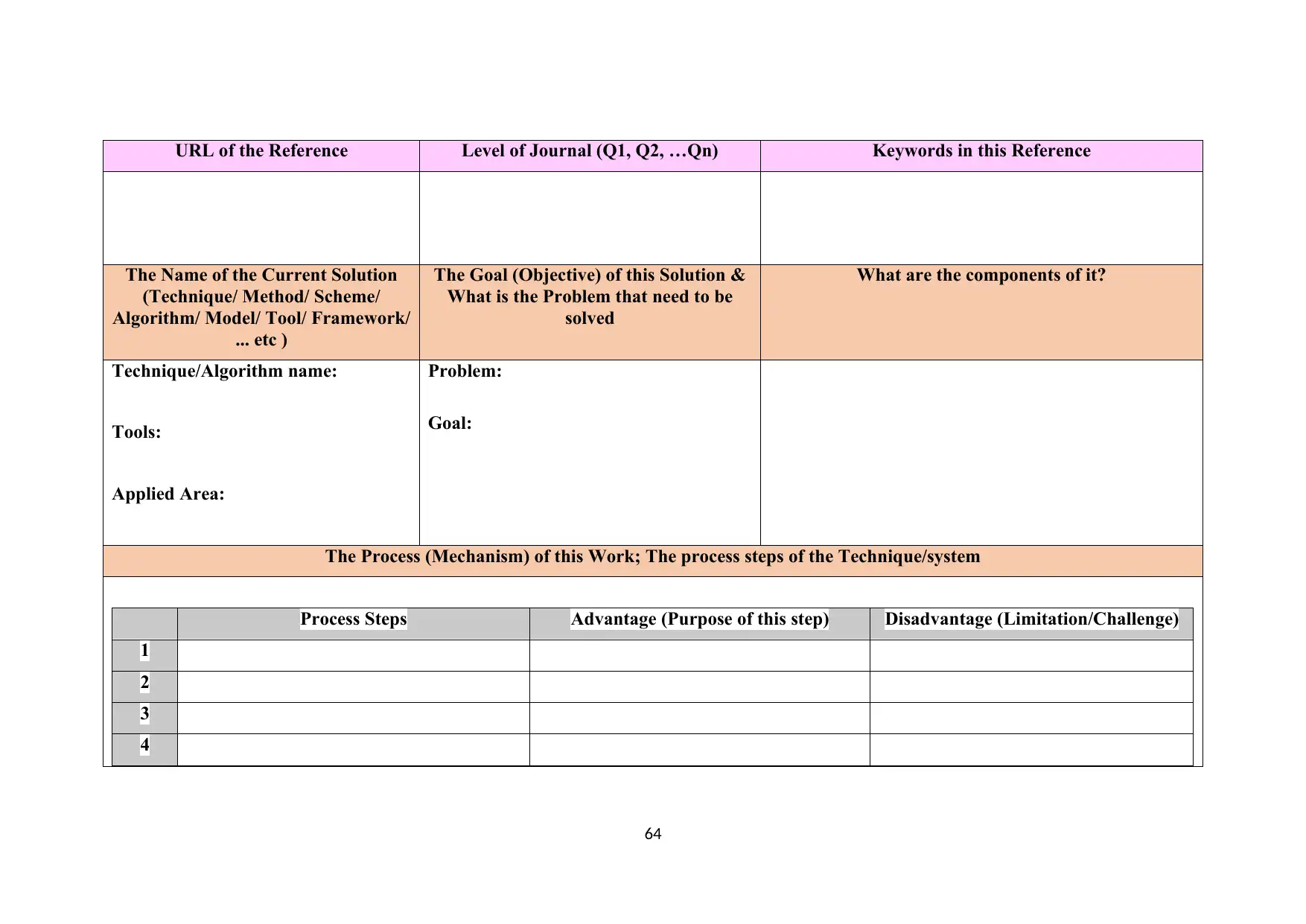
URL of the Reference Level of Journal (Q1, Q2, …Qn) Keywords in this Reference
The Name of the Current Solution
(Technique/ Method/ Scheme/
Algorithm/ Model/ Tool/ Framework/
... etc )
The Goal (Objective) of this Solution &
What is the Problem that need to be
solved
What are the components of it?
Technique/Algorithm name:
Tools:
Applied Area:
Problem:
Goal:
The Process (Mechanism) of this Work; The process steps of the Technique/system
Process Steps Advantage (Purpose of this step) Disadvantage (Limitation/Challenge)
1
2
3
4
64
The Name of the Current Solution
(Technique/ Method/ Scheme/
Algorithm/ Model/ Tool/ Framework/
... etc )
The Goal (Objective) of this Solution &
What is the Problem that need to be
solved
What are the components of it?
Technique/Algorithm name:
Tools:
Applied Area:
Problem:
Goal:
The Process (Mechanism) of this Work; The process steps of the Technique/system
Process Steps Advantage (Purpose of this step) Disadvantage (Limitation/Challenge)
1
2
3
4
64
Secure Best Marks with AI Grader
Need help grading? Try our AI Grader for instant feedback on your assignments.
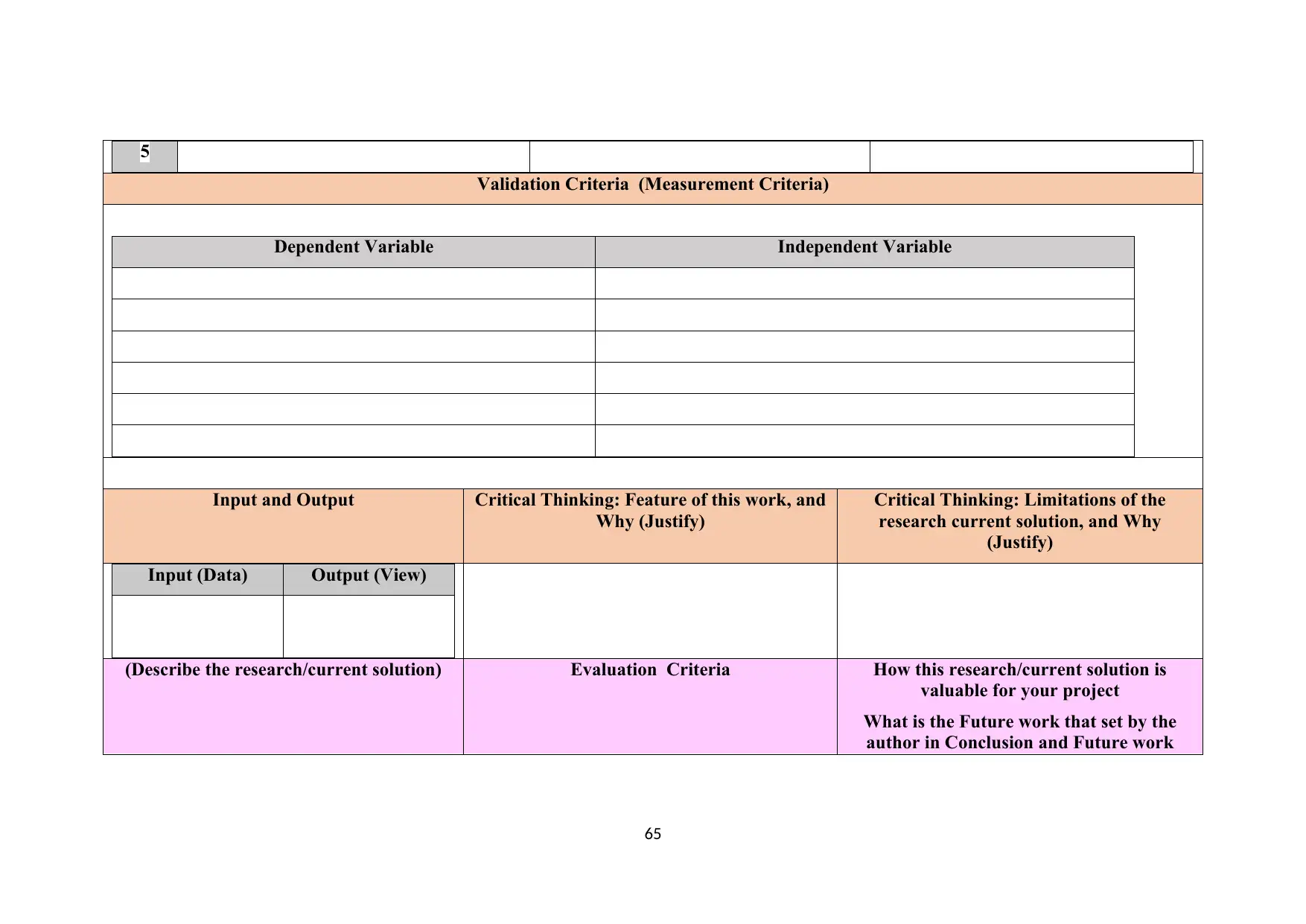
5
Validation Criteria (Measurement Criteria)
Dependent Variable Independent Variable
Input and Output Critical Thinking: Feature of this work, and
Why (Justify)
Critical Thinking: Limitations of the
research current solution, and Why
(Justify)
Input (Data) Output (View)
(Describe the research/current solution) Evaluation Criteria How this research/current solution is
valuable for your project
What is the Future work that set by the
author in Conclusion and Future work
65
Validation Criteria (Measurement Criteria)
Dependent Variable Independent Variable
Input and Output Critical Thinking: Feature of this work, and
Why (Justify)
Critical Thinking: Limitations of the
research current solution, and Why
(Justify)
Input (Data) Output (View)
(Describe the research/current solution) Evaluation Criteria How this research/current solution is
valuable for your project
What is the Future work that set by the
author in Conclusion and Future work
65
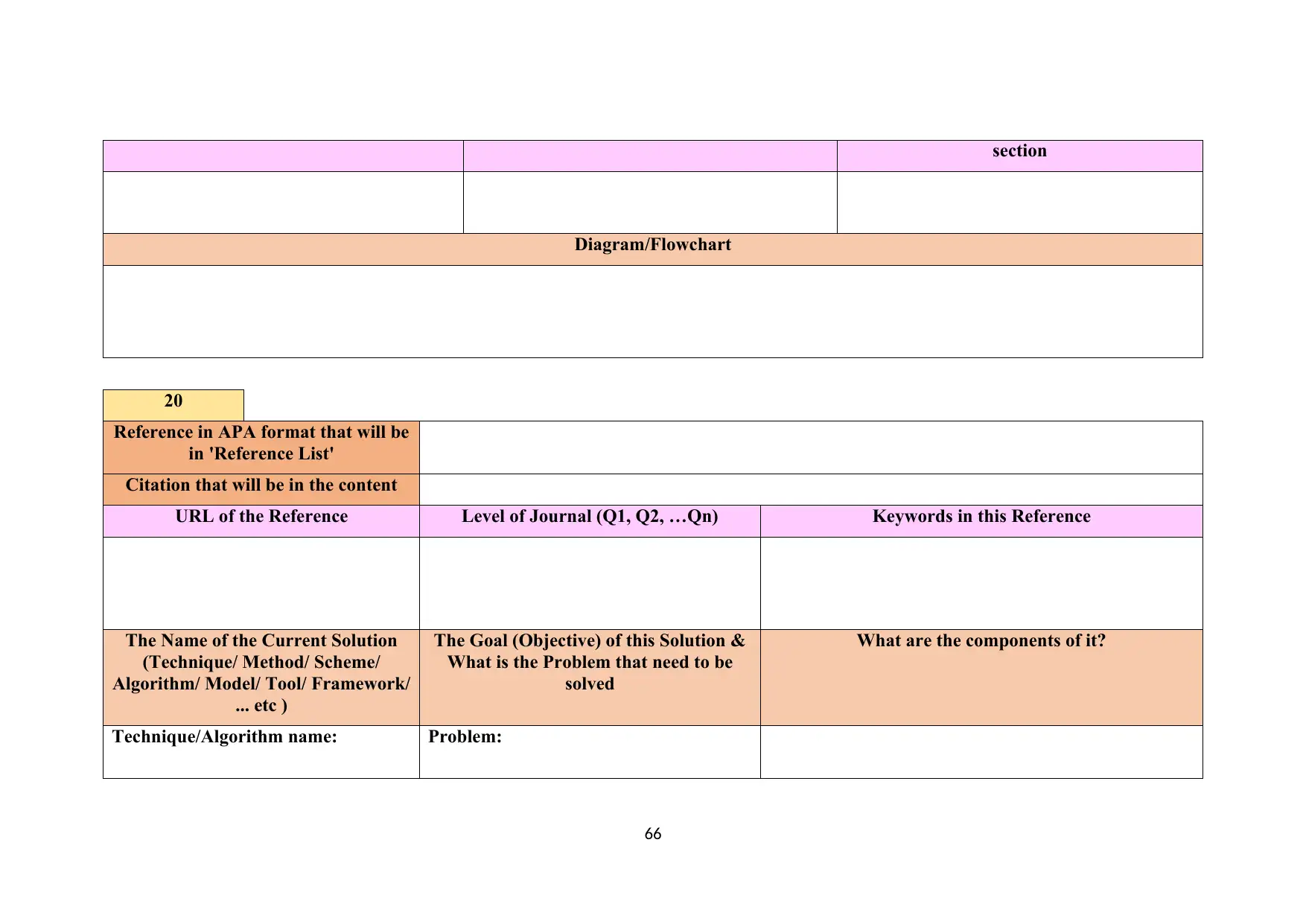
section
Diagram/Flowchart
20
Reference in APA format that will be
in 'Reference List'
Citation that will be in the content
URL of the Reference Level of Journal (Q1, Q2, …Qn) Keywords in this Reference
The Name of the Current Solution
(Technique/ Method/ Scheme/
Algorithm/ Model/ Tool/ Framework/
... etc )
The Goal (Objective) of this Solution &
What is the Problem that need to be
solved
What are the components of it?
Technique/Algorithm name: Problem:
66
Diagram/Flowchart
20
Reference in APA format that will be
in 'Reference List'
Citation that will be in the content
URL of the Reference Level of Journal (Q1, Q2, …Qn) Keywords in this Reference
The Name of the Current Solution
(Technique/ Method/ Scheme/
Algorithm/ Model/ Tool/ Framework/
... etc )
The Goal (Objective) of this Solution &
What is the Problem that need to be
solved
What are the components of it?
Technique/Algorithm name: Problem:
66
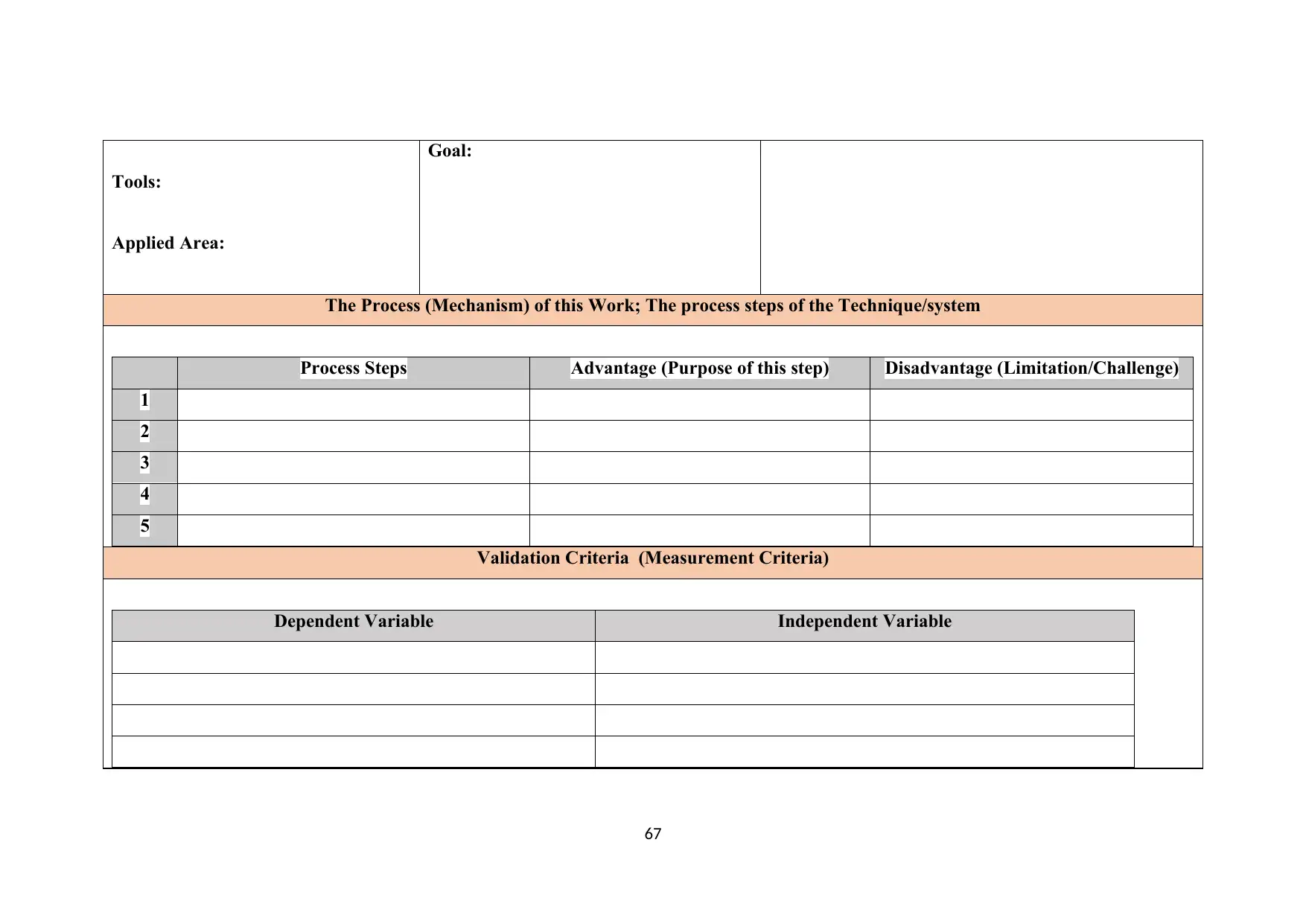
Tools:
Applied Area:
Goal:
The Process (Mechanism) of this Work; The process steps of the Technique/system
Process Steps Advantage (Purpose of this step) Disadvantage (Limitation/Challenge)
1
2
3
4
5
Validation Criteria (Measurement Criteria)
Dependent Variable Independent Variable
67
Applied Area:
Goal:
The Process (Mechanism) of this Work; The process steps of the Technique/system
Process Steps Advantage (Purpose of this step) Disadvantage (Limitation/Challenge)
1
2
3
4
5
Validation Criteria (Measurement Criteria)
Dependent Variable Independent Variable
67
Paraphrase This Document
Need a fresh take? Get an instant paraphrase of this document with our AI Paraphraser
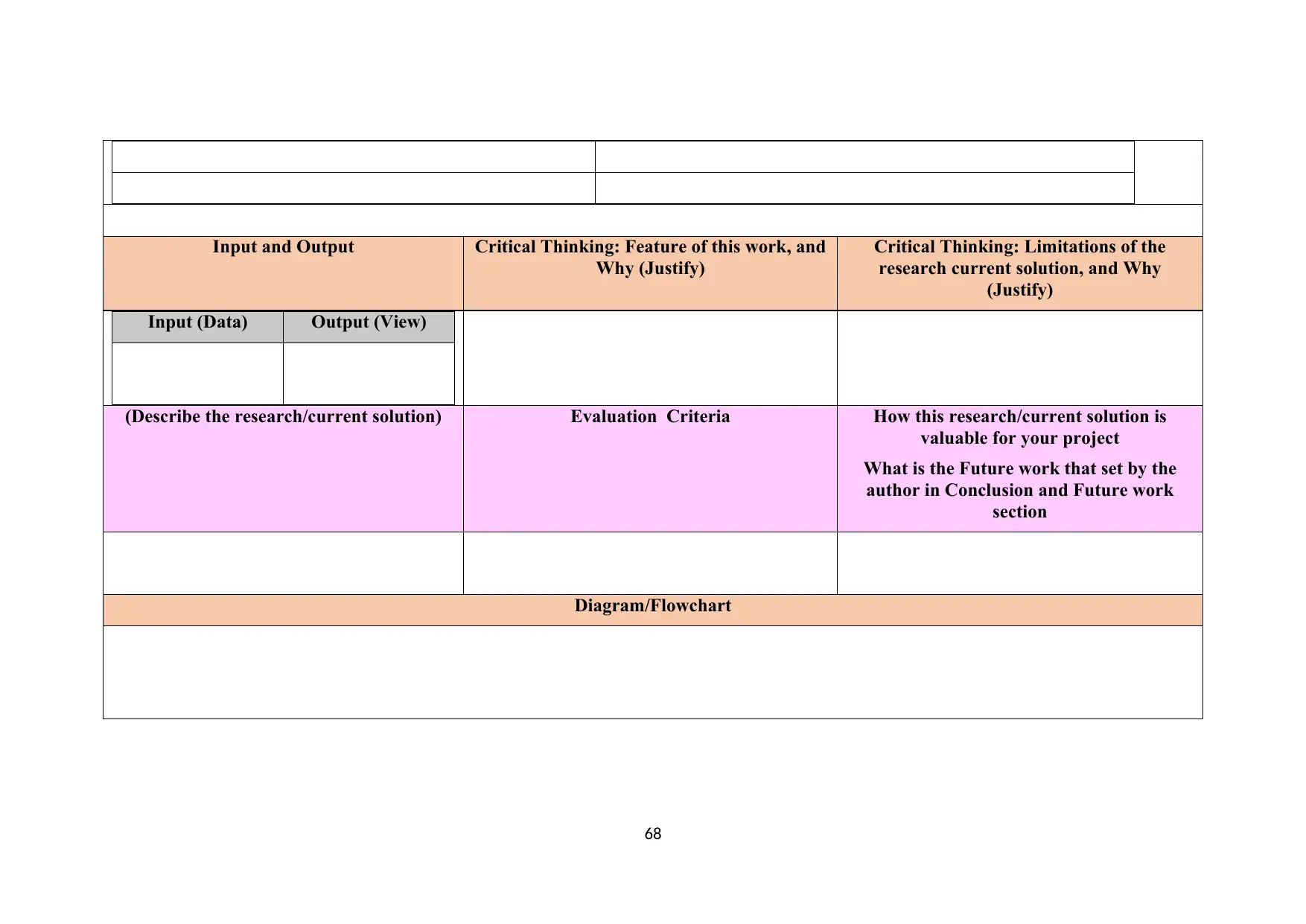
Input and Output Critical Thinking: Feature of this work, and
Why (Justify)
Critical Thinking: Limitations of the
research current solution, and Why
(Justify)
Input (Data) Output (View)
(Describe the research/current solution) Evaluation Criteria How this research/current solution is
valuable for your project
What is the Future work that set by the
author in Conclusion and Future work
section
Diagram/Flowchart
68
Why (Justify)
Critical Thinking: Limitations of the
research current solution, and Why
(Justify)
Input (Data) Output (View)
(Describe the research/current solution) Evaluation Criteria How this research/current solution is
valuable for your project
What is the Future work that set by the
author in Conclusion and Future work
section
Diagram/Flowchart
68
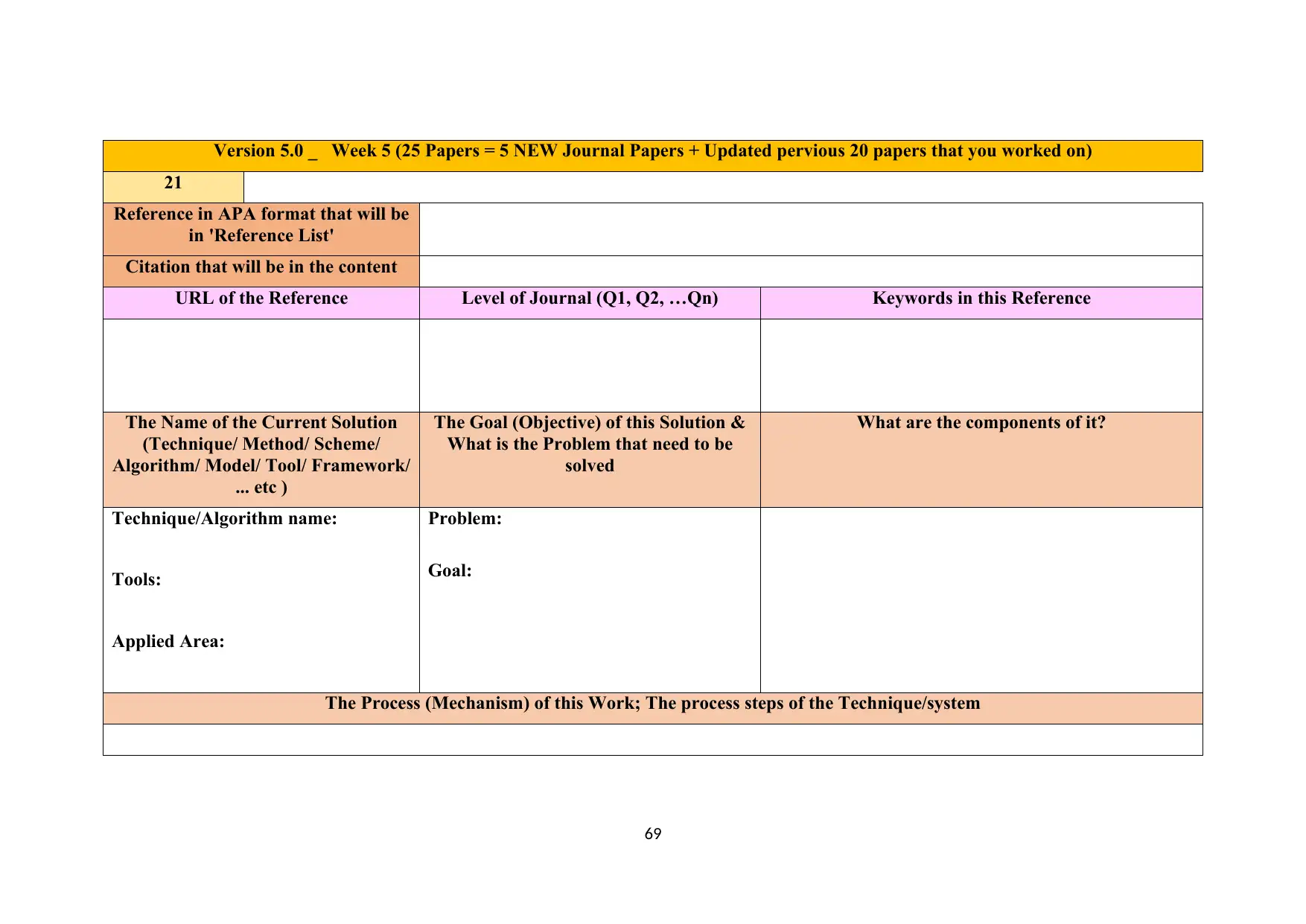
Version 5.0 _ Week 5 (25 Papers = 5 NEW Journal Papers + Updated pervious 20 papers that you worked on)
21
Reference in APA format that will be
in 'Reference List'
Citation that will be in the content
URL of the Reference Level of Journal (Q1, Q2, …Qn) Keywords in this Reference
The Name of the Current Solution
(Technique/ Method/ Scheme/
Algorithm/ Model/ Tool/ Framework/
... etc )
The Goal (Objective) of this Solution &
What is the Problem that need to be
solved
What are the components of it?
Technique/Algorithm name:
Tools:
Applied Area:
Problem:
Goal:
The Process (Mechanism) of this Work; The process steps of the Technique/system
69
21
Reference in APA format that will be
in 'Reference List'
Citation that will be in the content
URL of the Reference Level of Journal (Q1, Q2, …Qn) Keywords in this Reference
The Name of the Current Solution
(Technique/ Method/ Scheme/
Algorithm/ Model/ Tool/ Framework/
... etc )
The Goal (Objective) of this Solution &
What is the Problem that need to be
solved
What are the components of it?
Technique/Algorithm name:
Tools:
Applied Area:
Problem:
Goal:
The Process (Mechanism) of this Work; The process steps of the Technique/system
69
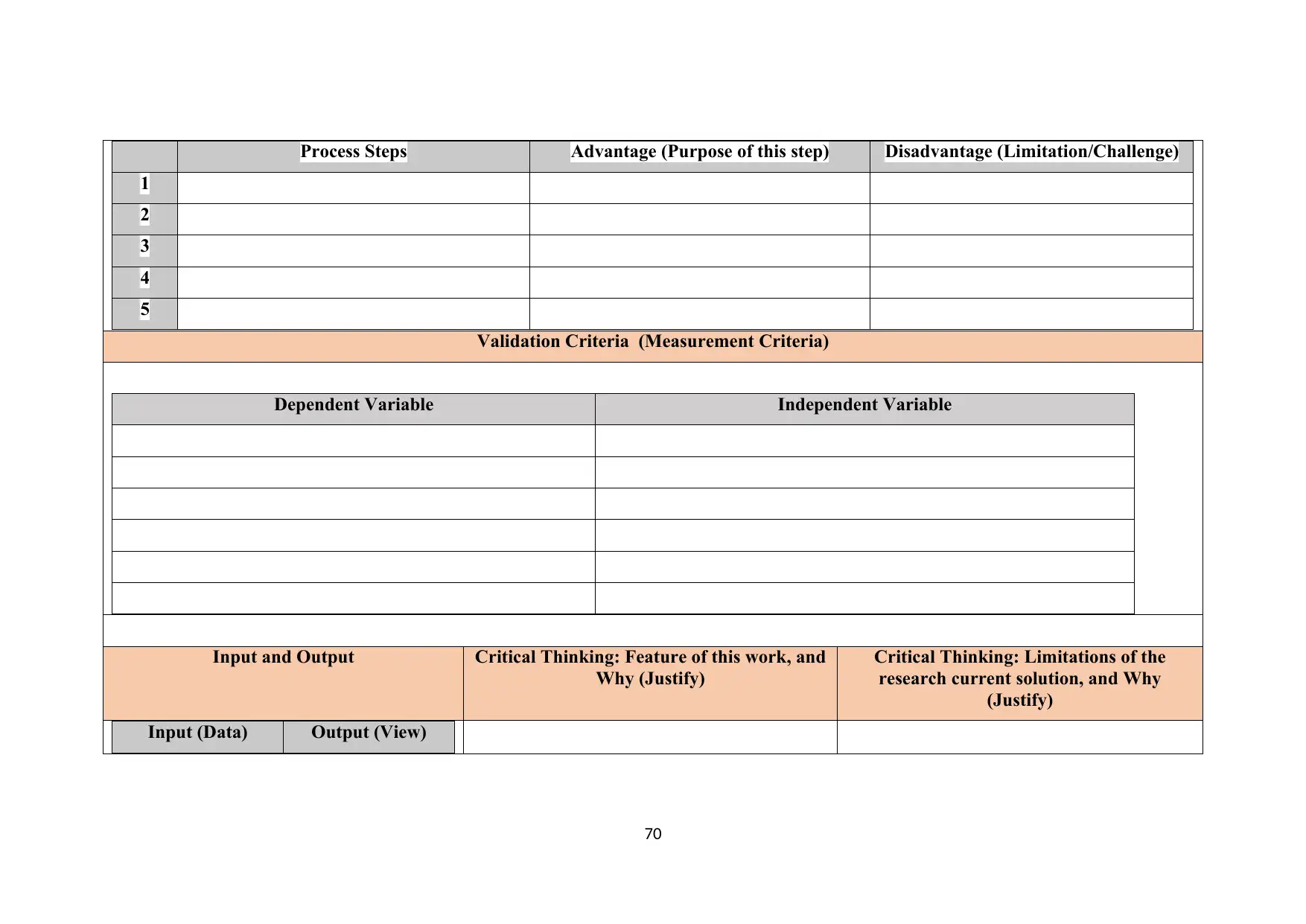
Process Steps Advantage (Purpose of this step) Disadvantage (Limitation/Challenge)
1
2
3
4
5
Validation Criteria (Measurement Criteria)
Dependent Variable Independent Variable
Input and Output Critical Thinking: Feature of this work, and
Why (Justify)
Critical Thinking: Limitations of the
research current solution, and Why
(Justify)
Input (Data) Output (View)
70
1
2
3
4
5
Validation Criteria (Measurement Criteria)
Dependent Variable Independent Variable
Input and Output Critical Thinking: Feature of this work, and
Why (Justify)
Critical Thinking: Limitations of the
research current solution, and Why
(Justify)
Input (Data) Output (View)
70
Secure Best Marks with AI Grader
Need help grading? Try our AI Grader for instant feedback on your assignments.
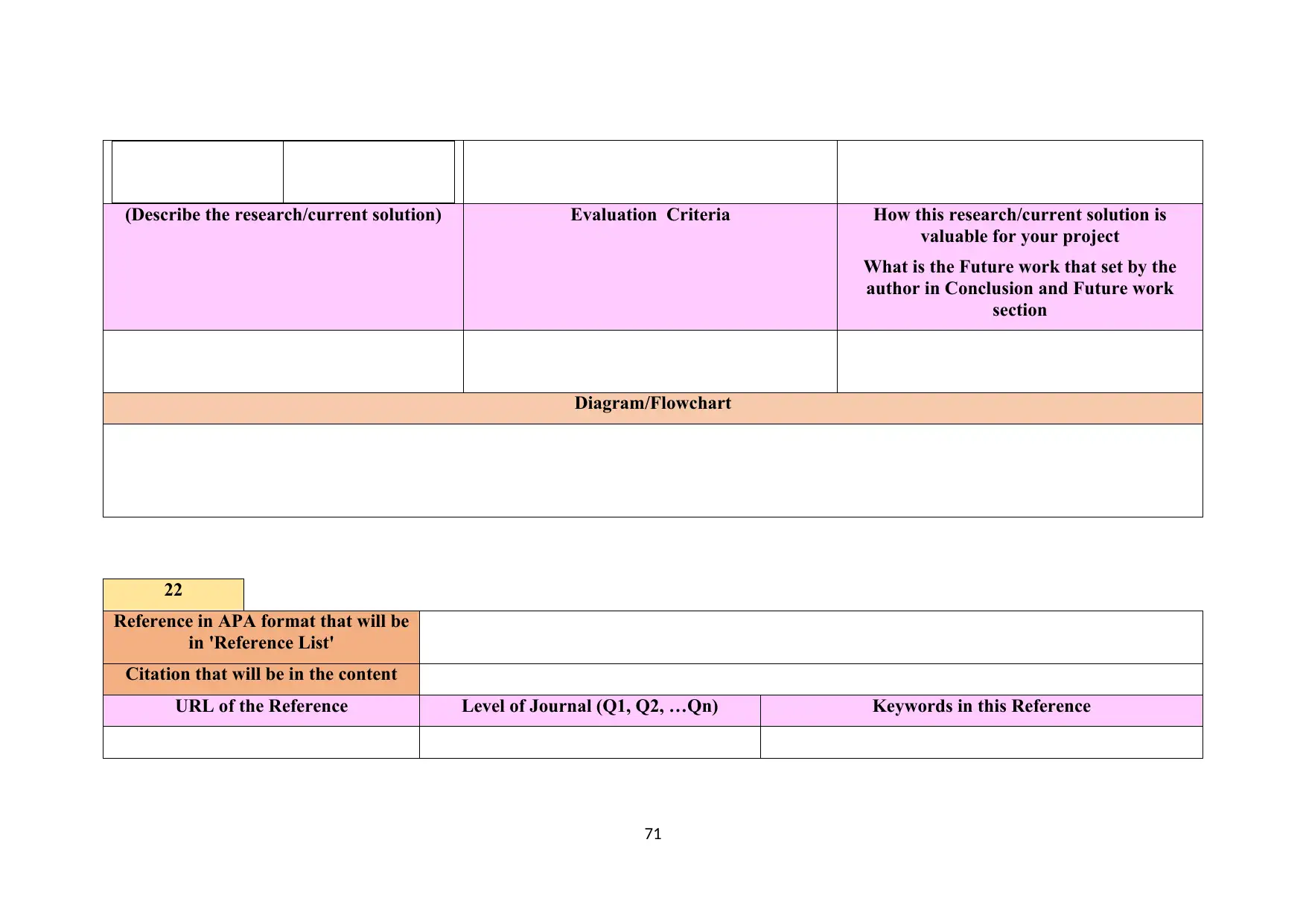
(Describe the research/current solution) Evaluation Criteria How this research/current solution is
valuable for your project
What is the Future work that set by the
author in Conclusion and Future work
section
Diagram/Flowchart
22
Reference in APA format that will be
in 'Reference List'
Citation that will be in the content
URL of the Reference Level of Journal (Q1, Q2, …Qn) Keywords in this Reference
71
valuable for your project
What is the Future work that set by the
author in Conclusion and Future work
section
Diagram/Flowchart
22
Reference in APA format that will be
in 'Reference List'
Citation that will be in the content
URL of the Reference Level of Journal (Q1, Q2, …Qn) Keywords in this Reference
71
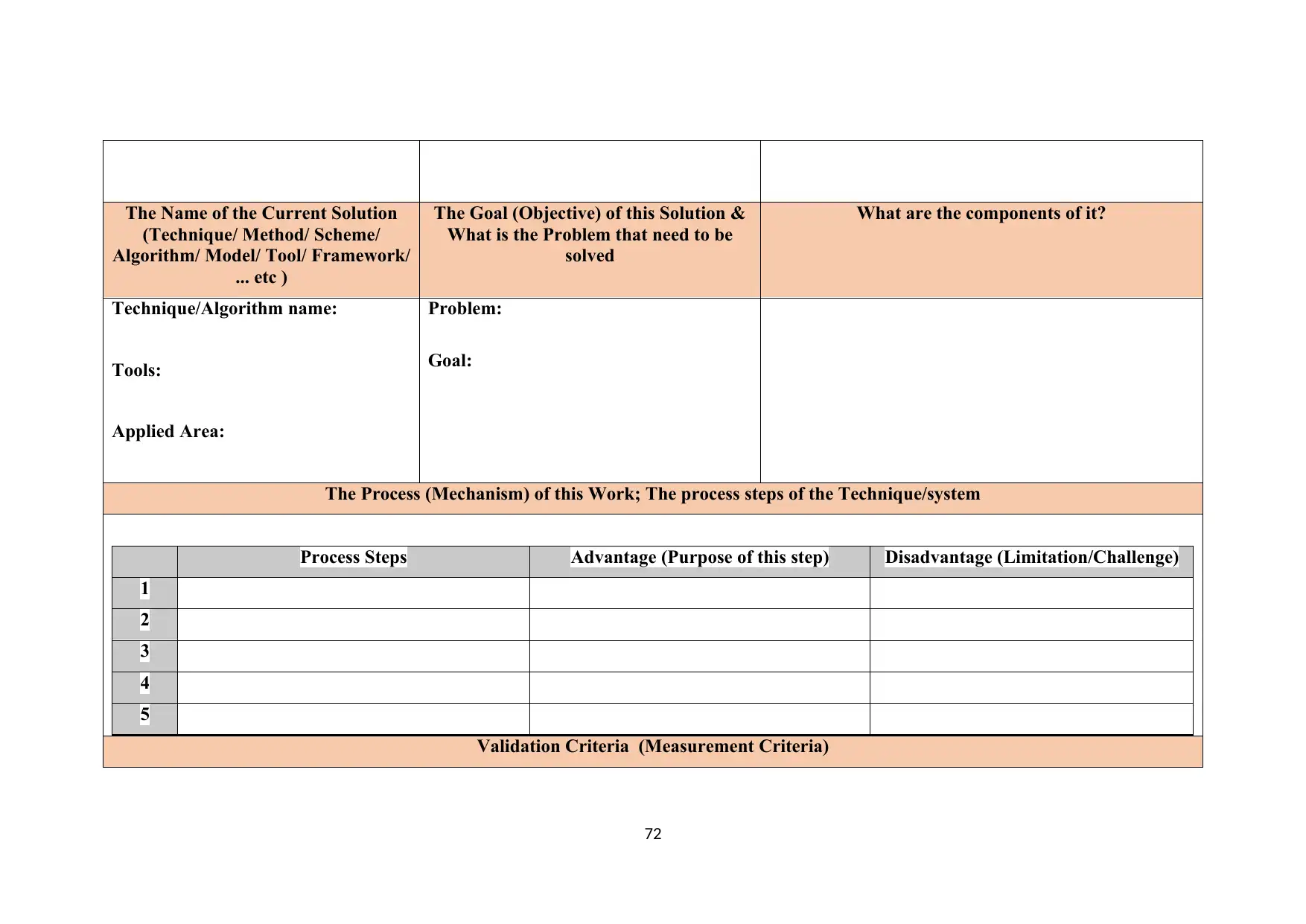
The Name of the Current Solution
(Technique/ Method/ Scheme/
Algorithm/ Model/ Tool/ Framework/
... etc )
The Goal (Objective) of this Solution &
What is the Problem that need to be
solved
What are the components of it?
Technique/Algorithm name:
Tools:
Applied Area:
Problem:
Goal:
The Process (Mechanism) of this Work; The process steps of the Technique/system
Process Steps Advantage (Purpose of this step) Disadvantage (Limitation/Challenge)
1
2
3
4
5
Validation Criteria (Measurement Criteria)
72
(Technique/ Method/ Scheme/
Algorithm/ Model/ Tool/ Framework/
... etc )
The Goal (Objective) of this Solution &
What is the Problem that need to be
solved
What are the components of it?
Technique/Algorithm name:
Tools:
Applied Area:
Problem:
Goal:
The Process (Mechanism) of this Work; The process steps of the Technique/system
Process Steps Advantage (Purpose of this step) Disadvantage (Limitation/Challenge)
1
2
3
4
5
Validation Criteria (Measurement Criteria)
72
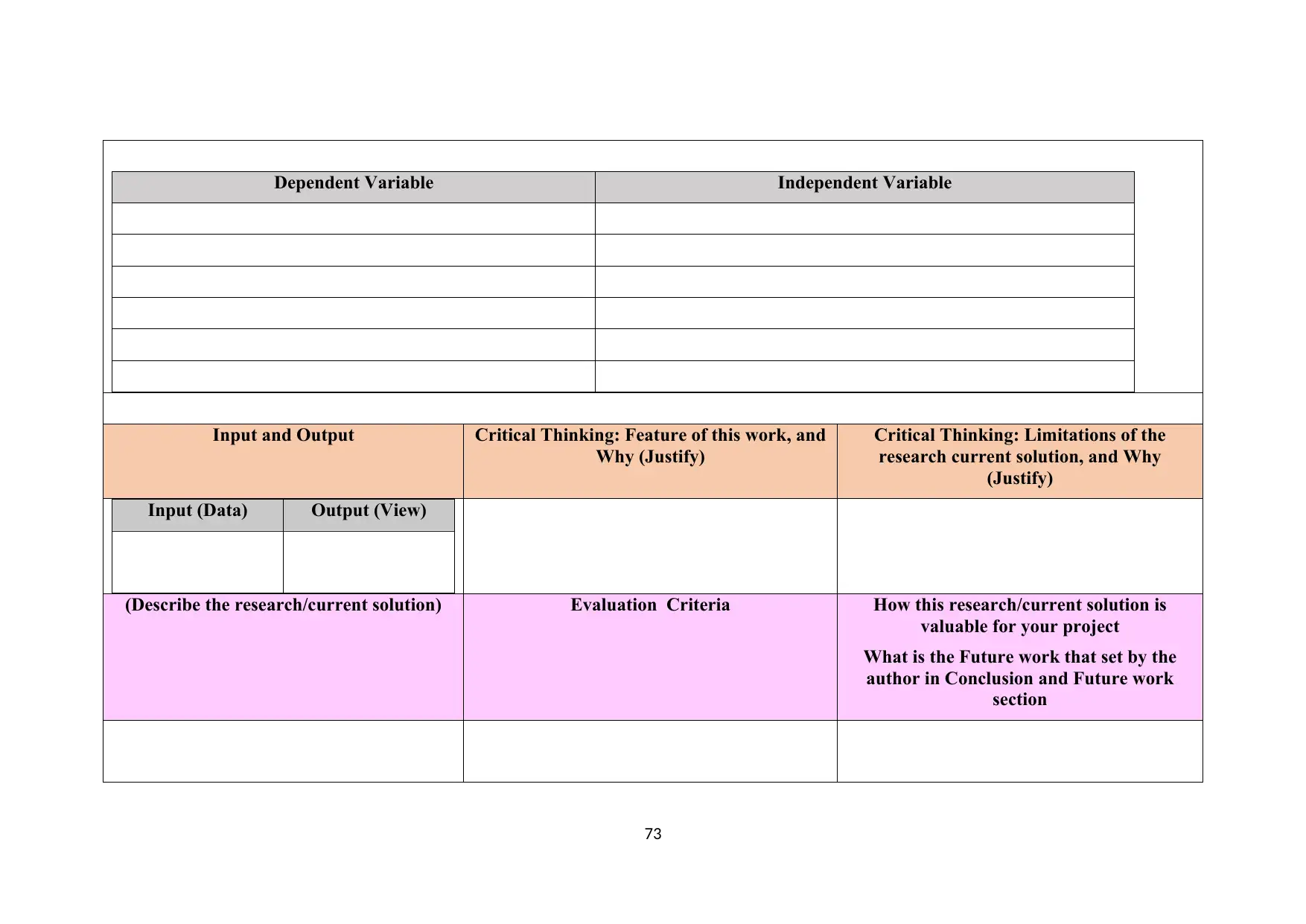
Dependent Variable Independent Variable
Input and Output Critical Thinking: Feature of this work, and
Why (Justify)
Critical Thinking: Limitations of the
research current solution, and Why
(Justify)
Input (Data) Output (View)
(Describe the research/current solution) Evaluation Criteria How this research/current solution is
valuable for your project
What is the Future work that set by the
author in Conclusion and Future work
section
73
Input and Output Critical Thinking: Feature of this work, and
Why (Justify)
Critical Thinking: Limitations of the
research current solution, and Why
(Justify)
Input (Data) Output (View)
(Describe the research/current solution) Evaluation Criteria How this research/current solution is
valuable for your project
What is the Future work that set by the
author in Conclusion and Future work
section
73
Paraphrase This Document
Need a fresh take? Get an instant paraphrase of this document with our AI Paraphraser
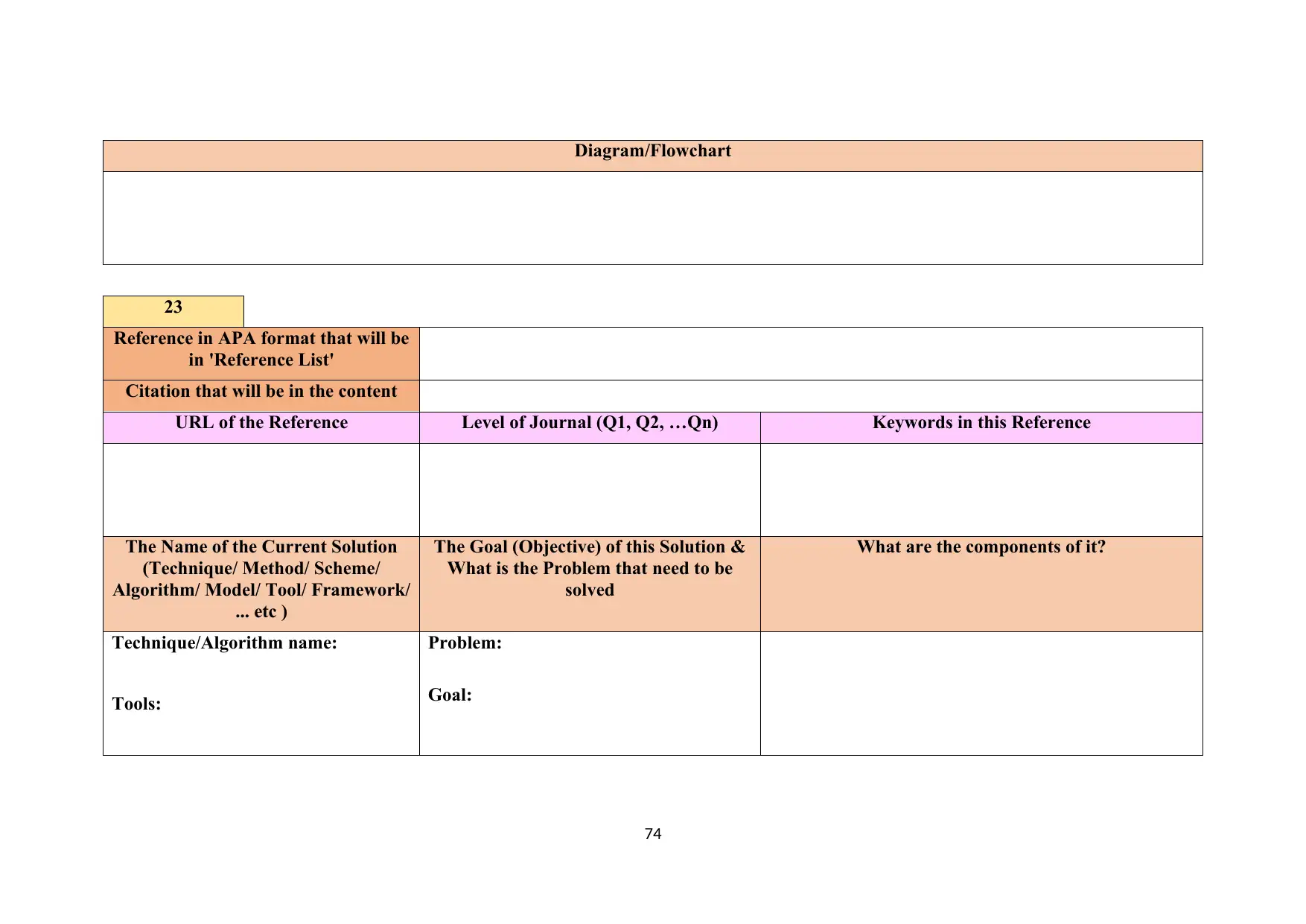
Diagram/Flowchart
23
Reference in APA format that will be
in 'Reference List'
Citation that will be in the content
URL of the Reference Level of Journal (Q1, Q2, …Qn) Keywords in this Reference
The Name of the Current Solution
(Technique/ Method/ Scheme/
Algorithm/ Model/ Tool/ Framework/
... etc )
The Goal (Objective) of this Solution &
What is the Problem that need to be
solved
What are the components of it?
Technique/Algorithm name:
Tools:
Problem:
Goal:
74
23
Reference in APA format that will be
in 'Reference List'
Citation that will be in the content
URL of the Reference Level of Journal (Q1, Q2, …Qn) Keywords in this Reference
The Name of the Current Solution
(Technique/ Method/ Scheme/
Algorithm/ Model/ Tool/ Framework/
... etc )
The Goal (Objective) of this Solution &
What is the Problem that need to be
solved
What are the components of it?
Technique/Algorithm name:
Tools:
Problem:
Goal:
74
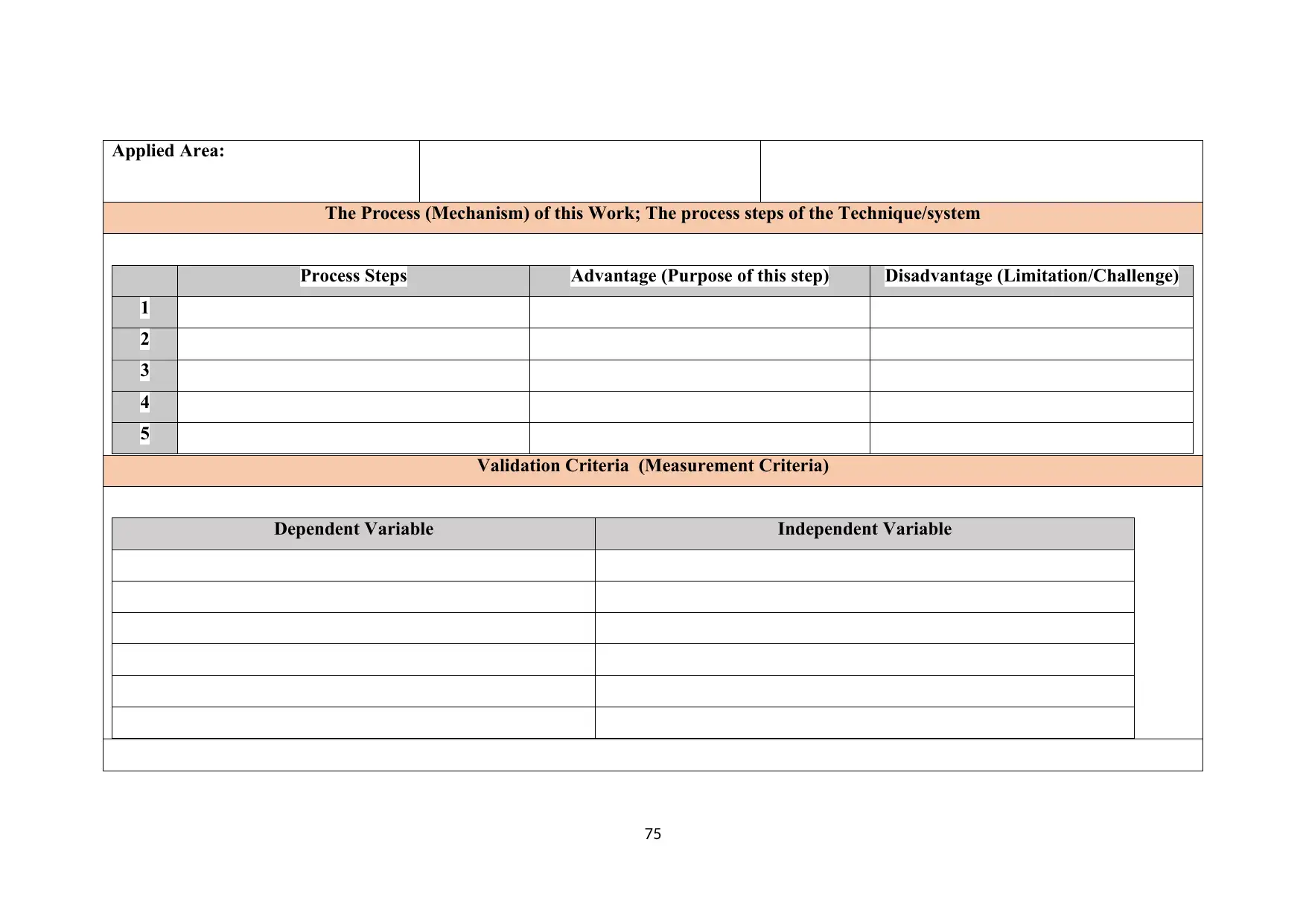
Applied Area:
The Process (Mechanism) of this Work; The process steps of the Technique/system
Process Steps Advantage (Purpose of this step) Disadvantage (Limitation/Challenge)
1
2
3
4
5
Validation Criteria (Measurement Criteria)
Dependent Variable Independent Variable
75
The Process (Mechanism) of this Work; The process steps of the Technique/system
Process Steps Advantage (Purpose of this step) Disadvantage (Limitation/Challenge)
1
2
3
4
5
Validation Criteria (Measurement Criteria)
Dependent Variable Independent Variable
75
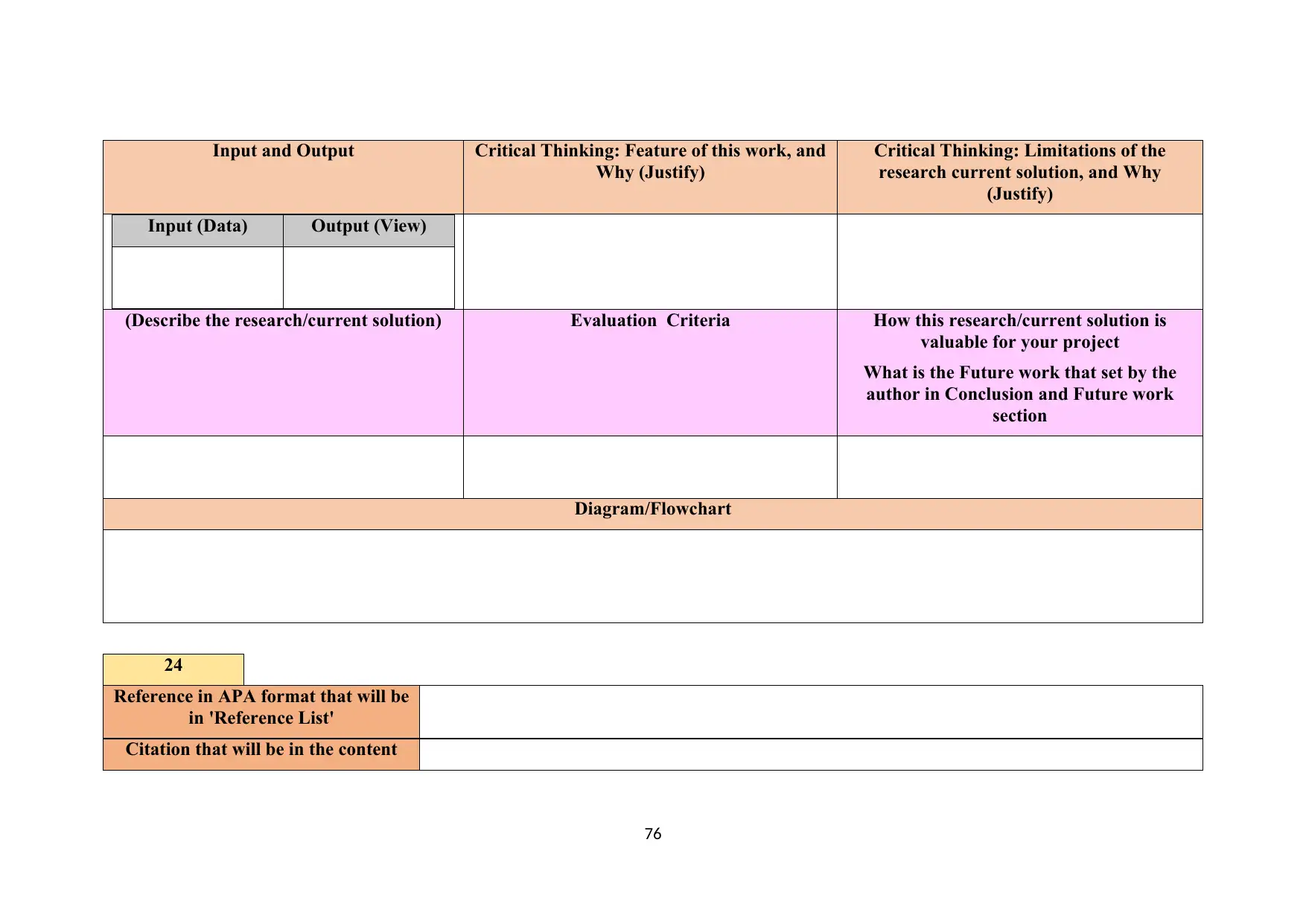
Input and Output Critical Thinking: Feature of this work, and
Why (Justify)
Critical Thinking: Limitations of the
research current solution, and Why
(Justify)
Input (Data) Output (View)
(Describe the research/current solution) Evaluation Criteria How this research/current solution is
valuable for your project
What is the Future work that set by the
author in Conclusion and Future work
section
Diagram/Flowchart
24
Reference in APA format that will be
in 'Reference List'
Citation that will be in the content
76
Why (Justify)
Critical Thinking: Limitations of the
research current solution, and Why
(Justify)
Input (Data) Output (View)
(Describe the research/current solution) Evaluation Criteria How this research/current solution is
valuable for your project
What is the Future work that set by the
author in Conclusion and Future work
section
Diagram/Flowchart
24
Reference in APA format that will be
in 'Reference List'
Citation that will be in the content
76
Secure Best Marks with AI Grader
Need help grading? Try our AI Grader for instant feedback on your assignments.
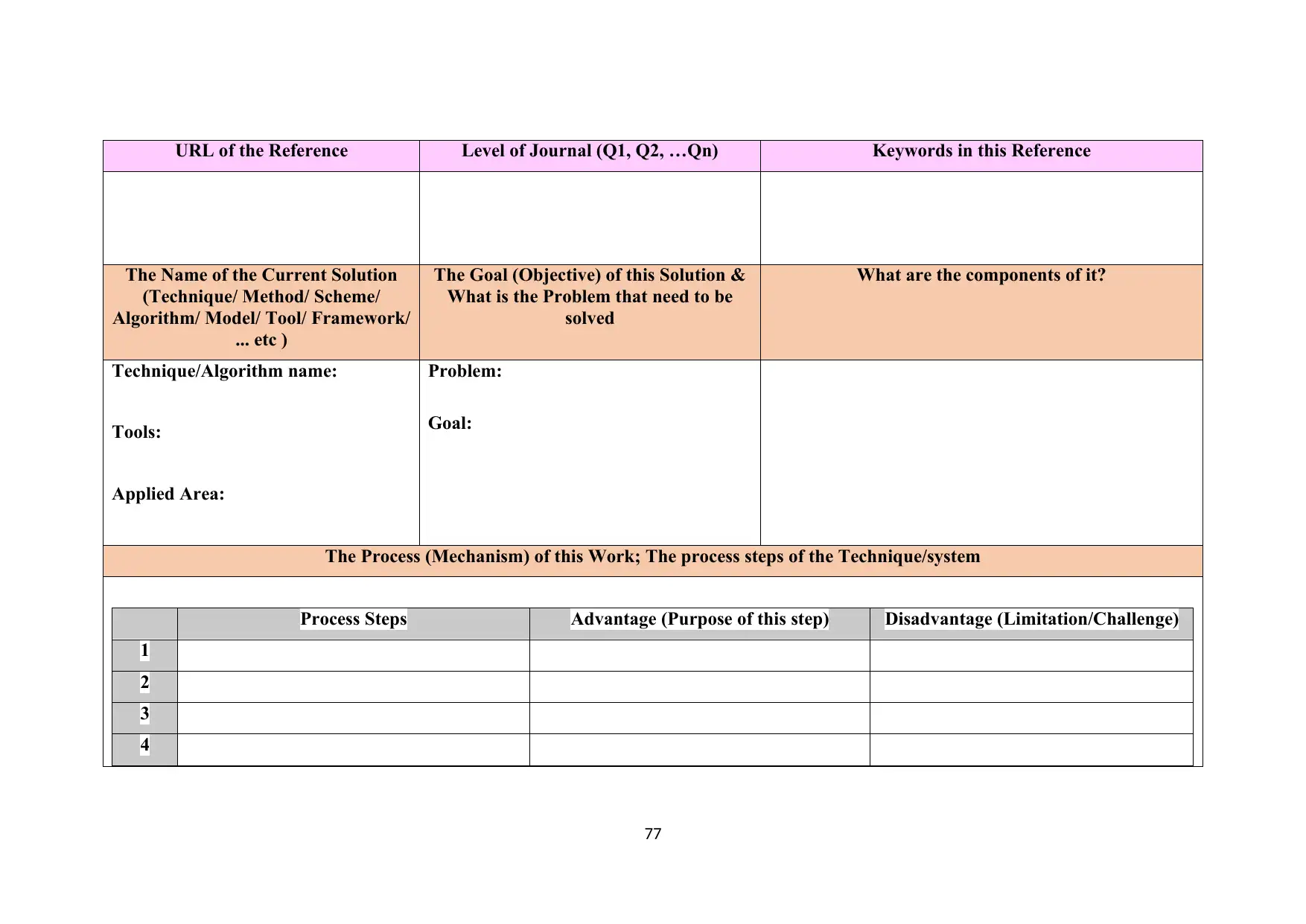
URL of the Reference Level of Journal (Q1, Q2, …Qn) Keywords in this Reference
The Name of the Current Solution
(Technique/ Method/ Scheme/
Algorithm/ Model/ Tool/ Framework/
... etc )
The Goal (Objective) of this Solution &
What is the Problem that need to be
solved
What are the components of it?
Technique/Algorithm name:
Tools:
Applied Area:
Problem:
Goal:
The Process (Mechanism) of this Work; The process steps of the Technique/system
Process Steps Advantage (Purpose of this step) Disadvantage (Limitation/Challenge)
1
2
3
4
77
The Name of the Current Solution
(Technique/ Method/ Scheme/
Algorithm/ Model/ Tool/ Framework/
... etc )
The Goal (Objective) of this Solution &
What is the Problem that need to be
solved
What are the components of it?
Technique/Algorithm name:
Tools:
Applied Area:
Problem:
Goal:
The Process (Mechanism) of this Work; The process steps of the Technique/system
Process Steps Advantage (Purpose of this step) Disadvantage (Limitation/Challenge)
1
2
3
4
77
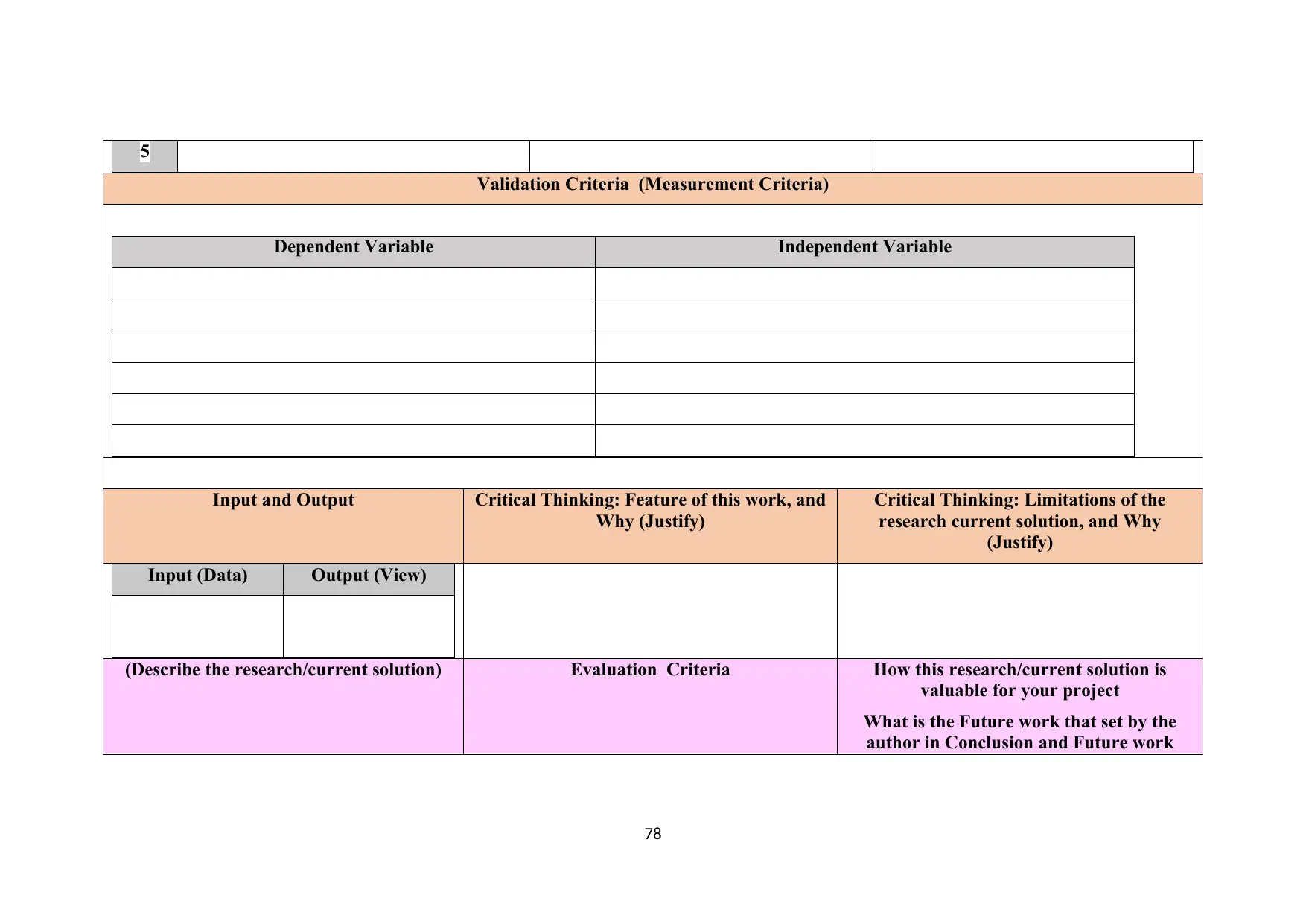
5
Validation Criteria (Measurement Criteria)
Dependent Variable Independent Variable
Input and Output Critical Thinking: Feature of this work, and
Why (Justify)
Critical Thinking: Limitations of the
research current solution, and Why
(Justify)
Input (Data) Output (View)
(Describe the research/current solution) Evaluation Criteria How this research/current solution is
valuable for your project
What is the Future work that set by the
author in Conclusion and Future work
78
Validation Criteria (Measurement Criteria)
Dependent Variable Independent Variable
Input and Output Critical Thinking: Feature of this work, and
Why (Justify)
Critical Thinking: Limitations of the
research current solution, and Why
(Justify)
Input (Data) Output (View)
(Describe the research/current solution) Evaluation Criteria How this research/current solution is
valuable for your project
What is the Future work that set by the
author in Conclusion and Future work
78
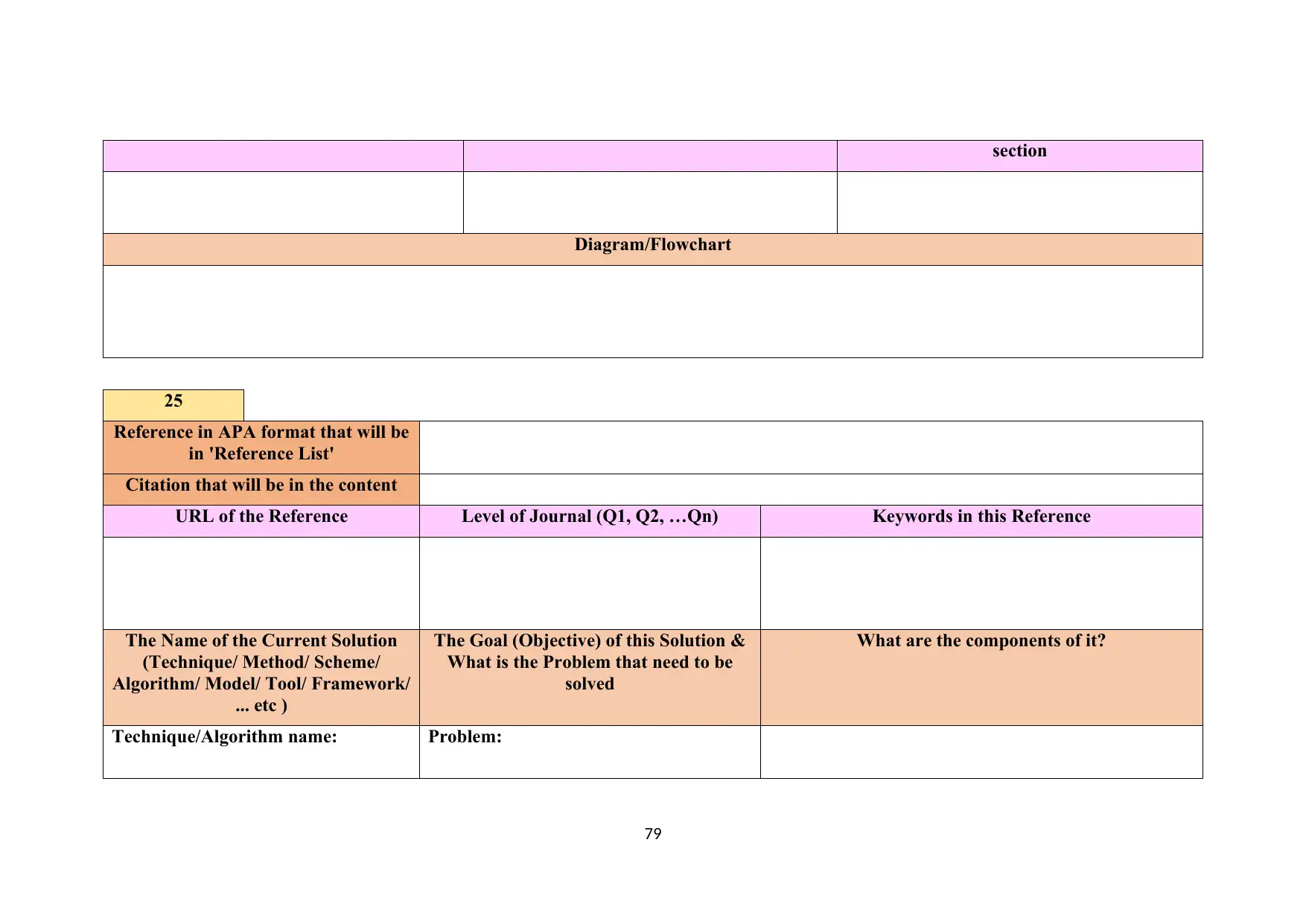
section
Diagram/Flowchart
25
Reference in APA format that will be
in 'Reference List'
Citation that will be in the content
URL of the Reference Level of Journal (Q1, Q2, …Qn) Keywords in this Reference
The Name of the Current Solution
(Technique/ Method/ Scheme/
Algorithm/ Model/ Tool/ Framework/
... etc )
The Goal (Objective) of this Solution &
What is the Problem that need to be
solved
What are the components of it?
Technique/Algorithm name: Problem:
79
Diagram/Flowchart
25
Reference in APA format that will be
in 'Reference List'
Citation that will be in the content
URL of the Reference Level of Journal (Q1, Q2, …Qn) Keywords in this Reference
The Name of the Current Solution
(Technique/ Method/ Scheme/
Algorithm/ Model/ Tool/ Framework/
... etc )
The Goal (Objective) of this Solution &
What is the Problem that need to be
solved
What are the components of it?
Technique/Algorithm name: Problem:
79
Paraphrase This Document
Need a fresh take? Get an instant paraphrase of this document with our AI Paraphraser
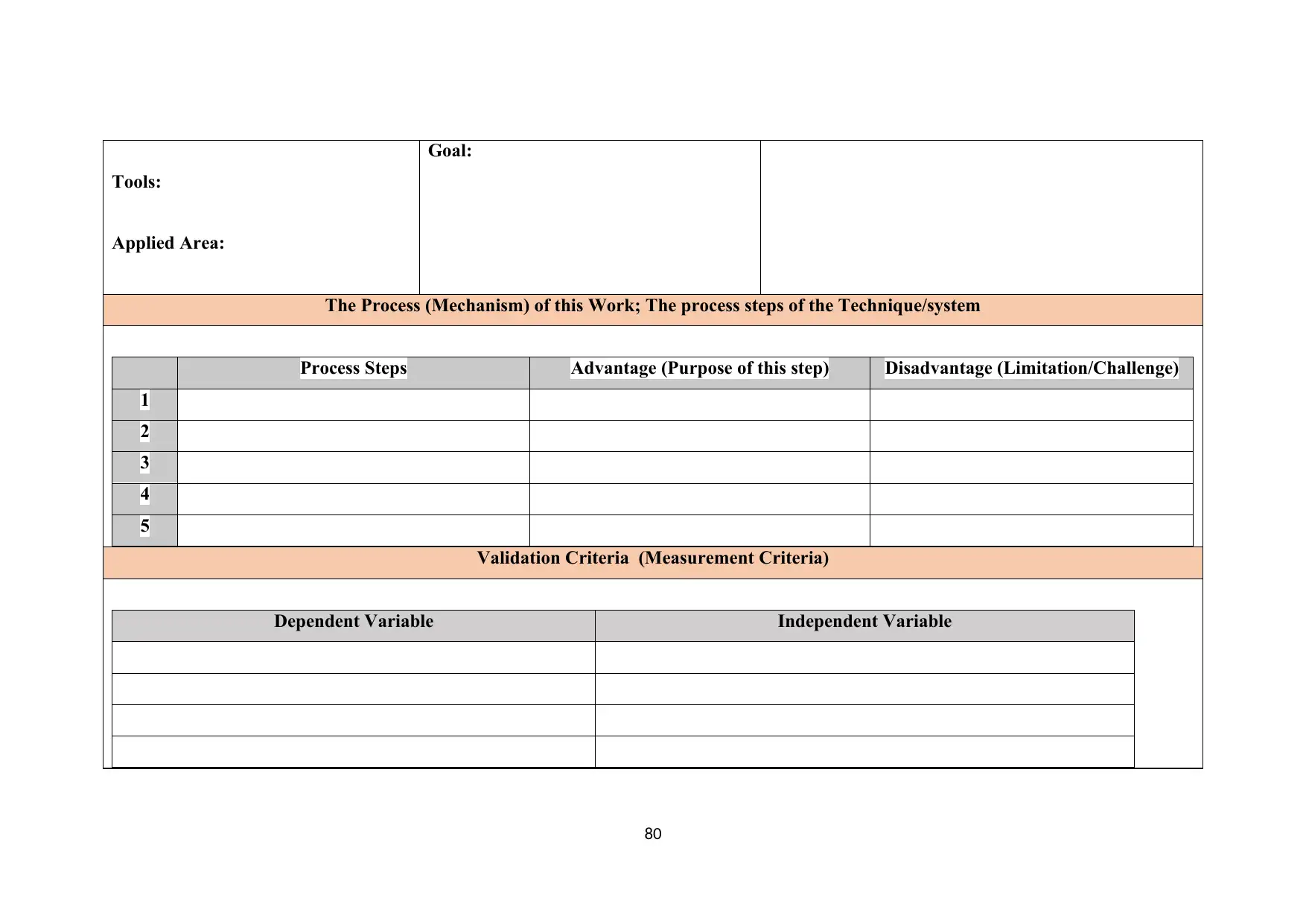
Tools:
Applied Area:
Goal:
The Process (Mechanism) of this Work; The process steps of the Technique/system
Process Steps Advantage (Purpose of this step) Disadvantage (Limitation/Challenge)
1
2
3
4
5
Validation Criteria (Measurement Criteria)
Dependent Variable Independent Variable
80
Applied Area:
Goal:
The Process (Mechanism) of this Work; The process steps of the Technique/system
Process Steps Advantage (Purpose of this step) Disadvantage (Limitation/Challenge)
1
2
3
4
5
Validation Criteria (Measurement Criteria)
Dependent Variable Independent Variable
80
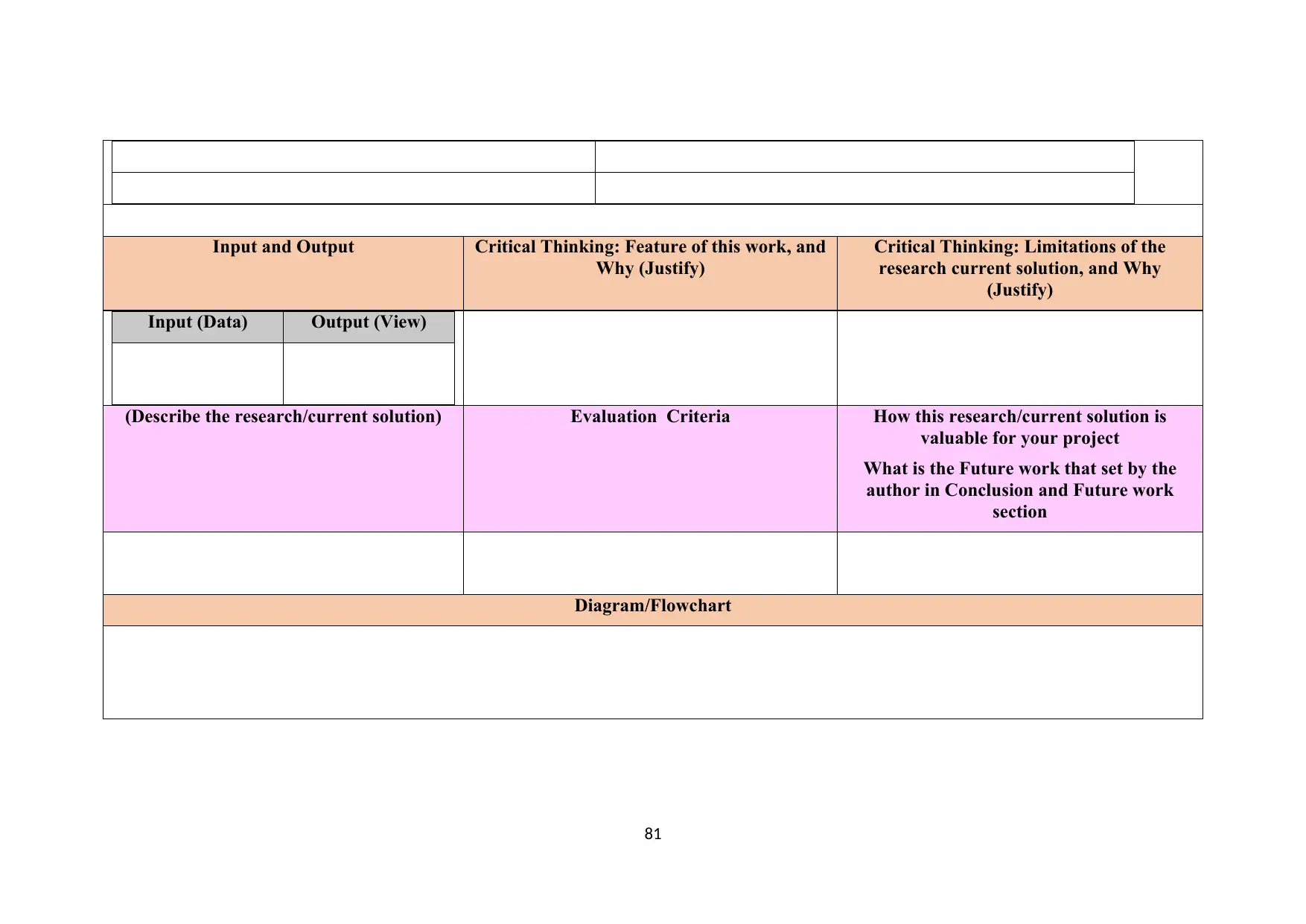
Input and Output Critical Thinking: Feature of this work, and
Why (Justify)
Critical Thinking: Limitations of the
research current solution, and Why
(Justify)
Input (Data) Output (View)
(Describe the research/current solution) Evaluation Criteria How this research/current solution is
valuable for your project
What is the Future work that set by the
author in Conclusion and Future work
section
Diagram/Flowchart
81
Why (Justify)
Critical Thinking: Limitations of the
research current solution, and Why
(Justify)
Input (Data) Output (View)
(Describe the research/current solution) Evaluation Criteria How this research/current solution is
valuable for your project
What is the Future work that set by the
author in Conclusion and Future work
section
Diagram/Flowchart
81
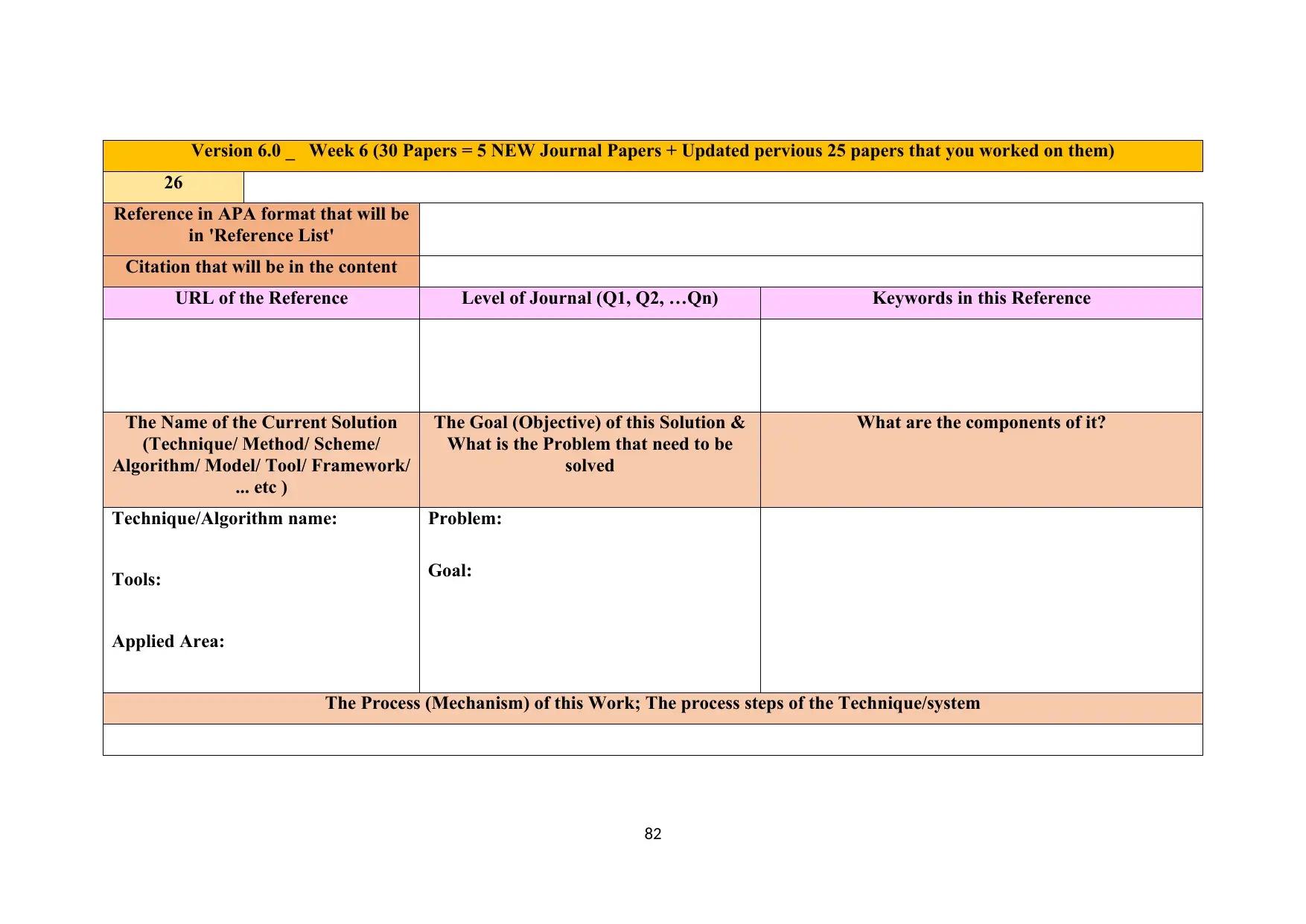
Version 6.0 _ Week 6 (30 Papers = 5 NEW Journal Papers + Updated pervious 25 papers that you worked on them)
26
Reference in APA format that will be
in 'Reference List'
Citation that will be in the content
URL of the Reference Level of Journal (Q1, Q2, …Qn) Keywords in this Reference
The Name of the Current Solution
(Technique/ Method/ Scheme/
Algorithm/ Model/ Tool/ Framework/
... etc )
The Goal (Objective) of this Solution &
What is the Problem that need to be
solved
What are the components of it?
Technique/Algorithm name:
Tools:
Applied Area:
Problem:
Goal:
The Process (Mechanism) of this Work; The process steps of the Technique/system
82
26
Reference in APA format that will be
in 'Reference List'
Citation that will be in the content
URL of the Reference Level of Journal (Q1, Q2, …Qn) Keywords in this Reference
The Name of the Current Solution
(Technique/ Method/ Scheme/
Algorithm/ Model/ Tool/ Framework/
... etc )
The Goal (Objective) of this Solution &
What is the Problem that need to be
solved
What are the components of it?
Technique/Algorithm name:
Tools:
Applied Area:
Problem:
Goal:
The Process (Mechanism) of this Work; The process steps of the Technique/system
82
Secure Best Marks with AI Grader
Need help grading? Try our AI Grader for instant feedback on your assignments.
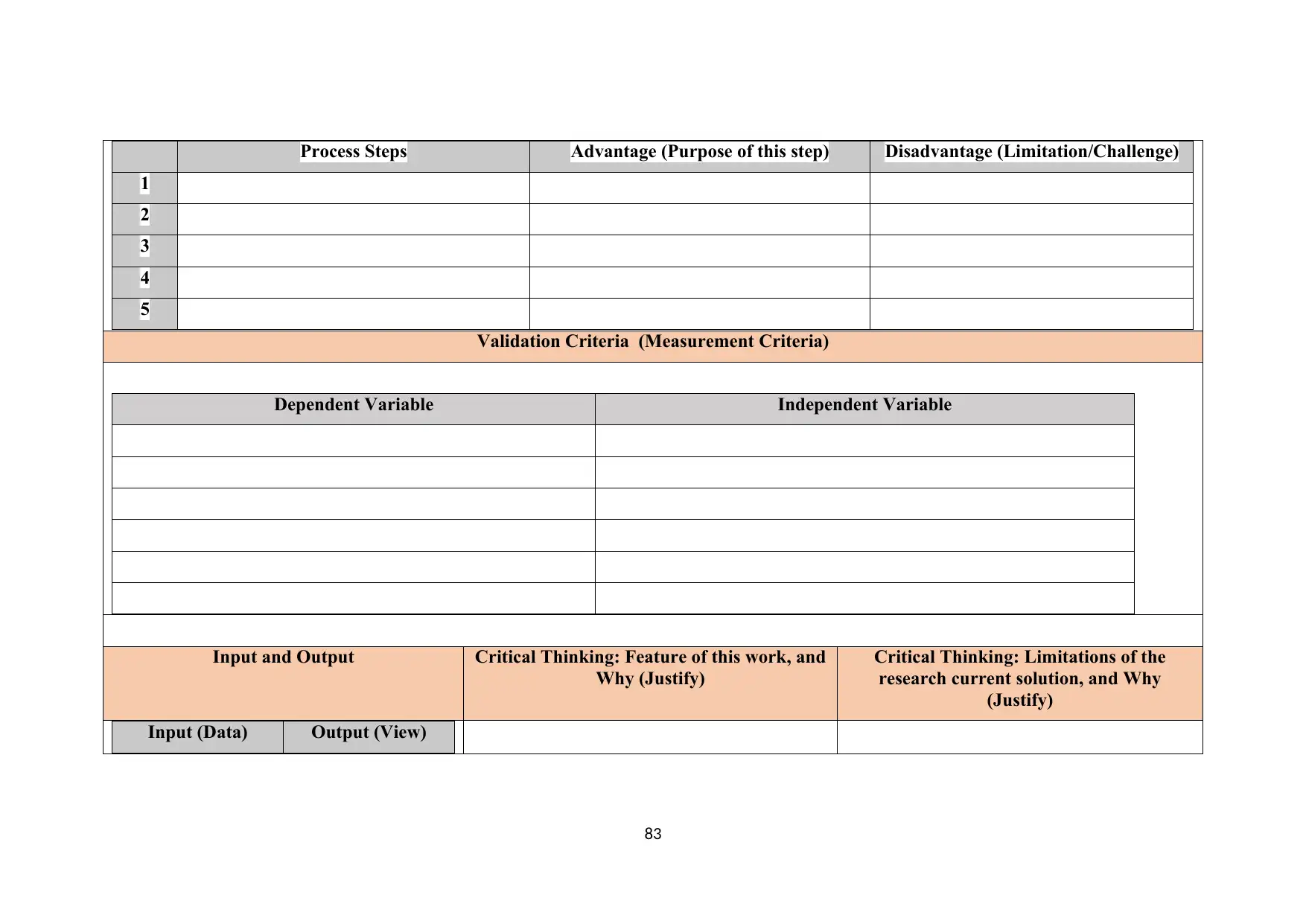
Process Steps Advantage (Purpose of this step) Disadvantage (Limitation/Challenge)
1
2
3
4
5
Validation Criteria (Measurement Criteria)
Dependent Variable Independent Variable
Input and Output Critical Thinking: Feature of this work, and
Why (Justify)
Critical Thinking: Limitations of the
research current solution, and Why
(Justify)
Input (Data) Output (View)
83
1
2
3
4
5
Validation Criteria (Measurement Criteria)
Dependent Variable Independent Variable
Input and Output Critical Thinking: Feature of this work, and
Why (Justify)
Critical Thinking: Limitations of the
research current solution, and Why
(Justify)
Input (Data) Output (View)
83
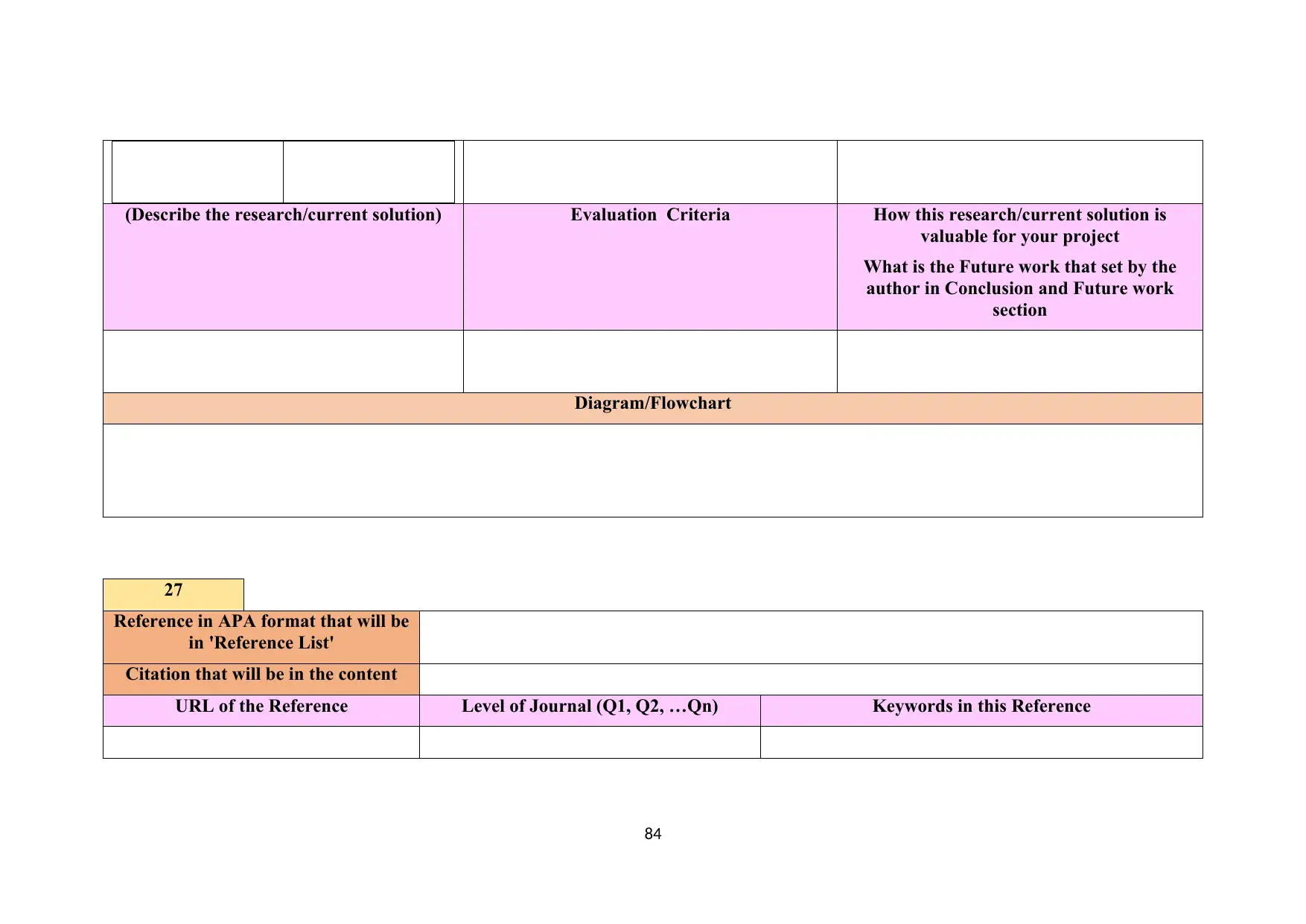
(Describe the research/current solution) Evaluation Criteria How this research/current solution is
valuable for your project
What is the Future work that set by the
author in Conclusion and Future work
section
Diagram/Flowchart
27
Reference in APA format that will be
in 'Reference List'
Citation that will be in the content
URL of the Reference Level of Journal (Q1, Q2, …Qn) Keywords in this Reference
84
valuable for your project
What is the Future work that set by the
author in Conclusion and Future work
section
Diagram/Flowchart
27
Reference in APA format that will be
in 'Reference List'
Citation that will be in the content
URL of the Reference Level of Journal (Q1, Q2, …Qn) Keywords in this Reference
84
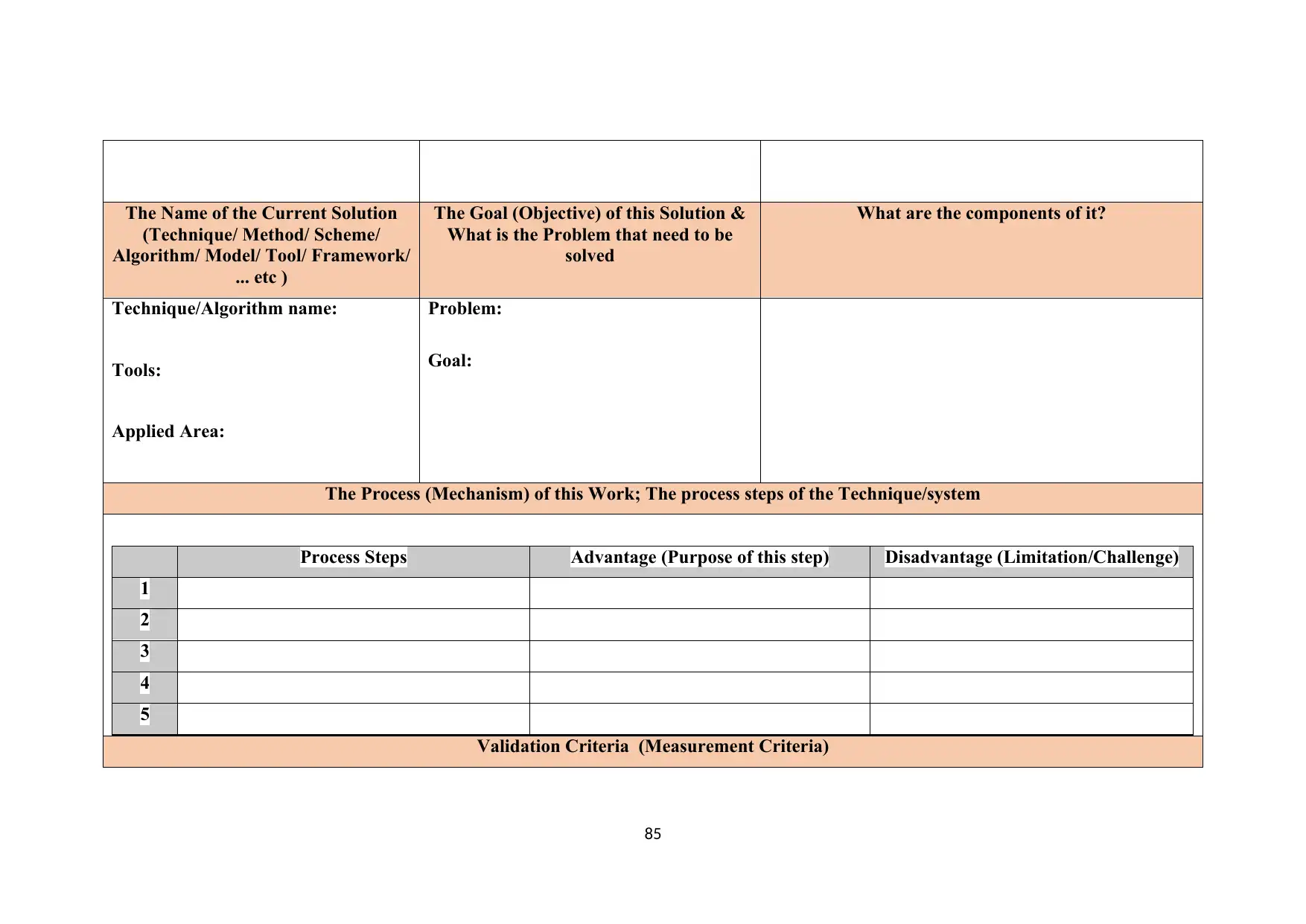
The Name of the Current Solution
(Technique/ Method/ Scheme/
Algorithm/ Model/ Tool/ Framework/
... etc )
The Goal (Objective) of this Solution &
What is the Problem that need to be
solved
What are the components of it?
Technique/Algorithm name:
Tools:
Applied Area:
Problem:
Goal:
The Process (Mechanism) of this Work; The process steps of the Technique/system
Process Steps Advantage (Purpose of this step) Disadvantage (Limitation/Challenge)
1
2
3
4
5
Validation Criteria (Measurement Criteria)
85
(Technique/ Method/ Scheme/
Algorithm/ Model/ Tool/ Framework/
... etc )
The Goal (Objective) of this Solution &
What is the Problem that need to be
solved
What are the components of it?
Technique/Algorithm name:
Tools:
Applied Area:
Problem:
Goal:
The Process (Mechanism) of this Work; The process steps of the Technique/system
Process Steps Advantage (Purpose of this step) Disadvantage (Limitation/Challenge)
1
2
3
4
5
Validation Criteria (Measurement Criteria)
85
Paraphrase This Document
Need a fresh take? Get an instant paraphrase of this document with our AI Paraphraser
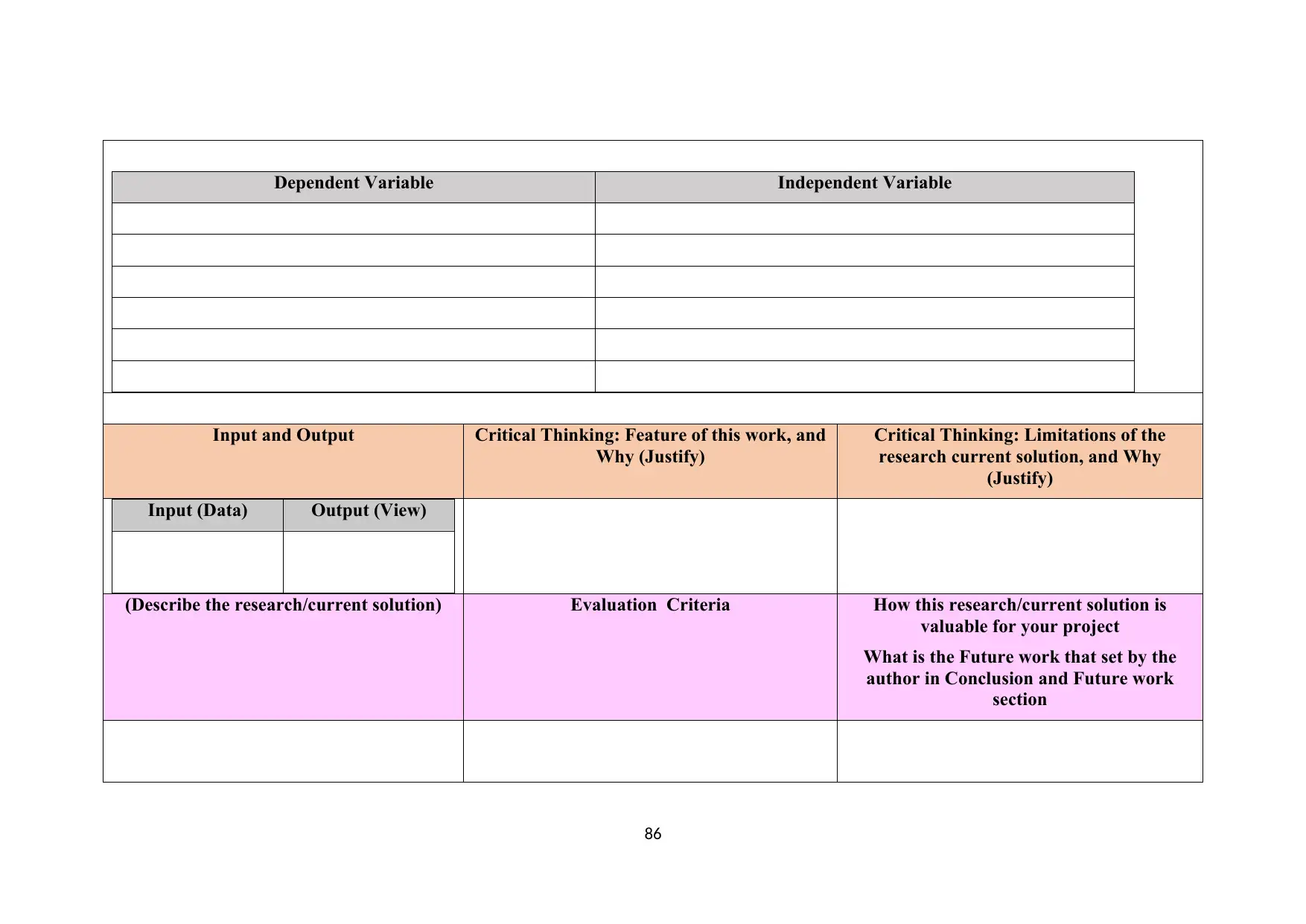
Dependent Variable Independent Variable
Input and Output Critical Thinking: Feature of this work, and
Why (Justify)
Critical Thinking: Limitations of the
research current solution, and Why
(Justify)
Input (Data) Output (View)
(Describe the research/current solution) Evaluation Criteria How this research/current solution is
valuable for your project
What is the Future work that set by the
author in Conclusion and Future work
section
86
Input and Output Critical Thinking: Feature of this work, and
Why (Justify)
Critical Thinking: Limitations of the
research current solution, and Why
(Justify)
Input (Data) Output (View)
(Describe the research/current solution) Evaluation Criteria How this research/current solution is
valuable for your project
What is the Future work that set by the
author in Conclusion and Future work
section
86
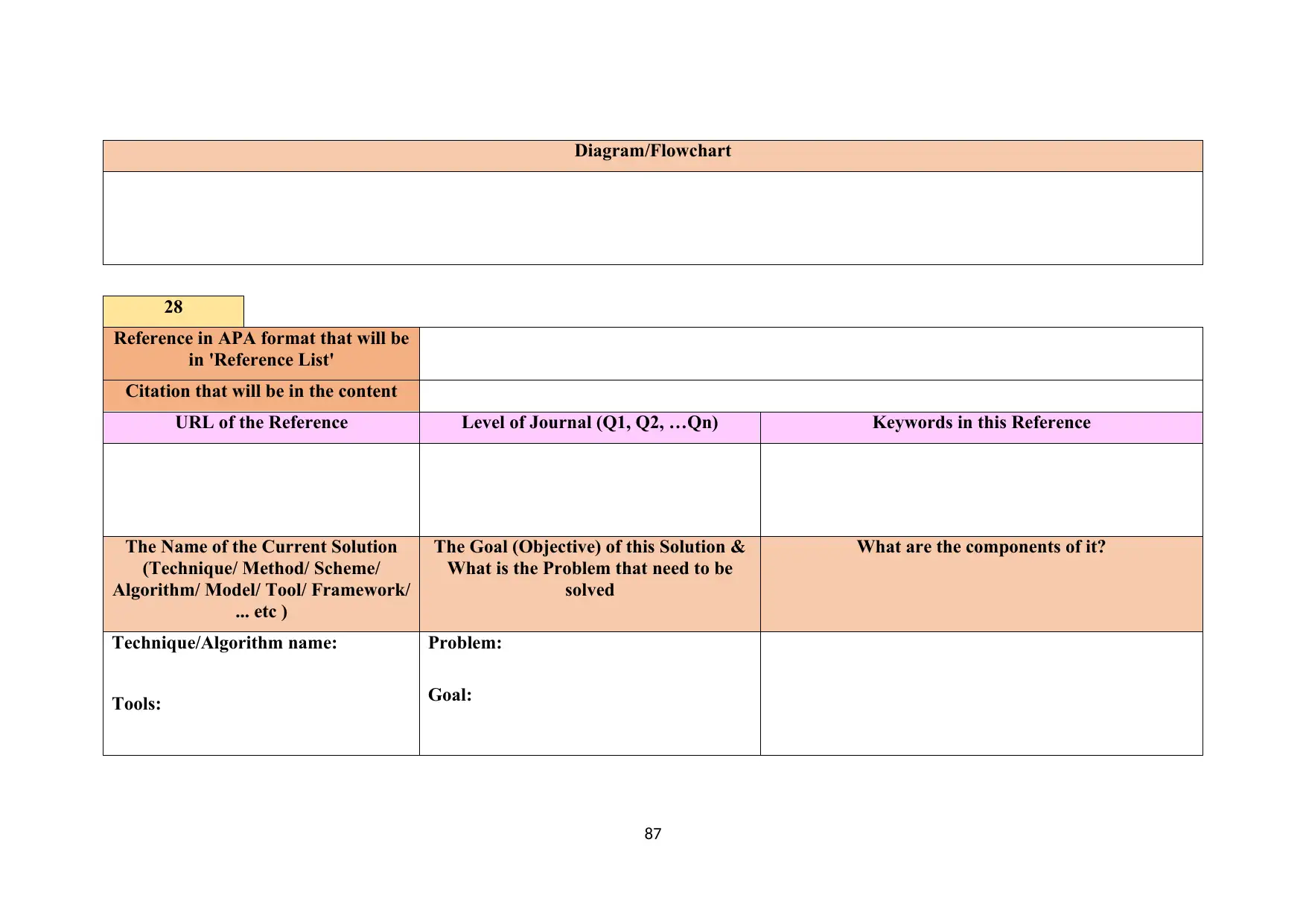
Diagram/Flowchart
28
Reference in APA format that will be
in 'Reference List'
Citation that will be in the content
URL of the Reference Level of Journal (Q1, Q2, …Qn) Keywords in this Reference
The Name of the Current Solution
(Technique/ Method/ Scheme/
Algorithm/ Model/ Tool/ Framework/
... etc )
The Goal (Objective) of this Solution &
What is the Problem that need to be
solved
What are the components of it?
Technique/Algorithm name:
Tools:
Problem:
Goal:
87
28
Reference in APA format that will be
in 'Reference List'
Citation that will be in the content
URL of the Reference Level of Journal (Q1, Q2, …Qn) Keywords in this Reference
The Name of the Current Solution
(Technique/ Method/ Scheme/
Algorithm/ Model/ Tool/ Framework/
... etc )
The Goal (Objective) of this Solution &
What is the Problem that need to be
solved
What are the components of it?
Technique/Algorithm name:
Tools:
Problem:
Goal:
87
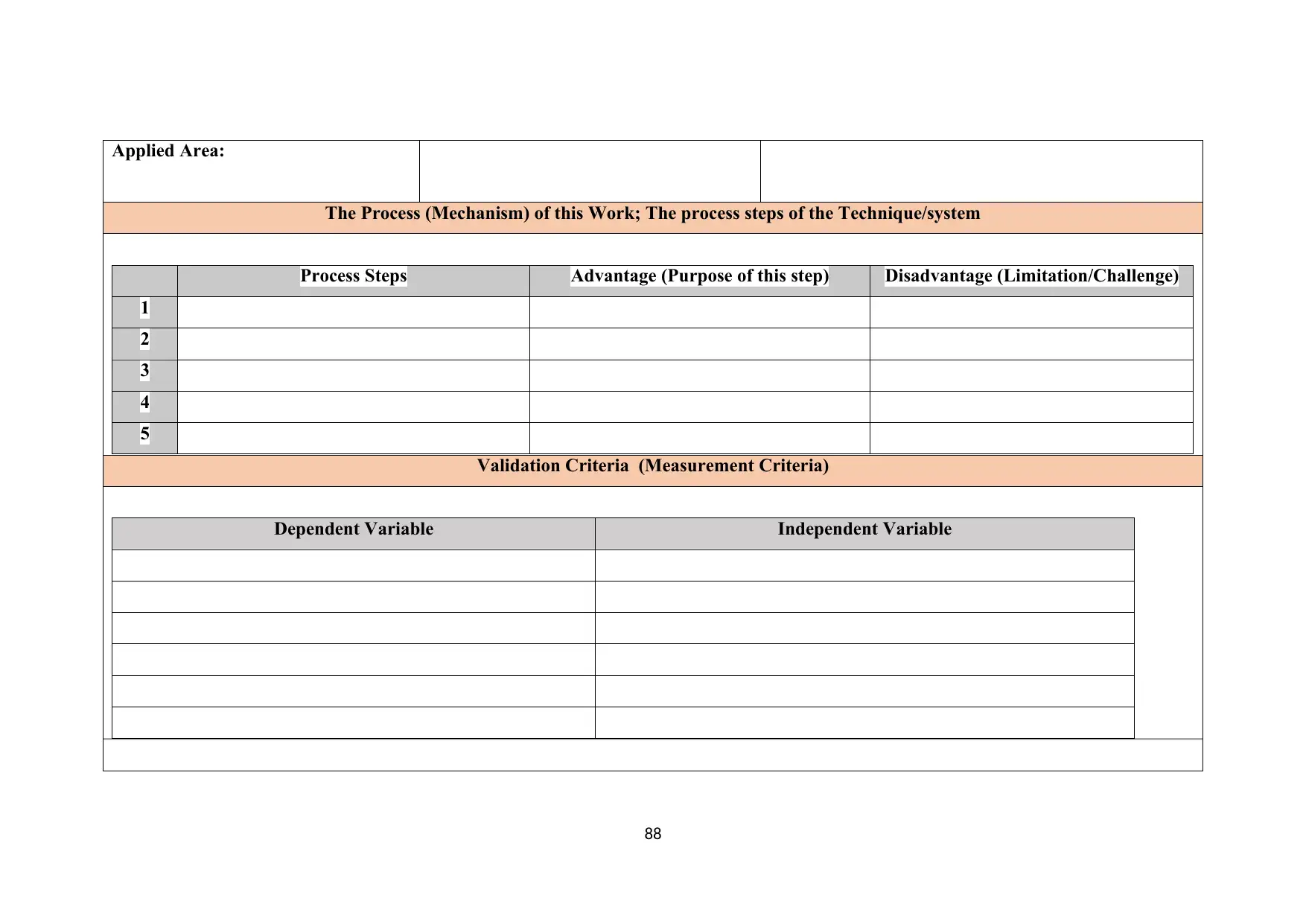
Applied Area:
The Process (Mechanism) of this Work; The process steps of the Technique/system
Process Steps Advantage (Purpose of this step) Disadvantage (Limitation/Challenge)
1
2
3
4
5
Validation Criteria (Measurement Criteria)
Dependent Variable Independent Variable
88
The Process (Mechanism) of this Work; The process steps of the Technique/system
Process Steps Advantage (Purpose of this step) Disadvantage (Limitation/Challenge)
1
2
3
4
5
Validation Criteria (Measurement Criteria)
Dependent Variable Independent Variable
88
Secure Best Marks with AI Grader
Need help grading? Try our AI Grader for instant feedback on your assignments.
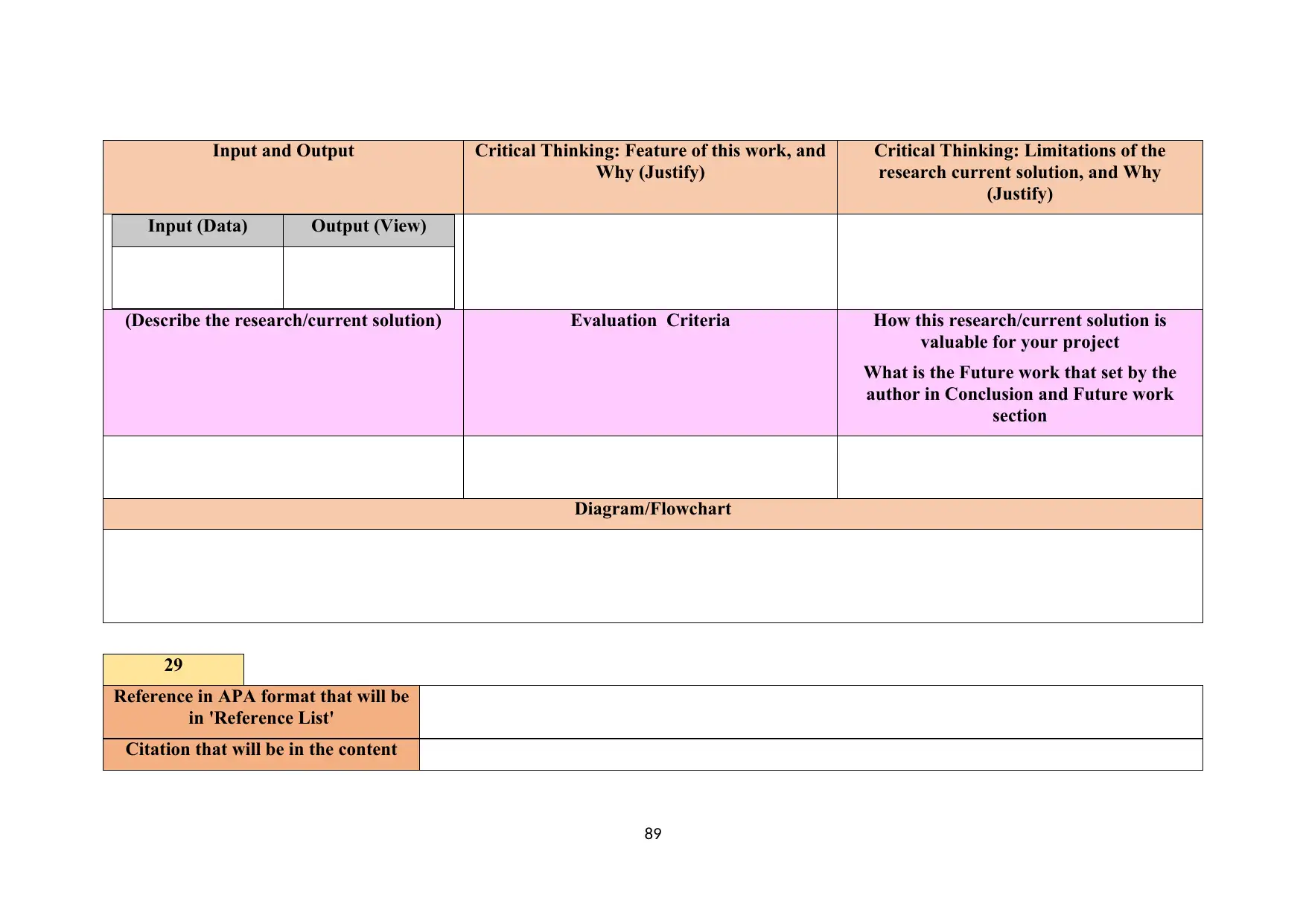
Input and Output Critical Thinking: Feature of this work, and
Why (Justify)
Critical Thinking: Limitations of the
research current solution, and Why
(Justify)
Input (Data) Output (View)
(Describe the research/current solution) Evaluation Criteria How this research/current solution is
valuable for your project
What is the Future work that set by the
author in Conclusion and Future work
section
Diagram/Flowchart
29
Reference in APA format that will be
in 'Reference List'
Citation that will be in the content
89
Why (Justify)
Critical Thinking: Limitations of the
research current solution, and Why
(Justify)
Input (Data) Output (View)
(Describe the research/current solution) Evaluation Criteria How this research/current solution is
valuable for your project
What is the Future work that set by the
author in Conclusion and Future work
section
Diagram/Flowchart
29
Reference in APA format that will be
in 'Reference List'
Citation that will be in the content
89
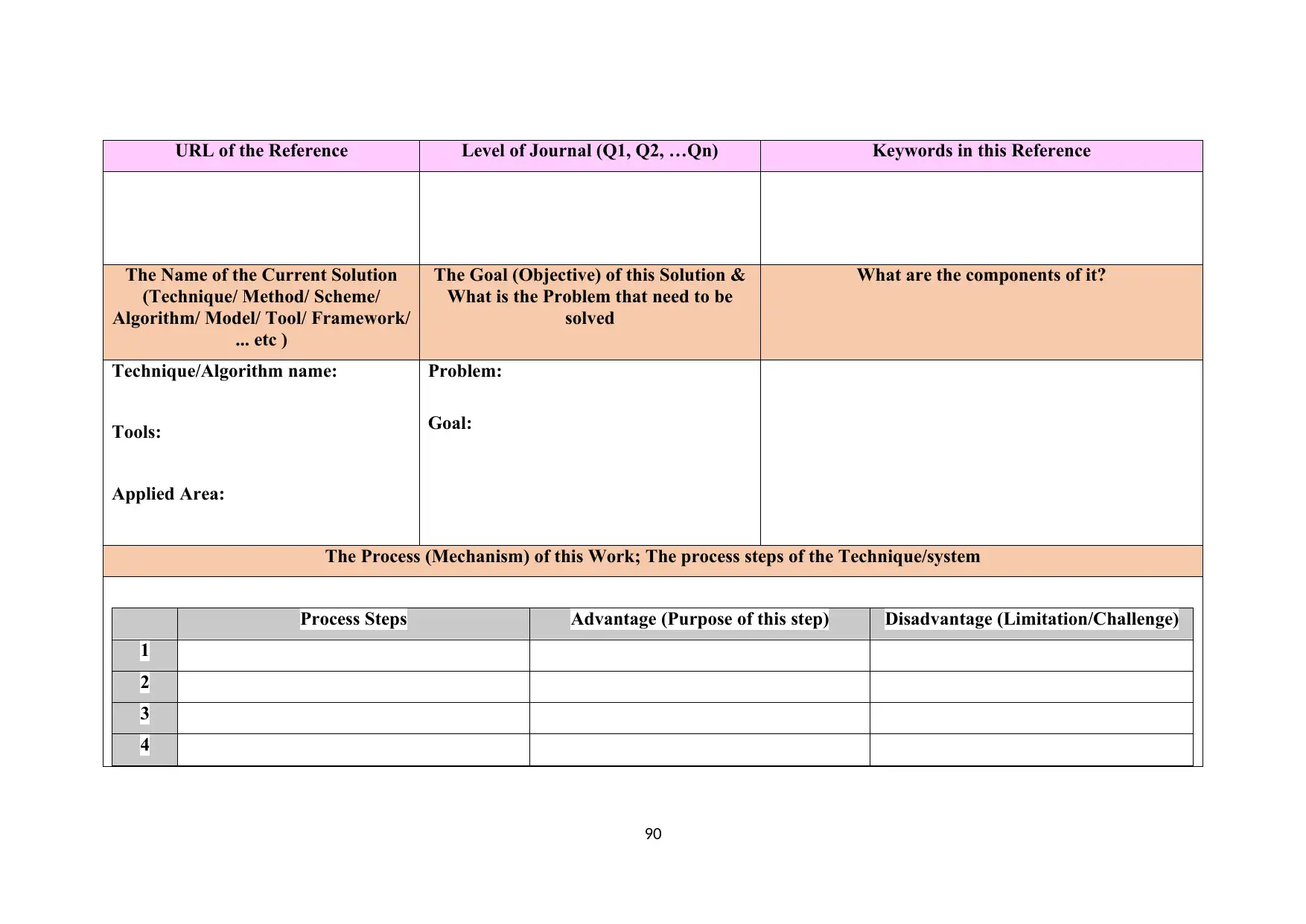
URL of the Reference Level of Journal (Q1, Q2, …Qn) Keywords in this Reference
The Name of the Current Solution
(Technique/ Method/ Scheme/
Algorithm/ Model/ Tool/ Framework/
... etc )
The Goal (Objective) of this Solution &
What is the Problem that need to be
solved
What are the components of it?
Technique/Algorithm name:
Tools:
Applied Area:
Problem:
Goal:
The Process (Mechanism) of this Work; The process steps of the Technique/system
Process Steps Advantage (Purpose of this step) Disadvantage (Limitation/Challenge)
1
2
3
4
90
The Name of the Current Solution
(Technique/ Method/ Scheme/
Algorithm/ Model/ Tool/ Framework/
... etc )
The Goal (Objective) of this Solution &
What is the Problem that need to be
solved
What are the components of it?
Technique/Algorithm name:
Tools:
Applied Area:
Problem:
Goal:
The Process (Mechanism) of this Work; The process steps of the Technique/system
Process Steps Advantage (Purpose of this step) Disadvantage (Limitation/Challenge)
1
2
3
4
90
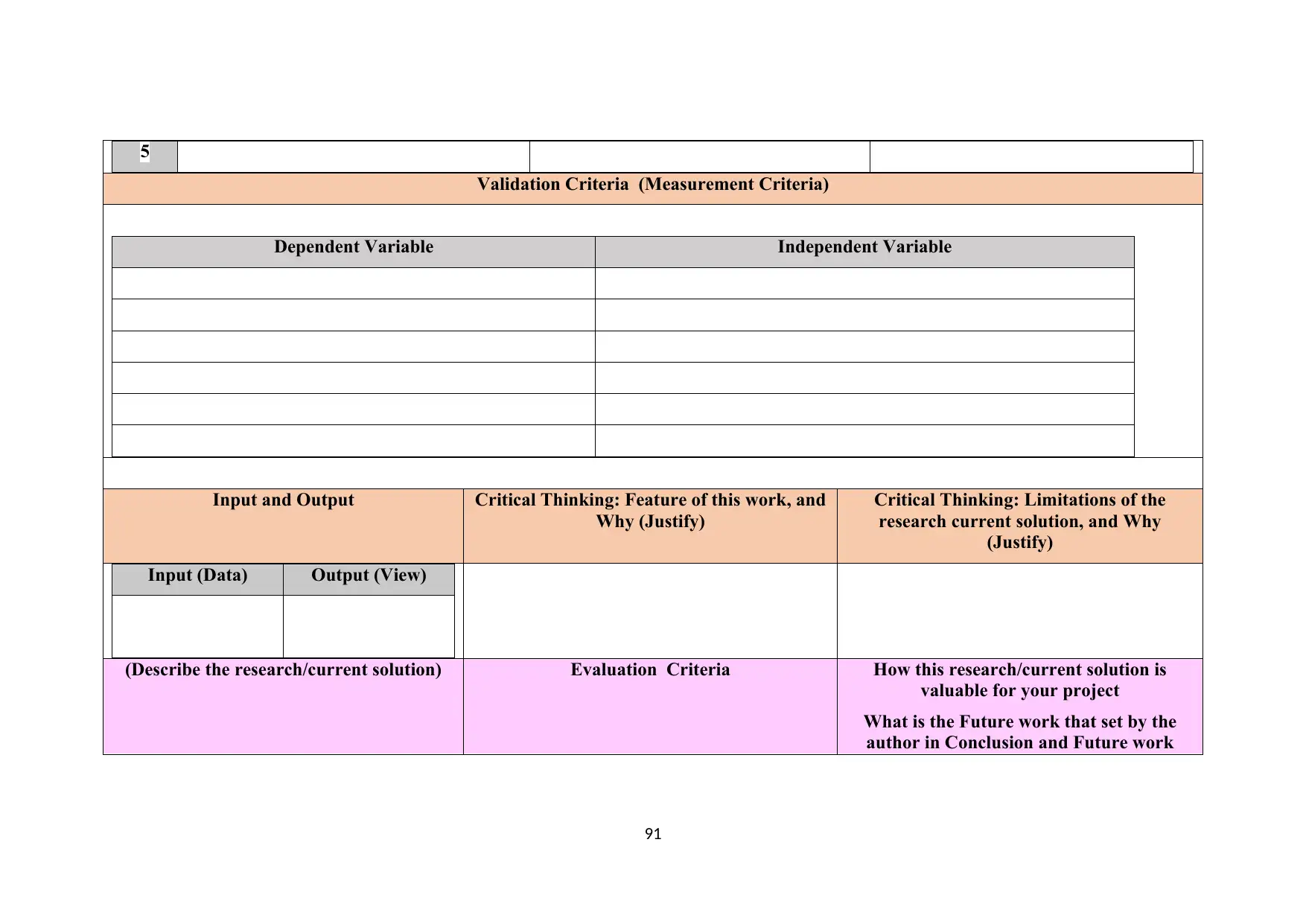
5
Validation Criteria (Measurement Criteria)
Dependent Variable Independent Variable
Input and Output Critical Thinking: Feature of this work, and
Why (Justify)
Critical Thinking: Limitations of the
research current solution, and Why
(Justify)
Input (Data) Output (View)
(Describe the research/current solution) Evaluation Criteria How this research/current solution is
valuable for your project
What is the Future work that set by the
author in Conclusion and Future work
91
Validation Criteria (Measurement Criteria)
Dependent Variable Independent Variable
Input and Output Critical Thinking: Feature of this work, and
Why (Justify)
Critical Thinking: Limitations of the
research current solution, and Why
(Justify)
Input (Data) Output (View)
(Describe the research/current solution) Evaluation Criteria How this research/current solution is
valuable for your project
What is the Future work that set by the
author in Conclusion and Future work
91
Paraphrase This Document
Need a fresh take? Get an instant paraphrase of this document with our AI Paraphraser
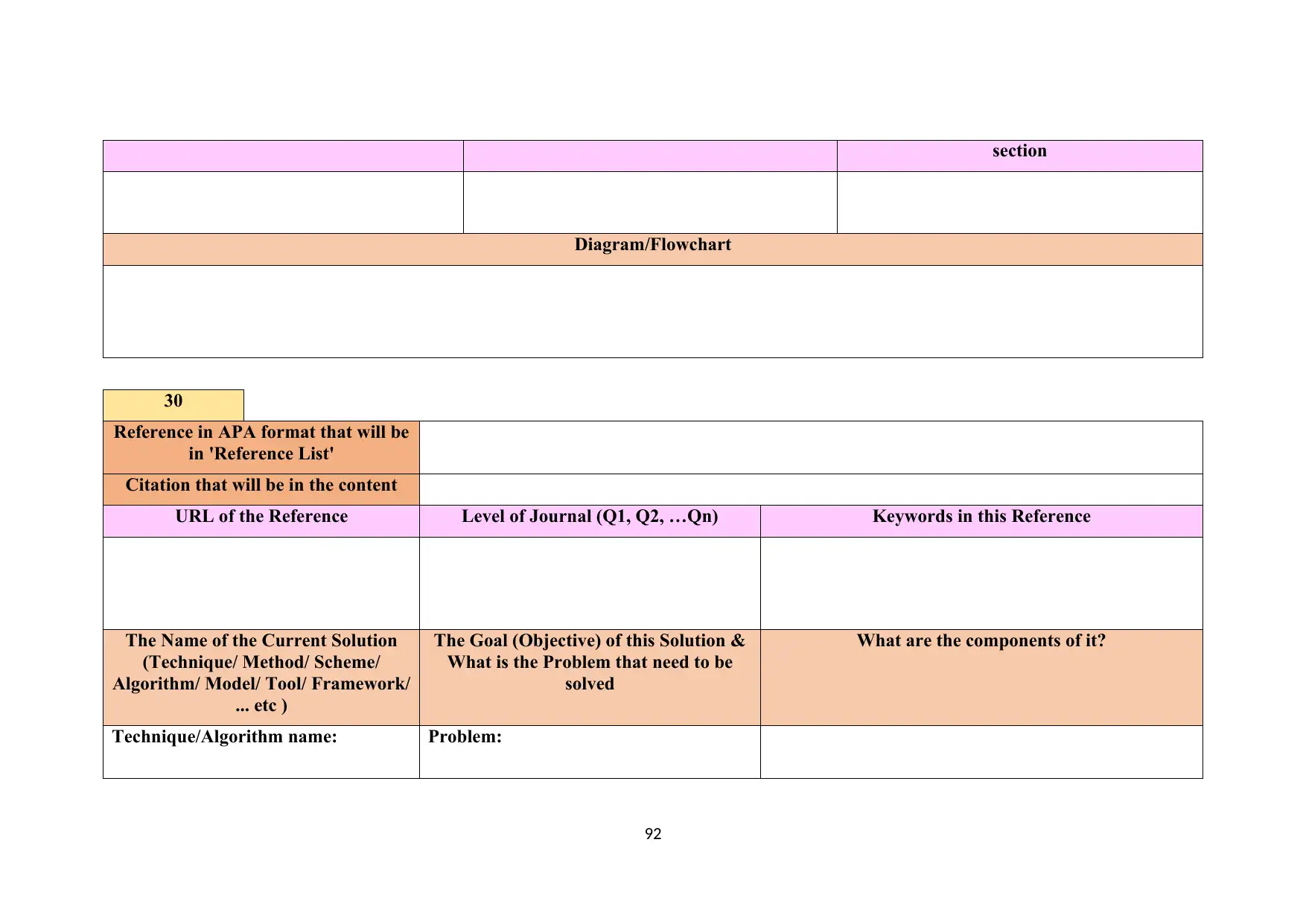
section
Diagram/Flowchart
30
Reference in APA format that will be
in 'Reference List'
Citation that will be in the content
URL of the Reference Level of Journal (Q1, Q2, …Qn) Keywords in this Reference
The Name of the Current Solution
(Technique/ Method/ Scheme/
Algorithm/ Model/ Tool/ Framework/
... etc )
The Goal (Objective) of this Solution &
What is the Problem that need to be
solved
What are the components of it?
Technique/Algorithm name: Problem:
92
Diagram/Flowchart
30
Reference in APA format that will be
in 'Reference List'
Citation that will be in the content
URL of the Reference Level of Journal (Q1, Q2, …Qn) Keywords in this Reference
The Name of the Current Solution
(Technique/ Method/ Scheme/
Algorithm/ Model/ Tool/ Framework/
... etc )
The Goal (Objective) of this Solution &
What is the Problem that need to be
solved
What are the components of it?
Technique/Algorithm name: Problem:
92
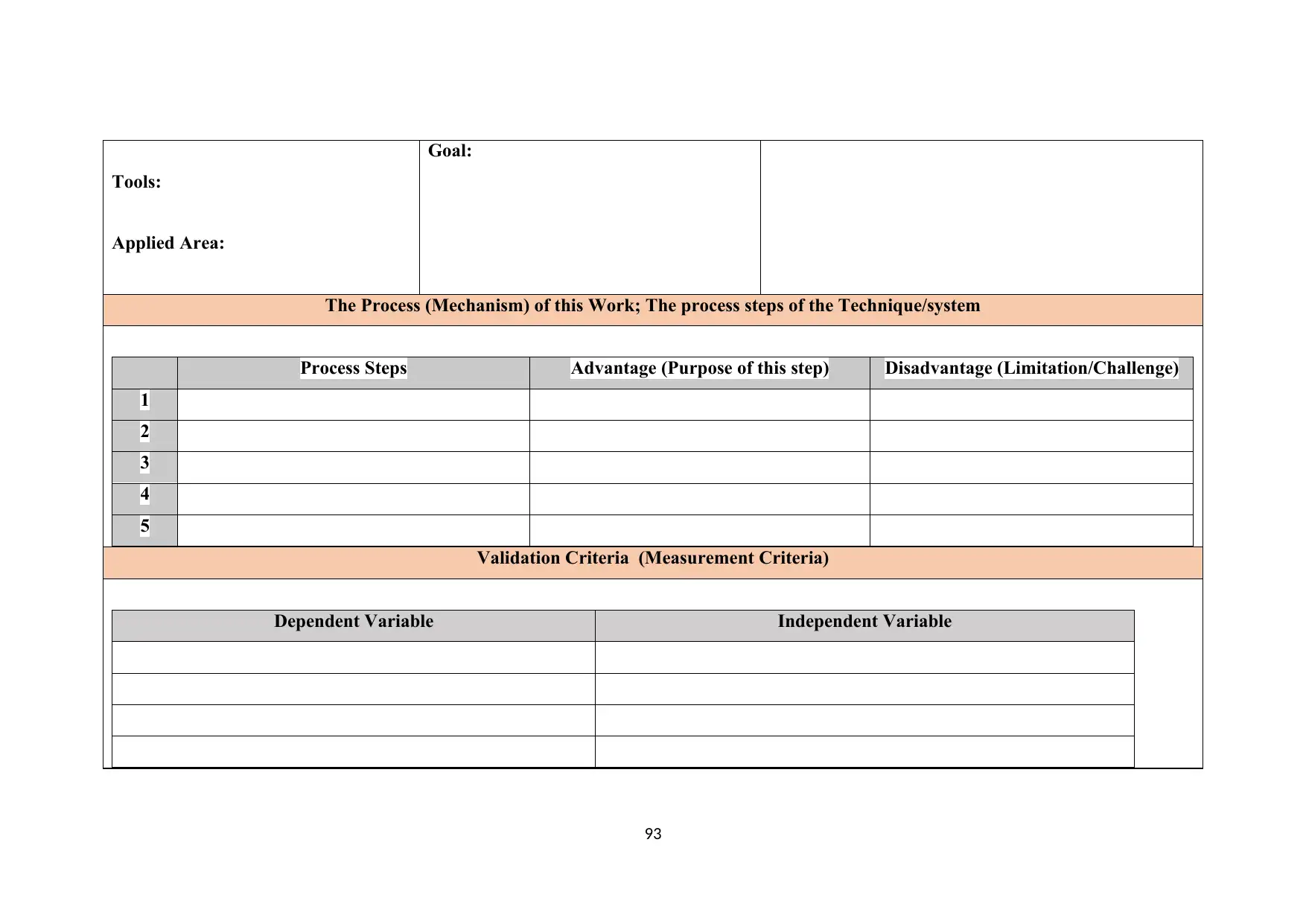
Tools:
Applied Area:
Goal:
The Process (Mechanism) of this Work; The process steps of the Technique/system
Process Steps Advantage (Purpose of this step) Disadvantage (Limitation/Challenge)
1
2
3
4
5
Validation Criteria (Measurement Criteria)
Dependent Variable Independent Variable
93
Applied Area:
Goal:
The Process (Mechanism) of this Work; The process steps of the Technique/system
Process Steps Advantage (Purpose of this step) Disadvantage (Limitation/Challenge)
1
2
3
4
5
Validation Criteria (Measurement Criteria)
Dependent Variable Independent Variable
93
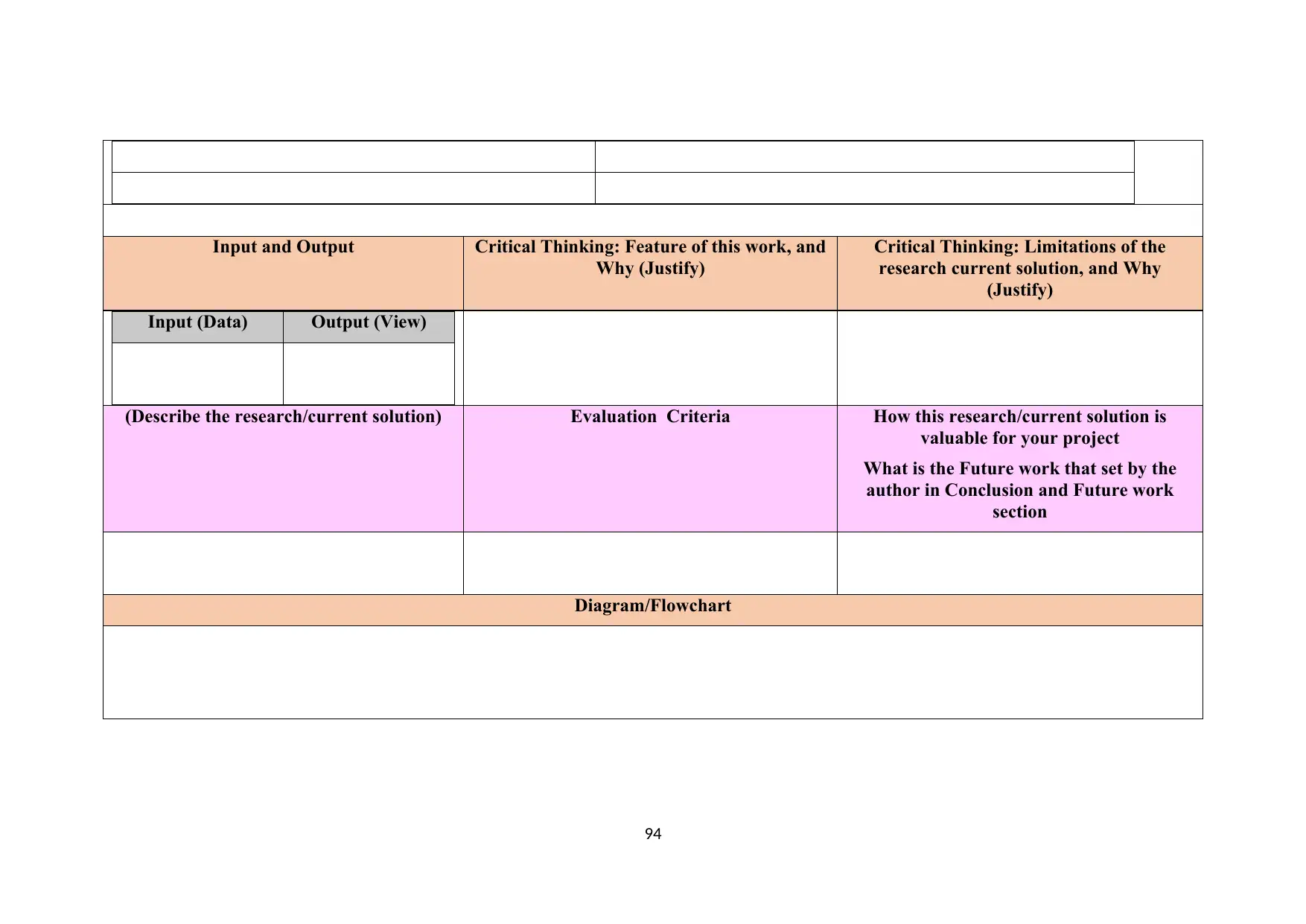
Input and Output Critical Thinking: Feature of this work, and
Why (Justify)
Critical Thinking: Limitations of the
research current solution, and Why
(Justify)
Input (Data) Output (View)
(Describe the research/current solution) Evaluation Criteria How this research/current solution is
valuable for your project
What is the Future work that set by the
author in Conclusion and Future work
section
Diagram/Flowchart
94
Why (Justify)
Critical Thinking: Limitations of the
research current solution, and Why
(Justify)
Input (Data) Output (View)
(Describe the research/current solution) Evaluation Criteria How this research/current solution is
valuable for your project
What is the Future work that set by the
author in Conclusion and Future work
section
Diagram/Flowchart
94
Secure Best Marks with AI Grader
Need help grading? Try our AI Grader for instant feedback on your assignments.
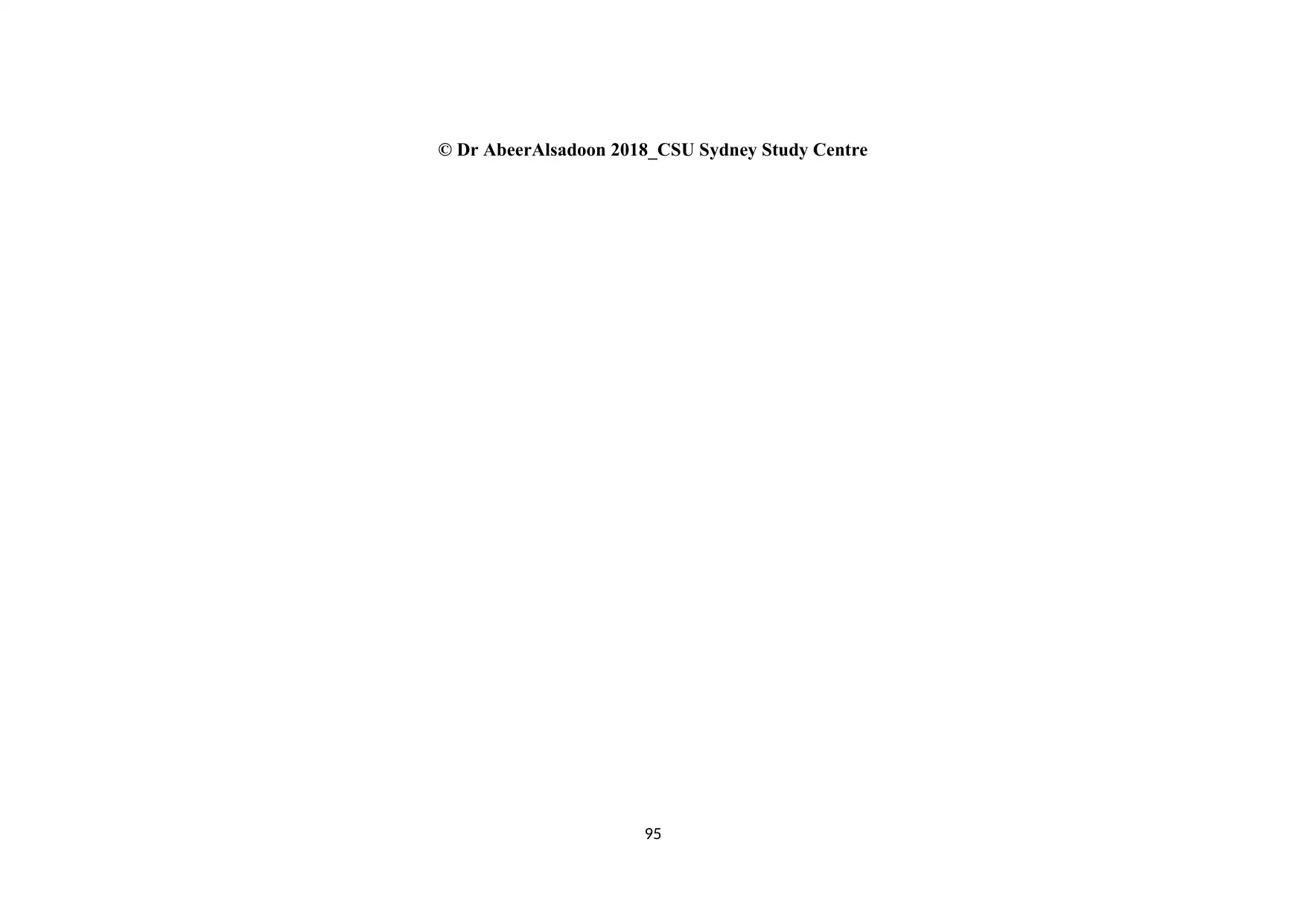
© Dr AbeerAlsadoon 2018_CSU Sydney Study Centre
95
95
1 out of 95
Related Documents
Your All-in-One AI-Powered Toolkit for Academic Success.
+13062052269
info@desklib.com
Available 24*7 on WhatsApp / Email
![[object Object]](/_next/static/media/star-bottom.7253800d.svg)
Unlock your academic potential
© 2024 | Zucol Services PVT LTD | All rights reserved.





